The Crusader Bible
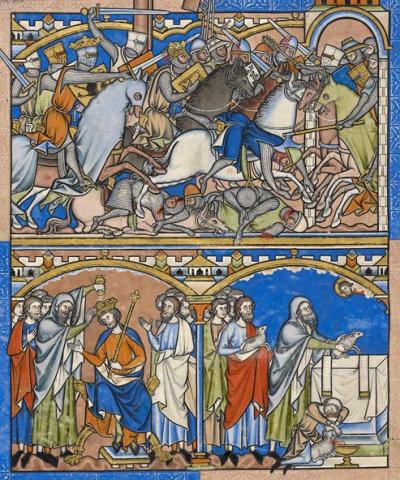
Old Testament Miniatures with Latin, Persian, and Judeo-Persian inscriptions
France, Paris, 1240s
The Crusader Bible, also known as the Morgan Picture Bible, the Maciejowski Bible, and the Shah ‘Abbas Bible, is not only one of the greatest medieval manuscripts in the Morgan, it also ranks as one of the incomparable achievements of French Gothic illumination.
The miniatures represent one of the greatest visualizations of Old Testament events ever made. Some of the stories and their heroes are well known, but there are also accounts of less familiar Israelites who fought for the Promised Land—tales that resonate to this day. There are incredibly violent battle scenes in which the implements of war are so accurately depicted they could be replicated. And there are scenes of everyday life, love, hate, and envy, as well as adultery, rape, and murder—all set in thirteenth-century France.
This digital facsimile was created in conjunction with the exhibition The Crusader Bible: A Gothic Masterpiece, on view October 17, 2014, through January 4, 2015, and organized by William M. Voelkle, Curator and Department Head.
Manuscript
MS M.638, fol. 1r
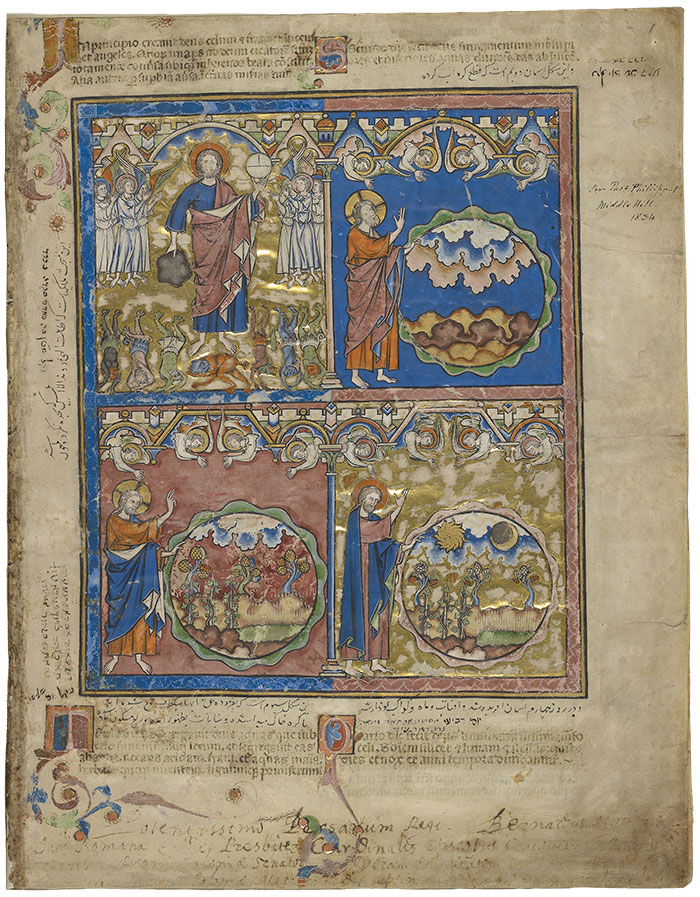
The First Day, The Second Day, The Third Day, The Fourth Day
Old Testament Miniatures with Latin, Persian, and Judeo-Persian inscriptions
Purchased by J.P. Morgan (1867–1943) in 1916
The First Day
It is the first day. Light is divided from the darkness. As a chorus of angels praises the Lord, Lucifer and the rebel angels are cast from Heaven. Immediately, the traitors assume the forms of hideous beasts. (Genesis 1:1–5)
The Second Day
On the second day, the Lord separates the sky from the water. Angels look down from heaven, praising the work. (Genesis 1:6–8)
The Third Day
On the third day, the Lord makes dry land appear. At His command, trees and vines spring forth. To the right, a corn crop grows. (Genesis 1:9–13)
The Fourth Day
On the fourth day, the Lord sets the stars, sun, and moon in the heavens to govern day and night, the seasons, and the years. (Genesis 1:14–19)
Folio 1r (Latin)
Upper left: In the beginning God created the heaven and the earth and the light and the angels. One part of these was devoted to its creator and stays happy with its attachment to him. But the other was haughtily averse and sunk into eternal miseries. (Genesis 1: 1-5; Isaiah 14: 12-19; Luke 10:18; 2 Peter 2:4; Jude 6; Revelation 12: 7-9)
Upper right: On the second day God made a firmament between the upper and lower waters, dividing them from one another. (Genesis 1: 6-8)
Lower left: On the third day God gathered onto one place the waters, which were under the heaven and separated them from the dry land, giving names to the dry land and the seas as well as to green plants and fruit-bearing trees. (Genesis 1: 9-13)
Lower right: On the fourth day God made the lights in the firmament of the heaven: the sun and the moon and the stars, by which the day, the night and the seasons are divided. (Genesis 1: 14-19)
Folio 1r (Persian)
Upper left margin: This is the theme of the angels who submitted to God except for the Devil who did not prostrate himself and was cursed.
Upper right: This is the image of the second heaven separating [from] the sphere of water.
Lower left: This is the third image where, according to God’s command waters have gathered to one side so that the sphere of the earth is revealed; vegetation appears and the habitable quarter is prepared.
Lower right: And on the fourth day heaven was created and the sun, moon, and stars appeared.
Folio 1r (Judeo-Persian)
Upper left margin: The tale of Satan, who did not bow down before Adam.
Upper right margin: The tale of the second day; calling forth the waters.
Lower left margin: The tale of the third day. The third day: The waters were gathered so that the sphere of the earth became visible; plants appeared.
Lower right margin, between Persian and Latin: The fourth day. The heavens, the sun, and the moon appeared.
Italicized words are in Hebrew.
Content consultant: Richard Leson
Persian translated by Sussan Babaie
Judeo-Persian translated by Vera Basch Moreen
Latin translation by Eran Lupu
After the commentary volume accompanying the Fine Art Facsimile edition by Faksimile Verlag Luzern
MS M.638, fol. 1v
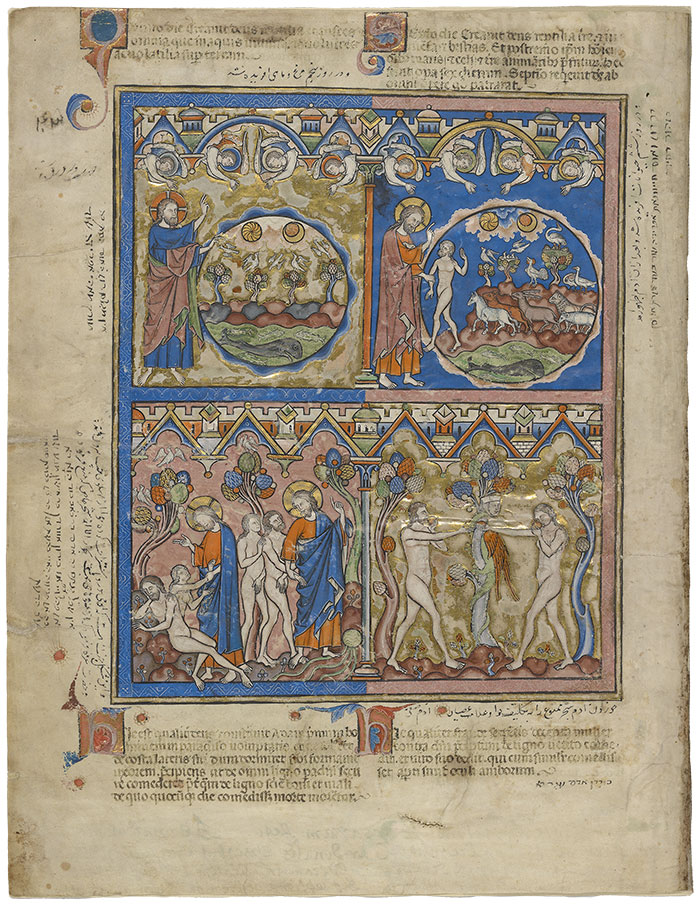
The Fifth Day, The Sixth Day, The Creation of Woman; The Tree of Knowledge, The Fall from Grace
Old Testament Miniatures with Latin, Persian, and Judeo-Persian inscriptions
Purchased by J.P. Morgan (1867–1943) in 1916
The Fifth Day
On the fifth day, the Lord brings forth all of the creatures of the skies and seas. For the first time, birds take wing in the open firmament of the heavens, the waters teem with fish, and great whales roam the oceans. "Increase and multiply," the Lord commands, "fill the waters of the sea, and let the birds be multiplied upon the earth." (Genesis 1:20–23)
The Sixth Day
On the sixth day, the Lord forms man in his own image. As a sign of their special relationship, He grasps Adam's arm and, before the assembled creatures of the earth, charges him with dominion over the world and all of its inhabitants. (Genesis 1:24–31)
The Creation of Woman; The Tree of Knowledge
Soon after, the Lord puts Adam in Paradise and draws forth Eve from Adam's side. The pair are enjoined never to eat of the Tree of Knowledge. (Genesis 2:15–18, 21–23)
The Fall from Grace
A subtle, winged serpent with a woman's head convinces Eve to eat the fruit of the Tree of Knowledge. Adam accepts the forbidden fruit from his companion. (Genesis 3:1–6)
Folio 1v (Latin)
Upper left: On the fifth day God created reptiles and fish and all creatures that live in the water and winged fowl and birds over the earth. (Genesis 1: 20–23)
Upper right: On the sixth day God created the reptiles of the earth, cattle and beasts, and finally man, destined to have dominion over all the living beings of the sea, the heaven and the earth. These were the works of the six days. On the seventh God rested from all the work which he had created. (Genesis 1:24 – 2:3)
Lower left: Here is how God placed Adam, the first man, in the garden of Eden and, in order that he might not be alone, formed a woman for him from one of his ribs as he was sleeping, commanding him to eat freely of every tree in the garden of Eden excluding the tree of knowledge of good or bad, for on the day in which he ate thereof he would surely die. (Genesis 2:8–25)
Lower right: Here is how the woman, deceived by the serpent’s fraud, ate of the forbidden tree, against the Lord’s command, and gave also to her man. When he had similarly eaten the eyes of them both were opened. (Genesis 3: 1–7)
Folio 1v (Persian)
Persian foliation: 43
Upper left: On the fifth day the birds and the fish were created.
Upper right margin: On the sixth day animals were created and after that Adam appeared.
Lower left margin: This is the image of Paradise wherein Adam rested [and Eve emerged from [his] left side; and His Excellence the Almighty commanded [them] to eat from the fruits of Heaven except from the specific tree which He forbade.
Lower right: At Eve’s behest, Adam’s eating [from] the forbidden tree and the symbol of rebellion of the pure Adam.
Folio 1v (Judeo-Persian)
Upper left margin: This is the scene of the fifth day, when birds and fish were created.
Upper right margin, furthest to right: On the sixth day animals were created; afterwards His Excellence Adam appeared.
Lower left margin, furthest to left: This is an image of the Garden [of Eden], when Eve was taken out from Adam’s left side. They were [not] prevented from eating from every tree, except from the Tree of Knowledge.
Lower right margin, below Latin: Adam’s eating [from] the tree.
Italicized words are in Hebrew.
Content consultant: Richard Leson
Persian translated by Sussan Babaie
Judeo-Persian translated by Vera Basch Moreen
Latin translation by Eran Lupu
After the commentary volume accompanying the Fine Art Facsimile edition by Faksimile Verlag Luzern
MS M.638, fol. 2r
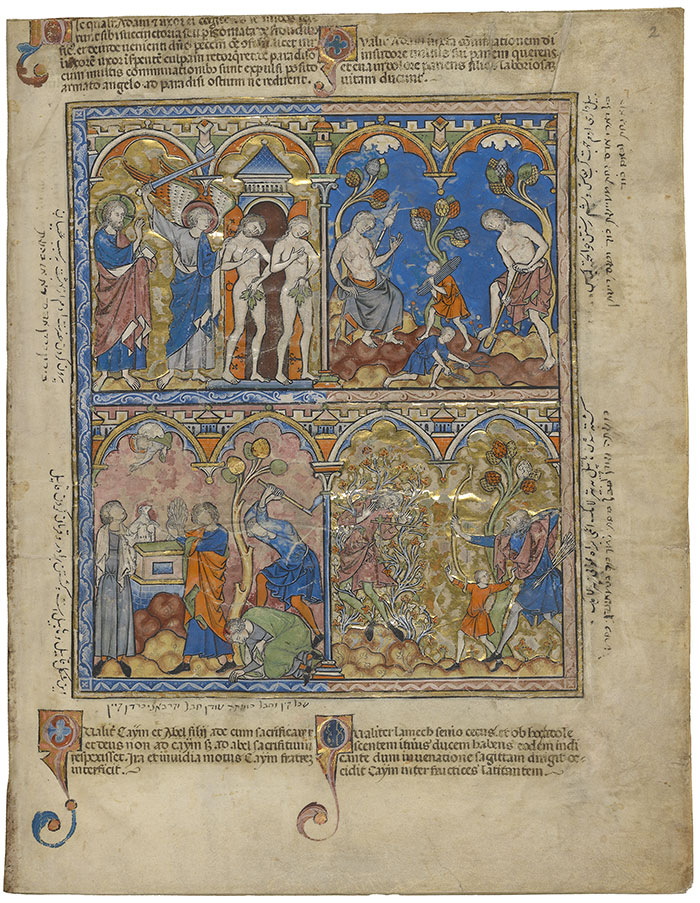
The Expulsion from Paradise, The Trials of Man and Woman, The Sacrifices of Cain and Abel; Cain Murders His Brother, The Death of Cain
Old Testament Miniatures with Latin, Persian, and Judeo-Persian inscriptions
Purchased by J.P. Morgan (1867–1943) in 1916
The Expulsion from Paradise
The disobedient Adam and Eve are expelled from Paradise by the Lord. An angel brandishes a sword over the guilty pair, who now ashamedly hold fig leaves to conceal their nudity. The Gate of Paradise through which the couple exits is depicted as a slender Gothic tower. (Genesis 3:22–24)
The Trials of Man and Woman
After their exile from Eden, the Lord multiplies the sorrows of Adam and Eve. She shall suffer the pains of childbirth; he must cultivate the earth for his bread. As Eve sits spinning with a distaff, Adam digs with a spade. Their sons Cain and Abel collect firewood at their feet. (Genesis 3:16–19)
The Sacrifices of Cain and Abel; Cain Murders His Brother
The Lord is pleased with the ram Abel has brought as a sacrifice, but Cain meets with no such favor for the sheaves he presents at the altar. Furiously jealous, Cain later slays Abel with a hatchet. (Genesis 4:3–8)
The Death of Cain
This scene is drawn from an account popular in the middle ages that expanded upon the brief description of Cain's death in the Book of Genesis. The aged and blind Lamech, his aim guided by a boy, shoots Cain with bow and arrow as he is tangled in a bush. Note that in this and the preceding miniatures, the painter has deliberately ignored some of the plants springing from the ground, perhaps to create a contrast between the barren nature of the world and the lush Garden of Eden. (Genesis 4:15, 23–24)
Folio 2r (Latin)
Upper left: Here is how Adam and his wife, knowing that they were naked, made aprons or perisomata [for the Vulgate’s Greek word penzomata] for themselves of fig leaves and thereafter, having confessed all of their sin at the arrival of the Lord—although the man was casting the blame on the woman and the woman on the snake—were expelled from the garden of Eden with many a threat, an armed angel having been placed at the garden’s gate in order that they might not return. (Genesis 3: 7–24)
Upper right: How Adam, in consequence of the Lord’s threats, seeks bread in the sweat of his face while Eve bears children in pain as they both lead toilsome life. (Genesis 3:19;4:1–2)
Lower left: How when Cain and Abel, Adam’s sons, were making an offering and God had respect not for Cain’s sacrifice but for Abel’s, Cain, driven by anger and jealousy, kills his brother. (Genesis 4:3–8)
Lower right: How Lemech, blind by old age and for that reason having a youth to lead him on his way, while hunting, aimed an arrow, at the youth’s indication, and killed Cain who was hiding in the bushes. (Genesis 4:23 and Historia scholastica, Genesis 28)
Folio 2r (Persian)
Upper left margin: The expulsion of His Excellence Adam [and Eve] from Paradise for [his] rebellion.
Upper right margin: Adam tilling the ground for earning [his] sustenance and Eve spinning wool for clothes.
Lower left margin: This is the image of Abel and Cain and the murder of the brother and the sacrifice of Cain.
Lower right margin: The death of Abel by the arrow of the blind Lamech on the direction of Lamech’s son.
Folio 2r (Judeo-Persian)
Upper left margin, furthest left: Adam’s expulsion from Paradise.
Upper right margin, furthest right: Adam’s having a shovel as a means for his livelihood and Eve’s spinning of wool for clothing.
Lower left, above Latin: [An] image of Cain and Abel, the killing of Abel, and Cain’s [sic!] offering of sacrifice.
Lower right margin, furthest right: Lamech the Blind kills Cain as guided by his [Lamech’s] son.
Content consultant: Richard Leson
Persian translated by Sussan Babaie
Judeo-Persian translated by Vera Basch Moreen
Latin translation by Eran Lupu
After the commentary volume accompanying the Fine Art Facsimile edition by Faksimile Verlag Luzern
MS M.638, fol. 2v
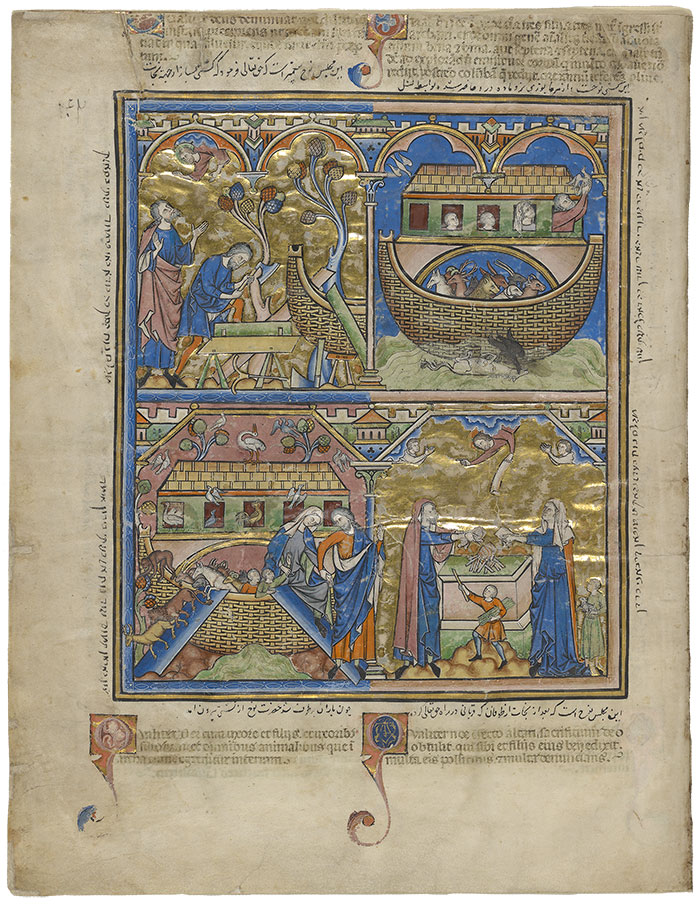
Noah Builds an Ark, Searching for Dry Land, A Joyous Landing, A New Beginning
Old Testament Miniatures with Latin, Persian, and Judeo-Persian inscriptions
Purchased by J.P. Morgan (1867–1943) in 1916
Noah Builds an Ark
The Lord is distraught at the wickedness of men and orders a great flood to eliminate them from the earth. Only Noah finds grace in the eyes of God. In obedience to the Lord, Noah builds an enormous ark for the salvation of his family and the world's creatures. (Genesis 6:13–17)
Searching for Dry Land
Once the storm calms, Noah releases a dove and a raven. The hungry raven is keen to feed on a floating corpse, but the dove soon returns from his survey bearing an olive branch, news of dry land. (Genesis 8:6–11)
A Joyous Landing
Soon the ark comes to rest on Mount Ararat, where Noah, his family, and the animals descend to land as the birds happily escape through the ship's open windows. (Genesis 8:18–19)
A New Beginning
Grateful, the family makes sacrifices to the Lord, and a new covenant is made: nevermore will the Lord curse the earth for the sake of the sinfulness of man. (Genesis 8:20–9:15)
Folio 2v (Latin)
Upper left: How God announces the impending flood to Noah, instructing him to make an ark for himself in which he may be saved, as the latter follows God’s instruction. (Genesis 6: 12–22)
Upper right: How Noah, his wife, his three sons and three daughters-in-law come into the ark, accompanied by two or seven of every kind of the animals of the earth and the winged fowl. And how at length, after he had sent a raven to reconnoiter which, having found a cadaver, did not return, Noah eventually sent a dove that returned bringing back an olive branch in her mouth. (Genesis 7:7 – 8:12)
Lower left: How Noah went forth onto the land with his sons and their wives and all the animals which were in the ark. (Genesis 8:18–19)
Lower right: How Noah, having built an altar, offered sacrifice to God who blessed him and his sons with many promises and many threats. (Genesis 8:20 – 9:17)
Folio 2v (Persian)
Persian foliation: 42
Upper left: This is the scene of the prophet Noah whom God the Exalted commanded to build an ark for deliverance.
Upper right: This is Noah’s Ark and from every creature a male and a female were gathered to it for the sake of [preserving] the race.
Lower left: When the rain halted, His Excellence Noah disembarked from the Ark.
Lower right: This is the image of Noah who, after deliverance from the Flood, offered sacrifice to God the Exalted.
Folio 2v (Judeo-Persian)
Upper left margin: [It is] the scene when God commanded Noah: "Make yourself an ark."
Upper right margin: This is the scene when every living being was present in order to enter the ark.
Lower left margin: When the rain stopped, Noah came out of the ark.
Lower right margin: It is the scene of Noah’s offering a sacrifice after having been saved from the Flood.
Content consultant: Richard Leson
Persian translated by Sussan Babaie
Judeo-Persian translated by Vera Basch Moreen
Latin translation by Eran Lupu
After the commentary volume accompanying the Fine Art Facsimile edition by Faksimile Verlag Luzern
MS M.638, fol. 3r
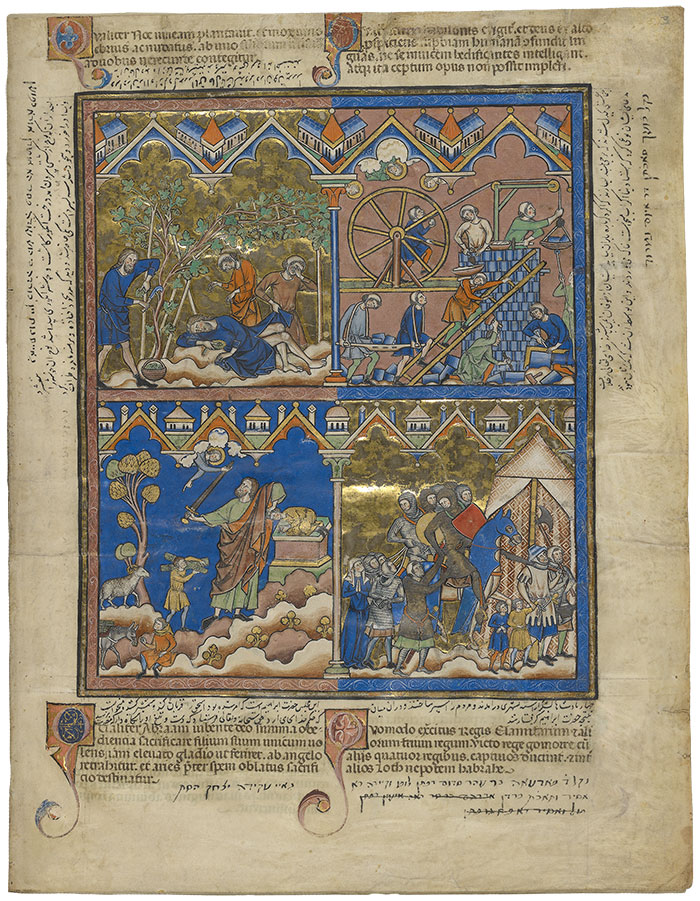
Noah in His Cups, A Monumental Misunderstanding, The Greatest of Tests, Lot Taken Captive
Old Testament Miniatures with Latin, Persian, and Judeo-Persian inscriptions
Purchased by J.P. Morgan (1867–1943) in 1916
Noah in His Cups
Noah, now a farmer, tills the earth and plants a vineyard. Later, his sons find their father drunken from too much wine and are ashamed of his nakedness. Ham stands behind his father, mocking, while his brother Shem, eyes averted, covers Noah with the end of his cloak. (Genesis 9:20–23)
A Monumental Misunderstanding
People of Babel plan to build an enormous city and a tower that will reach to heaven. The Lord is angered by their pride and confuses the speech of men so as to interrupt their plans. The project is abandoned, and the builders scatter to all regions of the earth. The miniature provides an excellent example of the medieval building process. Note the pulley system, driven by a man inside a wooden wheel that functions much like a treadmill. (Genesis 11:3–4)
The Greatest of Tests
The Lord has decided to test Abraham by ordering him to sacrifice his only son, Isaac. Before Abraham can carry out this order, an angel of the Lord catches the tip of his sword and instructs him to offer a ram in the boy's place. Isaac appears twice in this illustration in a gold tunic, carrying firewood for his own sacrifice and again on the altar. (Genesis 22:9–13)
Lot Taken Captive
The family of Abraham's nephew, Lot, become unfortunate captives in a war between enemy kings. Lot, his wife, and five soldiers are led away by the victors. They are preceded by two footmen who lead Lot's children away. (Genesis 14:8–12)
Folio 3r (Latin)
Upper left: How Noah planted the vine and thereupon, drunken with wine and uncovered, having been ridiculed by one of his sons, is modestly covered by the other two. (Genesis 9:20–23)
Upper right: How the tower of Babylon is erected and God, watching over human haughtiness from on high, confounds their languages that they may not understand each other while building and the work which was begun may thus not be completed. (Genesis 9: 3–9)
Lower left: How Abraham, wishing with the utmost obedience to sacrifice his one and only son at God’s command, having already raised his sword to slaughter, is held back by an angel and beyond hope a ram is offered and destined for sacrifice. (Genesis 22: 1–13)
Lower right: How the army of the King of the Elamites and one of the three other kings, having defeated the king of Gomorrah and four other kings, leads captives and among others Lot, Abraham’s nephew (Genesis 14: 1–12)
Folio 3r (Persian)
Upper left margin & upper left: After Noah left the Ark, he planted a vineyard and grew a cluster of grapes. Noah squeezed that cluster and drank its juice and became drunk. He had three sons; one came upon him and saw the father drunk and naked. He was clever, and it was he who called his brothers to see the father in this state. The brothers, seeing the father in this state, averted their eyes and covered his shame.
Upper right margin: A crowd conspired to build a tall tower so that if the rain would come again they would be safe from the Flood. Contrary to their intention, the Exalted God so deemed that if a master builder requested water, soil was delivered, and this was because they were not unanimous.
Lower left: This is the image of His Excellence Abraham who was commanded to sacrifice Isaac and having drawn [his] sword he intended to abide by God’s command. The Most Holy and Exalted God sent [a messenger] to halt his hand and blade to prevent him [Isaac] from harm.
Lower right: Four kings mustered armies; they entered a city and captured the people and amongst them the relative of His Excellence Abraham was captured.
Folio 3r (Judeo-Persian)
Upper left margin, furthest left: Here Noah, having drunk wine, became unconscious; his sons covered him.
Upper right margin, furthest right: The tale about the building of the palace in the days of Nimrod.
Lower left margin, beneath Latin: The site of Isaac’s binding.
Lower right, beneath Latin: The tale of the four kings going to Sodom, taking Lot and his wife prisoners, and assaulting them.And Abraham met them and retook the prisoners and the[ir] goods.
Content consultant: Richard Leson
Persian translated by Sussan Babaie
Judeo-Persian translated by Vera Basch Moreen
Latin translation by Eran Lupu
After the commentary volume accompanying the Fine Art Facsimile edition by Faksimile Verlag Luzern
MS M.638, fol. 3v
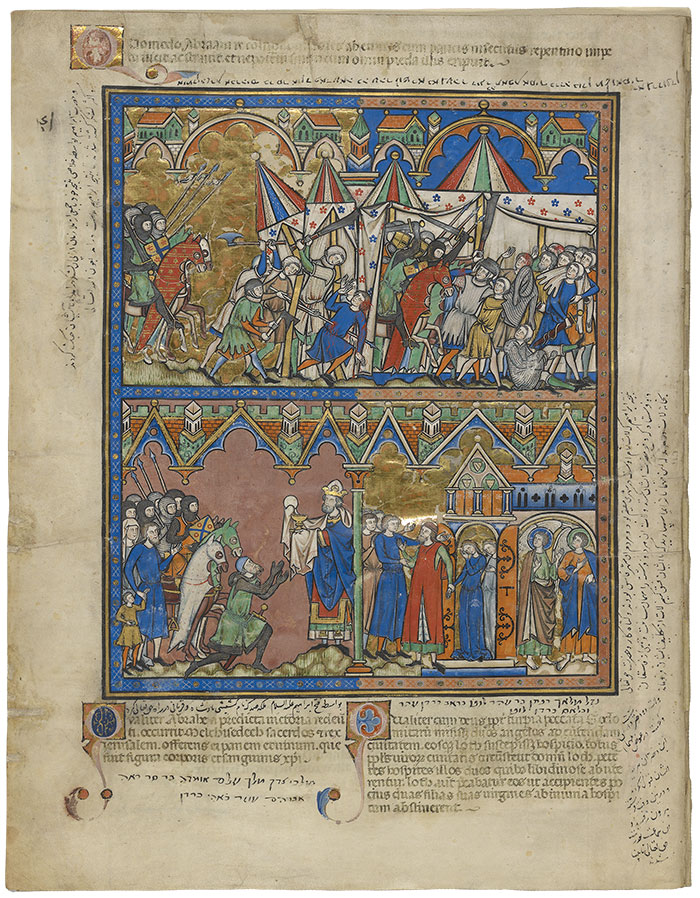
Abraham's Vengeance, A Blessing, The Corruption of the Sodomites
Old Testament Miniatures with Latin, Persian, and Judeo-Persian inscriptions
Purchased by J.P. Morgan (1867–1943) in 1916
Abraham's Vengeance
Abraham has gained word of Lot's capture and arrives on horseback to free his nephew. His foot soldiers attack the enemy pavilion, chopping down the support poles and spearing an enemy soldier. The remaining foes hurry to arm themselves but it is too late; the horsemen pursue them into the pavilion and strike them down. (Genesis 14:14–15)
A Blessing
Having rescued Lot and his family, Abraham receives the blessing of Melchizedek, king of Salem and high priest. As Abraham kneels, Melchizedek, vested as a bishop, holds aloft bread and wine. The Christian illuminator understood these offerings as prefiguring the Eucharist. (Genesis 14:18–20)
The Corruption of the Sodomites
In Sodom, Lot offers hospitality to two angels of the Lord. Later, an angry mob confronts Lot at the door of his home, demanding the surrender of the guests. Rather than dishonor the Lord's ambassadors, Lot offers his daughters. Still indoors, the angels prepare to strike Lot's attackers with blindness. (Genesis 19:3–8)
Folio 3v (Latin)
Upper half: How Abraham, upon discovering the matter, having pursued the victors who were going away with few men, defeated and scattered them and snatched away his nephew with all the spoils. (Genesis 14: 14–16)
Lower left: How Melchizedek, a priest and king of Jerusalem, met with Abraham as he was returning from the foretold victory, offering him bread and wine which were the prefiguration of the body and blood of Christ. (Genesis 14: 18–20)
Lower right: How when, due to the foul sins of the Sodomites, God had sent two angels to destroy the city and Lot had received them in hospitality, all the host of the men of the city surrounded Lot’s house, demanding the guests to basely abuse them. However, Lot was beseeching them to accept his two virgin daughters and avoid injuring the guests. (Genesis 19: 1–11)
Folio 3v (Persian)
Persian foliation: 41
Upper left margin: And his Excellence Abraham, with a group of his servants, pursued that army in order to rescue his relative. He fought them and most of the army was slain so that Abraham’s relative was recaptured by the assistance of God the Exalted.
Lower left: Because of Abraham’s victory, peace be upon him, the priest-king named Melchizedek and [sic] offered sacrifice to God the Exalted.
Lower right margin: Abraham’s relative, whose name was Lot, was resident at a city and the people of that city were sodomites and sinners. His Excellence God the Exalted sent two to ward against their harms and Lot hosted those two angels. A company of the sodomites came to Lot’s house [demanding], "Deliver these guests to us so that we fornicate with them." Lot did not oblige. And Lot had two daughters and said, "Take these girls instead of the guests." They did not accept and at this time the angel(s) went out and the group was blinded by the power of God the Exalted.
Folio 3v (Judeo-Persian)
Upper half: The coming of His Excellence Abraham against those four [sic!] kings who plundered and took prisoners [from] Lot’s town and other towns; he returns the goods and the prisoners.
Lower left, beneath Latin: Melchizedek, king of Salem, comes out to meet Abraham in order to apologize.
Lower right, above Latin: The tale of the angel going to Lot’s town in order to destroy it and his speaking with Lot.
Content consultant: Richard Leson
Persian translated by Sussan Babaie
Judeo-Persian translated by Vera Basch Moreen
Latin translation by Eran Lupu
After the commentary volume accompanying the Fine Art Facsimile edition by Faksimile Verlag Luzern
MS M.638, fol. 4r
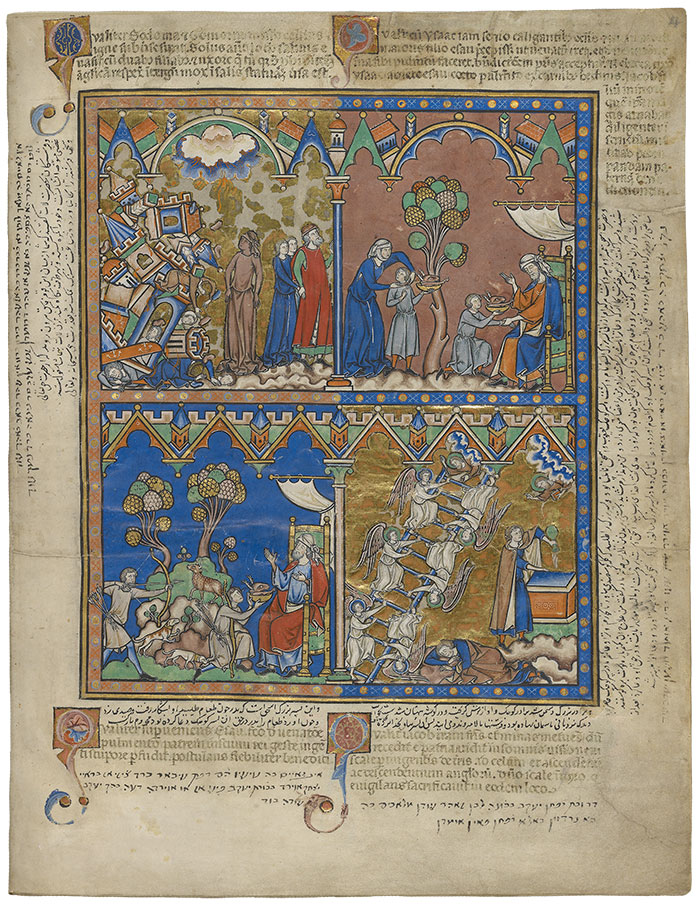
Divine Judgment, A Father's Blessing, Isaac's Despair, A Marvelous Vision
Old Testament Miniatures with Latin, Persian, and Judeo-Persian inscriptions
Purchased by J.P. Morgan (1867–1943) in 1916
Divine Judgment
The Lord detests the wickedness of Sodom and Gomorrah; the cities are toppled by a rain of brimstone and fire from heaven. Lot and his family are spared this fate, but Lot's wife, against the angels' command, turns for a final glimpse of her old home and is transformed into a pillar of salt. (Genesis 19:15–26)
A Father's Blessing
Before Isaac dies, he will bestow a blessing upon his elder son, Esau, making him master of his brothers. But Isaac's wife, Rebekah, would rather this favor fall to her younger son, Jacob. So, she dresses Jacob in Esau's clothes and sends him before his father with an offering. Isaac, whose eyesight is failing, is fooled and bestows the blessing on Jacob. (Genesis 27:15–25)
Isaac's Despair
Returning from his hunt, Esau presents his kill to the blind Isaac. Isaac laments, realizing that he has been duped by Jacob and that Esau must ever serve his younger brother. (Genesis 27:30–35)
A Marvelous Vision
On the way to Haran, Jacob falls asleep outdoors and has an amazing vision. A ladder ascends endlessly into a vault of sky. Angels ascend and descend its rungs, and the Lord Himself peers down from its heights to bestow a blessing upon Jacob and his children. Waking, Jacob builds an altar and pours an offering of oil, swearing to honor the Lord always. (Genesis 28:11–18)
Folio 4r (Latin)
Upper left: How Sodom and Gomorrah were overturned by fire sent from heaven. Lot alone escaped safely with his two daughters and his wife who, nevertheless, had looked backward against the angelic prohibition and thereupon became a pillar of salt. (Genesis 19: 12–26)
Upper right: How when Isaac who was already old and close to death and his eyes had dimmed had ordered his firstborn, Esau, who was to receive his father’s blessing, to go hunting and make him savory meat of his game, Rebecca, Isaac’s wife, cooked savory meat of kid’s flesh, and, in the absence of Esau, having carefully instructed him, sent Jacob, her younger son whom she loved more, to obtain her father’s blessing; beforehand. (Genesis 27:1–29)
Lower left: How Esau, having made savory meat of his game, came up [to?] his father who was ignorant of the deed and greatly astonished he poured forth [his grief], demanding in tears to be blessed. (Genesis 27: 30–34)
Lower right: How Jacob, fearing his brother’s anger and threats, saw in his dream, while retiring from his homeland, a vision of a mighty ladder from earth to heaven and of angels ascending and descending as the Lord was standing above the ladder. Thus when he had woke up he made an offering in that place. (Genesis 27: 41 – 28:22)
Folio 4r (Persian)
Upper left margin: And the angels told Lot, "Depart from amongst this company of sinners for the wrath of His Excellence God the Exalted is directed towards them, and get yourselves to the mountain and do not look to the sides." But Lot’s wife ignored the angels’ words and started looking [back] and was instantly turned into salt stone by the power of the Most Holy and Exalted God.
Right margin: And his Excellence Isaac the prophet had two sons each from a [different] wife. The elder son was named Esau and the younger son [was named] Jacob. Isaac was blind and he summoned the elder son to bring a sheep’s head [for me] to eat and to bless you. The mother of the younger son was present and she heard [it] and told the son, "You perform this service so that you receive the blessings." The son said, "My brother has hair on [his] limbs and I do not have hair; perhaps [my father] will touch my body, what shall I do then?" The mother said, "I shall remedy that." She attached pieces of lamb skin on his hand and neck and said, "Go and take the food." When he did so, Isaac said, "How is it that you came so soon?" He said, "The Lord provided." Isaac touched his hand, found hair, and blessed him. After an hour, the elder brother came and brought food and Isaac realized that it was the younger son who had [previously] brought the food and had procured the blessings. The mother of the elder son insisted on the blessing; Isaac said, "Earlier, he had brought [the food], and earlier, he was blessed."
Lower left: This is Isaac’s elder son who, since the father requested food, went for a hunt and caught a prey and when he had brought the food, the father had [already] blessed the younger son; he returned [and was] deprived [of the blessing].
Lower right: And the elder brother became the enemy of the younger brother who fled [to a certain place] in fear and hid in a corner. At night, he dreamt that a ladder was placed to the sky and the angels were ascending and descending. So that son took refuge in God and was delivered.
Folio 4r (Judeo-Persian)
Upper left margin, furthest left: Here it is that the angel said to Lot, "Get out of this town, this town will be destroyed." Lot left that town accompanied by his wife and daughters. His wife turned her head to look and turned into salt.
Right margin, furthest right: The tale of Isaac who wanted something brought to him to eat; Jacob brought it, then Esau came; he became Jacob’s enemy.
Lower left, beneath Latin: Here Esau also went hunting and brought [something for Isaac] to eat, but Jacob having brought his [food] earlier was blessed with God’s blessing.
Lower right, beneath Latin: When Jacob went toward Laban’s house, angels appeared going up and down a ladder.
Content consultant: Richard Leson
Persian translated by Sussan Babaie
Judeo-Persian translated by Vera Basch Moreen
Latin translation by Eran Lupu
After the commentary volume accompanying the Fine Art Facsimile edition by Faksimile Verlag Luzern
MS M.638, fol. 4v
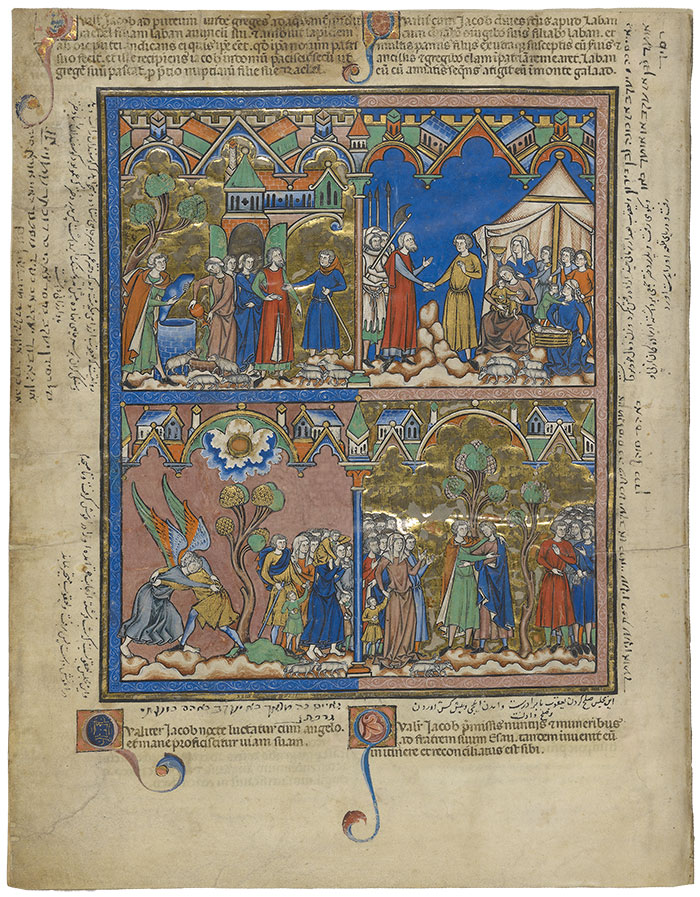
A Bride Price, A Covenant, Wrestling the Almighty, All is Forgiven
Old Testament Miniatures with Latin, Persian, and Judeo-Persian inscriptions
Purchased by J.P. Morgan (1867–1943) in 1916
A Bride Price
Jacob travels in search of his uncle, Laban. At Laban's well, Jacob meets his cousin Rachel, a shepherdess. Jacob removes the stone cover of the well, enabling Rachel to water her flock. Later, as Rachel and her elder sister Leah look on, Jacob petitions Laban for Rachel's hand in marriage. In return, Jacob swears to serve his uncle for seven years. (Genesis 29:10–20)
A Covenant
Laban, accompanied by his brothers, agrees to give both of his daughters to Jacob in marriage. Laban clasps his nephew's hands over a heap of stones that will serve both as witness to their covenant and boundary marker between their lands. Leah and Rachel observe them from a nearby tent. They are surrounded by their children and handmaidens. Rachel rocks Joseph, Jacob's youngest son, in his cradle. (Genesis 31:43–48)
Wrestling the Almighty
In the night, Jacob orders his family to cross the ford of Jabbok. When all have crossed but Jacob, an angel of the Lord appears and wrestles with him until sunrise. Jacob will not surrender and demands a blessing from his heaven-sent opponent. "Your name shall no longer be called Jacob, but Israel" the angel proclaims, "for you have struggled with God and with men, and have prevailed." (Genesis 32:22–31)
All is Forgiven
After many years, Jacob and Esau are reconciled to one another. At left, the family and servants of Jacob watch the reunion. At right, Esau's men regard the brothers' embrace. (Genesis 33:1–7)
Folio 4v (Latin)
Upper left: How Jacob saw Rachel the daughter of Laban, his uncle near a well whence the flocks were watered and rolled the stone from the mouth of the well telling her who he was which she told her father and he, receiving Jacob in his house, makes a pact with him to tend his flocks in return for the hand of his daughter, Rachel. (Genesis 29: 1–20)
Upper right: How when Jacob who was made rich at Laban’s side was secretly returning to his homeland with his two wives, Laban’s daughters, with many young children born of each and with slaves and maids and ilochs, Laban pursued him with armed men and overtook him in mount Gilead. (Genesis 31)
Lower left: How Jacob wrestled with the angel and on the breaking of the day set out on his way. (Genesis 32: 24–31)
Lower right: How Jacob having sent messengers and presents to Esau, his brother, found him at last on his way and reconciled with him. (Genesis 32: 3–23, 32:1–15)
Folio 4v (Persian)
Upper left margin: According to legend, Jacob was walking a road; he saw his cousin standing by a well and, wanting to water the sheep and [seeing] a heavy stone on top of the well, he came forth and removed the stone. Accordingly, the girl’s father, who was his uncle, granted him his sheep and his daughter.
Upper right margin: After some time, Jacob decided to leave and took his wife and possessions and went to a mountain. The girl’s father gathered a group and pursued him on foot and caught up with him at the foot of the castle.
Lower left margin: And this is the image of Jacob when, at night, an angel of God came and embraced him and kept him till dawn in his embrace. Then he left and Jacob was struck with awe.
Lower right: This is the image of Jacob making peace with his brother [Esau], the arrival of [Jacob’s] ambassador, and the presentation of offerings, and the making of peace [with Esau].
Folio 4v (Judeo-Persian)
Upper left margin, furthest left: The tale of Jacob’s arrival at the mouth of the well where the daughter of his uncle was; Jacob drew water, quenched the thirst of her flock;....
Upper right margin, top: Here it is that Jacob, upon leaving Laban’s house, Laban comes after him and catches up with him.
Lower left, above Latin: Here it is that the angel and Jacob wrestle one another.
Lower right margin: This is the scene when, Jacob’s gifts having come before Esau, Esau comes and they are reconciled.
Content consultant: Richard Leson
Persian translated by Sussan Babaie
Judeo-Persian translated by Vera Basch Moreen
Latin translation by Eran Lupu
After the commentary volume accompanying the Fine Art Facsimile edition by Faksimile Verlag Luzern
MS M.638, fol. 5r
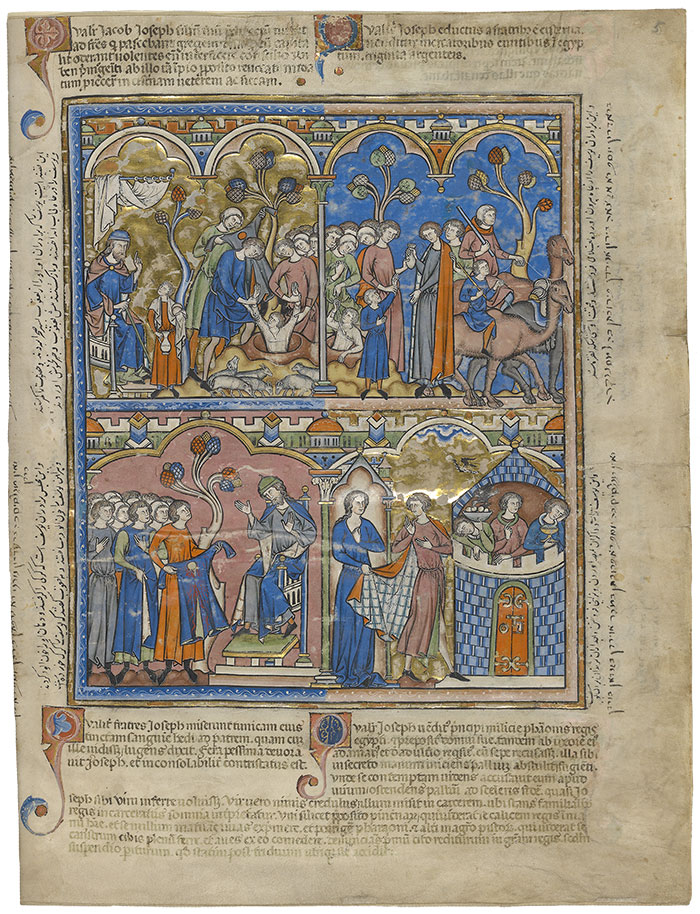
Joseph, a favorite Son, Sold into Slavery, Bad Blood, False Accusations and Portents of the Future
Old Testament Miniatures with Latin, Persian, and Judeo-Persian inscriptions
Purchased by J.P. Morgan (1867–1943) in 1916
Joseph, a favorite Son
Fulfilling the wishes of his father Jacob, Joseph brings bread and wine to his older brothers where they tend their flocks. But the brothers are jealous of Joseph and the favor Jacob has shown to him. He is brutally stripped of the coat his father gave him and lowered into a deep pit. (Genesis 37:12–24)
Sold into Slavery
The brothers return to the pit to sell Joseph into slavery, and he is taken to Egypt on a camel. (Genesis 37:25–28)
Bad Blood
The brothers have torn Joseph's coat and covered it in blood; a horrified Jacob is told that Joseph has been killed by a wild beast. (Genesis 37:31–34)
False Accusations and Portents of the Future
In Egypt, Joseph refuses the advances of his master's wife, who grasps his cloak as he flees. He is wrongly accused of adultery and put in prison, but his ability to interpret the dreams of his cell-mates will shortly result in his freedom. (Genesis 40:9–17)
Folio 5r (Latin)
Upper left: How Jacob sent Joseph, his dearest son to his brothers who were tending the flock and these, as they hated him mortally and wished to kill him, revoked such an impious plan by the counsel of Reuben, the firstborn and cast him, having stripped him, into a pit, pristine and arid. (Genesis 37: 3–24)
Upper right: How Joseph was drawn out of the pit by his brothers and sold for thirty pieces of silver to merchants on their way to Egypt. (Genesis 37: 25–28)
Lower left: How Joseph’s brothers sent his coat, soiled in kid’s blood, to their father and he, when he had seen the coat said mournfully: ’An evil beast has devoured Joseph’; and he was saddened beyond consolation. (Genesis 37: 29–35)
Lower right: How after Joseph was sold to Pharaoh’s captain of the guard and was made an overseer over his house, at length his master’s wife fell in love with him and desired him to commit adultery with her. But when he had often refused, she secretly lay hand on him and snatched away his mantle as he was fleeing. Wherefore, seeing that she was put in contempt, she accused him in front of her husband, displaying the garment to add credibility to the charge, as if Joseph had wished to attack her. And indeed, the man, trusting her much, sent him to prison. There he was interpreting the dreams of the king’s imprisoned servants. One of these, the chief of butlers, saw himself with the king’s cup in his hand into which he was pressing ripe clusters of grapes offering it to Pharaoh. The other, the chief of bakers, saw himself carrying a basket of baked goods while birds were eating of it. Joseph declared that the first one was soon about to win the king’s favor again, while the second was about to die by hanging. And this befell both in three days. (Genesis 39, 40)
Folio 5r (Persian)
Upper left margin: This is the story of Joseph whose brethren [took] him from Jacob to the fields and with enmity cast Joseph into a waterless well; they returned to Jacob and brought [him] the news of his loss.
Upper right margin: And here, the brethren draw Joseph out of the well and sell him into slavery; his worth was assessed at thirty coins of silver.
Lower left margin: This is the image of Joseph’s brethren who captured a wolf and smeared his mouth with blood and smeared Joseph’s shirt with blood and they told Jacob that the wolf had devoured Joseph.
Lower right margin: And here, the merchants bring Joseph to Egypt and sell [him] to Zulaikha and Joseph’s imprisonment thereafter.
Folio 5r (Judeo-Persian)
Upper left margin, furthest left: This is the scene when the brothers took Joseph [and] threw him into a dry well.
Upper right margin, furthest right: The brothers took Joseph out of the well and sold him for a tribute of thirty [pieces] of silver.
Lower left margin, furthest left: This is the scene when, afterwards, having caught a wolf, they [the brothers] smeared Joseph’s shirt with [the wolf’s] blood.
Lower right margin, furthest right: This is the scene when, Joseph having been sold in Egypt, is imprisoned.
Italicized words are in Hebrew.
Content consultant: Richard Leson
Persian translated by Sussan Babaie
Judeo-Persian translated by Vera Basch Moreen
Latin translation by Eran Lupu
After the commentary volume accompanying the Fine Art Facsimile edition by Faksimile Verlag Luzern
MS M.638, fol. 5v
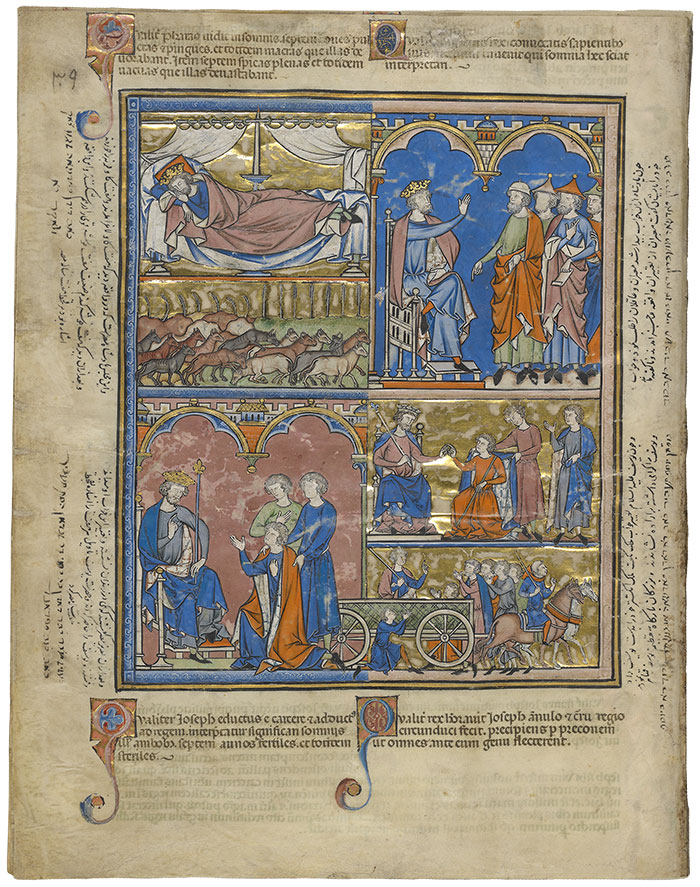
Dreams of a King, Searching for Answers, Joseph Interprets Pharaoh's Dreams, A Powerful Post
Old Testament Miniatures with Latin, Persian, and Judeo-Persian inscriptions
Purchased by J.P. Morgan (1867–1943) in 1916
Dreams of a King
In his dreams, Pharaoh sees seven fat cattle feeding by the water's edge. The same cattle are attacked and eaten by seven lean and sick cattle. Also, Pharaoh dreams of seven strong and healthy ears of corn, but these are devoured by seven thin and blasted ears of corn. (Genesis 41:1–7)
Searching for Answers
Pharaoh is worried by his dreams. What could these visions mean? To find the answer, he consults wise men from all over Egypt, but no one is able to grasp the significance of the dreams. (Genesis 41:8)
Joseph Interprets Pharaoh's Dreams
Pharaoh's chief butler remembers how Joseph interpreted dreams in prison. Joseph is summoned and explains the meaning of Pharaoh's dream: the Lord shall bring seven years of plenty to Egypt, but these will be followed by seven years of great famine and scarcity that will destroy the abundance. (Genesis 41:14–31)
A Powerful Post
Pharaoh is pleased with Joseph's wisdom and sets him the momentous task of preparing for the great famine. As symbols of his new authority, Joseph receives Pharaoh's own ring and a rich silk robe. Afterwards, the young Hebrew is placed in a royal chariot and hailed by the people as governor of all Egypt. (Genesis 41:41–43)
Folio 5v (Latin)
Upper left: How there appeared in Pharaoh’s dream seven cows, pleasant to the sight and plump and as many thin ones which devoured them; and likewise seven full ears of corn and as many empty ones which devastated them. (Genesis 41: 1–7)
Upper right: How the king, having woke up and summoned his wise men, found none who knew how to interpret these dreams. (Genesis 41:8)
Lower left: How Joseph who had been led out of the prison and brought before the king explained that seven years of plenty and as many years of famine were predicted in these dreams. (Genesis 41: 9–36)
Lower right: How the king honored Joseph with a ring and arranged that he be driven around in a chariot, ordering through a herald that all should bow their knees in front of him. (Genesis 41: 37–43)
Folio 5v (Persian)
Persian foliation: 39
Upper left margin: This image is of the king of Egypt who saw in a dream that seven lean kine devoured seven fat kine and then he saw that seven weak stalks of wheat destroyed seven strong stalks; these occurrences were a portent of the seven-year famine in Egypt.
Upper right margin: When the king awoke from that sleep, he summoned interpreters and learned men and told them of his dream. The interpreters were unable to interpret that dream and it remained unsolved.
Lower left margin: Afterwards they told the king of Egypt that there is someone sitting in the prison who knows the interpretation of this dream. They fetched Joseph and His Excellence Joseph interpreted each of the seven as signs of the seven-year famine [to come to] Egypt.
Lower right margin: And since Joseph, peace be upon him, had related the interpretation of the king’s dream, the king gave his ring to Joseph and exalted Joseph; they placed him upon a chariot and the court grandees rose to show [their] respect to Joseph.
Folio 5v (Judeo-Persian)
Upper left margin, furthest left: The king [Pharaoh] dreams about the fat and lean cattle.
Upper right margin, furthest right: The king seeks out dream interpreters to interpret his dream.
Lower left margin, furthest left: The ruler of Egypt is informed that there is a person in [his] prison who knows how to interpret dreams well.
Lower right margin, furthest right: Joseph interprets the king’s dream and the king bestows his ring upon Joseph.
Content consultant: Richard Leson
Persian translated by Sussan Babaie
Judeo-Persian translated by Vera Basch Moreen
Latin translation by Eran Lupu
After the commentary volume accompanying the Fine Art Facsimile edition by Faksimile Verlag Luzern
MS M.638, fol. 6r
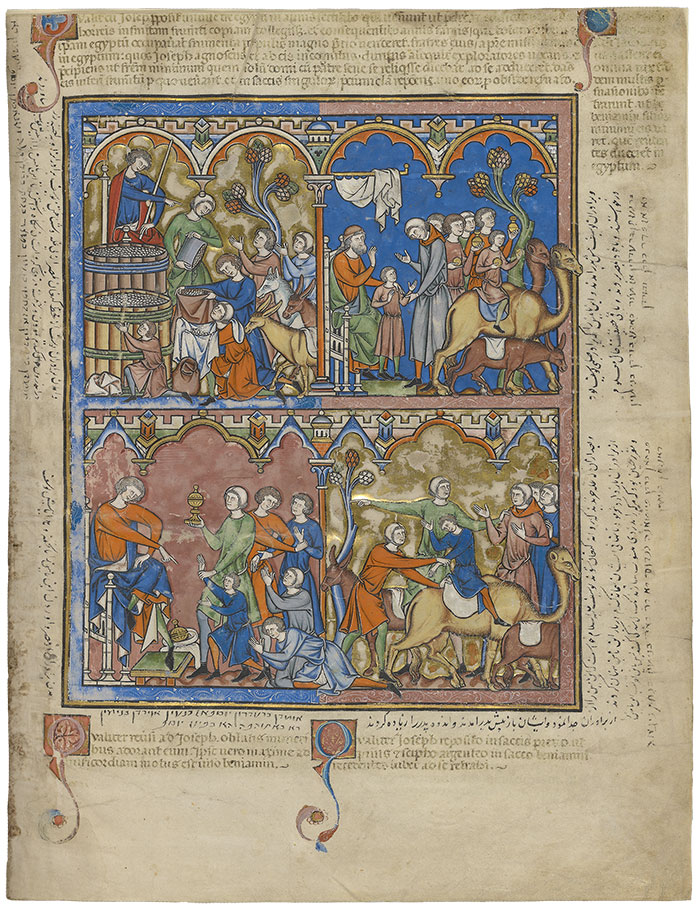
An Ironic Turn of Events, A Bounty, Tricks and Accusations
Old Testament Miniatures with Latin, Persian, and Judeo-Persian inscriptions
Purchased by J.P. Morgan (1867–1943) in 1916
An Ironic Turn of Events
The great famine that Joseph predicted having arrived, the new governor oversees the sale and distribution of Egypt's vast stores of corn. Following Jacob's order, Joseph's brothers travel to Egypt to buy corn. They do not recognize Joseph's face in the stern gaze of the governor, who chooses not to reveal his identity. Joseph accuses them of spying and imprisons them. All are released save one, who will serve as hostage until the brothers return with Benjamin. Benjamin is Joseph's only full brother, born after his adventures in Egypt. Having learned of Benjamin, Joseph demands to see him. (Genesis 42:6–20)
A Bounty
In Canaan, Jacob reluctantly agrees to Joseph's command. The brothers depart at right, led by Benjamin on a camel, and carry rich presents for the governor. (Genesis 43:11–14)
Tricks and Accusations
Again Joseph tests his brothers. They are allowed to depart with grain, but, secretly, Joseph has ordered a golden cup to be placed in Benjamin's sack. At right, stewards catch up with the group and accuse them of thievery. Benjamin is pulled roughly before Joseph by a steward who displays the evidence. The frightened brothers fall to their knees and beg for the governor's mercy. (Genesis 44:4–17)
Folio 6r (Latin)
Upper left: How when Joseph, having been made overseer over all the land of Egypt during the years of plenty which came as he had predicted, had collected an infinite amount of grain in immense storehouses which were built, and, during the following years of hunger which came over the whole world and over Egypt itself, was selling grain to the people for a high price, his brothers, having been sent by their father, came to Egypt. Knowing them but unknown to them, Joseph speaks roughly calling them spies and ordering them to fetch their youngest brother whom, as they were saying, they had left alone at home with their old father. Meanwhile he gave them the grain for which they came and furtively restored the money to each of their sacks (Genesis 41: 46 – 42: 24)
Upper right: How, having returned to their father, when they had told him all, they at length and with difficulty brought him to give them the youngest of his sons whom they brought with them as they returned to Egypt. (Genesis 42: 29 – 43: 14)
Lower left: How, having returned to Joseph, they offered him gifts and honored him. He was indeed brought to pity at the site of Benjamin. (Genesis 43: 26–30)
Lower right: How, Joseph, the money having been put in their sacks as before and a silver cup in Benjamin’s sack, orders that they be brought before him as they retire. (Genesis 44: 1–12)
Folio 6r (Persian)
Upper left margin: The coming of Joseph’s brethren from the famine of Canaan to Egypt in search of grain; Joseph’s recognition of his brothers; the hiding of gold in the wheat sacks; the accusation of theft; keeping them hostage until they bring the ransom from Jacob.
Upper right margin: Joseph’s brethren came to the father and requested the ransom, which [consisted of Benjamin] Joseph’s blood brother. They took him to Egypt and the rest of the true story manifested [itself].
Lower left margin: The arrival of the brethren in Egypt and their presentation to Joseph of the ransom [Benjamin] with gifts and offerings.
Lower right & lower right margin: And after they brought grain in order to leave for Canaan, Joseph, peace be upon him, wished to keep the ransom [Benjamin]. And it was the law that whoever was accused of theft must serve in slavery for one year. Thus in this manner the ransom was separated from the brethren and they returned to the father and increased the father’s sorrow.
Folio 6r (Judeo-Persian)
Upper left margin, furthest left: The arrival of the brothers from the famine of Canaan to Egypt in order to purchase corn and Joseph’s recognizing them.
Upper right margin, furthest right: The return of the brothers from Egypt wanting to carry off Benjamin from his father and [their] doing so.
Lower left, above Latin: The arrival of Joseph’s brothers from Canaan bringing Benjamin, along with gifts, before Joseph.
Lower right margin, furthest right: The hiding of the wheat measuring [cup] in Benjamin’s sack in order to detain Benjamin.
Content consultant: Richard Leson
Persian translated by Sussan Babaie
Judeo-Persian translated by Vera Basch Moreen
Latin translation by Eran Lupu
After the commentary volume accompanying the Fine Art Facsimile edition by Faksimile Verlag Luzern
MS M.638, fol. 6v
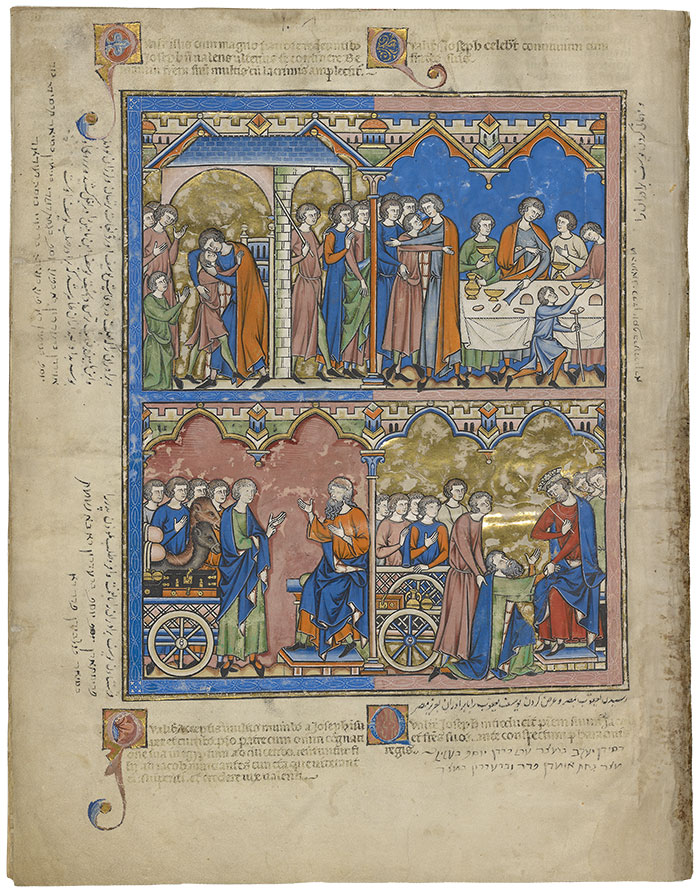
A Reunion, A Family Feast, Good News, A Blessing for Pharaoh
Old Testament Miniatures with Latin, Persian, and Judeo-Persian inscriptions
Purchased by J.P. Morgan (1867–1943) in 1916
A Reunion
Joseph can no longer maintain the charade and confesses his identity. The brothers, struck with amazement and fear, are unable to speak. But Joseph is overcome with emotion; he weeps and embraces Benjamin. After many years, the brothers are reconciled. (Genesis 45:1–15)
A Family Feast
Joseph welcomes his brothers into his house and holds a feast for them at a rich table. (Genesis 43:31–34)
Good News
The brothers return to Jacob with amazing news. Joseph is alive and ruler of Egypt. This seems impossible! The brothers present their proof: wagon loads of presents Joseph has sent to his father. But the elderly Jacob is unconcerned with riches; all that matters is that Joseph still lives. (Genesis 45:21–28)
A Blessing for Pharaoh
Jacob and his sons arrive in Egypt with all that they possess, and Joseph happily presents his family to Pharaoh. Jacob kneels before the king and blesses him. "How old are you?" Pharaoh asks. "The days of my pilgrimage are a hundred and thirty years, few, and evil," Jacob humbly replies, "and they are not come up to the days of the pilgrimage of my fathers." (Genesis 47:1–10)
Folio 6v (Latin)
Upper left: How, as these returning in great fear, Joseph, unable to contain himself any longer, embraces Benjamin his brother with many a tear (Genesis 44: 13 – 45:14)
Upper right: How Joseph feasts with his brothers (Genesis 43: 32–34)
Lower left: How, after they have received many presents as well as a chariot to bring their father with all his household to Egypt, the sons return to Jacob telling him all that they have seen, as he is stupefied and hardly willing to believe. (Genesis 45: 19–28)
Lower right: How Joseph introduces his father and brothers before Pharaoh the king. (Genesis 48: 1–10)
Folio 6v (Persian)
Persian foliation: 38.
Upper left margin: When they brought the brethren accused of theft before Joseph, they were extremely fearful and shaken and the ransom (Joseph’s blood brother) was exceedingly frightened. Joseph embraced him and kissed his face. It became apparent then that he was Joseph’s blood brother.
Upper right margin: And Joseph’s reception for the brethren.
Lower left margin: Joseph sends off his brothers with a wealth of offerings and requests his father [to come].
Lower right: The arrival of Jacob in Egypt and Joseph’s presentation of Jacob and his brethren to the king of Egypt.
Folio 6v (Judeo-Persian)
Upper left margin, furthest left: The brothers are bought before Joseph on account of the theft [of the goblet]. Benjamin was very frightened, [but] Joseph pulled Benjamin toward him and kissed him.
Upper right margin, bottom: Joseph shows hospitality to his brothers.
Lower left margin, furthest left: Joseph sends off his brothers with many favors to seek out [their] father.
Lower right, below Latin: Jacob’s arrival in Egypt and Joseph’s petitioning of the King on behalf of his brothers’ coming to Egypt.
Content consultant: Richard Leson
Persian translated by Sussan Babaie
Judeo-Persian translated by Vera Basch Moreen
Latin translation by Eran Lupu
After the commentary volume accompanying the Fine Art Facsimile edition by Faksimile Verlag Luzern
MS M.638, fol. 7r
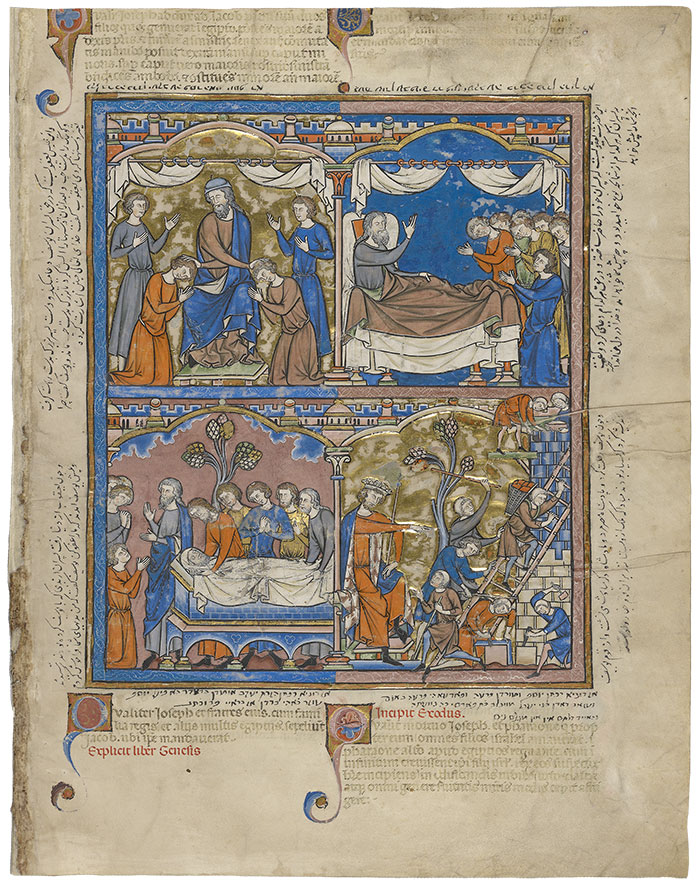
Blessings for the Future, Jacob's Last Words, Joseph's Last Prediction, Enslavement
Old Testament Miniatures with Latin, Persian, and Judeo-Persian inscriptions
Purchased by J.P. Morgan (1867–1943) in 1916
Blessings for the Future
Jacob is sick and will soon die. Joseph is informed and brings his sons Manasseh and Ephraim to receive their grandfather's blessing. To Joseph's surprise, Jacob places his right hand on the head of the younger son, Ephraim, rewarding him the honor reserved for the eldest. Both shall be great, Jacob tells Joseph, but Ephraim's offspring will be a multitude among nations. (Genesis 48:13–20)
Jacob's Last Words
Jacob is on his deathbed. The brothers assemble to receive his final blessing. Jacob foretells the fate of each brother. Their destinies will determine the fate of the twelve tribes Israel. Jacob requests that his body be returned to Canaan to be buried with his forefathers, Abraham and Isaac. (Genesis 49:1–30)
Joseph's Last Prediction
Joseph is now a very old man. Before his death, he predicts how God will visit the Hebrews and send them out of Egypt. It is Joseph's wish that his body be removed from Egypt when that time arrives. In the meantime the brothers place Joseph's body in a sarcophagus. (Genesis 50:12–25)
Enslavement
A new pharaoh has risen to power and fears the numerous and prosperous Hebrews among his people. The Hebrews are enslaved and set to work on vast building projects. Pharaoh directs the oppression of the Jews, who are beaten by slave drivers even as they labor. In the bottom right foreground, a figure not unlike a medieval stonemason is struck on the back as he squares a stone; his partner busily works with hammer and chisel. (Exodus 1:8–11)
Image courtesy of Faksimile Verlag Luzern, www.faksimile.ch.
Folio 7r (Latin)
Upper left: How Joseph led to his father his two sons whom he had begotten in Egypt, placing the elder to the right of his father and the younger to his left. The old man, his hands crossed, placed his right hand upon the younger’s head but upon the elder’s head he placed the left, blessing them both and setting the younger before the elder. (Genesis 48: 1–20)
Upper right: How Jacob, in great sickness and close to death, tells his sons that which will befall them, ordering them to bury him with his fathers. (Genesis 49)
Lower left: How Joseph and his brothers together with the king’s household and many other Egyptians bury Jacob where he himself had ordered. Here ends the book of Genesis. (Genesis 49: 1–13)
Lower right: Here begins the book of Exodus. How, after the death of Joseph and the Pharaoh who, on his account, had liked the children of Israel, as another Pharaoh was ruling over the Egyptians, when the Children of Israel had increased abundantly, the king, starting to suspect them, began oppressing them in strange ways by building cities of mud and bricks and by all sorts of servitude. (Exodus 1: 6–14)
Folio 7r (Persian)
Upper left margin: And this is the image of Jacob who blesses the sons of Joseph and holds the hand of the elder son in his right hand and the younger in his left; and after that he changed hands so the elder remained in [his] left hand. And Joseph asked, "Why did you change hands?" Jacob said, "God the Exalted has so commanded."
Upper right margin: This is His Excellence Jacob who summoned his sons and blessed each one separately telling them how each shall be what shall befall them [because] God has grafted on his soul whatsoever shall happen to them.
Lower left margin: When Jacob died, the sons, fearing the evil they had done to Joseph, went to Joseph asking for forgiveness. Joseph said, "I have forgotten your evils."
Lower right margin: And when Joseph died, and the king of Egypt died, and another king ascended to rule, he wondered about the tribe of Joseph who were numerous lest they seize the kingdom from him. He sanctioned the oppression of that people.
Folio 7r (Judeo-Persian)
Upper left, beneath Latin: The tale of Jacob blessing Joseph’s sons.
Upper right, beneath Latin: The gathering of the tribes before Jacob, peace be upon him, and his blessing each one of them.
Lower left, above Latin: His Excellence Jacob departs from the world and the brothers come before Joseph to beg his forgiveness for his having been sold.
Lower right, above Latin: [After] Joseph’s death and the death of Pharaoh, [there came] the reign of a second Pharaoh who tormented the Children of Israel. The Persian text as it found [here] is wrong; this is not what it says.
Italicized words are in Hebrew.
Content consultant: Richard Leson
Persian translated by Sussan Babaie
Judeo-Persian translated by Vera Basch Moreen
Latin translation by Eran Lupu
After the commentary volume accompanying the Fine Art Facsimile edition by Faksimile Verlag Luzern
MS M.638, fol. 7v
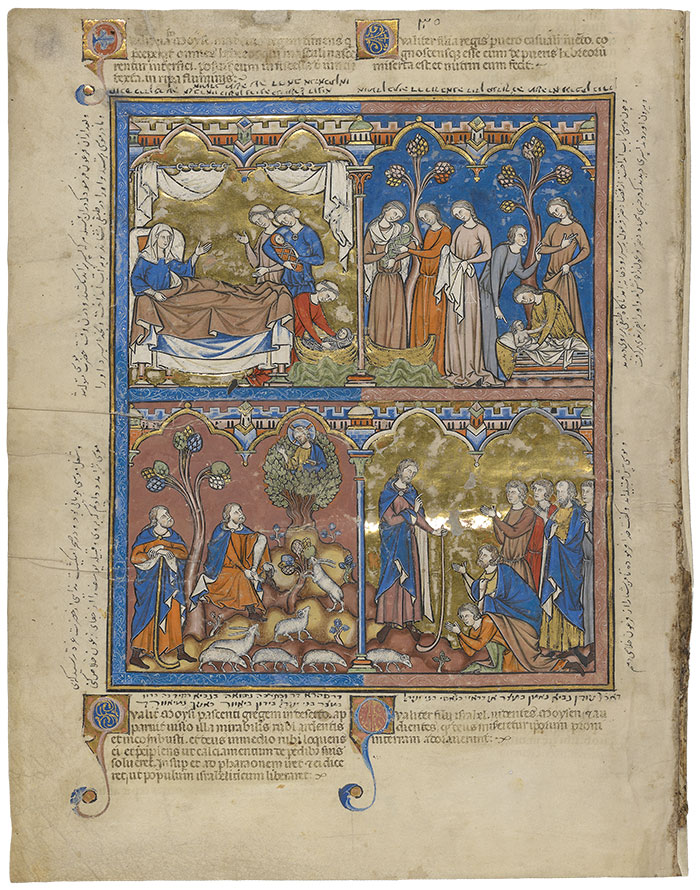
A Single Escapee, Moses, The Lord calls to Moses, The Deliverer
Old Testament Miniatures with Latin, Persian, and Judeo-Persian inscriptions
Purchased by J.P. Morgan (1867–1943) in 1916
A Single Escapee
Pharaoh has ordered the slaughter of all male children born to the Hebrews. To save the life of her newborn son, a sorrowing mother has him placed in a basket made of bulrushes and set afloat in the river. (Exodus 2:1–3)
Moses
Pharaoh's daughter and her maids come down to the river to bathe. There they make a marvelous discovery: a Hebrew child afloat in a basket. The merciful princess spares the boy's life and turns him over to a nurse. He shall be called Moses, the princess decides, meaning "I drew him out of the water." (Exodus 2:5–10)
The Lord calls to Moses
Now a grown man, Moses has fled Pharaoh's wrath and lives in the desert among the Midianites. One morning, Moses is tending his father-in-law's flock at Horeb, the mountain of God, when he is witness to a miracle: a bush burns with fire but is not consumed. The Lord calls to the stunned Moses from the midst of the bush: "Take your sandals off your feet, for the place where you stand is holy ground." (Exodus 3:1–8)
The Deliverer
Following the Lord's commands, Moses has returned to Egypt to free the Hebrews. The Israelite elders are assembled before Moses and informed of the news. After years of oppression and slavery, the Lord has visited them, and will soon put an end to their affliction. The men understand the power Moses has been given, and fall to their knees in adoration of the deliverer. (Exodus 4:28–31)
Folio 7v (Latin)
Upper left: How, upon the birth of Moses, his mother fearing the king who had ordered that all newborn male Hebrews be killed, put him in a little ark woven of rushes on the river’s bank. (Exodus 2:1–3)
Upper right: How the daughter of the king had found the child, and, knowing him to be of the Hebrew’s children, had compassion for him and devised that he be nursed. (Exodus 2: 5–10)
Lower left: How, as Moses was tending his flock in the desert, there appeared to him that marvelous vision of a bush burning without being consumed, and God, talking to him in the midst of the bush and telling him to put off his shoes from his feet, and moreover to go to Pharaoh and to tell him to set the Israelites free. (Exodus 3:2–10)
Lower right: How the children of Israel, seeing Moses and hearing that God had compassion for them, leaned to the ground in worship. (Exodus 4: 29–31)
Folio 7v (Persian)
Persian foliation: 35
Upper left margin: And thereafter, Pharaoh ordered the killing of all the sons born to anyone in this tribe. At that time, His Excellence Moses was born and his mother was afraid and she placed him in a basket and cast it into the water entrusting him to God.
Upper right margin: And when they threw Moses into water, by chance Pharaoh’s daughter came by the river and suddenly saw a basket on it and they pulled it out. They saw a boy wrapped in stuff; Pharaoh’s daughter was pleased and took him in as her child.
Lower left margin: Moses’s occupation was that of a shepherd and [once] while in the desert a voice from His Excellence [God] the Exalted came that "O, Moses, We assist you to go and save the tribe of Joseph from Pharaoh’s oppression."
Lower right margin: Moses came to the tribe and said, "God has commanded [me] to deliver you from Pharaoh."
Folio 7v (Judeo-Persian)
Upper left, beneath Latin: Pharaoh decrees the killing of male [children from among the] Children of Israel. The birth of Moses, peace be upon him, and casting him into the water.
Upper right, beneath Latin: Bithiah’s coming to the river, her seeing Moses’ small basket, taking it and carrying it off.
Lower left, above Latin: In the desert when a voice came to the prophet saying: "Go to Egypt to bring out the Children of Israel, [Moses thought] "I wish He would not bring them out."
Lower right, above Latin: The entrance of the faithful prophet into Egypt in order to deliver the Children of Israel.
Italicized words are in Hebrew.
Content consultant: Richard Leson
Persian translated by Sussan Babaie
Judeo-Persian translated by Vera Basch Moreen
Latin translation by Eran Lupu
After the commentary volume accompanying the Fine Art Facsimile edition by Faksimile Verlag Luzern
MS M.638, fol. 8r
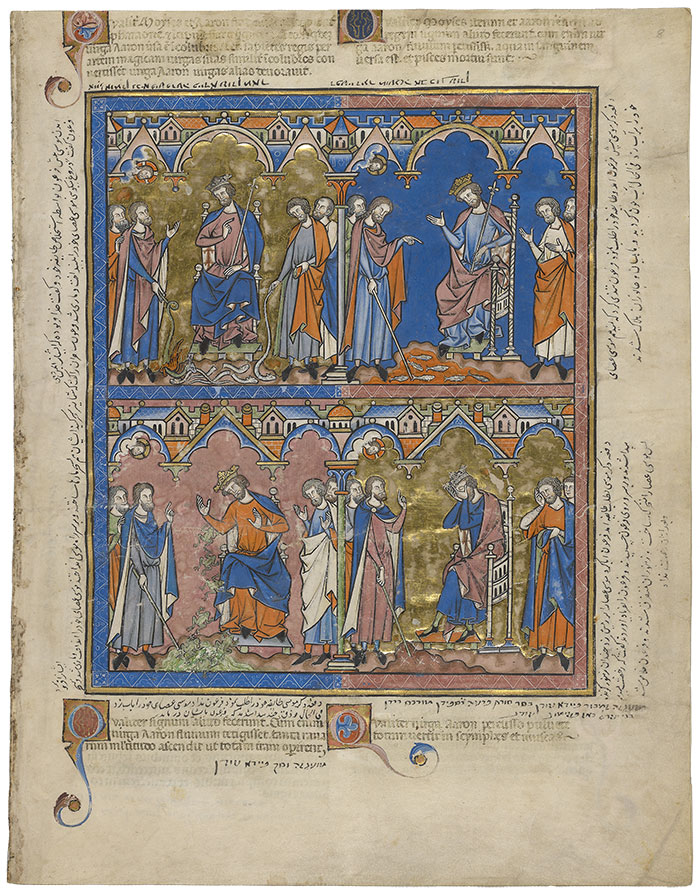
Divine Demands, The Nile Turned to Blood, Amphibian Assault, Vermin
Old Testament Miniatures with Latin, Persian, and Judeo-Persian inscriptions
Purchased by J.P. Morgan (1867–1943) in 1916
Divine Demands
The Lord has sent Moses and his brother Aaron to Pharaoh with demands. As a sign of his power, the Lord has transformed Aaron's staff into a winged serpent, but Pharaoh is unimpressed because his own magicians duplicate the feat. Unnoticed by the Egyptians, Aaron's winged serpent devours those of the magicians, foreshadowing the coming wrath of the Lord. (Exodus 7:10–13)
The Nile Turned to Blood
Pharaoh and his sorcerers look on in dismay as Aaron strikes the Nile with his staff, transforming the waters into blood and killing the fish. Pharaoh is still not swayed, however, as his magicians duplicate this feat with false magic. (Exodus 7:20–22)
Amphibian Assault
Again Moses and Aaron confront Pharaoh; this time, when Aaron strikes the waters, a gruesome plague of frogs overtakes the land. The magicians are able to duplicate the feat, but Pharaoh is now uneasy. The king pleads with the brothers to take away the frogs; in turn, he promises to release the Hebrews so that they might sacrifice to the Lord. (Exodus 8:6–8)
Vermin
Once again, God hardens the heart of the king of Egypt in order that He might work great wonders before men. Always the Lord observes from heaven as the instruments of His will, Moses and Aaron, perform miracles before Pharaoh. Now Aaron, instructed by Moses, strikes the dust with his staff and summons forth a plague of lice and flies. (Exodus 8:17–25)
Folio 8r (Latin)
Upper left: How Moses and his brother Aaron talk to Pharaoh and start to show miracles before him. Indeed, Aaron’s rod had turned into a serpent, but when by their magical art the king’s wise men had also turned their rods into serpents, Aaron’s rod swallowed up the other rods. (Exodus 7: 1–12)
Upper right: How Moses and Aaron, having returned to the king, showed another miracle. For when Aaron had smote the river the water was turned into blood and the fish died. (Exodus 7: 19–21)
Lower left: How they showed another miracle. For when Aaron’s rod had touched the river such a multitude of frogs went up that they covered all the land. (Exodus 8:1–7)
Lower right: How, when Aaron’s rod had smote the dust, it all turned into lice and flies. (Exodus 8: 16–24)
Folio 8r (Persian)
Left Margin: Moses coming before Pharaoh for the liberation of his people, saying, "God has commanded that you deliver them to me." Pharaoh said, "You lie." Moses threw his staff and it turned into a serpent. Pharaoh told the magicians, "You too perform magic." They too made serpents with magic and threw them in Moses’ path. Moses threw his staff; it turned into a serpent and quelled their magic.
Lower left: Once again Moses came before Pharaoh and demanded his people. Pharaoh exhorted him, "I shall not give [them]." Moses struck water with his staff; the water instantly turned into blood and the fish and the creatures [in it] perished.
Upper right margin: The next time Moses came to demand his people, Pharaoh refused; Moses struck the water with his rod; instantly so many frogs appeared that the Pharaoh was helpless.
Lower right margin: The next time Moses came to demand his people, Pharaoh refused; Moses struck the ground with his staff; so many bees appeared and sat on Pharaoh’s head and face and made Pharaoh cry that he said to halt. So Moses shook his staff and the bees dispersed and Pharaoh was relieved and afterwards he did not release [them].
Folio 8r (Judeo-Persian)
Upper left, below Latin: The first coming of the prophet before Pharaoh.
Upper right, below Latin: On another occasion, the miracle of water turning into blood.
Lower left, below Latin: The miracle of the appearance of the frogs.
Lower right, above Latin: The miracle of the appearance of the bees and their sticking to the head of His Excellence, Pharaoh; his giving permission to the Children of Israel to [go and] repent.
Italicized words are in Hebrew.
Content consultant: Richard Leson
Persian translated by Sussan Babaie
Judeo-Persian translated by Vera Basch Moreen
Latin translation by Eran Lupu
After the commentary volume accompanying the Fine Art Facsimile edition by Faksimile Verlag Luzern
MS M.638, fol. 8v
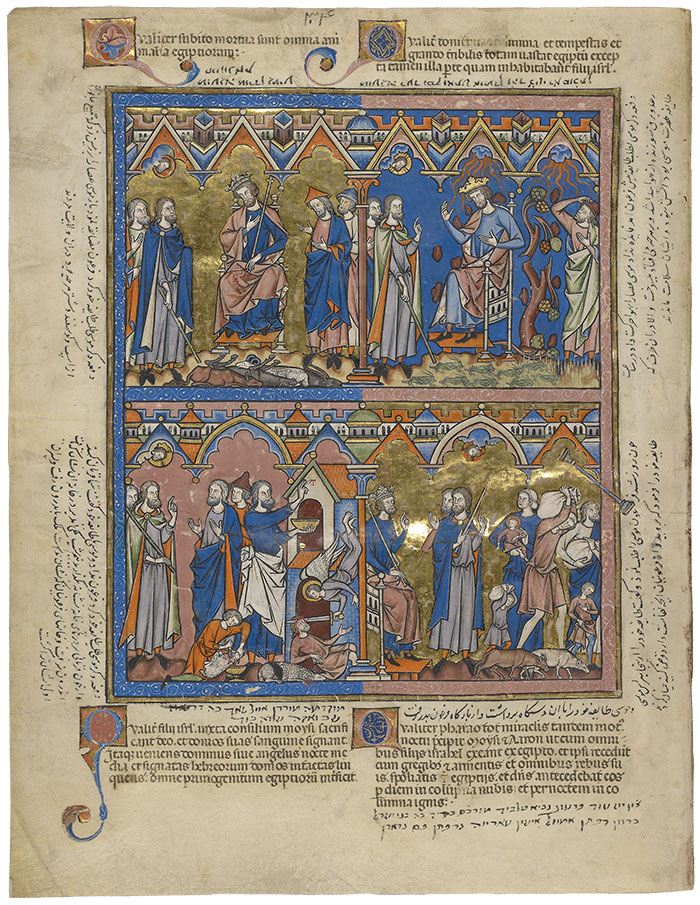
The Egyptian Cattle Slain, Hail and Locusts, Passover, Deliverance
Old Testament Miniatures with Latin, Persian, and Judeo-Persian inscriptions
Purchased by J.P. Morgan (1867–1943) in 1916
The Egyptian Cattle Slain
Pharaoh still refuses to release the Israelites. In turn, the Lord brings a great plague upon Egypt's livestock; although oxen, sheep, goats, and horses lie dead, not a single animal has died from among the Israelite flocks. (Exodus 9:1–7)
Hail and Locusts
Again the king stubbornly ignores Moses' predictions of the Lord's wrath. Now the whole of Egypt suffers as lightning strikes the earth and hailstones hurtle from the sky, crushing trees, man, and beast. What little plant life is left is consumed by a voracious plague of locusts. Still, Pharaoh refuses to let the Israelites leave. (Exodus 9:23–26, Exodus 10:12–19)
Passover
The Lord vows to afflict Egypt with a final, most terrible plague: at midnight, the Lord will enter the land to kill the first-born sons of man and beast. Moses explains the Lord's instructions to the Israelites: take a lamb, and with its blood mark the door of every home. Seeing this sign, the Lord will pass over you, and keep you safe. Accordingly, one of the Israelites paints a 't' cross above his door with a pen. At midnight, before the unmarked door of an Egyptian house, the Lord arrives in the form of an angel of Death and begins the slaughter. (Exodus 12: 21–29)
Deliverance
The Lord has slain all of Egypt's firstborn, from the son of Pharaoh to the first-born of cattle. The king, broken, summons Moses and Aaron. Gather your herds and all of your possessions, Pharaoh commands, and depart from Egypt forever. The Israelites depart bearing sacks of unleavened dough. Note that in this miniature a woman holds in her arms a child with a halo and that the people are preceded by a floating column. The child and column are creative allusions to the biblical text; the haloed child reflects the Lord's command to consecrate every first-born male, and the column is a literal interpretation of the pillar of fire that was provided by the Lord to guide the Israelites at night. (Exodus 12:37–13:21)
Folio 8v (Latin)
Upper left: How all the animals of the Egyptians died at once. (Exodus: 9–16)
Upper right: How thunder and lightning and storm and hail laid waste all of Egypt except the part where the children of Israel were dwelling. (Exodus 9:22–26)
Lower left: How the children of Israel sacrifice to God according to Moses’ counsel and mark their houses with blood. Thus God or an angel, coming at midnight and leaving the marked houses intact, kills each and every Egyptian firstborn. (Exodus 12: 21 – 29)
Lower right: How, Pharaoh, at last prevailed upon by so many miracles, orders Moses and Aaron at night to go out of Egypt with all the children of Israel, and they leave with their flocks and their herds and all of their possessions, the Egyptians having been despoiled, and the Lord goes before them by day in a pillar of cloud and by night in a pillar of fire. (Exodus 12:30 – 13: 22)
Folio 8v (Persian)
Persian foliation: 34
Upper left margin: Once again Moses demanded his tribe; Pharaoh refused. Again Moses struck the ground with the staff so that all animals, from horse and sheep and camel, whatever there was in that land, perished.
Upper right margin: The next time Moses came before Pharaoh demanding his tribe, he was unsuccessful. Moses shook his staff in the air. Suddenly, burning thunder and lightning appeared in the sky and it burned whatsoever it struck except [that] fire did not appear on the side where the tribe of His Excellence Moses was and they remained intact.
Lower left margin: The next time Moses demanded his tribe, Pharaoh refused and Moses told his tribe," Offer sacrifices and mark with the sacrificial blood the doors of the houses." At midnight, an angel came to the doors of the houses; if he found the mark, he did not enter, and he entered those houses of the Egyptians which were unmarked and he slew their first-born sons.
*Lower right margin: When day broke, Pharaoh summoned Moses and said, "Take away your tribe." So Moses told his tribe to go and borrow all that was valuable from the Egyptians; and they did so.
Lower right: And Moses took his people with the possessions and departed from the court of Pharaoh.
*The text starts from the right side of the illustration and continues at the bottom.
Folio 8v (Judeo-Persian)
Upper left, below Latin: The miracle of the death of all animals.
Upper right, below Latin: The miracle of thunder and lightning and the coming of fire which burned everything.
Lower left, above Latin: The miracle of the death of the firstborn which occurred at night.
Lower right, below Latin: When morning came Pharaoh sought out the prophet and gave permission for the Children of Israel to leave. They asked to borrow their [the Egyptians’] property but they did not give it.
Italicized words are in Hebrew.
Content consultant: Richard Leson
Persian translated by Sussan Babaie
Judeo-Persian translated by Vera Basch Moreen
Latin translation by Eran Lupu
After the commentary volume accompanying the Fine Art Facsimile edition by Faksimile Verlag Luzern
MS M.638, fol. 9r
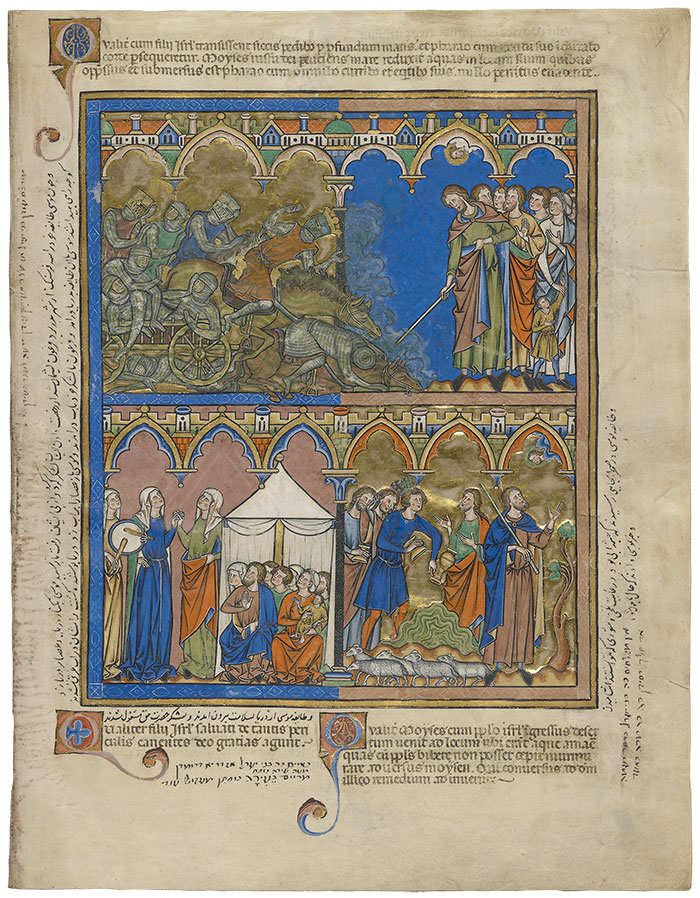
Divine Vengeance, A Joyful Celebration, Bitter Waters
Old Testament Miniatures with Latin, Persian, and Judeo-Persian inscriptions
Purchased by J.P. Morgan (1867–1943) in 1916
Divine Vengeance
Pharaoh learns that the Israelites are lost in the wilderness and vows vengeance upon them. Egyptian war chariots corner the Israelites at the Red Sea, and the people are certain of their doom. But Moses, at the Lord's command, raises his hand above the waters and miraculously parts the sea. The Israelites flee over dry land to the opposite shore, the Egyptians in bold pursuit. Now Pharaoh and his army pay the ultimate price for this conceit: with all of the Israelites safely ashore, Moses strikes the sea a final time, and the waters envelop the enemy. (Exodus 14:21–30)
A Joyful Celebration
Miriam, prophetess and sister of Aaron and Moses, plays a timbrel as other women dance and rejoice. Seated before a tent, Moses and the Israelites look on and give thanks to the Lord. Notice how Miriam's gaze is directed toward the drowning horse and rider above, perhaps a literal reference to her words of praise: "Sing to the Lord, for He has triumphed gloriously! The horse and his rider He has thrown into the sea!" (Exodus 15:1–21)
Bitter Waters
In the wilderness, the bitter waters of Marah dismay the people, and the flocks thirst, but the Lord hears Moses' plea and reveals to him a tree that will sweeten the waters. (Exodus 15:22–24)
Folio 9r (Latin)
Upper half: How, when the children of Israel crossed the depths of the sea with dry feet, and Pharaoh, his heart hardened, was pursuing them with his host, Moses, striking the sea as God had ordered, reduced into one place the sea water in which Pharaoh was overwhelmed and submerged with all his chariots and horses, absolutely none escaping. (Exodus 14)
Lower left: How the children of Israel, saved from such dangers, give thanks to God. (Exodus 15: 1–21)
Lower right: How Moses and the people of Israel, having entered the desert, came to a place where the water was bitter and, as the people could not drink it, they began murmuring against Moses. He, turning to God, devised a remedy on the spot. (Exodus 15: 23–26)
Folio 9r (Persian)
*Left margin: And when Moses had led his tribe three leagues out of the city, Pharaoh regretted having released them. He gathered the army and pursued them. When Moses reached the seashore and struck the sea with his staff, a path appeared. Moses with his people stepped into the sea and Pharaoh and his army [also] entered the water. And Moses struck the water again and the sea closed in and they [the Egyptians] drowned.
Lower left: The tribe of Moses emerged from the sea unscathed and embarked on praising his Excellence the God.
*The inscription begins in the Left Margin and continues beneath the Lower Left quadrant.
Lower right margin: The tribe of Moses reached a place in the desert where there was a well of water [so] exceedingly bitter and salty that they could not drink and they informed Moses wondering what shall happen to them.
Folio 9r (Judeo-Persian)
Left margin, furthest left: Having been authorized, the Children of Israel [exit] from Egypt. Pharaoh, repenting [of having granted permission], sends the army after them.
Lower left, beneath Latin: Here it is that the Children of Israel, having come out of the sea, Moses [and] Miriam busied themselves with singing.
Lower right margin, bottom corner: This is the scene when the Children of Israel arrived at the spring of bitter water, which was Marah.
Italicized words are in Hebrew.
Content consultant: Richard Leson
Persian translated by Sussan Babaie
Judeo-Persian translated by Vera Basch Moreen
Latin translation by Eran Lupu
After the commentary volume accompanying the Fine Art Facsimile edition by Faksimile Verlag Luzern
MS M.638, fol. 9v
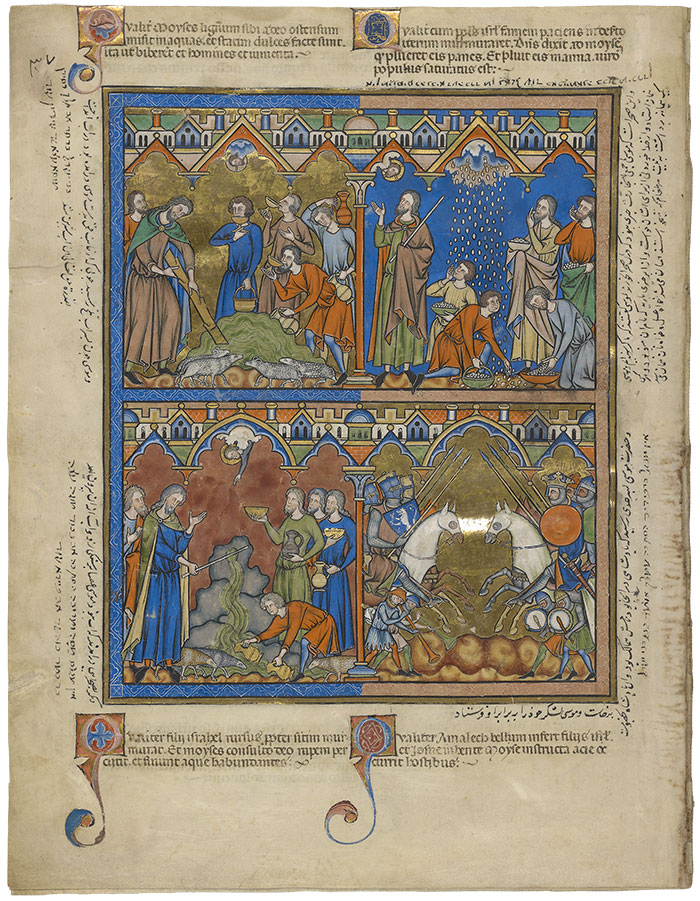
Sweetener, Manna, The Lord Provides, Joshua, a Soldier
Old Testament Miniatures with Latin, Persian, and Judeo-Persian inscriptions
Purchased by J.P. Morgan (1867–1943) in 1916
Sweetener
Moses, following the Lord's command, casts the tree into the bitter waters. The Israelites gather around with drinking cups and vessels to collect the sweetened waters. In the foreground, a group of sheep quenches its thirst. (Exodus 15:24–25)
Manna
Hunger has overcome the Israelites in the wilderness, and the congregation begins to murmur against Moses. The Lord hears these complaints, however, and rains bread from heaven upon the people. The Israelites collect the bread, each according to his own need, following the instructions Lord has given to Moses. (Exodus 16:11–15)
The Lord Provides
Once more the Israelites complain to Moses of thirst, but again the Lord provides. Moses, in obedience to God, strikes the rock at Horeb with his staff, and a spring bursts forth to quench the thirst of the people and their flocks. (Exodus 17:3–6)
Joshua, a Soldier
Amalek and his army threaten the Israelites with war. Moses commands Joshua, son of Nun, to assemble an army. The opponents face each other across a field at Rephidim, in this illustration arrayed in thirteenth-century battle dress. Joshua wears a brown tunic and carries a tri-point shield emblazoned with a lion. He and his cavalry all wear great helms. The enemy horsemen, to include the crowned Amalek, wear an older style of pointed helmet with a nasal guard. In the foreground, trumpeters and drummers sound the call to battle. (Exodus 17:8–13)
Folio 9v (Latin)
Upper left: How Moses cast into the water a tree which had been just shown to him and the water was made sweet so that the people and the cattle drank. (Exodus 15:25)
Upper right: How when the people of Israel, suffering from hunger, were murmuring once more in the desert, the Lord said to Moses that it would rain bread for them. And it rained manna, which satisfied the people. (Exodus 16: 1–15)
Lower left: How the people of Israel murmur again in thirst, and Moses, having consulted with God, smites a rock and water flows abundantly. (Exodus 17: 1–7)
Lower right: How Amalek attacks Israel and, at Moses’ command, Joshua forms an army and falls upon the enemies. (Exodus 17: 8–10)
Folio 9v (Persian)
Persian foliation: 37
Upper left margin: When Moses reached the bitter water, he threw the rod that he had received from God into the water; by the power of God the Exalted, the water turned sweet.
Upper right margin: And this is the desert into which Moses went with the community. There was nothing to eat in that desert. They said to Moses, "We are hungry." Moses stood in prayer and asked God for food for them. And it rained something from the cloud called Minoo [manna] and each took in a cup as much as they wished and for each it turned into what they desired, be it honey or bread.
Lower left margin: Then they came to a desert where there was no water; Moses struck a rock with the rod and water emerged.
Lower right margin & lower right: His Excellence Moses arrived at a frontier where there was a king named Hamalek [Amalek] and that king rose in enmity and Moses sent forth his army to confront him.
Folio 9v (Judeo-Persian)
Upper left margin, furthest left, corner:The Children of Israel, having arrived at the [spring of] bitter water, Moses struck it with [his] staff [and] sweetened it.
Upper right, below Latin: This is the scene when the prophet [Moses] prayed [and] manna descended; they carried it in goblets.
Lower left margin, furthest left: This is the scene of Massah and Meribah when there was no water and Moses struck the middle of the mountain [sic!] [and] water appeared.
Lower right margin, furthest right: This place is at Rephidim when Amalek came to fight the Children of Israel.
Italicized words are in Hebrew.
Content consultant: Richard Leson
Persian translated by Sussan Babaie
Judeo-Persian translated by Vera Basch Moreen
Latin translation by Eran Lupu
After the commentary volume accompanying the Fine Art Facsimile edition by Faksimile Verlag Luzern
MS M.638, fol. 10r
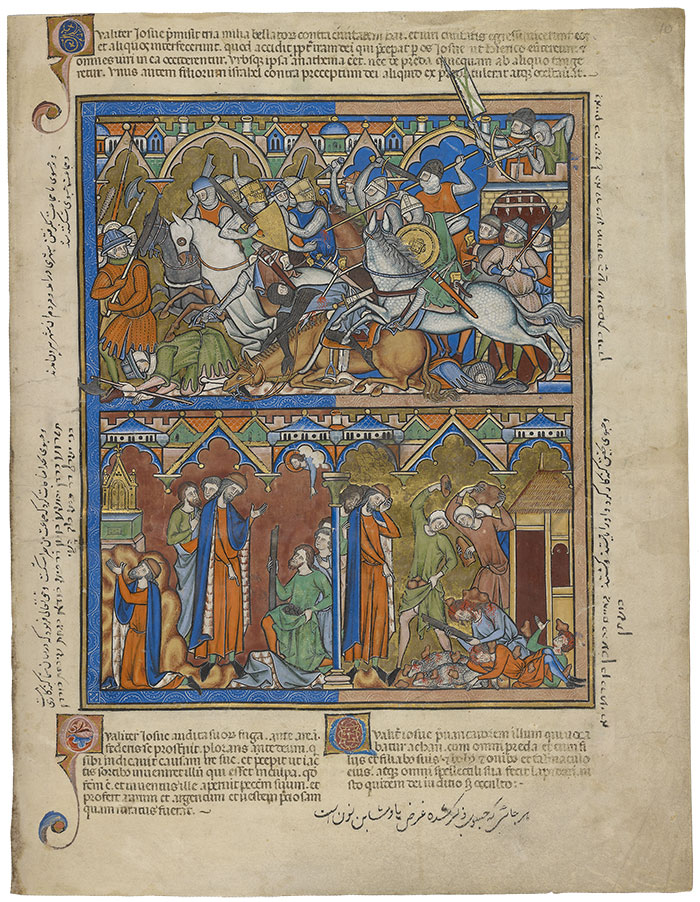
Joshua Defeated at Ai, A Costly Transgression Revealed, Achan Stoned
Old Testament Miniatures with Latin, Persian, and Judeo-Persian inscriptions
Purchased by J.P. Morgan (1867–1943) in 1916
Joshua Defeated at Ai
This is the first of the Picture Bible's great battle scenes. Joshua has taken a small contingent of the army to destroy the Amorite city of Ai. As soon as the Israelites arrive at the city gates, they are repulsed by a small force of defenders, including a crossbowman who takes aim from atop the portcullis. Thirty-six men of the expedition are killed as Amorite horsemen vengefully pursue and strike down their assailants. Joshua, shown again in brown tunic and with tri-point shield, narrowly escapes with his life. Nearby, an Amorite breaks his spear in the side of an Israelite horseman whose mount has collapsed beneath him, and a disoriented Israelite foot soldier is trampled by the fleeing cavalry. (Joshua 7:1–5)
A Costly Transgression Revealed
Confused and aggrieved by the defeat at Ai, Joshua prostrates himself before the Ark of the Covenant (depicted here as a rich reliquary chest) and begs for an explanation. It is discovered that Achan, a man of the tribe of Judah, took forbidden spoil from the accursed town of Jericho. Later Achan confesses the sin to Joshua; he and his family show Joshua a bar of gold (here painted silver), a rich garment, and two hundred shekels. The Lord points accusingly at the greedy family from the heavens. To appease Him, they must be destroyed. (Joshua 7:19–23)
Achan Stoned
Although Joshua appears loathe to do so, he orders the stoning of Achan, his entire family, and his cattle. Later, the Israelites will destroy Achan's thatched dwelling; all the possessions of the transgressor must be done away with in order to appease the Lord. (Joshua 7:24–25)
Folio 10r (Latin)
Upper half: How Joshua sent ahead three thousand warriors against the city of Ai and the men of the city went out, defeated them and killed some, a thing which was brought about by the anger of God who had commanded through Joshua’s mouth that Jericho be destroyed and its men be killed; the city itself was to be accursed and no spoils were to be taken. But one of the children of Israel had taken of the spoils and concealed it against God’s command. (Joshua 7: 3–12)
Lower left: How Joshua, upon hearing about his men’s flight, sat down before the ark and prostrated himself before God who indicated what was the cause of his anger and ordered that lots be cast and the one who was to blame be found. This was done and the person, once found, revealed his sin, and he brings forth the gold and silver and the precious cloth which he had stolen by stealth. (Joshua 7: 6–23)
Lower right: How Joshua brought about that this transgressor, Achan by name, be stoned with all the spoils and with his sons and daughters, his cattle and sheep, and his tent with its content, as the judgment of God is indeed just but hidden. (Joshua 7: 24–25)
Folio 10r (Persian)
Upper left margin: And Joshua with a company came to capture a city and the people of that city came out and the company of Joshua was broken up.
Lower left margin: And Joshua prayed to God [imploring Him], "Why has my company been defeated?" And God the Exalted said, "There is a sinner among you."
Lower right margin: Joshua searched for the sinner and they found him and killed him.
Lower right: Wherever Joshua is mentioned the intention is Yavush the son of Nun.
Folio 10r (Judeo-Persian)
Upper right margin: Here it is that the Israelites were defeated by the people of Ai.
Lower left margin, closest left: Joshua b. Nun supplicates before God on account of the defeat of the Children of Israel by the people of Ai.
Lower right margin, bottom corner: Here it is that they are killing Achan the son of Carmi.
Italicized words are in Hebrew.
Content consultant: Richard Leson
Persian translated by Sussan Babaie
Judeo-Persian translated by Vera Basch Moreen
Latin translation by Eran Lupu
After the commentary volume accompanying the Fine Art Facsimile edition by Faksimile Verlag Luzern
MS M.638, fol. 10v
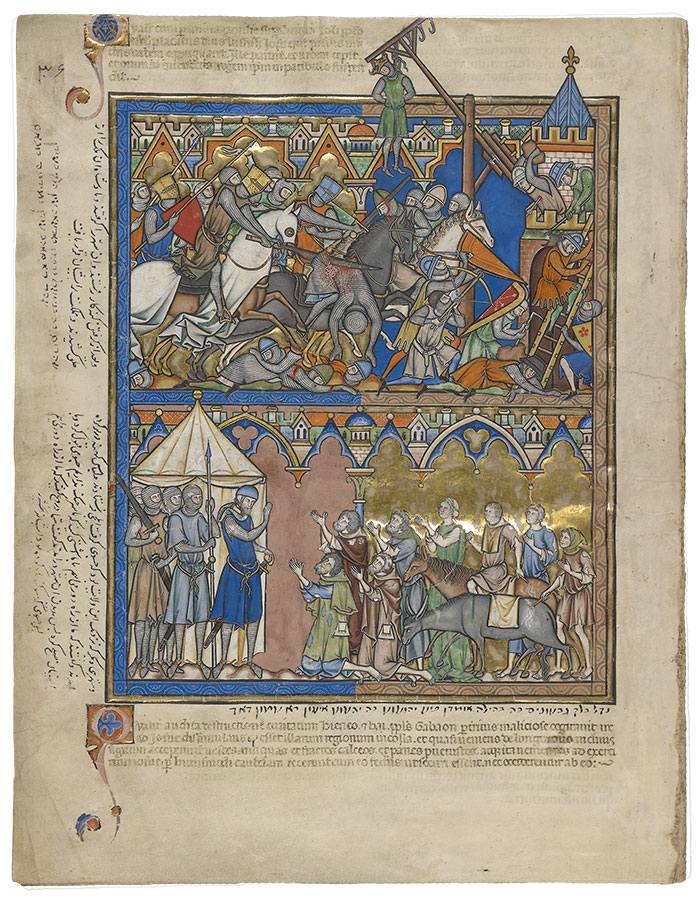
Victory at Ai, A Treaty
Old Testament Miniatures with Latin, Persian, and Judeo-Persian inscriptions
Purchased by J.P. Morgan (1867–1943) in 1916
Victory at Ai
A furious slaughter ensues as Joshua leads the Israelites once more against the city of Ai. Astride a bay horse fitted out with white trappings, Joshua deals a terrible blow with his two-handed glaive (a type of broadsword), splitting an opponent at the waist and spilling his entrails. The despairing defenders flee toward the besieged city, but they are clearly lost: above them, the king of Ai is suspended from a war engine. Meanwhile Israelite foot soldiers attack with crossbows and ladders at the city gate. (Joshua 8:18–29)
A Treaty
The Gibeonites are not eager to meet the same fate as their Amorite neighbors. Posing as vagabonds, they appeal to Joshua for mercy, and he makes a treaty with the Israelites. (Joshua 9: 3–15)
Folio 10v (Latin)
Upper half: How when God, now well disposed toward all the people of Israel after the punishment of one family, had commanded Joshua to set ambushes and attack the city, he obeyed, took the city and having killed all, hanged the king himself on a pole. (Joshua 8: 1–29)
Lower half: How, upon hearing about the destruction of the cities of Jericho and Ai, the people of Gibeon, greatly terrified, perfidiously planned to go to Joshua, concealing the fact that they were the inhabitants of those regions and pretending to be coming from far away. To make it evident they took old clothes and torn shoes and some very old bread, and thus coming to Joshua’s army, they made a treaty, by means of such a pledge, which guaranteed their safety and prevented him from killing them. (Joshua 9: 3–15)
Folio 10v (Persian)
Persian foliation: 36
Upper left margin: After seizing the sinner, they went and conquered that city and hanged the king of that city and the realm became theirs.
Lower left margin: And they sent an ambassador from another city which lay near the realm Joshua had captured; and they came clad in old garments and said, "We have come from far way, make peace with us for we do not intend war." Joshua accepted and made peace with them. And they entered to see the city. He [Joshua] said, "You have lied that you come from far away." But Joshua, who had sworn [to make peace], forgave them.
Folio 10v (Judeo-Persian)
Upper left margin, furthest left: This is a town which the Children of Israel conquered, hanged its king, and became masters of the town. I don’t know where this is.
Lower half, above Latin: This is the tale of the Gibeonites who came with treachery before Joshua so that Joshua would grant them safety.
Italicized words are in Hebrew.
Content consultant: Richard Leson
Persian translated by Sussan Babaie
Judeo-Persian translated by Vera Basch Moreen
Latin translation by Eran Lupu
After the commentary volume accompanying the Fine Art Facsimile edition by Faksimile Verlag Luzern
MS M.638, fol. 11r
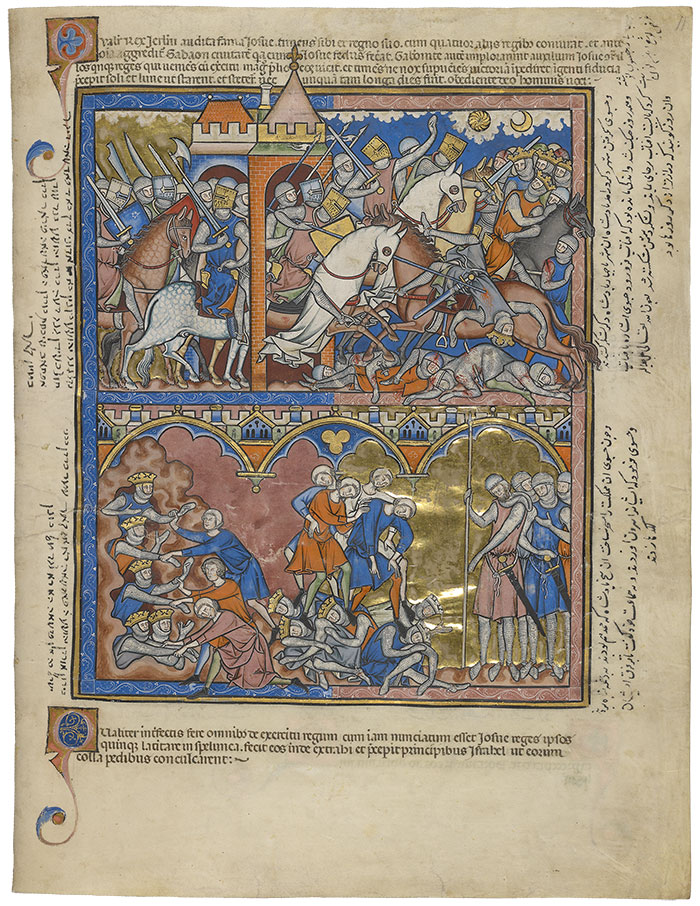
The Longest Day, Israel's Enemies Humiliated
Old Testament Miniatures with Latin, Persian, and Judeo-Persian inscriptions
Purchased by J.P. Morgan (1867–1943) in 1916
The Longest Day
Joshua and his army depart to defend the city of Gibeon, now under siege by the Amorite kings. Joshua is twice shown in this illustration; in the center, he rides through a city gate and spears an enemy king. Behind this group he appears again, imperiously commanding the sun and moon to remain motionless in the sky. As daylight is prolonged, the Israelites have ample time to revenge themselves upon their enemies. To the right, the other Amorite kings flee their attackers. (Joshua 10:6–13)
Israel's Enemies Humiliated
Joshua soon learns that his enemies are hiding in a cave at Makkedah. Israelite men drag the five kings from their hiding place, and, in obedience to Joshua, they trample on the kings' necks. Joshua, still holding his spear, encourages the men, reminding them that a similar fate awaits all those who oppose the Lord. (Joshua 10:15–25)
Folio 11r (Latin)
Upper half: How when Joshua’s fame had reached the king of Jerusalem, he, fearing greatly for himself and his kingdom, conspired with four other kings, and first of all attacks the city of Gibeon, since it had made a treaty with Joshua. But the people of Gibeon begged Joshua for help against these five kings and he, coming with a great army, defeated them in battle. Yet, fearing that night would come and prevent the victory, he ordered with great assurance the sun and the moon to stand still. Indeed, there has never been a day as long as that one, as God was obeying a human voice. (Joshua 10: 1–14)
Lower half: How when almost all the men of the king’s army had been killed and it had been told to Joshua that the five kings themselves were hiding in a cave, he had them dragged out and ordered the captains of Israel to trample on their necks with their feet. (Joshua 10: 17–24)
Folio 11r (Persian)
*Upper right margin: Wherever Joshua is written, Joshua the son of Nun is intended.
Upper right margin: And Joshua set out to conquer the other city. The king of that city, with four other kings, levied an army and war broke out on that day. A little while before the sunset, Joshua pointed to it [saying], "Stop!" The sun halted in place and the army of the enemy broke up, by the assistance of the Most High God, exalted be His glory. And it is said that that day was longer than any other.
When Joshua conquered that realm, those five kings who had aided each other took refuge in a cave. And Joshua ordered that they be drawn out and told his people to trample on their heads.
*This inscription in the upper right hand corner.
Folio 11r (Judeo-Persian)
Upper left margin: The tale of Joshua b. Nun’s war with Adoni-zedek [and] with other kings and [their] fleeing the war; Joshua’s praying for the sun to become bound; he defeats the five kings and they flee to a cave.
Lower left margin: Joshua’s bringing out of the cave of the five kings and his commanding the Children of Israel that they should trample those kings.
Italicized words are in Hebrew.
Content consultant: Richard Leson
Persian translated by Sussan Babaie
Judeo-Persian translated by Vera Basch Moreen
Latin translation by Eran Lupu
After the commentary volume accompanying the Fine Art Facsimile edition by Faksimile Verlag Luzern
MS M.638, fol. 11v
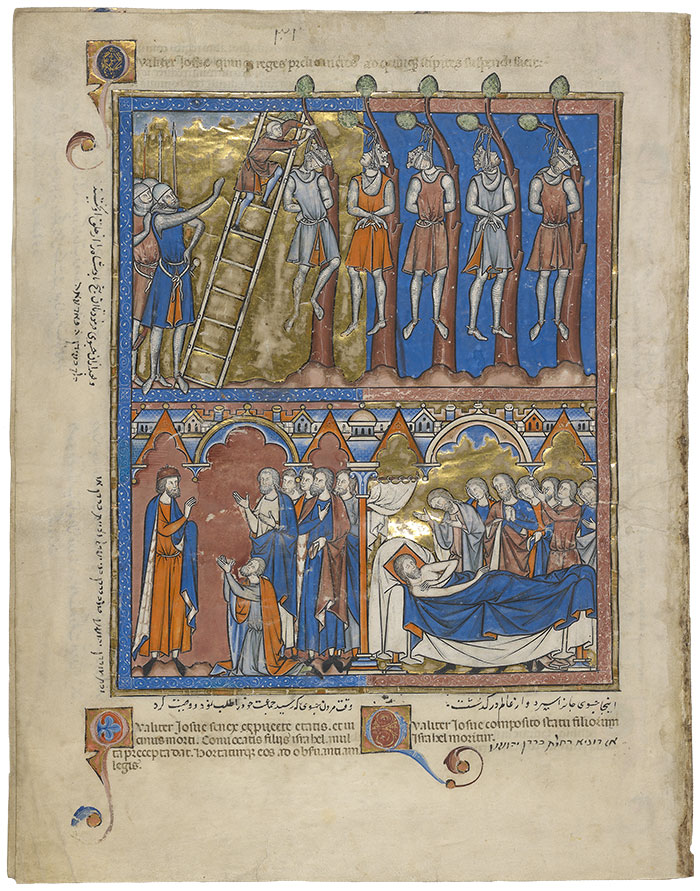
An Execution, Joshua's Final Commands, Joshua's Passing
Old Testament Miniatures with Latin, Persian, and Judeo-Persian inscriptions
Purchased by J.P. Morgan (1867–1943) in 1916
An Execution
After their humiliation, the five Amorite kings are hanged for a full day. Come evening, Joshua orders a soldier to take the bodies down. (Joshua 10:26–27)
Joshua's Final Commands
Years later, before his own death, an elderly Joshua exhorts the leaders of Israel to remember the many blessings of the Lord and to obey the law of Moses. (Joshua 23:1–14)
Joshua's Passing
Beside Joshua's deathbed, the people grieve and mourn the passing of their great leader. (Joshua 24:29–31)
Folio 11v (Latin)
Upper half: How Joshua had the five kings who had been defeated in battle hanged on trees. (Joshua 10: 26)
Lower left: How Joshua, old, advanced in years and near death, gives many orders to the assembled children of Israel, encouraging them to be observant of the laws. (Joshua 23: 1–24 – 24)
Lower right: How, the affairs of the children of Israel now settled, Joshua dies. (Joshua 24: 29)
Folio 11v (Persian)
Persian foliation: 33
Upper left margin: And after that Joshua ordered those five kings to be hanged.
Lower left: When Joshua’s death neared, he summoned his people and gave his last testament.
Lower right: Here, Joshua breathed his last breath and died.
Folio 11v (Judeo-Persian)
Upper left margin, furthest left: The hanging of the five kings.
Lower left margin: At the time of Joshua’s death, he seeks out the Children of Israel and bequeaths his will.
Lower right, beneath Latin: Joshua’s departure from the world.
Italicized words are in Hebrew.
Content consultant: Richard Leson
Persian translated by Sussan Babaie
Judeo-Persian translated by Vera Basch Moreen
Latin translation by Eran Lupu
After the commentary volume accompanying the Fine Art Facsimile edition by Faksimile Verlag Luzern
MS M.638, fol. 12r
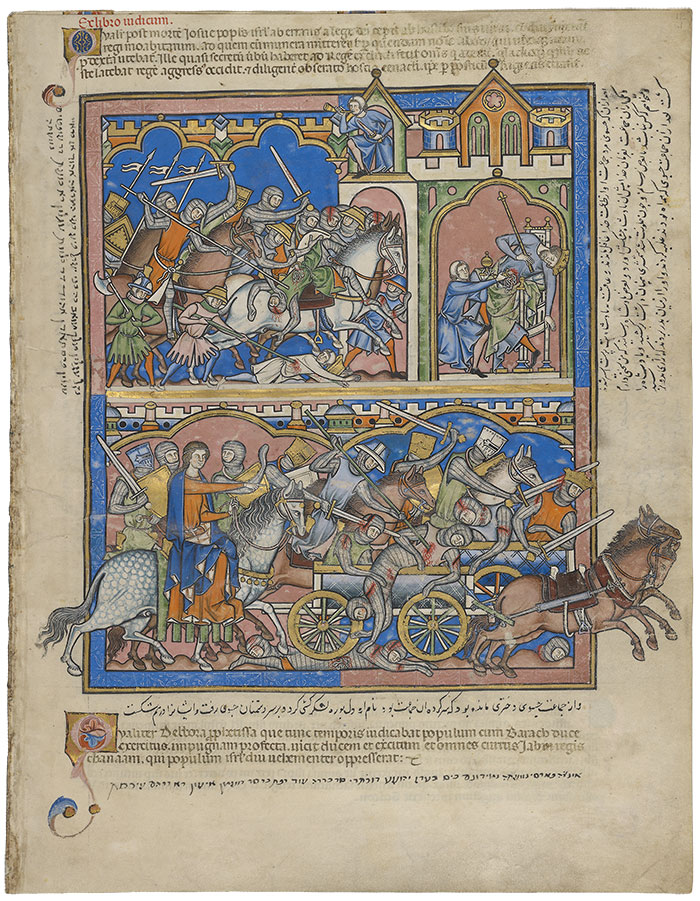
Ehud, a Clever Leader, Deborah, a Prophetess
Old Testament Miniatures with Latin, Persian, and Judeo-Persian inscriptions
Purchased by J.P. Morgan (1867–1943) in 1916
Ehud, a Clever Leader
After the death of Joshua, Israel falls into sin and displeases the Lord; as punishment, the people are made subservient to Eglon, king of the Moabites, for eighteen years. The people repent and plead with the Lord for a deliverer. The Lord chooses Ehud of the tribe of Benjamin. When the Moabite army departs to fight a foreign battle, clever Ehud gains a private audience with Eglon and brutally slays the king. Ehud escapes and summons the Israelite army with a trumpet. The Moabites are humbled. (Judges 3:20–30)
Deborah, a Prophetess
Following Ehud's death, the sins of the Israelites again displease the Lord. The people are made to suffer under the rule of Jabin, king of the Canaanites, for twenty years. Finally, the prophetess Deborah summons Barak to lead an attack against the Canaanite army. Deborah, riding side-saddle on a dappled charger, commands Barak and the Israelite forces. The exhausted and terror-stricken enemy offers no resistance even as its king receives his death blow. (Judges 4:8–16)
Folio 12r (Latin)
Upper half: From the Book of Judges. How, after the death of Joshua, the people of Israel began to stray from the law of God and to be subdued by their enemies and served the king of the Moabites for a long time. Now, when they sent gifts to him, through the agency of one, Ehud by name, who was able to use both hands for his right he, as if to have a word in secrecy with the king, dismissed all those who were present, approached the king and killed him with a dagger which was hidden under his clothes. Then, having carefully locked the doors of the parlor, he went out through the porch and escaped. (Judges 3:7–30)
Lower half: How Deborah the prophetess who was in those days judging the people with Barak the captain of the army, set out to battle and defeated the captain, the army, and all the chariots of Jabin, the king of Canaan, who had mightily oppressed the people of Israel. (Judges 4: 1–16)
Folio 12r (Persian)
Upper right margin: After Joshua died, his people slackened in their obeisance to God and were finally enslaved by an idolater king. And by the command of God, one of the disciples brought gifts before that king and told the king, "I have a word to deliver and would want no one present when I deliver it." And when it [the room] was cleared, he drew the sword he was hiding and slew the king. After that, the accompanying community of Joshua took over and rescued him [the killer] so he was not harmed.
Lower half: And there was a girl amongst the people of Joshua who was the leader of that group and her name was Delbureh [Deborah]. She levied an army and descended upon the enemies of Joshua and defeated them.
Folio 12r (Judeo-Persian)
Upper left margin: The tale of Eglon, king of Moab, when the Children of Israel sent a gift along with Ehud from Eglon. During the private [interview] he [Ehud] killed Eglon [as] it is written in Judges.
Lower half, beneath Latin: I do not know what is written in Persian.
Then, after Joshua, a girl became leader, she attacked the enemy and defeated them.
Italicized words are in Hebrew.
Content consultant: Richard Leson
Persian translated by Sussan Babaie
Judeo-Persian translated by Vera Basch Moreen
Latin translation by Eran Lupu
After the commentary volume accompanying the Fine Art Facsimile edition by Faksimile Verlag Luzern
MS M.638, fol. 12v
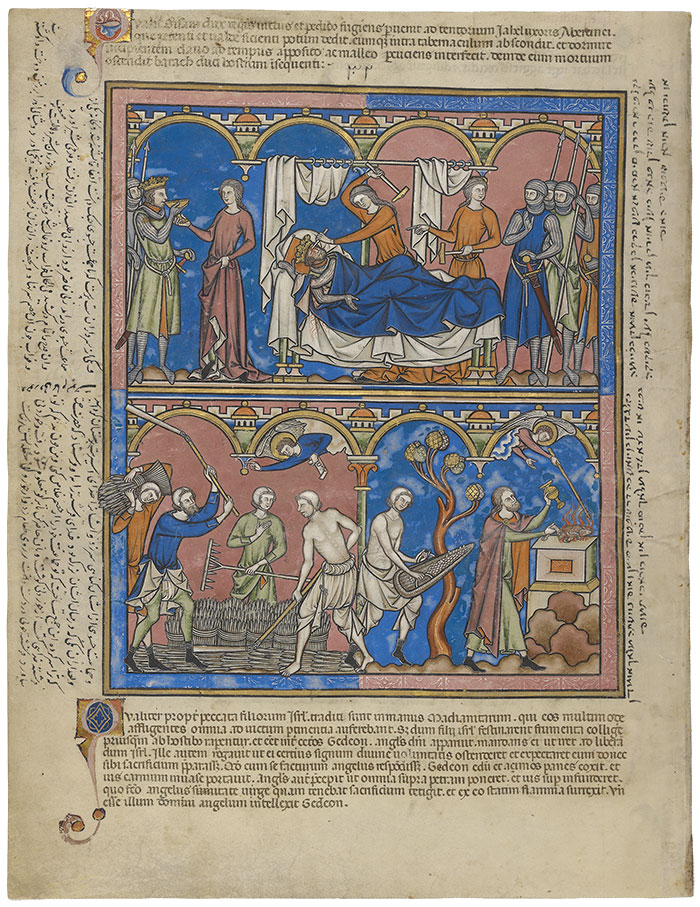
Jael, a Heroine, Gideon, Most Valiant of Men, A Sacrifice and a Sign
Old Testament Miniatures with Latin, Persian, and Judeo-Persian inscriptions
Purchased by J.P. Morgan (1867–1943) in 1916
Jael, a Heroine
Sisera, captain of the Canaanite army, has escaped the vengeance of the Israelites. He arrives at the tent of Jael, wife of Heber the Kenite, a former ally of his king, Jabin. The thirsty Sisera is given milk to drink and promised protection from his pursuers. As he sleeps, Jael quietly approaches with a hammer and a nail from the tent. Softly, she places the nail on Sisera's forehead and then, strikes. Instantly, he passes from deep sleep to death. In a little while Barak arrives, searching for his enemy, only to discover that Jael has already dealt with this opponent. (Judges 4:17–22)
Gideon, Most Valiant of Men
The Lord again sees fit to punish the children of Israel, for they have set up wooden images to honor the false deity Baal. For seven years, the people suffer the assaults of the Midianites, who rob them of all produce and livestock. Gideon, an Israelite farmer, is threshing wheat when the angel of the Lord calls to him, charging him to deliver Israel from bondage. Gideon and his companions are here dressed as medieval field workers; their flails and rakes imitate contemporary tools. (Judges 6:11–21)
A Sacrifice and a Sign
Gideon requests a sign from the angel of the Lord, confirmation that he has found favor in His sight. As a companion shakes corn in a winnowing-fan, Gideon offers a sacrifice of lamb and broth to the Lord. The angel touches this offering with his staff, and it bursts into flames, assuring Gideon of the Lord's favor. (Judges 6:11–21)
Folio 12v (Latin)
Upper half: How Sisera, the king’s defeated captain, fled on foot and reached the tent of Jael, the wife of Haber the Kenite, who gave him some drink as he was very thirsty and was asking for it, and hid him in her tent. As he fell asleep, she, having in due time placed nearby a nail of the tent and a hammer, smote and killed him. Then she showed his dead body to Barak, the pursuing enemy’s captain. (Judges 4: 17–22)
Lower half: How, on account of their sins, the children of Israel were delivered into the hand of the Midianites who, oppressing them in various ways, were carrying away all of their victuals. But when the children of Israel, with Gibeon among them, were hastening to collect the grain before it would be snatched away by their enemies, there appeared an angel of the Lord ordering Gibeon to go and free Israel. Now, he asked him to give a clear sign of the divine will and to wait for him while he prepared his sacrifice. Once the angel had responded that he would do so, Gideon prepared a kid and unleavened loaves and carried the broth of the flesh in a pot. The angel instructed him to lay everything upon a rock and to pour the broth thereupon. When this was done, the angel touched the sacrifice with the tip of his staff. Straightway a fire rose up, from which Gideon understood that this was the Lord’s angel. (Judges 6: 1–21)
Folio 12v (Persian)
Persian foliation: 32
Upper left margin: It happened that one of the leaders of the idolaters, who bore enmity towards Joshua’s people, became thirsty and came to the house of one of Joshua’s people. A woman was there; he asked her for water. The woman fetched a cup of milk and he drank the entire cup. Instantly, he was overcome with sleep; excessive drinking of milk results in weakness and sleep. When that foe lay down his head and fell asleep, the woman found an opportunity and brought a nail and nailed his forehead to the ground and he was slain.
Lower left margin: Joshua’s people committed a sin and God enslaved them to the idolaters. And, afterwards God dispatched an angel to one who was the elder amongst them saying that, "The Lord God has appointed you the commander of this company so that you deliver your people from the enemy." And he [said] "How do I know if you are the angel of God?" He said, "Prepare foods of meat and bread so it becomes apparent to you." He fetched food. The angel had a rod in hand; he struck the food and flames of fire arose from the food and all the food burned.
Folio 12v (Judeo-Persian)
Upper right margin: The tale of Sisera’s flight from Barak b. Abinoam, his coming to Jael’s tent to hide, to take refuge with Jael; Jael’s striking a nail in his temple and killing him
Lower right margin: The tale of Gibeon b. Joash, which is described in [chapter] 6 of Judges, [namely], the coming of the angel before him, his striking the angel with the staff and the burning of all the food.
Content consultant: Richard Leson
Persian translated by Sussan Babaie
Judeo-Persian translated by Vera Basch Moreen
Latin translation by Eran Lupu
After the commentary volume accompanying the Fine Art Facsimile edition by Faksimile Verlag Luzern
MS M.638, fol. 13r
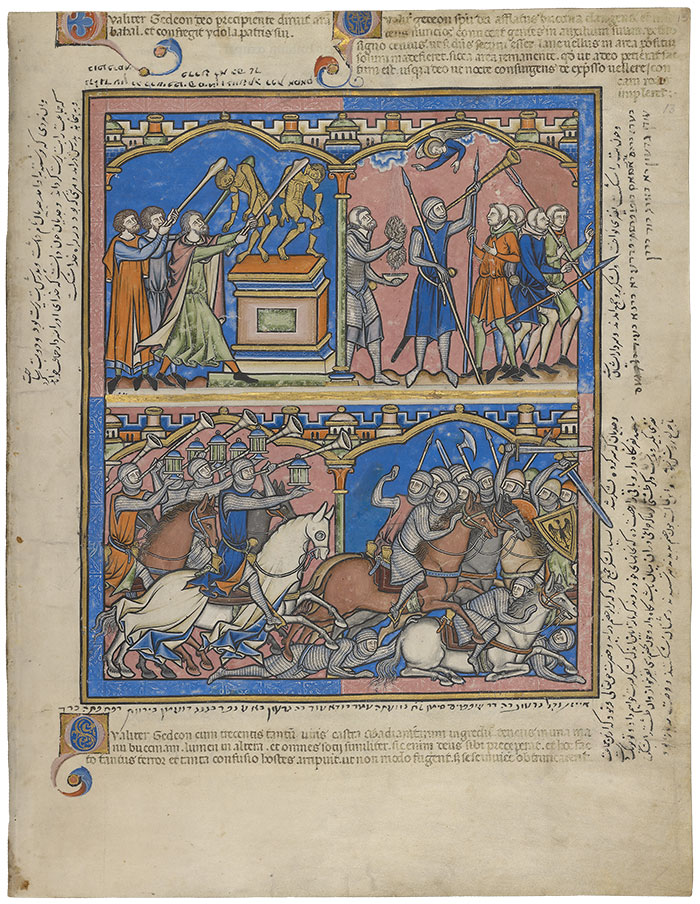
Baal's Altar Destroyed, The Sign of the Fleece, Gideon's Valiant Three Hundred
Old Testament Miniatures with Latin, Persian, and Judeo-Persian inscriptions
Purchased by J.P. Morgan (1867–1943) in 1916
Baal's Altar Destroyed
At night, Gideon and his companions arrive at the altar of Baal that was erected by Gideon's father. The men smash the idols of the false deity to pieces with clubs, in accordance with the Lord's wishes. In its place, a new altar will be consecrated to the Lord. (Judges 6:25–27)
The Sign of the Fleece
Again, Gideon asks the Lord for a sign to confirm that he shall deliver Israel. He leaves a wool fleece on the floor overnight. If in the morning there is dew on the fleece only, and the ground is dry, he will know that he has the Lord's favor. Indeed, come morning, the fleece alone is wet with dew, as Gideon requested. He wrings the dew from the fleece and collects it in a vessel. With a golden trumpet, Gideon calls messengers and charges them to assemble an army. (Judges 6:34–38)
Gideon's Valiant Three Hundred
Thousands arrive to follow Gideon, but the Lord, as a sign of his might, promises Gideon that only three hundred will be necessary to defeat Midian. Each man is given a trumpet and a lantern. At nightfall, the three hundred surround the enemy encampment, sound the trumpets, hold aloft the lanterns, and cry aloud: "The Sword of the Lord and of Gideon!" The terrifying spectacle causes chaos in the Midian camp; the Midianite soldiers flee the Israelite cavalry and confusedly strike each other down. (Judges 7:16–23)
Folio 13r (Latin)
Upper left: How Gideon tore down the altar of Baal and shattered his father’s carved images into pieces, as God had instructed him. (Judges 6: 25–32)
Upper right: How Gideon, now full of the spirit of God, sounded the trumpet, sent messengers, and called other people to come to his assistance. Then he asked as a sign from heaven, that if God was with him, only a fleece of wool that had been placed on the floor would be touched with dew, while the noor would remain dry. This happened as he had asked from God and he rose up after the night and filled a vessel with dew from the wrung fleece. (Judges 6: 34–38)
Lower half: How Gideon enters the Midianite camp with only three hundred men, carrying, as do his allies, a trumpet in one hand and a lamp in the other, for God had instructed him to do so, and thereupon such a great terror and confusion seized the enemies that they not only fled but cut each other down. (Judges 7: 16–23)
Folio 13r (Persian)
Upper left margin: And the man to whom the angel appeared was called Jidian (Gideon) and his father was an idolater and he fashioned two idols in order to convert the people to idolatry. And when Gideon found out that God will make him the commander of the people, he came to his father’s temple of idols and smashed all the idols, for the sake of God.
Upper right margin: And when he had smashed the idols, he blew a trumpet and the army gathered around him and he became their commander.
Lower right margin: And Gideon, having become the commander of the army, gathered a large army to compete with the army of the enemy. His Excellence God the Exalted ordered him to keep [only] three hundred of this group and release the rest to return to their homes [saying], "We will make you victorious with this small army; take a trumpet in one hand and hold an [empty] basin with a lamp inside in the other and when you reach the enemy, blow the trumpet and break the basin so that the lamp glows and when the enemy sees this event, they shall be frightened and the army shall break up and relief will come."
Folio 13r (Judeo-Persian)
Upper left, beneath Latin: The tale of Gideon when, as it is written in Judges [chapter] 6; he went before the idolatry of his father, and struck them [the idols] down.
Upper right margin, furthest right: After gathering together in front of the idolatry of his father, Gideon blew into a trumpet and they [the people] made him their chieftain.
Lower half, above Latin: This is the tale of Gideon, as it is written in Judges [chapter] 7; it was God’s command that Gideon should go to war against the enemy with three hundred men; having gone, he won.
Content consultant: Richard Leson
Persian translated by Sussan Babaie
Judeo-Persian translated by Vera Basch Moreen
Latin translation by Eran Lupu
After the commentary volume accompanying the Fine Art Facsimile edition by Faksimile Verlag Luzern
MS M.638, fol. 13v
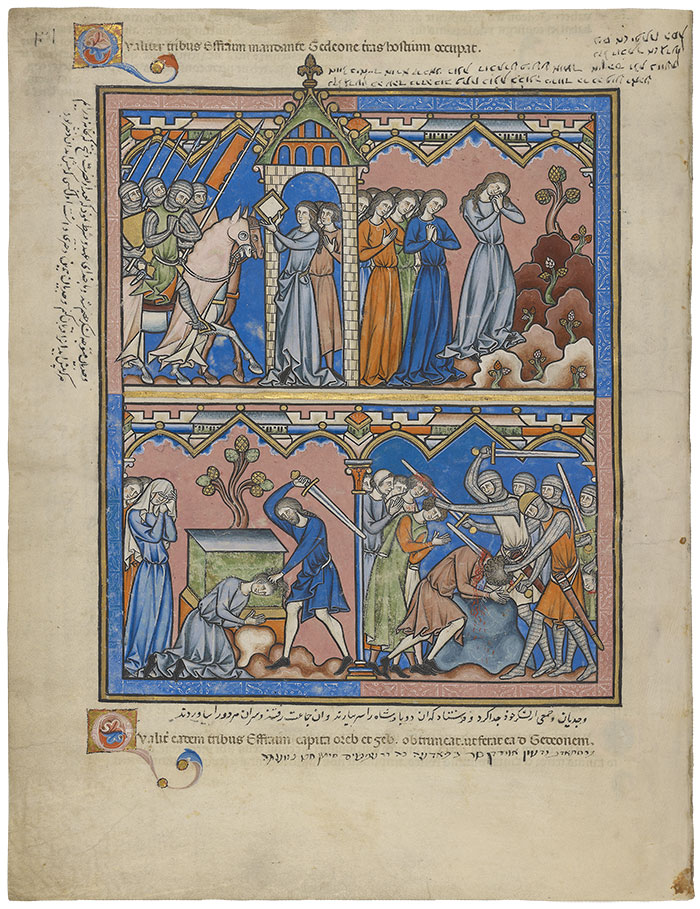
Jephthah's Despair, Mourning in the Mountains, Victory's Awful Price, A Treacherous Ascent
Old Testament Miniatures with Latin, Persian, and Judeo-Persian inscriptions
Purchased by J.P. Morgan (1867–1943) in 1916
Jephthah's Despair
Once more, the Israelites have forgotten the blessings of the Lord and turned to the worship of idols. The people are sold into the hands of the Philistines and the Amorites and remain enslaved for eighteen years. Jephthah, the son of Gilead, is selected by the elders to lead the people out of bondage. If the Lord will bring him victory over Ammon, Jephthah vows, he will offer as sacrifice the first to come forth from his house upon his return. After the victory, he returns home, only to be greeted by his daughter, who merrily plays a timbrel. (Judges 11:30–35)
Mourning in the Mountains
Although filled with dread and sorrow, Jephthah's daughter accepts the vow her father has made to the Lord. She requests only that she and several companions might be granted two months to lament in the mountains. (Judges 11:36–38)
Victory's Awful Price
Two months have passed, and Jephthah's daughter bravely returns so that her father might fulfill his vow. Before a group of grieving women and an altar, Jephthah prepares to sever the neck of his daughter, whose wrists have been bound. (Judges 11:39–40)
A Treacherous Ascent
Abimelech, one of Gideon's sons, desires to lead the children of Israel, but must contend with his seventy brothers, all equally entitled to Gideon's legacy. Abimelech is not a patient man; he hires a band of vagabonds and mercenaries and slays his brothers. As Abimelech severs the head of one brother, his companions attack the others. One of the mercenaries holds a gruesome trophy in one hand and a bloodied sword in the other. (Judges 9:3–6)
Folio 13v (Latin)
Upper half: How, following Gideon’s order, the tribe of Ephraim takes possession of the enemy’s land. (Judges 7:24)
Lower half: How the same tribe of Ephraim cuts off the head of Oreb and Zeeb in order to bring them to Gibeon. (Judges 11:29–35)
Folio 13v (Persian)
Persian foliation: 31
Upper left margin: And Gideon turned to the army of the enemy and made a vow and a condition that, "When I return home after victory and conquest, I shall sacrifice whoever comes forth [first]. And Gideon had a daughter; the first person to come forth was that same daughter.
Lower half: Gideon chose a company out of his army and sent them to bring back the heads of those two kings; and that company went and brought both their heads.
Folio 13v (Judeo-Persian)
Upper left margin: The tale of Gideon who had vowed that if he won and came home, he would sacrifice whoever would come out to meet him first. His daughter came out to [meet] him.
Upper right & upper right margin: This was also written in error. It is not the tale of Gideon’s daughter but of Jephthah.
Lower half, beneath Latin: Gideon sends away for the heads of the two kings as it is written in Judges [chapter] 8.
Content consultant: Richard Leson
Persian translated by Sussan Babaie
Judeo-Persian translated by Vera Basch Moreen
Latin translation by Eran Lupu
After the commentary volume accompanying the Fine Art Facsimile edition by Faksimile Verlag Luzern
MS M.638, fol. 14r
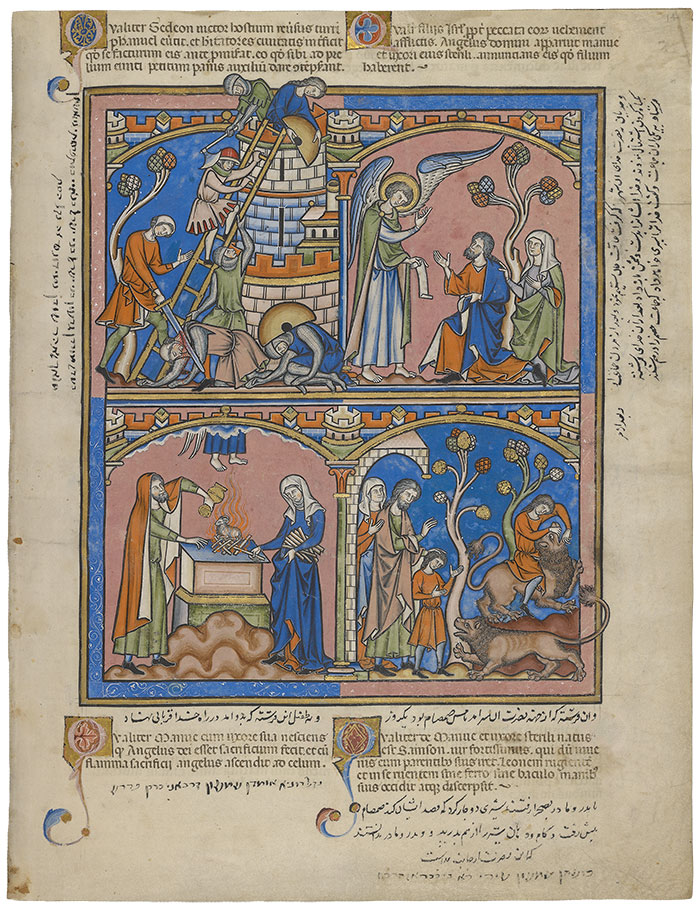
Just Desserts, Divine Favor, A Thanksgiving, Samson, Mightiest of Men
Old Testament Miniatures with Latin, Persian, and Judeo-Persian inscriptions
Purchased by J.P. Morgan (1867–1943) in 1916
Just Desserts
Abimelech has ruled Israel for three years, but the Lord does not favor this usurper. From atop the besieged stronghold of Thebez, a woman takes aim at Abimelech with a piece of a millstone. The stone dashes against his head, crushing his skull. With his remaining strength, Abimelech summons his armor bearer, begging that he be slain by a sword so that men will not say that he was killed by a woman. Abimelech appears twice—once beneath the millstone and once beneath the sword—but in different clothing. The reason for this inconsistency in a single miniature is unclear. (Judges 9:50–54)
Divine Favor
The Israelites are sinful in the eyes of the Lord and must serve the Philistines for forty years. But again, the Lord prepares a deliverer. An angel of the Lord visits Manoah, of the tribe of Dan, and his barren wife (In the biblical account, Manoah is not present). The angel promises that Manoah's wife will conceive and bear a son. She is to partake neither of wine nor of strong drink during the pregnancy, for the boy is to be a Nazirite, that is, a consecrated one. Most importantly, a razor is never to touch one hair of the boy's head. (Judges 13:2–5)
A Thanksgiving
Manoah invites the Lord's angel to dine, but the angel would rather Manoah make a burnt offering to the Lord. Accordingly Manoah chooses a kid from the flocks and prepares it on an altar. As Manoah pours an offering of oil and his wife feeds the fire, the angel ascends to heaven in the midst of the rising flames. (Judges 13:15–20)
Samson, Mightiest of Men
As the Lord promised, Manoah's wife conceives a boy, Samson. When he comes of age, his parents accompany him to Timnah to choose a wife. On the way, the family is surprised by a vicious, raging lion. The spirit of the Lord comes upon the young Samson. Samson steals away from his parents and, without their knowledge, rips the lion to pieces with his hands alone. (Judges 14:5–6)
Folio 14r (Latin)
Upper left: How Gideon returned as a victor, tore down the tower of Penuel and killed the city’s inhabitants, because he had told them before that he would do it, and because they had refused to give him bread as he was going to battle. (Judges 8: 5–17)
Upper right: How, as the children of Israel were vehemently afflicted on account of their sins, an angel of the Lord appeared to Manoah and his barren wife announcing the birth of a son. (Judges 13: 1–14)
Lower left: How Manoah and his wife, unaware of the fact that he was an angel of the Lord, offered a sacrifice, and the angel ascended to heaven with the victim’s dame. (Judges 13: 15–23)
Lower right: How Samson, a man of enormous strength, was born to Manoah and his sterile wife. When as a youth he was traveling with his parents and a lion rushed toward him roaring, he killed and dismembered it with his hand with no sword or staff. (Judges 13: 24 – 14:6)
Folio 14r (Persian)
Upper right margin: And when Gideon, with God’s assistance, had taken that city, he finally breathed his last breath and after his death his people fell into sin and God delivered them back into the hands of the enemy. Thereafter, God send an angel to one of those people and he said, "God will grant you a son who will vanquish the enemy."
(Fragment beneath # 93) And after...
Lower left: And because of this child, whom the angel foretold, he offered sacrifices to God.
Lower right, above and below Latin inscription: And the angel who came to help a son to be born; his name was Samsam (Samson). One day, he went with his mother and father to the fields. He encountered a lion who charged towards them. Samson stepped forth and tore apart the lion’s jaw and mouth and the father and mother did not know that this help issued from God.
Folio 14r (Judeo-Persian)
Upper left margin: After the death of Gideon, the Children of Israel are at the place of their idolatry. I don’t know what tale this is.
Lower left, beneath Latin: The tale of the birth of Samson; the sacrificial offering of his father.
Lower right, beneath Persian: Samson’s killing of a lion without anyone’s knowledge.
Italicized words are in Hebrew.
Content consultant: Richard Leson
Persian translated by Sussan Babaie
Judeo-Persian translated by Vera Basch Moreen
Latin translation by Eran Lupu
After the commentary volume accompanying the Fine Art Facsimile edition by Faksimile Verlag Luzern
MS M.638, fol. 14v
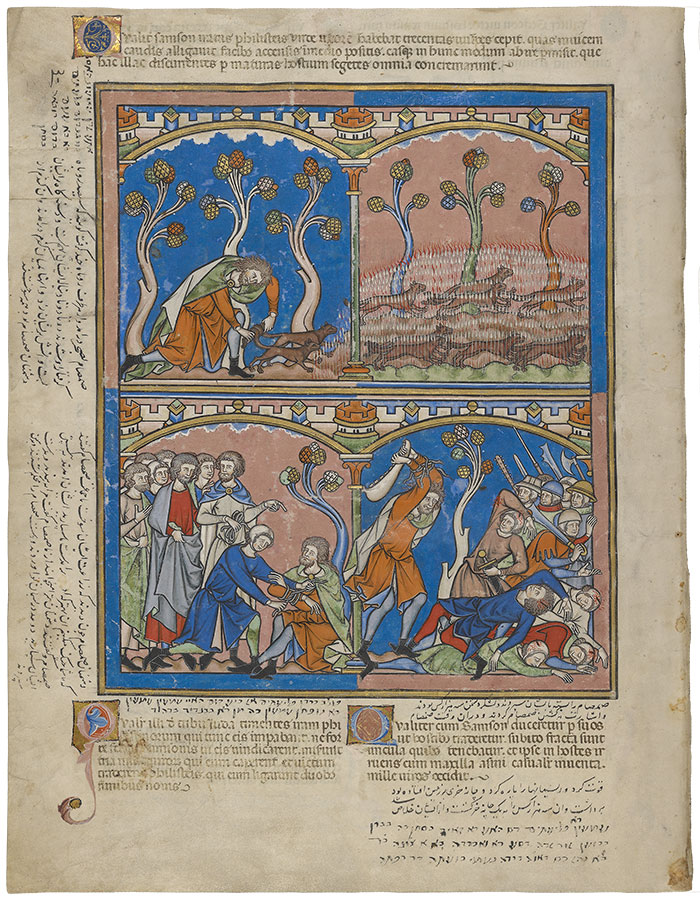
The Philistines Outfoxed, Samson's Surrender, One against a Thousand
Old Testament Miniatures with Latin, Persian, and Judeo-Persian inscriptions
Purchased by J.P. Morgan (1867–1943) in 1916
The Philistines Outfoxed
When Samson returns to his Philistine wife, he finds that her father has treacherously given her to another. Enraged, Samson devises a scheme to punish the Philistines. He catches three hundred foxes, ties their tails together, and fastens torches between them. The foxes are released into the Philistine fields, burning the corn, vineyards, and olive groves. (Judges 15:1–5)
Samson's Surrender
The men of Judah want no quarrel with their angry Philistine masters, who have come in search of the culprit responsible for the crop fires. Samson, wishing no further harm upon his people, allows himself to be bound for delivery to the Philistines. (Judges 15:10–13)
One against a Thousand
Samson's opponents will not have satisfaction. No sooner does the vengeful Philistine mob approach him than the spirit of the Lord comes upon Samson. He reaches for anything that might serve as a weapon and finds the jawbone of an ass. With this unlikely weapon, he slays a thousand of his enemies. (Judges 15:14–16)
Folio 14v (Latin)
Upper half: How Samson, who was angered by the Philistines, from among whom he had a wife, caught three hundred foxes and tied them tail to tail with burning torches placed in between and let them to go only where, running in different directions through the enemy’s ripe crops, they were to burn all. (Judges 15: 1–5).
Lower left: How men of the tribe of Judah, fearing that the Philistines, who were then ruling over them, would take vengeance on them for Samson’s deed, sent three thousand men to arrest him and hand him over, tied up, to the Philistines who fastened him with two new ropes. (Judges 15: 9–13)
Lower right: How when Samson was led by his own men to be handed over to their enemy, the bands by which he was bound were suddenly broken and he, rushing toward his enemies, killed a thousand men with a jawbone of an ass which he had found accidentally. (Judges 15: 14–16)
Folio 14v (Persian)
Persian foliation: 30
Upper left margin: Samson left at dawn and captured many foxes from every direction; it is said that three hundred foxes fell into his hands. In pairs, he tied their tails together and attached a bunch of hay to them and set them on fire. They ran in the midst of the wheat [fields] which belonged to the enemies of Samson and all [the fields] burned.
Lower left margin: Samson’s enemies, seeing their harvest had burned, told Samson’s brethren that, "We shall fight you; better that you deliver him to us." They came to Samson and said, "The enemies have demanded you from us." Samson said, "Tie me up and deliver me into their hands." They brought two new ropes and tied Samson’s hands tightly and surrendered him to the enemy.
Lower right, above and below Latin inscription: They surrendered bound Samson to them, and the army of the enemy was three thousand men and they set out to kill Samson. Samson strained and tore the ropes and he picked up the jawbone of an ass which lay on the ground and slew those three thousand men with a single jawbone of an ass and finished them off.
Folio 14v (Judeo-Persian)
Upper left margin, corner: Samson sets on fire the Philistine’s wheat harvest, by fastening tapers to the tail[s] of fox[es].
Lower left, above Latin: The Philistines seek Samson from his own people; Samson’s saying, "Bind me and hand me over."
Lower right, beneath Persian: The Philistines tie Samson’s hands tightly in order to carry him off and kill him. He strains, frees his hands, seizes the jaw bone of an ass and with one blow strikes them dead and departs.
Content consultant: Richard Leson
Persian translated by Sussan Babaie
Judeo-Persian translated by Vera Basch Moreen
Latin translation by Eran Lupu
After the commentary volume accompanying the Fine Art Facsimile edition by Faksimile Verlag Luzern
MS M.638, fol. 15r
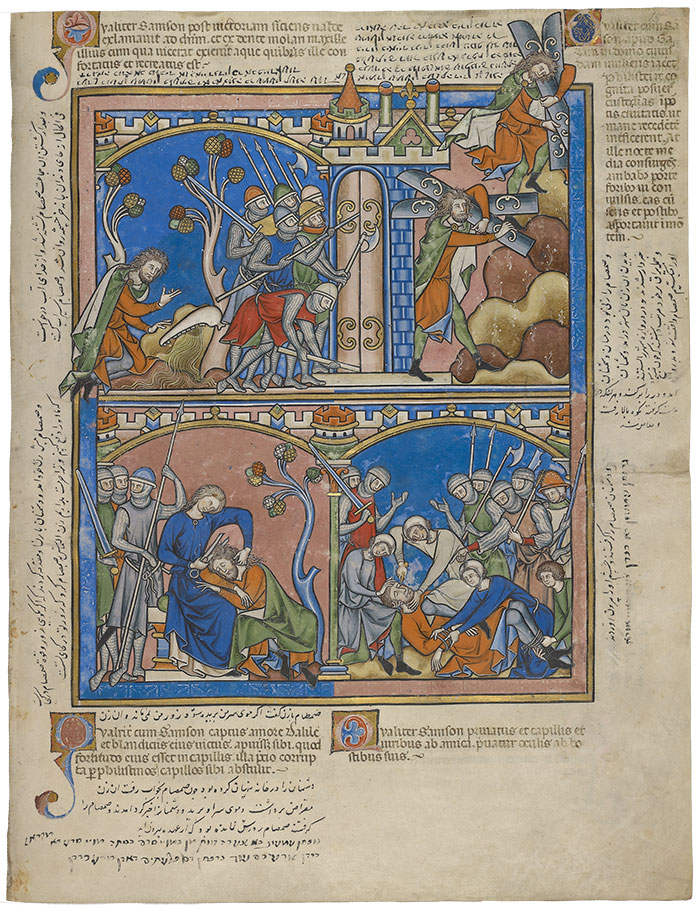
Parched, The Gates of Gaza, Shear Betrayal, Samson Blinded
Old Testament Miniatures with Latin, Persian, and Judeo-Persian inscriptions
Purchased by J.P. Morgan (1867–1943) in 1916
Parched
Weary from the slaughter, Samson discards the jawbone and asks God for water to quench his thirst. The Lord hears, and a miraculous spring wells up from the ground. (Judges 15:17–19)
The Gates of Gaza
Later, Samson arrives in Gaza, where vigilant Philistines prepare an ambush for him at the city gates. But before the trap is sprung, the cunning Samson wrests the very doors from the gates and defiantly carries them to the top of a high hill. (Judges 16:1–3)
Shear Betrayal
In the Valley of Sorek, Samson falls in love with the beautiful Delilah. Unbeknownst to him, Delilah is in league with the Philistines. Her persistent inquiries finally pay off, and Samson reveals to her the source of his superhuman strength—his hair. Indeed, a razor has never touched his head. When Samson falls asleep with his head on Delilah's knees, she quietly cuts his locks. Presently, her Philistine allies will capture him. (Judges 16:17–19)
Samson Blinded
The Philistines bring the helpless Samson back to Gaza. Still wary of their captive, they bind him in the presence of several armed men and gouge out his eyes. (Judges 16:20–21)
Folio 15r (Latin)
Upper left: How Samson, who was very thirsty after his victory, cried to the Lord and water came out from a great tooth in the jawbone with which he had become victorious, and he was thus much strengthened and refreshed. (Judges 15: 18–19)
Upper right: How when Samson was lying in Gaza in the house of some woman, the Philistines, upon discovering this, set guards at the gates of the city, that they might kill him as he went back. But he, rising in the middle of the night, carried the entire two doors of the gate with the bolts and the posts up to a hill. (Judges 16: 1–3)
Lower left: How when Samson, enticed by his love to Delilah and subdued by her charms, had revealed to her that his might was in his hair, she, whom the Philistines had bribed with money, shaved his hair. (Judges 16: 4–20)
Lower right: How Samson, having been deprived of his hair and his powers by his lover, is deprived of his eyesight by the Philistines. (Judges 16:21)
Folio 15r (Persian)
Upper left margin: And after slaying those people, Samson felt thirsty and asked God for water. Suddenly, water issued from the place of a tooth in the jawbone of the ass and Samson drank.
Upper right margin: And Samson had a wife from amongst the enemy. He came to that city to see his wife. The enemy was informed and they shut the gates of the city and they all armed themselves to slay him in the morning. Samson found out and came to the gate and removed the door and its posts in each hand. Then he climbed a mountain and was free.
Lower left margin: And Samson came to his wife and the enemies had conspired with his wife that, "If you tell us where Samson’s power and strength lies so that we may defeat him, we shall honor you." The woman implored Samson, "Wherein lies your power?"
Lower Left, above and below Latin inscription: Samson told her, "If the hair on my head is cut, my strength shall dissipate." And the wife had hidden [some of the] enemy in her house. When Samson fell asleep, she picked up the scissors and cut his hair and called on the enemies. They came and captured Samson; Samson was bereft of his power to dispel them.
Lower right margin: And the enemies captured Samson and gouged his eyes out.
Folio 15r (Judeo-Persian)
Upper left, below Latin: After Samson killed the Philistines with the jaw, he became thirsty; he prayed to God for water, and water appeared from one of the teeth of the ass’[s jaw].
Upper right: Samson’s arrival in Gaza, seeing a harlot, in the manner described in [Judges] chapter 16; the Philistines surround the house in order to capture and kill him in the morning when he comes out, but Samson comes out of the house at midnight and, uprooting the doors of the gate, carries them away.
Lower left, beneath Persian: [Upon] Samson’s telling his wife, "My strength is attached to the hair on my head," she cuts it off with [a pair of] scissors; his strength declines, [then] she captures him and gives him to the Philistines to blind him.
Lower right margin, furthest right: Samson’s capture and the plucking out of his eyes.
Content consultant: Richard Leson
Persian translated by Sussan Babaie
Judeo-Persian translated by Vera Basch Moreen
Latin translation by Eran Lupu
After the commentary volume accompanying the Fine Art Facsimile edition by Faksimile Verlag Luzern
MS M.638, fol. 15v
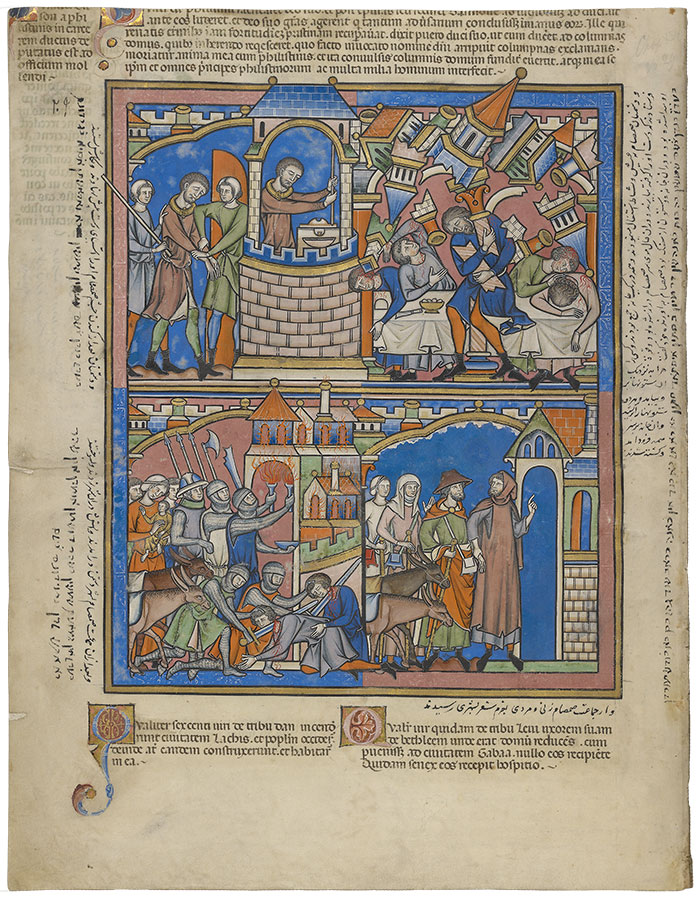
Samson in Prison, Retribution, Moving Day, A Kindly Host
Old Testament Miniatures with Latin, Persian, and Judeo-Persian inscriptions
Purchased by J.P. Morgan (1867–1943) in 1916
Samson in Prison
Blind and shorn, Samson is led by his captors to prison, where he is forced to grind corn. Around his neck he wears a golden prisoner's collar inscribed with an 'S' and attached to a chain. (Judges 16:21)
Retribution
The Philistine princes gather to sacrifice to their god Dagon and to celebrate the capture of their greatest enemy. In the meantime, the hair on Samson's head has grown. He is brought to the temple to suffer the taunts and insults of his captors. Strengthened by the Lord, Samson crushes a pillar of the temple, causing the whole building to collapse. In death, Samson is avenged more than a thousand fold. (Judges 16:23–30)
Moving Day
The tribe of Dan, never having received its rightful inheritance, has gone in search of land to call its own. They choose Laish, a quiet and undefended city, and take it by force. Members of the tribe, baggage in tow, look on as soldiers set Laish on fire and put its inhabitants to the sword. The city is to be rebuilt and called Dan, after the tribe's ancestor. (Judges 18:27–29)
A Kindly Host
After fetching his disobedient wife from her father's house in Bethlehem, a Levite man is returning to his home in the remote mountains of Ephraim. In the Benjamite city of Gibeah an old man offers the travelers shelter in his own home. The Levite, his wife, and her maidservant all carry pilgrim's wallets and staffs. (Judges 19:17–20)
Folio 15v (Latin)
Upper left: How Samson, having been led by the Philistines to prison, was assigned to grinding duty. (Judges 16: 21)
Upper right: How, when the Philistines had sacrificed to their god and, after the feast, had brought Samson as a laughing stock, that he might play before them, and, while they were giving thanks to their god who had delivered such a mighty foe into their hands, he, who with his hair regrown had now recovered his former strength, told the boy who was leading him to direct him to the pillars of the house, that he might lean against them and rest. Once this was done, he, invoking the name of God, lay hold of the pillars crying: ’Let my soul die with the Philistines’ and as the pillars were thus shaken, the entire house collapsed. In it he killed himself together with the lords of the Philistines and a countless number of men. (Judges 16: 22–30)
Lower left: How six hundred men of the tribe of Dan burnt the city of Laish and killed its people. Nevertheless, later they rebuilt the city and dwelt in it. (Judges 18: 11–28)
Lower right: How a certain man of the tribe of Levi led his wife from her house in Bethlehem. When he reached the city of Gibeah where he was received by no one, a certain old man lodged him. (Judges 19: 1–20)
Folio 15v (Persian)
Persian foliation: 29
Upper left margin: After blinding Samson, the enemies put him in front of a manual mill and set him to work.
Upper right margin: The enemies of Samson, gathered in a house, were making merry and celebrating. And they dispatched one to hold his hand and bring him. And by then Samson’s hair had grown long and his strength had returned. And there were two stone columns in that house. Samson told his guide, "Take me near those columns." He came and pulled both columns out and the house collapsed over their heads and they were killed.
Lower left margin: And afterwards, Samson’s people came into the city of the enemy and set the city on fire and burned it.
Lower right: And from amongst Samson’s people, a man and a woman reached a city on their journey.
Folio 15v (Judeo-Persian)
Upper left margin, furthest left: After plucking out Samson’s eyes, they forced Samson to turn to the mill.
Right margin, furthest right: After Samson’s eyes were plucked out, in their house of idolatry, where there stood two pillars, he uprooted the pillars, that building collapsed, and some people died along with him.
Lower left margin, furthest left: Afterward, Samson’s people came to the town of the enemy and they burned down the town. I don’t know what it is.
Content consultant: Richard Leson
Persian translated by Sussan Babaie
Judeo-Persian translated by Vera Basch Moreen
Latin translation by Eran Lupu
After the commentary volume accompanying the Fine Art Facsimile edition by Faksimile Verlag Luzern
MS M.638, fol. 16r
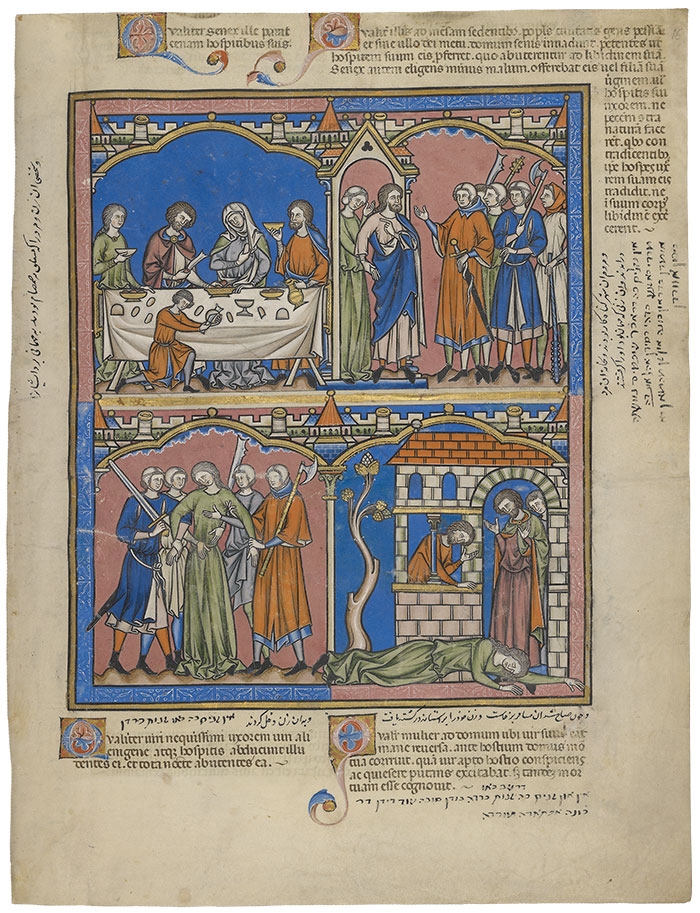
Hospitality, Reprehensible Demands, Gibeah's Crime, Death of the Levite's Wife
Old Testament Miniatures with Latin, Persian, and Judeo-Persian inscriptions
Purchased by J.P. Morgan (1867–1943) in 1916
Hospitality
After seeing to the Levite's donkeys, the old man and his daughter prepare a feast for their guests at a table set with golden dishes. In the foreground, a servant cuts bread. (Judges 19:21)
Reprehensible Demands
While the Levite and his wife are at table, their host is called away to his door. Men of Gibeah demand that the old man surrender the Levite so that they might rape and murder him. Rather than suffer this fate, the Levite turns over his wife so that they might use her in his stead. (Judges 19:22–24)
Gibeah's Crime
The rapists deal wickedly with the Levite's wife. (Judges 19:25)
Death of the Levite's Wife
With her remaining strength, the Levite's wife crawls to the door of the house where her husband is lodged. In the morning, the Levite and his host discover her unconscious on the threshold. (Judges 19:25–27)
Folio 16r (Latin)
Upper left: How that old man prepared a meal for his guests. (Judges 19:21)
Upper right: How, as they were sitting at the table, a most evil clan, devoid of any fear of God, entered the old man’s house, demanding him to bring forth his guest to them, that they might abuse him as they wished. Yet the old man, choosing a lesser evil, was offering them either his maiden daughter or his guest’s wife, lest they commit a sin against nature. When they had spoke against it, the guest himself delivered his wife to them lest they exercise their lust on his body. (Judges 19: 22–25)
Lower left: How the vile men took the wife of a foreigner and, moreover, a guest, amused themselves with her, and abused her all night long. (Judges 19:25)
Lower right: How in the morning the woman returned to the house where her husband was and fell down dead before the door of the house. Upon opening the door the man beheld her and was arousing her, thinking that she was taking her rest. Then, at length, he perceived that she was dead. (Judges 19:26–28)
Folio 16r (Persian)
Upper left margin: And someone took that man and woman, who belonged to Samson, to a banquet.
Upper right margin: The people of that city were sinners and they entered that man’s house and took away the woman who was his guest.
Lower left: And they violated that woman.
Lower right: When morning came, the traveler awoke and found his wife dead at the doorstep.
Folio 16r (Judeo-Persian)
Upper right margin, furthest right: This is a tale that occurs toward the end of [the Book of] Judges. A man and his wife arrived in a village, its people came to the door of that house [where they were lodging] to bring out that guest woman.
Lower left, above Latin to left: This is the woman with whom they fornicated.
Lower right, beneath Latin: This is that woman with whom they fornicated during the night. In the morning they saw her fallen dead by the door of the house.
Italicized words are in Hebrew.
Content consultant: Richard Leson
Persian translated by Sussan Babaie
Judeo-Persian translated by Vera Basch Moreen
Latin translation by Eran Lupu
After the commentary volume accompanying the Fine Art Facsimile edition by Faksimile Verlag Luzern
MS M.638, fol. 16v
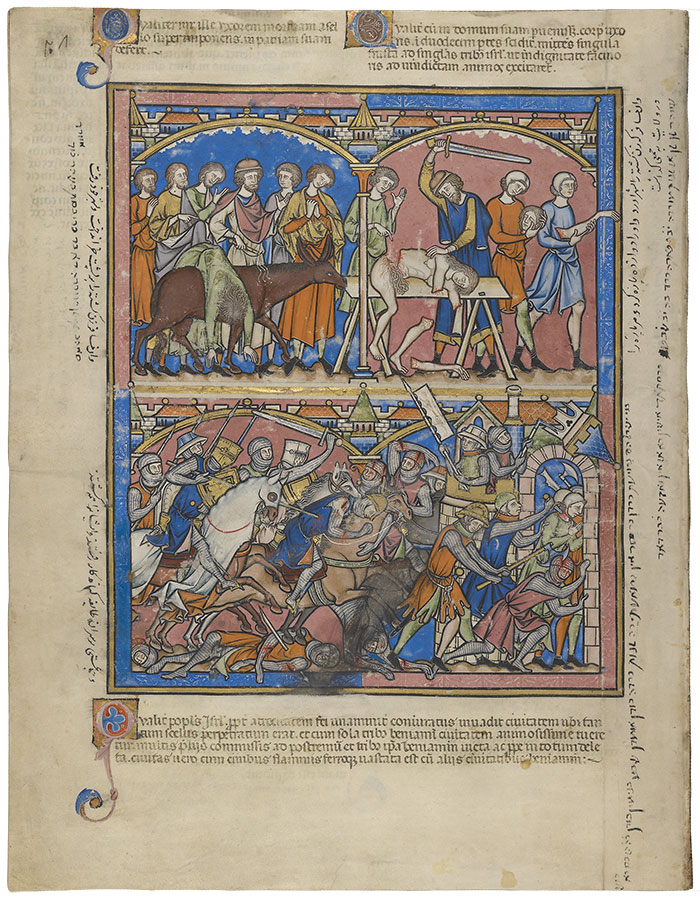
A Sorrowful Homecoming, A Grisly Message, Civil War
Old Testament Miniatures with Latin, Persian, and Judeo-Persian inscriptions
Purchased by J.P. Morgan (1867–1943) in 1916
A Sorrowful Homecoming
The Levite throws his wife's body over an ass and, striking the animal with a whip, begins the journey home. Men gather round to express their sympathy and outrage at the behavior of the Benjamites. (Judges 19:28)
A Grisly Message
Upon his return to Ephraim, the Levite dismembers the corpse of his wife. Her body is to be cut into twelve parts and carried by messengers to all the territories of Israel. The outrage among the tribes over this egregious crime will begin a great war. (Judges 19:29)
Civil War
Four hundred thousand Israelite men have sworn vengeance against their brethren from the tribe of Benjamin because of the outrage committed against the Levite's wife. For three days a battle rages around the city of Gibeah. On the third day, the opposing tribes spring a successful ambush and slay over twenty five thousand of the Benjamites. As the victorious cavalry kill fleeing horsemen, foot soldiers deal harshly with men attempting to escape to the city. The victors capture the battlements and begin the destruction of Gibeah. (Judges 20:29–35)
Folio 16v (Latin)
Upper left: How the man lay up his dead wife upon his ass and carried her back to his house. (Judges 19:28)
Upper right: How when he had reached his house, he cut his wife’s body, sending each part to each one of the twelve tribes of Israel, in order that the indignity of the crime might excite their hearts and cause them to retaliate. (Judges 19:29)
Lower half: How the people of Israel, unanimously conjoined by the atrocity of the deed, invade the city where such a crime was perpetrated. When only the tribe of Benjamin was very eagerly defending it, engaging in many battles, eventually, as both the tribe of Benjamin was defeated and the city was almost utterly destroyed, it was lay waste by flame and sword with its citizens and with other cities of Benjamin. (Judges 20)
Folio 16v (Persian)
Persian foliation: 28
Upper left margin: And the traveler lay his murdered wife across the back of an ass and returned to his own city.
Upper right margin: The traveler, having brought the murdered wife to the city, cut her up into twelve pieces and sent each piece to a group in the country.
Lower left margin: And a group descended upon that sinful tribe and slew them all.
Folio 16v (Judeo-Persian)
Upper left margin, furthest left: The woman’s companion tied the woman on the ass and brought her to his town.
Upper right margin, furthest right: The woman’s husband cut up into twelve parts the woman who died from fornication and sent them to [each of] the twelve tribes in order to inform them of this incident.
Lower right margin: And the Children of Israel gathered together against this community which had fornicated, who were of the tribe of Benjamin, and killed five thousand persons.
Italicized words are in Hebrew.
Content consultant: Richard Leson
Persian translated by Sussan Babaie
Judeo-Persian translated by Vera Basch Moreen
Latin translation by Eran Lupu
After the commentary volume accompanying the Fine Art Facsimile edition by Faksimile Verlag Luzern
MS M.638, fol. 17r
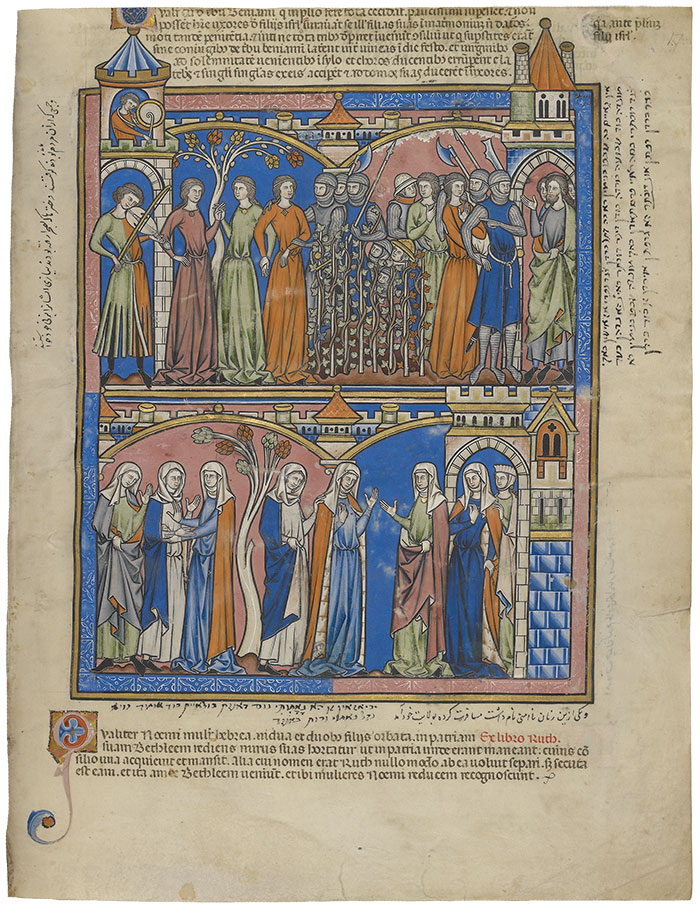
Wives for the Benjamites, Ruth, a Loyal Daughter
Old Testament Miniatures with Latin, Persian, and Judeo-Persian inscriptions
Purchased by J.P. Morgan (1867–1943) in 1916
Wives for the Benjamites
Before the war, the gathered tribes took an oath, swearing that none among them would ever again provide a wife to a Benjamite. Now, however, the tribes lament the loss of their brethren and ponder how they might find wives for those few hundred Benjamite men that survive. A remedy is devised by the tribal elders. The Benjamites are directed to Shiloh, where a festival is underway. Maidens in trailing skirts dance as minstrels play the viol, pipe, and tabor. The Benjamites, hidden in the vineyards, spring forth and take the young women. As they depart, they encourage the men of Shiloh not to fear for the integrity of their oath, for indeed they never gave their daughters willingly. (Judges 21: 20–23)
Ruth, a Loyal Daughter
Naomi, a widow, bids farewell to her daughters-in-law, who have also lost their husbands. One daughter-in-law, Ruth, refuses to remain in her native Moab and insists upon accompanying Naomi to Bethlehem. At the gates of Bethlehem, three women advance and joyously welcome Naomi home. "Do not call me Naomi; call me Mara," she tells them. 'Mara' is Hebrew for "the Almighty has dealt very bitterly with me." (Ruth 1:14–20)
Folio 17r (Latin)
Upper half: How, when the tribe of Benjamin was almost wholly lost in battle and those few of it who had survived could not take wives from the children of Israel since, before the battle, the children of Israel had sworn not to give their daughters in marriage to them, at last, moved by repentance and wishing to help the tribe not to perish, they devise a plan that the survivors of the tribe of Benjamin who had no wives should hide in the vineyards and on a festive day, as the maidens go dancing to the feast in Shiloh, they should go out of their hiding places and each should receive a girl from them and lead her to his house to be his wife. (Judges 21)
Lower half: From the book of Ruth. How Naomi, a Hebrew widow who has lost both her sons, upon returning to her native Bethlehem, encourages her daughters-in-law to remain in their homeland where they were born, with which advice one was pleased and stayed. The other, whose name was Ruth, was by no means willing to be separated from her, but followed her, and thus they both reach Bethlehem where the women recognize Naomi who came back. (Ruth I)
Folio 17r (Persian)
Upper left margin: And they [the tribe of Benjamin] captured the group that had survived of those people and they deceitfully asked for the girls, who had gone to the fields, in marriage.
Lower right: And one of those women was called Naamni [Naomi]; she traveled [back] to her own country.
Folio 17r (Judeo-Persian)
Upper right margin: Here it is that the tribe of Benjamin of whom they [the Children of Israel] had killed, some of their members had survived, but they [the Children of Israel] swore an oath not to give their daughters [in marriage] to them. Then, [when] they sent some maidens to the field, those surviving from the tribe of Benjamin were informed and they went and captured those maidens.
Lower left, above Latin: One of these women is called Naomi; she came to her own province. That is, it is the tale of Naomi and Ruth.
Italicized words are in Hebrew.
Content consultant: Richard Leson
Persian translated by Sussan Babaie
Judeo-Persian translated by Vera Basch Moreen
Latin translation by Eran Lupu
After the commentary volume accompanying the Fine Art Facsimile edition by Faksimile Verlag Luzern
MS M.638, fol. 17v
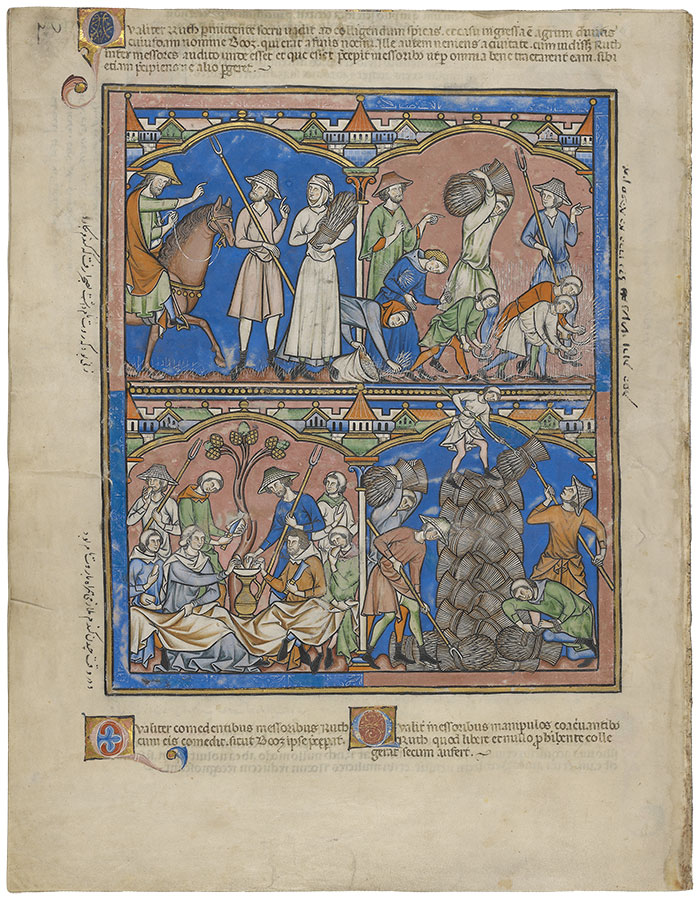
Ruth Meets Boaz, Ruth Eats with Boaz and the Workmen, Stacking Barley
Old Testament Miniatures with Latin, Persian, and Judeo-Persian inscriptions
Purchased by J.P. Morgan (1867–1943) in 1916
Ruth Meets Boaz
Boaz, a wealthy kinsman of Ruth's deceased father-in-law, rides forth to survey his fields. He asks his foreman about Ruth and learns that she is the Moabitess who returned with Naomi. Impressed by Ruth's hard work and loyalty to Naomi, Boaz promises her his protection. At right, he addresses his workmen. A field hand directs a worker who carries two sheaves on his back. Three reapers busily cut the grain, followed by Ruth and another young woman, who gather the grain. (Ruth 2:4–9)
Ruth Eats with Boaz and the Workmen
At mealtime, Ruth is invited to eat with Boaz, the foremen, and the field workers. The company spreads a cloth over their knees and dips bread into a bowl of vinegar supported on a golden vessel. (Ruth 2:14)
Stacking Barley
At the end of the day, Boaz's field hands bind and expertly stack the sheaves of wheat in the barns. The stories depicted on this folio provide exemplary pictorial information about daily agricultural practice in the thirteenth century. (Ruth 2:23)
Folio 17v (Latin)
Upper half: How, at her mother-in-law’s permission, Ruth went to glean the ears of corn and by chance entered the field of some rich man, Boaz by name, who was related to Naomi. Now, when, coming from the city, he had seen Ruth among the reapers and heard where did she come from and who she was, he ordered the reapers to treat her well, while telling her not to turn to others. (Ruth 2: 1–8)
Lower left: How Ruth ate together with the reapers, as Boaz himself had ordered. (Ruth 2:14)
Lower right: How, as the reapers were heaping up the sheaves, Ruth carried with her what she had gleaned freely and with none preventing her. (Ruth 2:15–17)
Folio 17v (Persian)
Persian foliation: 27
Upper left margin: There was a woman named Ruth; she went to the fields to plant wheat.
Lower left margin: And a servant accompanied Ruth during the harvesting of the wheat.
Folio 17v (Judeo-Persian)
Upper right margin: Both these pages contain the tale of Ruth and Naomi.
Content consultant: Richard Leson
Persian translated by Sussan Babaie
Judeo-Persian translated by Vera Basch Moreen
Latin translation by Eran Lupu
After the commentary volume accompanying the Fine Art Facsimile edition by Faksimile Verlag Luzern
MS M.638, fol. 18r
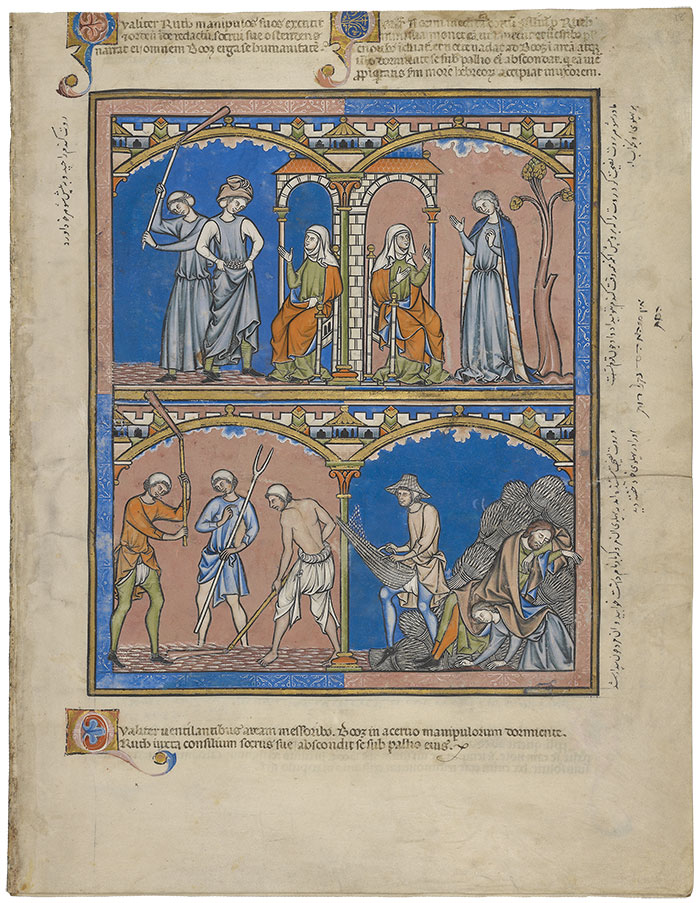
A Successful Day, Naomi's Counsel, Boaz Compromised
Old Testament Miniatures with Latin, Persian, and Judeo-Persian inscriptions
Purchased by J.P. Morgan (1867–1943) in 1916
A Successful Day
Ruth threshes the gleanings that Boaz gave to her, collects them in her skirt, and brings them home to Naomi. In this illustration Ruth carries an empty sack on her head. Naomi, seated in an archway before her house, inquires as to where Ruth found work. Naomi is pleased to learn that Boaz, her kinsman, has taken Ruth under his wing. (Ruth 2:17–19)
Naomi's Counsel
Naomi conceives of a plan to win Boaz as a husband for her daughter-in-law. This evening, Boaz will sift barley on the threshing floor. Therefore, she advises Ruth, wait until after the work is over and Boaz has gone to sleep, then lay down at his feet. Ruth, obedient, replies, "All that you say to me I shall do." (Ruth 3:1–5)
Boaz Compromised
As Boaz's men continue threshing the barley, their master has found a comfortable place to sleep among the stacks of sheaves. Ruth, unnoticed by a man sifting barley, quietly creeps under a fold of Boaz's mantle. (Ruth 3:7)
Folio 18r (Latin)
Upper left: How Ruth threshes her sheaves and, showing her mother-in-law the barley which was thus extracted, tells her about all of Boaz’s kindheartedness toward her. (Ruth 2: 18–22)
Upper right: How Naomi, having devised a good plan for Ruth, tells her to wash herself, put on nicer clothes and go, at night, to Boaz in the threshing floor, and to hide under his mantle as he sleeps, for thus he will take her to be his wife following the law of kinship according to the Hebrews’ custom. (Ruth 3: 1–6)
Lower half: How, as the reapers winnow the grain and Boaz sleeps on a heap of sheaves, Ruth, following her mother-in law’s plan, hides herself under her mantle. (Ruth 3: 7)
Folio 18r (Persian)
Upper left margin: Ruth gathered the wheat and brought it to her husband.
Upper right margin: Ruth’s mother-in-law counseled Ruth, "Go to that person who used to give you wheat; and since he is your kinsman, sleep by his side."
Lower right margin: And Ruth accepted the advice and slept next to the man whose name was Bar [Boaz] and when the man awoke, he saw her sleeping beside him.
Folio 18r (Judeo-Persian)
Right margin, furthest right, middle: These pages also belong to the Tale of Ruth.
Italicized words are in Hebrew.
Content consultant: Richard Leson
Persian translated by Sussan Babaie
Judeo-Persian translated by Vera Basch Moreen
Latin translation by Eran Lupu
After the commentary volume accompanying the Fine Art Facsimile edition by Faksimile Verlag Luzern
MS M.638, fol. 18v
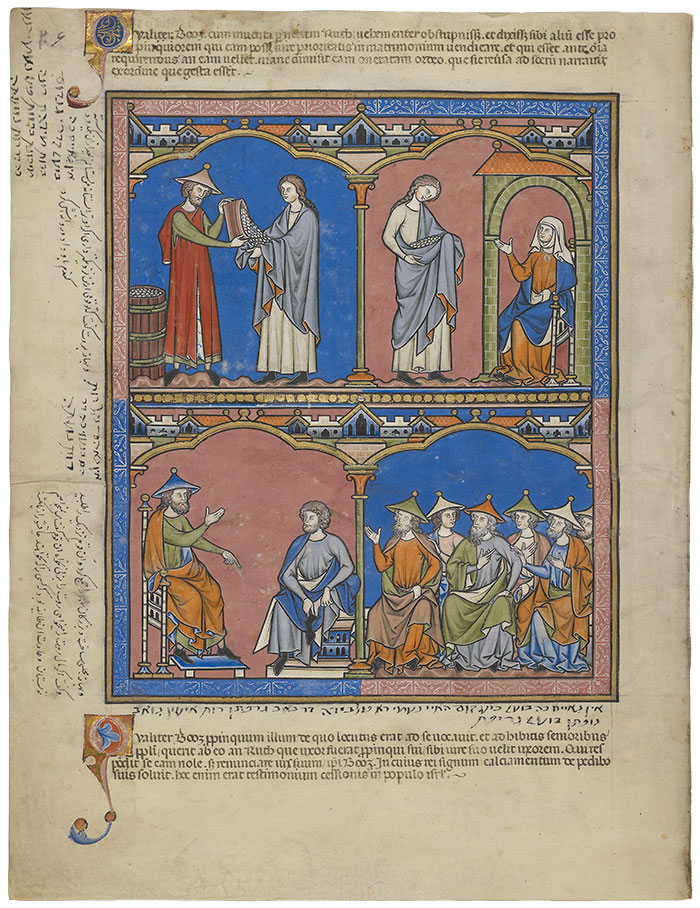
Boaz Must Send Ruth away, A Settlement
Old Testament Miniatures with Latin, Persian, and Judeo-Persian inscriptions
Purchased by J.P. Morgan (1867–1943) in 1916
Boaz Must Send Ruth Away
Boaz cannot marry Ruth in good faith while another kinsman, a closer relation of her mother-in-law's, has legal rights to Naomi's property. In the meantime, Boaz gives Ruth six measures of barley, which she brings home to her mother-in-law. Naomi advises Ruth to be patient and await the outcome. (Ruth 3:14–18)
A Settlement
Boaz speaks with his kinsman and six elders concerning the matter of Naomi's property and Ruth. If the kinsman purchases the property, he must take Ruth to wife. Realizing that such a union would disinherit the rest of his family, the kinsman yields his privilege to Boaz. Following tradition, the kinsman removes his shoe before the assembly, a signal that he has officially relinquished his right. Boaz and the elders, all richly appareled, wear conical Jewish caps. (Ruth 4:3–8)
Folio 18v (Latin)
Upper half: How, when Boaz, upon finding Ruth during the night, was greatly stupefied and had told her that there was another relative, closer than him, who could, according to the law of priority, vindicate her, and that that person should first be asked if he wanted her, he sent her back in the morning laden with barley. She then related in order the whole affair to her mother-in-law. (Ruth 3: 8–18)
Lower half: How Boaz summoned the relative whom he had mentioned, and, having called on the elders of the people, asked him if he wished to have Ruth for himself, as she had been the wife of his relative. Now, he replied that he did not and that he would yield his right to Boaz. As a token of this, he took his shoes off his feet, for such was the testimony of cession among the people of Israel. (Ruth 4: 1–8)
Folio 18v (Persian)
Persian foliation: 26
Upper left margin: And Bahaz [Boaz] told Ruth, "You have a kinsman closer than me; if he does not take you, I shall take you." After that, he gave her a few clusters of wheat and sent her off.
Lower left margin: And Boaz set up a council and gathered the town elders and summoned the closer kinsman and said, "If you want Ruth’s property, take Ruth to wife." The kinsman said, "I do not want her; take her." And it was customary among this tribe to remove shoes from [their] feet if they did not want someone.
Folio 18v (Judeo-Persian)
Upper left margin, corner: Here it is that Boaz gives some wheat to Ruth; she goes before Naomi, as it is written [in the Book of] Ruth.
Left margin, middle: This also belongs to [the Book of] Ruth, as it is written in [the Book of Ruth].
Lower half, above Latin: Here Boaz [son of] Kish seeks out Naomi’s people regarding marrying Ruth. They answered [in the affirmative and] Boaz married [her].
Content consultant: Richard Leson
Persian translated by Sussan Babaie
Judeo-Persian translated by Vera Basch Moreen
Latin translation by Eran Lupu
After the commentary volume accompanying the Fine Art Facsimile edition by Faksimile Verlag Luzern
MS M.638, fol. 19r
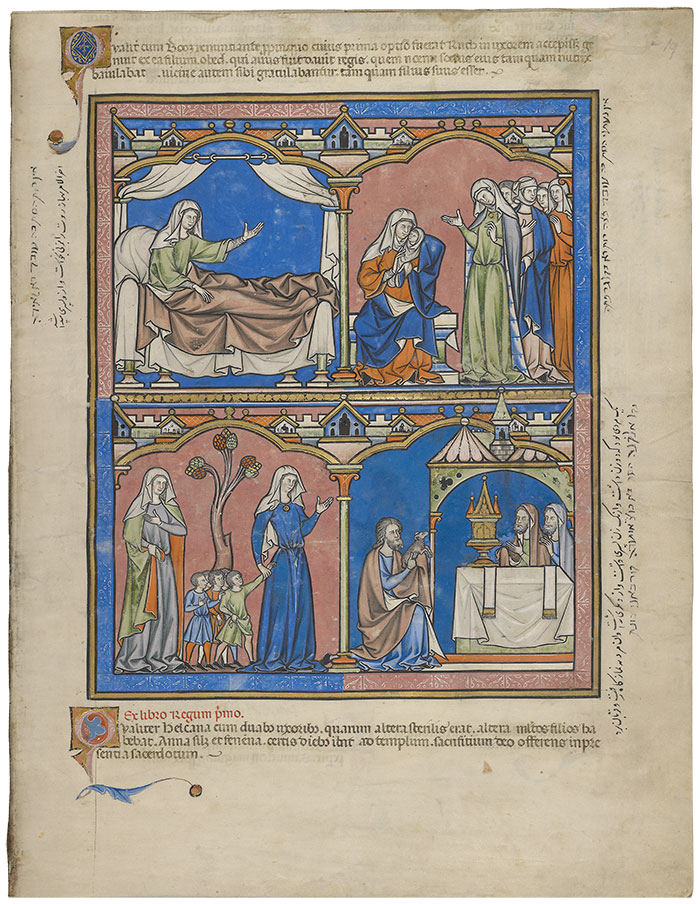
A Happy Ending, Journey to Shiloh
Old Testament Miniatures with Latin, Persian, and Judeo-Persian inscriptions
Purchased by J.P. Morgan (1867–1943) in 1916
A Happy Ending
Boaz has married Ruth, and she has given birth to a son. Here, Ruth sits up in bed and gestures to the doting Naomi, who holds her grandson to her cheek. At the right, women of Bethlehem praise the Lord for providing the family with a successor. Also, they give thanks for Ruth, who has loved Naomi better than seven sons. Obed, Ruth's son, will become the father of Jesse, who will become the father of David, slayer of Goliath. (Ruth 4:13–17)
Journey to Shiloh
The family of Elkanah has traveled to Shiloh to give thanks to the Lord. Elkanah kneels before the temple entrance with a lamb; the two sons of Eli, the high priest, accept the offering. Atop the draped altar is a golden reliquary chest, a Gothic painter's interpretation of the Ark of the Covenant. Elkanah is followed by his two wives: Peninnah, who has many children, and the sorrowful Hannah, who has none. (1 Kings 1:1–3)
Folio 19r (Latin)
Upper half: How, after the person who had the option of having Ruth first had refused and Boaz had taken her to be his wife, he begat Obed of her who was the grandfather of king David, of whom Naomi, the mother-in-law, was taking care as his nurse. Moreover, her women neighbors were congratulating her as if he was her son. (Ruth 4: 13–17)
Lower half: From the first book of Kings [I Samuel]. How Elkanah had two wives, of whom the first, Hanna, was barren while the second, Peninnah, had many children, and on certain days he used to go with them to the temple, bearing an offering to God in the presence of the priests. (I Samuel 1:1–3)
Folio 19r (Persian)
Upper left margin: At last, Boaz took Ruth to wife and she bore a son.
Lower right margin: There was a man [Elkanah] who had two wives and he had a son from one wife and none from the other. He went to the temple and offered a sacrifice.
Folio 19r (Judeo-Persian)
Upper left margin, furthest left: This is Ruth giving birth to Obed. Upper right margin: This is Naomi taking Obed, Ruth’s son, into her arms.
Lower right margin, furthest right: This is the tale of Elkanah arriving with a ram for sacrifice.
Content consultant: Richard Leson
Persian translated by Sussan Babaie
Judeo-Persian translated by Vera Basch Moreen
Latin translation by Eran Lupu
After the commentary volume accompanying the Fine Art Facsimile edition by Faksimile Verlag Luzern
MS M.638, fol. 19v
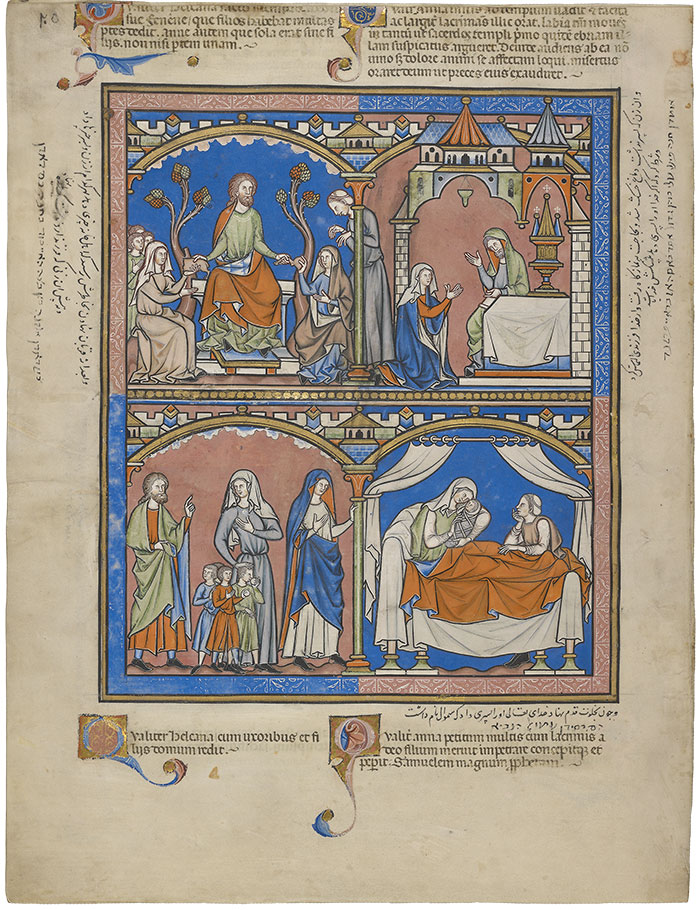
Hannah's Grief, Hannah's Prayer, The Road Home, Samuel
Old Testament Miniatures with Latin, Persian, and Judeo-Persian inscriptions
Purchased by J.P. Morgan (1867–1943) in 1916
Hannah's Grief
After the offering is made, Elkanah distributes portions to his family. To Peninnah and her children goes the greatest portion. But to Hannah he can only give a small amount, although he loves and pities her much. Peninnah is depicted here a second time, standing behind the unfortunate Hannah and mocking her. (1 Kings 1:4–7)
Hannah's Prayer
Hannah returns to the temple alone and prays for a son, vowing that she will devote him to the Lord's priesthood. Eli, the chief priest, discovers her weeping and silently pleading before the Ark of the Covenant. Eli takes pity on her and asks the God of Israel to hear her petition. (1 Kings 1:9–17)
The Road Home
This miniature probably depicts the return of Elkanah's family to their home in Ramah. Elkanah appears to be reproving Peninnah, whose children nibble on bread. It is also possible that Elkanah is urging Hannah not to grieve, an event that, in the Bible, takes place before her prayers in the temple. (1 Kings 1:8; 1 Kings 1:19)
Samuel
A miracle occurs. The Lord has heard Hannah's plea and granted her a son. She names him Samuel, meaning "I have asked for him from the Lord." As Hannah adores the swaddled infant, Peninnah leans against the bed, supporting her chin on her hand and wearing an expression of quiet amazement. (1 Kings 1:20)
Folio 19v (Latin)
Upper left: How Elkanah, the sacrifice now completed, gave many portions to his wife Peninnah, who had many children, but only one portion to Hanna who was alone with no children. (I Samuel 1:4–6)
Upper right: How Hanna goes in her sorrow to the temple and silently prays there, weeping sorely, while not moving her lips, with the result that, at first, the priest of the temple censures her, suspecting her to be drunk. Then, hearing that she speaks affected not by wine but by the sorrow of her heart, he pities her and entreats God to listen to her prayers. (I Samuel 1: 9–18)
Lower left: How Elkanah returns home with his wives and children. (I Samuel 1: 19)
Lower right: How after Hanna had asked a son from God with many tears, her wish was granted and she conceived and gave birth to Samuel, the great prophet. (I Samuel 1:20)
Folio 19v (Persian)
Persian foliation: 25
Upper left margin: And after having offered the sacrifice, he thought to give some to the household. He gave [many] pieces to the wife with the son and he set aside a [single] piece for the wife with whom he had no child.
Upper right margin: And the childless woman grieved and in supplication went to the temple.
Lower right: And when she stepped into the house, God the exalted gave her a son who was called Samuel.
Folio 19v (Judeo-Persian)
Upper left margin, furthest left: Elkanah gives something to the wife, [mother] of his children; he gives less to Hannah.
Upper right margin, furthest right: Hannah’s coming before Eli, the High Priest, to beg him [to intercede for her to have] a child.
Lower right, between Persian and Latin: The birth of the prophet Samuel.
Italicized words are in Hebrew.
Content consultant: Richard Leson
Persian translated by Sussan Babaie
Judeo-Persian translated by Vera Basch Moreen
Latin translation by Eran Lupu
After the commentary volume accompanying the Fine Art Facsimile edition by Faksimile Verlag Luzern
MS M.638, fol. 20r
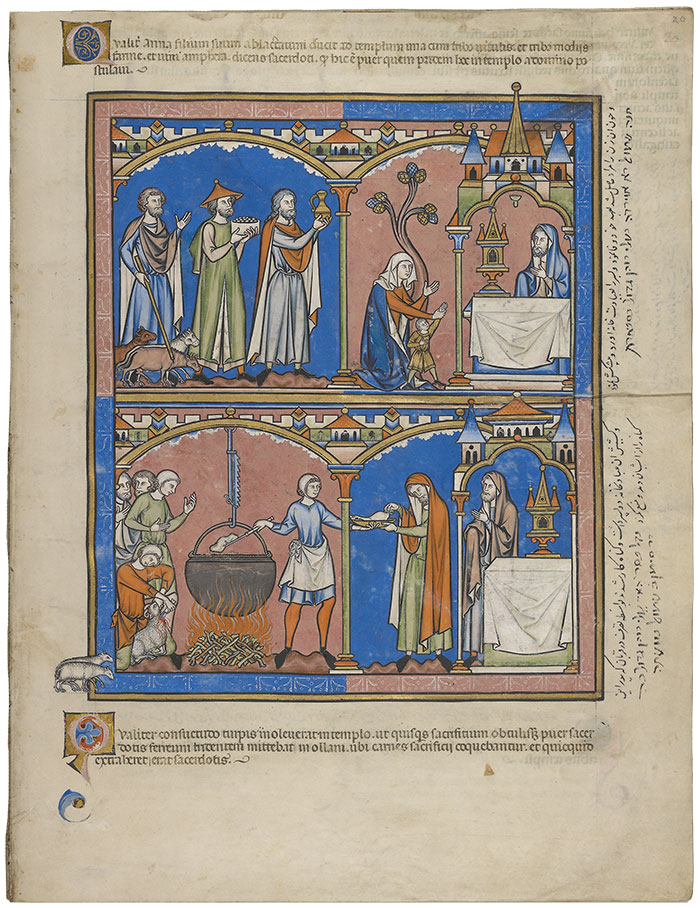
Hannah Honors her Vow, Recreant Priests
Old Testament Miniatures with Latin, Persian, and Judeo-Persian inscriptions
Purchased by J.P. Morgan (1867–1943) in 1916
Hannah Honors her Vow
Gratefully, Hannah has returned to the temple in Shiloh and to Eli, the high priest. As thanks to the Lord, she has her servants bring three calves, three bushels of flour, and a bottle of wine. But her most important gift is her son, Samuel, whom she vowed she would consecrate to the Lord. Eli, seated behind the altar and the Ark of the Covenant, accepts these gifts on behalf of the Lord and receives Samuel into the ranks of the priesthood. (1 Kings 1:21–28)
Recreant Priests
At Shiloh, whenever a pilgrim makes a sacrifice, Eli's corrupt sons send a servant to fetch a portion. The servant's three-pronged fork guarantees that the priests will always take a large part of the sacrifice; at left, the frustrated man who made the offering raises his hands in disgust. The enormous cauldron seen here is suspended from a device that functions like a chimney-crook; its metal teeth enable it to be raised or lowered. (1 Kings 2:12–14)
Folio 20r (Latin)
Upper half: How Hannah leads her weaned son to the temple together with three calves, three measures of flour, and a bottle of wine, saying to the priest that ’Here is the boy whom I have formerly asked from the Lord.’ (I Samuel I: 24–28)
Lower half: How there was a shameful habit that when someone had offered a sacrifice, the servant of the priest was thrusting a fish hook of three teeth into the caldron where the flesh was boiling and whatever he drew up belonged to the priest. (I Samuel 2: 12–17)
Folio 20r (Persian)
Upper right margin: And since the woman’s wish was granted, she kept her vow and brought the son to the temple and offered him [in service].
Lower right margin: And the priest of that temple had two sons and they became sinners because of having violated the [laws of] sacrifice; the father had seen them sin and had said nothing.
Folio 20r (Judeo-Persian)
Upper right margin, furthest right: Hannah brings Samuel and entrusts him to Eil, the High Priest.
Lower right margin, furthest right: The tale of the sons of Eli, the High Priest, as it is written in [chapter] 2 of Samuel.
Italicized words are in Hebrew.
Content consultant: Richard Leson
Persian translated by Sussan Babaie
Judeo-Persian translated by Vera Basch Moreen
Latin translation by Eran Lupu
After the commentary volume accompanying the Fine Art Facsimile edition by Faksimile Verlag Luzern
MS M.638, fol. 20v
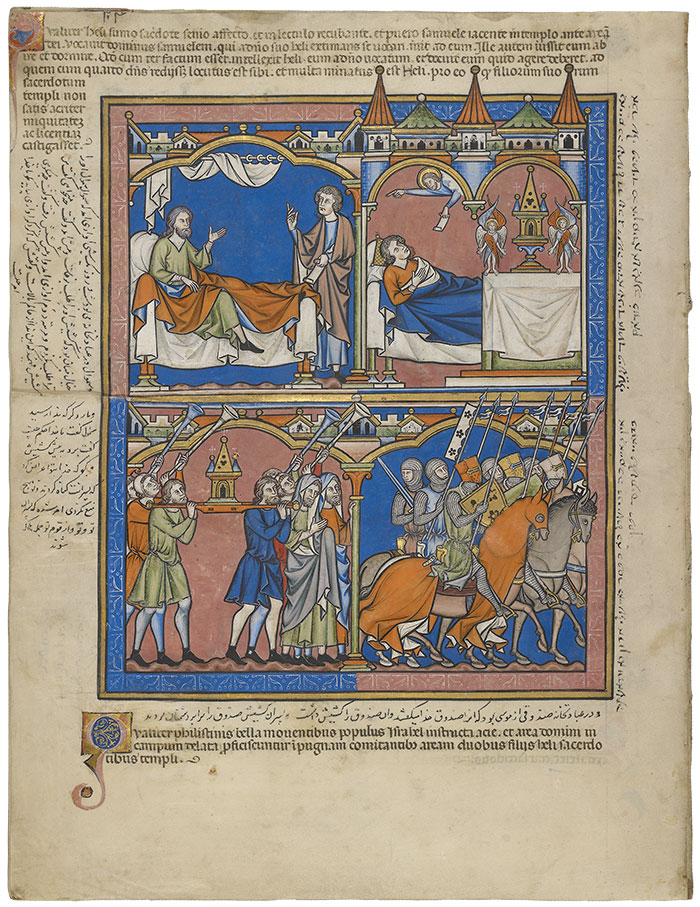
God Calls to Samuel, Destined for Defeat
Old Testament Miniatures with Latin, Persian, and Judeo-Persian inscriptions
Purchased by J.P. Morgan (1867–1943) in 1916
God Calls to Samuel
In the presence of the Ark, the Lord awakens the young Samuel and speaks to him for the first time, revealing the terrible destruction that will befall the House of Eli. Reluctantly, Samuel shares the Lord's tidings with his teacher. Raising his eyes and gesturing to heaven, Samuel repeats the judgment to the dismayed Eli, who can only resign himself to fate. This is a remarkable painting of the Ark of the Covenant, the only one in the Picture Bible that incorporates the winged cherubim described in the Book of Exodus. (1 Kings 3:10–18)
Destined for Defeat
Later, the corrupt sons of Eli, leading a procession of men who bear the Ark, accompany the Israelite army into battle against the Philistines. The last member of the cavalry looks over his shoulder toward the Ark; his worried expression foretokens the destruction that awaits the army. (1 Kings 4:1–4)
Folio 20v (Latin)
Upper half: How as Eli, the high priest, weakened by old age, was reclining in his bed, and the child Samuel was lying in the temple before the ark of God, the Lord called Samuel who, thinking that his master, Eli, was calling him, went to him. Yet, he ordered him to go and lie down to sleep. When this had happened three times, Eli understood that the Lord had called him and taught him what he ought to do. When the Lord had returned to him for the fourth time, he spoke to him and threatened Eli much, because he had not chastised the inequity and the license of his sons, the priests of the temple, with sufficient severity. (I Samuel 3: 1–14)
Lower half: How, as the Philistines were beginning a war, the people of Israel, having formed an army, set out to battle with the ark of the Lord which had been moved to the camp and with the two sons of Eli, the priests of the temple, escorting it. (I Samuel 4: 1–4)
Folio 20v (Persian)
Persian foliation: 24
Upper left margin: Samuel remained in the temple day and night. One night, a voice came calling, "Samuel, Samuel." Since he thought that the priest had called him, he came forth and said, "What do you wish?" He said, "I did not summon you." And the second time the voice came and he went to the priest and asked, "What are you saying?" The priest realized that the voice was from the heavens and said to him, "If another call comes, say, ’O Lord, what do you command?’"
Lower left margin: The next time that the call came, Samuel said, "O Lord, what do you command?" He [God] said, "Go to the priest and say that God has shunned you for your sons have sinned and you have not chastised them; it is commanded that your sons and you, all of your tribe, shall perish."
Lower half: In the temple, there was an Ark belonging to Moses which they called the Ark of God and the priest held the Ark and the priest’s sons brought the Ark before the enemy.
Folio 20v (Judeo-Persian)
Upper right margin: Here it is that Samuel hears a voice in the night three times; he comes before Eli, then Eli comprehends that this call is from God.
Lower right margin: Here it is that the Children of Israel, with the two sons of Eli, carry the Ark [of the covenant] as a remedy against the Philistines.
Italicized words are in Hebrew.
Content consultant: Richard Leson
Persian translated by Sussan Babaie
Judeo-Persian translated by Vera Basch Moreen
Latin translation by Eran Lupu
After the commentary volume accompanying the Fine Art Facsimile edition by Faksimile Verlag Luzern
MS M.638, fol. 21r
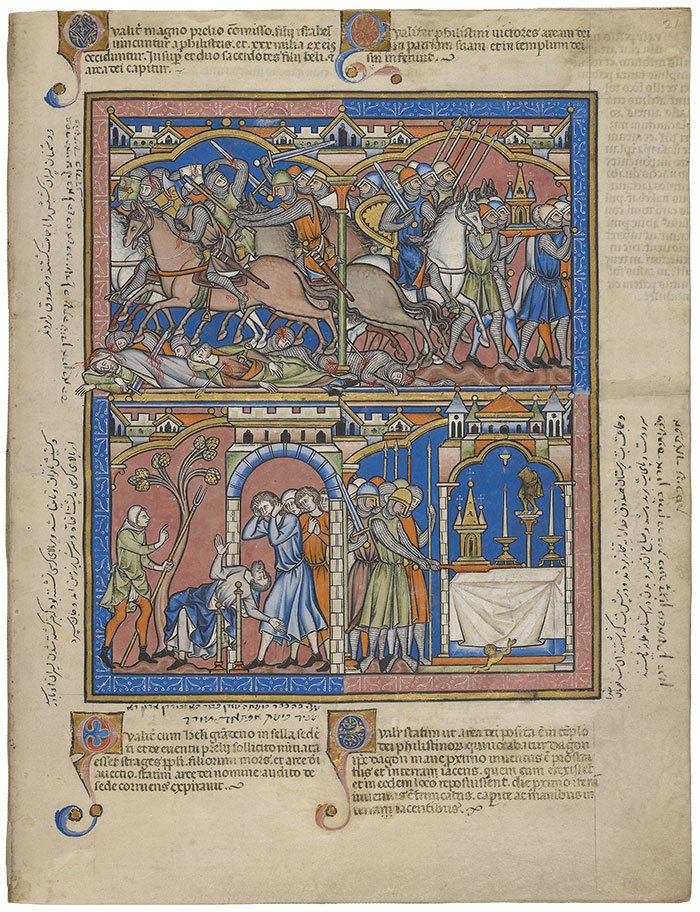
Samuel's Prophecy Fulfilled, All is Lost, Eli's Death, Dagon Dismembered
Old Testament Miniatures with Latin, Persian, and Judeo-Persian inscriptions
Purchased by J.P. Morgan (1867–1943) in 1916
Samuel's Prophecy Fulfilled
Samuel's prophecy of the doom of the house of Eli is fulfilled with terrible consequences—thirty thousand men are killed. The Israelites are routed and massacred by the Philistines. The wicked sons of Eli lie slain by arrow and sword beneath the hooves of retreating horses. (1 Kings 4:5–11)
All is Lost
The Ark of the Covenant is captured and borne away by victorious Philistines. (1 Kings 4:11)
Eli's Death
A Benjamite messenger arrives in Shiloh with news of the Israelites'defeat. When Eli learns of his sons' deaths and the loss of the Ark of the Covenant, he is overwhelmed by shock and grief. He swoons backwards in his chair, breaks his neck, and dies. The people of Shiloh emerge from the city gate, expressing great dismay and grief. (1 Kings 4:12–18)
Dagon Dismembered
The Ark of the Covenant will bring no peace to the pagan Philistines. In their city of Ashdod, they set the Ark upon the altar of their god Dagon, and his image breaks in half. (1 Kings 5:2–5)
Folio 21r (Latin)
Upper left: How the sons of Israel were defeated in a great battle and thirty thousand of them fell and, moreover, the sons of Eli, the priests of the temple, and the ark of God was captured. (I Samuel 4: 6–11)
Upper right: How the victorious Philistines carry the ark of God to their homeland to place it in the temple of their god. (I Samuel 5: 1–2)
Lower left: How, when the aged Eli was sitting on a seat and all was announced: the disturbing outcome of the battle, the slaughter of the people, the death of his sons, and the loss of the ark of God, as the ark of God was mentioned, he at once fell off his seat and died. (I Samuel 4: 12–18)
Lower right: How at once, when the Philistines had set the ark of God in the temple of their god who was called Dagon, Dagon himself was found in the next morning lying prostrate on the ground. When they had raised him up and set him back in the same place, again, in the next morning, he was found truncated, his head and hands lying on the ground. (I Samuel 5: 2–4)
Folio 21r (Persian)
Upper left margin: And the enemies slew the sons and brethren of the priest and took away the Ark.
Lower left margin: The priest became weak and blind and while he was sitting on a chair, he received the news of the slaying of his sons. He fell backwards from the chair and his head hit the ground and he died.
Lower right margin: And the company of the idolaters took the Ark of God to the temple of idols and laid it before the idol. That night, by the command of God, the head, hands and feet of the idol were cut off and in the morning they found the head and the body on the threshold of that temple.
Folio 21r (Judeo-Persian)
Upper left margin, closest: The sons of Eli together with thirty thousand from among the Children of Israel were killed; the Philistines also carried off the Ark.
Lower left, above Latin: Eli, upon being told about the killing of his sons and the capture of the Ark, fell backwards and died.
Lower right margin, furthest right: The Philistines carry the Ark into the idolatrous temple of Dagon, place it next to Dagon; [the idol] Dagon falls down and breaks.
Italicized words are in Hebrew.
Content consultant: Richard Leson
Persian translated by Sussan Babaie
Judeo-Persian translated by Vera Basch Moreen
Latin translation by Eran Lupu
After the commentary volume accompanying the Fine Art Facsimile edition by Faksimile Verlag Luzern
MS M.638, fol. 21v
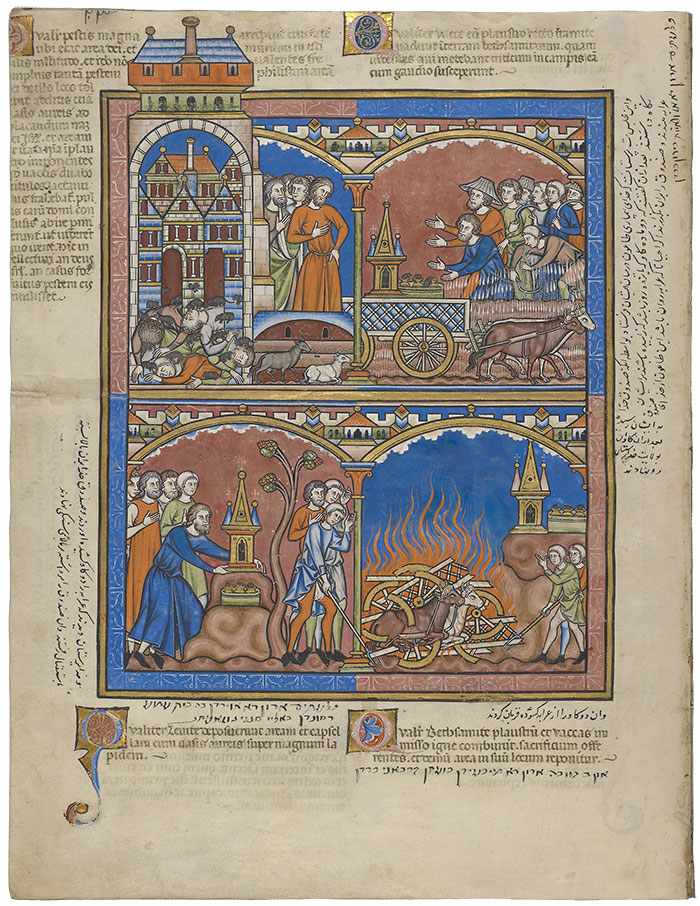
Plague in Ashdod, A Trespass Offering, The Ark in Beth Shemesh, A Burnt Offering
Old Testament Miniatures with Latin, Persian, and Judeo-Persian inscriptions
Purchased by J.P. Morgan (1867–1943) in 1916
Plague in Ashdod
A great pestilence settles upon Ashdod. Mice swarm in the fields and villages, feeding on the plague-ridden corpses. (1 Kings 5:6–7)
A Trespass Offering
The Philistines seek to rid themselves of the troublesome Ark. They prepare an offering to the Lord to atone for their thievery. After consulting priests and diviners, the Philistines ready a cart pulled by milk cows that have newly calved (the calves appear harnessed in the Philistine stable). Upon the cart, in addition to the Ark, they place rich, golden offerings representing each Philistine province. Thus laden, the cart is driven into the territory of Beth Shemesh, where joyous field workers receive it. The miniature painter has mistakenly included live mice among the offerings; the Bible states that these, too, were made of gold. (1 Kings 6:2–13)
The Ark in Beth Shemesh
The Levites remove the Ark from the cart, along with the golden offerings, and place them upon a great stone. (1 Kings 6:14–15)
A Burnt Offering
Having safely unloaded the Ark, the men of Beth Shemesh burn the cart and the milk cows as an offering to the Lord. The men tending the fire hold their hands before their faces to shield themselves from the intense heat. (1 Kings 6:14–15)
Folio 21v (Latin)
Upper left: How a great pestilence and an innumerable multitude of mice smote the city where the ark of God was, and for that reason, unable to sustain such a pestilence any longer, the Philistines removed the ark of God from that place, having added golden vessels to soothe the anger of the God of Israel. Then, putting the ark and the vessels themselves on a cart drawn by two suckgiving cows, their calves having been shut up at home, they let it go, that they might see where it went. For thus they were going to learn whether the God of Israel or a fortuitous chance had brought the pestilence upon them. (I Samuel 5:6 – 6:9)
Upper right: How the cows with the cart took the straight way to the land of the Beth-shemites. Seeing it, those who were reaping the wheat in the fields received it joyfully. (I Samuel 6:10–13)
Lower left: How the Levites took the ark and the coffer with the golden vessels and put it upon the great stone. (I Samuel 6:15)
Lower right: How the Beth-shemites set fire to the cart and the cattle and burnt them up, offering sacrifice, and at last the ark is restored to its place. (I Samuel 6:14)
Folio 21v (Persian)
Persian foliation: 23
Upper right margin: This is the image of the idolaters against whom God spread pestilence because they had captured the Ark of God. Afterwards, they [the Philistines] said to tie a cart to two [kine] who had given birth fifteen days before and place the Ark on it so that if the cart would roll, this pestilence of the Ark’s God would pass to them. Then, the kine turned toward the lands of the believers of God.
Lower left margin: The believers saw the cart pulled by two kine; they brought it; and the Ark of God was placed upon it. They went to welcome it and they removed the Ark and placed it upon a stone.
Lower right: They released the kine from the cart and sacrificed them.
Folio 21v (Judeo-Persian)
Upper right margin, corner: The Philistines carry the Ark our of the country.
Lower left, above Latin: The Philistines carry the Ark to Bethshemesh and place it on top of a rock.
Lower right, beneath Latin: Those two kine that had pulled the Ark were killed and offered in sacrifice.
Italicized words are in Hebrew.
Content consultant: Richard Leson
Persian translated by Sussan Babaie
Judeo-Persian translated by Vera Basch Moreen
Latin translation by Eran Lupu
After the commentary volume accompanying the Fine Art Facsimile edition by Faksimile Verlag Luzern
MS M.638, fol. 22r
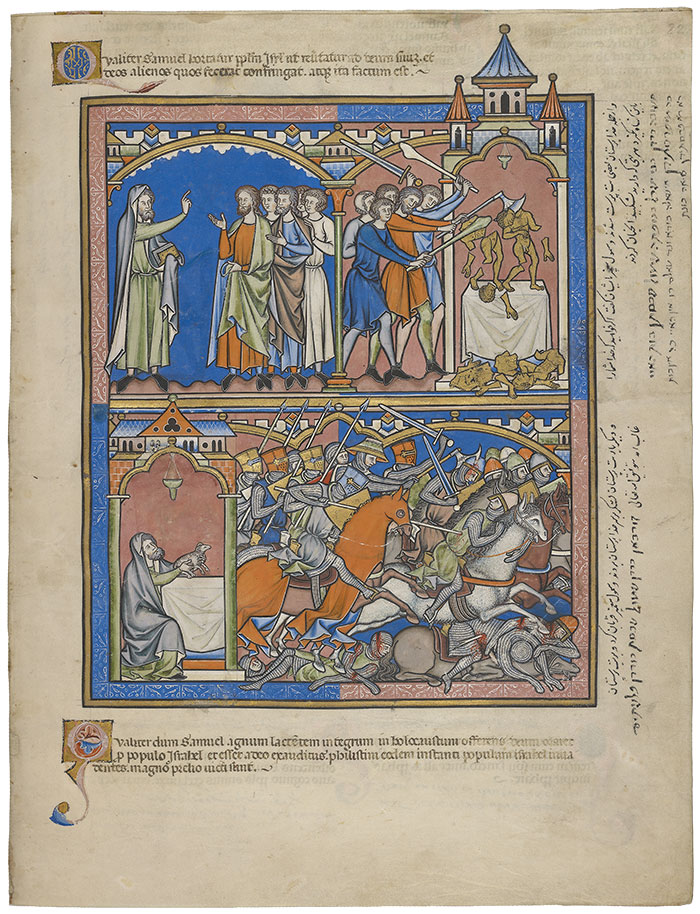
Repentance, Samuel's Sacrifice Assures Victory
Old Testament Miniatures with Latin, Persian, and Judeo-Persian inscriptions
Purchased by J.P. Morgan (1867–1943) in 1916
Repentance
For more than twenty years, the Israelites have suffered under the Philistines, so Samuel (holding a golden book as a sign of his authority and wisdom) advises the people to put away strange gods and turn wholeheartedly to the Lord. The repentant Israelites heed Samuel's words and smash the idols of the gods Baal and Ashtoreth. (1 Kings 7:3–6)
Samuel's Sacrifice Assures Victory
Samuel offers a sacrifice to the Lord for the salvation of Israel from the Philistines. The Lord hears this prayer and grants the Israelites victory. The terrified Philistines must retreat over the corpses of their fellows or be cut down by the pursuing Israelites. (1 Kings 7:7–11)
Folio 22r (Latin)
Upper half: How Samuel encourages the people of Israel to return to their God and to destroy the strange gods which they had made, and so they did. (I Samuel 7: 3–4)
Lower half: How, when Samuel, offering a whole suckling lamb for a holocaust, was praying for the people of Israel and was heard by God, at that very moment, the Philistines who were invading Israel, were defeated in a great battle. (I Samuel 7:10)
Folio 22r (Persian)
Upper right margin: Some of the company of the believers became idolaters and the prophet Samuel said to them, "If you want not God to exhort you for this sin, break whatever idols you have." They so did.
Lower right margin: And once again the idolaters brought armies against the believers and the prophet Samuel offered sacrifices and defeated the idolaters, by the grace of God the Exalted.
Folio 22r (Judeo-Persian)
Upper right margin, furthest right: The repentance of the Children of Israel upon Samuel’s exhortation, their breaking of the idols which they had worshipped, [saying], "Exalted Lord of the Universe, behold these who have worshipped idols and have shamed You."
Lower right margin, furthest right: [While] Samuel offers a sacrifice, the Philistines are defeated.
Italicized words are in Hebrew.
Content consultant: Richard Leson
Persian translated by Sussan Babaie
Judeo-Persian translated by Vera Basch Moreen
Latin translation by Eran Lupu
After the commentary volume accompanying the Fine Art Facsimile edition by Faksimile Verlag Luzern
MS M.638, fol. 22v
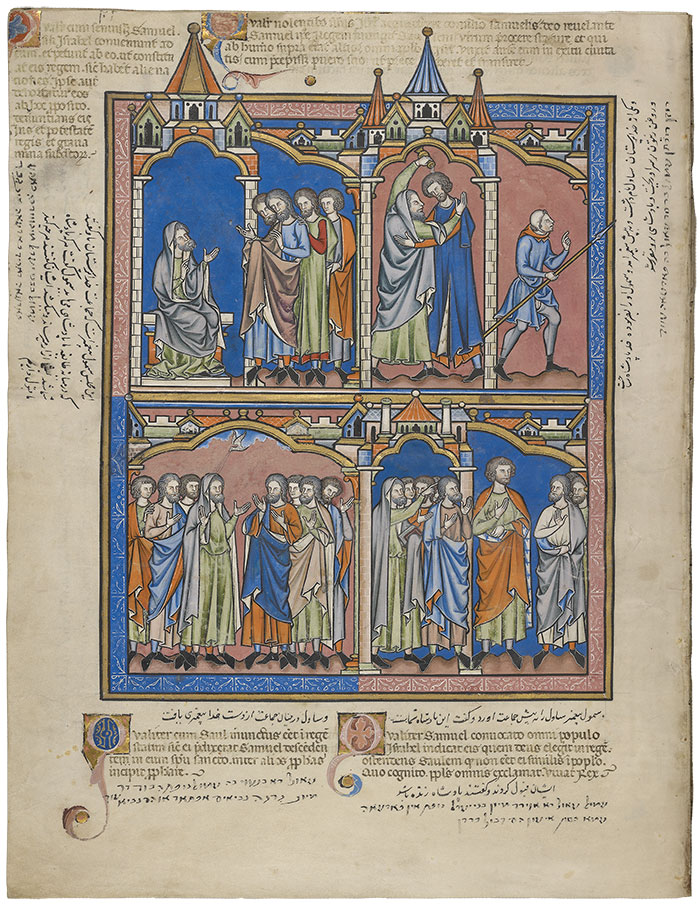
King Maker, Saul, the Lord's Anointed, "Is Saul Also among the Prophets?", Saul, King of Israel
Old Testament Miniatures with Latin, Persian, and Judeo-Persian inscriptions
Purchased by J.P. Morgan (1867–1943) in 1916
King Maker
Samuel, now a very old man, is approached by the elders of Israel. They desire that he choose a king for them, so that they might be like other powerful nations. Uncertain, Samuel consults the Lord. Let them do as they wish, the Lord tells Samuel, but explain to them the hardships they will face under the rule of a king. Samuel shares the Lord's words with the elders, but they are stubborn in their desire for a mighty leader. (1 Kings 8:4–22)
Saul, the Lord's Anointed
The Lord has chosen Saul, a tall and handsome man from the tribe of Benjamin, to free Israel from the oppression of the Philistines. After he dines with Saul, Samuel dismisses a servant, who departs at the right. Samuel privately anoints Saul with holy oil, a sign that he is to become king over the children of Israel. (1 Kings 9:26–10:1)
"Is Saul Also among the Prophets?"
This miniature should depict Saul among the prophets, after his departure from Samuel. The painter appears to have confused the story, however, for here it is not Saul but Samuel that prophecies in the midst of the seers. The biblical account relates how Saul encountered a group of prophets and suddenly received the spirit of the Lord. (1 Kings 10:9–13)
Saul, King of Israel
Samuel assembles the tribes of Israel and before the elders proclaims Saul as king. Saul's great height inspires the people, who cheer "Long live the King!" (1 Kings 10:17–24)
Folio 22v (Latin)
Upper left: How, when Samuel was old, the children of Israel came to him and asked him to make them a king as other nations had. But he dissuades them from this intention, reminding them of the manner and authority of the king and of the pains of his subjects. (I Samuel 8: 1–18)
Upper right: How, as Samuel’s counsel had found the children of Israel unwilling to calm down, Samuel anointed Saul to be a king, his identity having been revealed by God. He was a man of mighty stature, taller than all of Israel from his shoulders upward. Now, Samuel anointed him at the gate of the city, after he had ordered his servant to go forth and pass on. (I Samuel 9: 2–15 – 10: 1)
Lower left: How, when Saul had been anointed to be a king, at once the holy spirit came upon him, as Samuel had foretold, and he began prophesying among the other prophets. (I Samuel 10: 9–13)
Lower right: How Samuel, having called together the people of Israel, presents before them the one whom God had chosen for a king, showing that there was none like Saul among the people. This having been made known, all the people shout: ’Long live the king’. (I Samuel 10: 17–74)
Folio 22v (Persian)
Persian foliation: 22
Upper left margin: This is the image of the prophet Samuel to whom the company of the believers said, "There must be a king amongst our tribe." Samuel said, "Whoever becomes your king, he shall harm you and kill you." They said, "We accept whatever he does."
Upper right margin: One of the believers was named Saul and he went before the prophet and Samuel, according to God’s command, made him king and anointed him and kingship was granted to him.
Lower left: And Saul, in the presence of the community, was given prophethood by God.
Lower right, above and below Latin inscription: And the prophet Samuel presented Saul to the people and said, "This is your king." They consented and said, "Long live the king!"
Folio 22v (Judeo-Persian)
Upper left margin, furthest left: Samuel is saying to the Children of Israel, "If you want to have a king, the king [will bring] oppression..."
Upper right margin, furthest right: Samuel’s anointing of Saul so that he would become king.
Lower left, beneath Latin: Saul, as Samuel had said, fell into the circle of prophets and he also prophesied.
Lower right, beneath Persian: Samuel brings Saul among the Children of Israel, saying: "This is your king." They accept him.
Italicized words are in Hebrew.
Content consultant: Richard Leson
Persian translated by Sussan Babaie
Judeo-Persian translated by Vera Basch Moreen
Latin translation by Eran Lupu
After the commentary volume accompanying the Fine Art Facsimile edition by Faksimile Verlag Luzern
MS M.638, fol. 23r
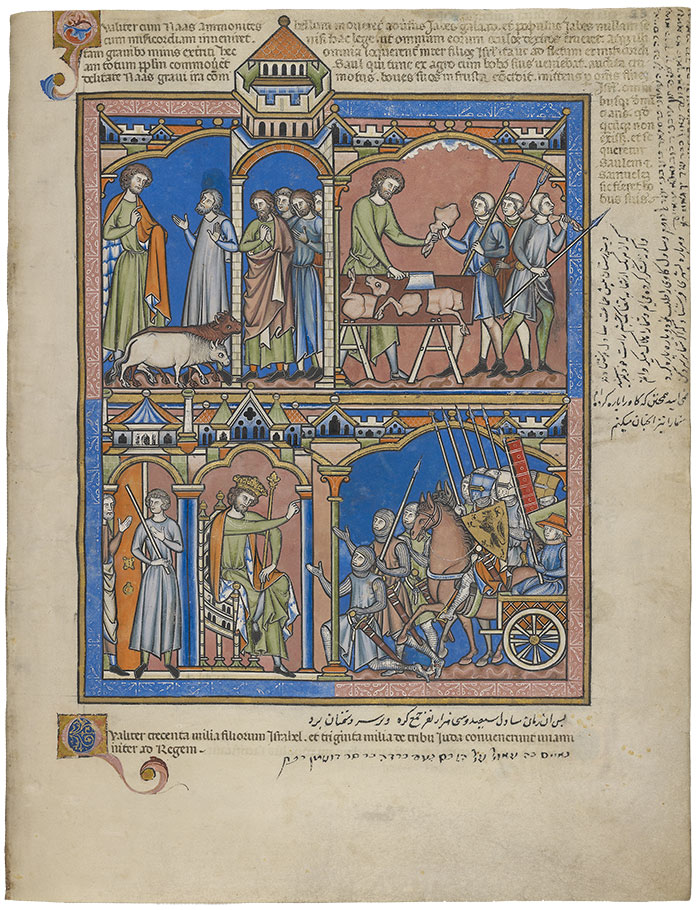
A Plea for Help, Marshaling Forces
Old Testament Miniatures with Latin, Persian, and Judeo-Persian inscriptions
Purchased by J.P. Morgan (1867–1943) in 1916
A Plea for Help
As Saul drives oxen in from the fields, he is met by anguished messengers from Jabesh-Gilead. Nahash the Ammonite has encamped outside the city and threatened to gouge out the right eye of every inhabitant. The king, enraged, slaughters two oxen and cuts them into pieces. The pieces are sent throughout Israel with a message: either follow Saul and Samuel into battle or expect the same to be done to your oxen. (1 Kings 11:1–7)
Marshaling Forces
Saul, crowned, bearing a scepter, and seated on an ivory throne, greets the warriors of Israel. The foremost kneel before the king and pledge their fealty. A standard bearer rides along in a supply cart. Behind Saul, a royal attendant assures a messenger from Jabesh-Gilead that help is at hand. (1 Kings 11:7–9)
Folio 23r (Latin)
Upper half: How when Nahash the Ammonite began waging war against Jabesh-gilead and the people of Jabesh were finding no equity in him except this term by which he offered to pluck their right eyes, they, terrified by such threats, were telling all of this to the people of Israel, so that all the people were moved to tears and pity. Now, Saul was then coming out of the field with his oxen and upon hearing about the savagery of Nahash, great anger overtook him and he cut his oxen into pieces, sending them throughout the borders of Israel, making it known to all that whoever did not come forth and follow Saul and Samuel so would it be to his oxen. (I Samuel 11: 1–7)
Lower half: How three hundred thousand of the children of Israel and thirty thousand of the tribe of Judah unanimously came together to the king. (I Samuel 11: 7–8)
Folio 23r (Persian)
Upper right margin: And they sent the idolaters before Saul’s assembly [saying], "Each one of you, branding [yourself], send the right eye, otherwise I will gather troops [and] come to annihilate you." Saul demanded a cow and cut it to pieces and sent each piece to a city [threatening], "if you do not fall upon the enemy, just as I tore the cow I shall do onto you the same."
Lower right: After that time, Saul gathered three hundred and thirty thousand persons and attacked the enemy.
Folio 23r (Judeo-Persian)
Upper right margin, corner: Here Nahash the Ammonite, having sent [a message] to the Children of Israel [saying], "If each one of you will pluck out your eye, well and good, otherwise I will come and destroy you," [when] Saul was informed of this, he chopped up an ox [and sent a piece to every (Israelite) city].
Lower right, beneath Latin: Here Saul assembles three hundred and thirty thousand people and leads [them] against the enemy.
Italicized words are in Hebrew.
Content consultant: Richard Leson
Persian translated by Sussan Babaie
Judeo-Persian translated by Vera Basch Moreen
Latin translation by Eran Lupu
After the commentary volume accompanying the Fine Art Facsimile edition by Faksimile Verlag Luzern
MS M.638, fol. 23v
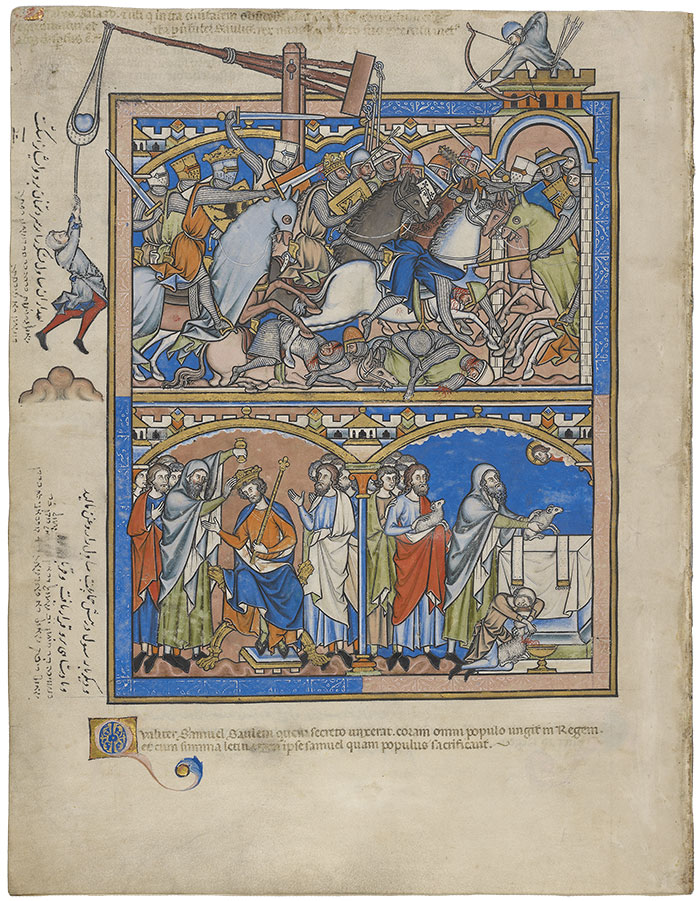
Saul Victorious, A Proven Leader
Old Testament Miniatures with Latin, Persian, and Judeo-Persian inscriptions
Purchased by J.P. Morgan (1867–1943) in 1916
Saul Victorious
Saul and his army devastate the Ammonites. Nahash attempts to flee the battlefield, but Saul, crowned and wearing an orange tunic, cleaves his enemy's skull with his sword. The Ammonites are assailed from all sides. From atop the battlements, an archer takes aim at the only unwounded Ammonite. An enormous catapult, pulled completely taut, will send a boulder crushing through the Ammonite ranks. Another contingent of Israelites emerges from the city gates and deals fatal blows with sword and club; an Ammonite in a blue tunic is violently unhorsed by a soldier wielding a battle ax. (1 Kings 11:11)
A Proven Leader
The Israelite victory is celebrated with Saul's public anointing and coronation. The king's throne in this illustration is identical to the sella curulis—the folding coronation chair of French kings housed in the royal abbey of Saint Denis. To the right, Samuel offers sacrifices to the Lord, who gazes upon his loyal servant from the heavens. (1 Kings 11:14–15)
Folio 23v (Latin)
Upper half: How [Saul, messengers having been sent, came in the morning to help the people] of Jabesh-gilead, and those who were besieged in the city, aware of his arrival, went out, and thus through the courage of Saul, king Nahash and all his army were defeated and scattered. (I Samuel 11: 9–11)
Lower half: How Samuel, who had secretly anointed Saul, anointed him to be a king before the people and both Samuel and the people sacrificed with the utmost happiness. (I Samuel 11: 14–15)
Folio 23v (Persian)
Persian foliation: 21
Upper left margin: After that, Saul brought the army against the enemy and defeated them.
Lower left margin: And once again Samuel anointed Saul before the assembly and kingship was confirmed upon him and he offered sacrifices.
Folio 23v (Judeo-Persian)
Upper left margin, furthest left: Saul, having assembled the people, encountered the enemy and defeated them.
Lower left margin, furthest left: When he [Saul] returned safely, and Samuel sprinkled Saul with oil in this [manner], making him king, they offered sacrifices.
Content consultant: Richard Leson
Persian translated by Sussan Babaie
Judeo-Persian translated by Vera Basch Moreen
Latin translation by Eran Lupu
After the commentary volume accompanying the Fine Art Facsimile edition by Faksimile Verlag Luzern
MS M.638, fol. 24r
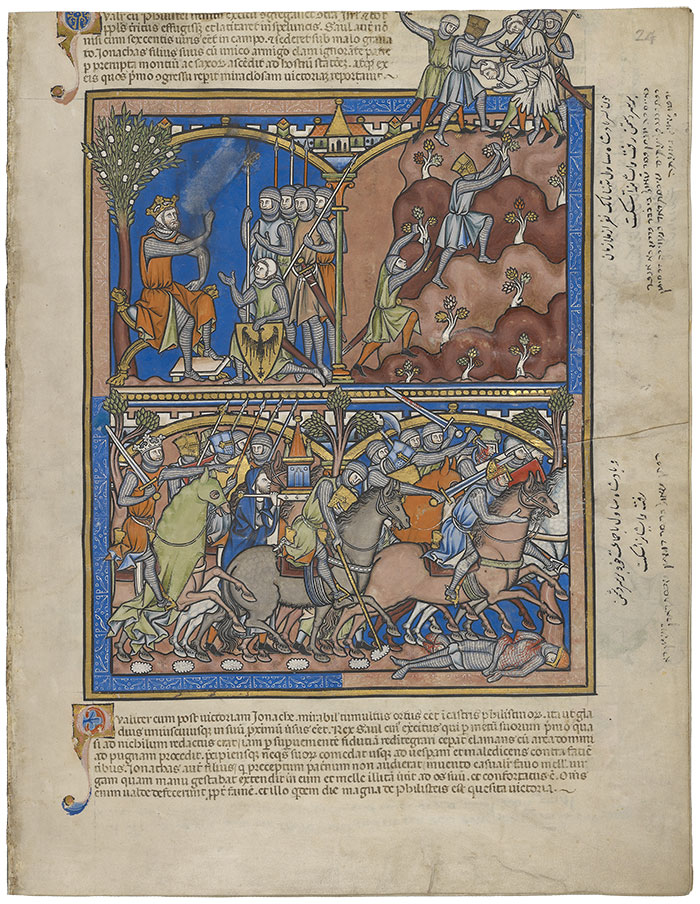
Jonathan, a Prince, The Battle is joined
Old Testament Miniatures with Latin, Persian, and Judeo-Persian inscriptions
Purchased by J.P. Morgan (1867–1943) in 1916
Jonathan, a Prince
Encamped outside of Gibeah, Saul rests beneath a pomegranate tree and advises his warriors. Meanwhile, without informing his father, Saul's son Jonathan bravely scales a mountain to attack a Philistine garrison. Accompanied only by his armor-bearer, Jonathan engages the enemy; together they kill twenty men. (1 Kings 14:1–14)
The Battle is Joined
Sounds of battle have been heard in the Philistine camp, so Saul has assembled his army. It is discovered that Jonathan and his armor-bearer are missing. As the priest Ahijah bears the Ark of the Covenant into battle, Saul issues a bold command: the army is not to partake of food until all of the Philistines are destroyed. Jonathan, riding ahead, does not hear his father's instruction. Cradling his great helm in his left hand, he leans from his horse and spears a honeycomb to eat. (1 Kings 14:17–27)
Folio 24r (Latin)
Upper half: How when the Philistines had gathered a huge army against Israel and all the people had fled in terror and were hiding in caves, as Saul was nevertheless sitting in his camp under a pomegranate tree, accompanied by only six hundred men, Ionachas [Jonathan], his son, without his father’s knowledge, went up with a single armor bearer through steep and rugged mountains and rocks to the enemy’s garrisons, and, having defeated those whom he had encountered first, he came back miraculously victorious. (I Samuel 14: 1–14)
Lower half: How, after Ionachas’ victory, a marvelous tumult had arisen in the Philistine camp and every man’s sword was turned upon his neighbor. Now, as his army, which had been first seemingly reduced to nothing by the men’s fear, had already started to be revived with inspiring confidence, king Saul, shouting, went to battle with the ark of God, ordering his men not to eat till the evening and cursing disobeyors. Yet his son, Jonathan [Ionachas], who had not heard his father’s command, having by chance found a honeycomb, reached to it with a staff he was holding, directed the honey to his mouth, and was much strengthened. All were greatly weakened by hunger and indeed, on that day, a great victory was obtained over the Philistines. (I Samuel 14: 15–27)
Folio 24r (Persian)
Upper right margin: Then the son of king Saul, with only one of his servants, fell upon the enemy and defeated them.
Lower right margin: And king Saul, with his own army, fell upon the enemy and defeated them.
Folio 24r (Judeo-Persian)
Upper right margin, furthest right: Here it is that Jonathan, the son of Saul, went with some men and fought the Philistines without his father’s knowledge, as it is written in Samuel [chapters] 14 [and] 15.
Lower right margin, furthest right: Saul goes to fight and defeats the enemy.
Content consultant: Richard Leson
Persian translated by Sussan Babaie
Judeo-Persian translated by Vera Basch Moreen
Latin translation by Eran Lupu
After the commentary volume accompanying the Fine Art Facsimile edition by Faksimile Verlag Luzern
MS M.638, fol. 24v
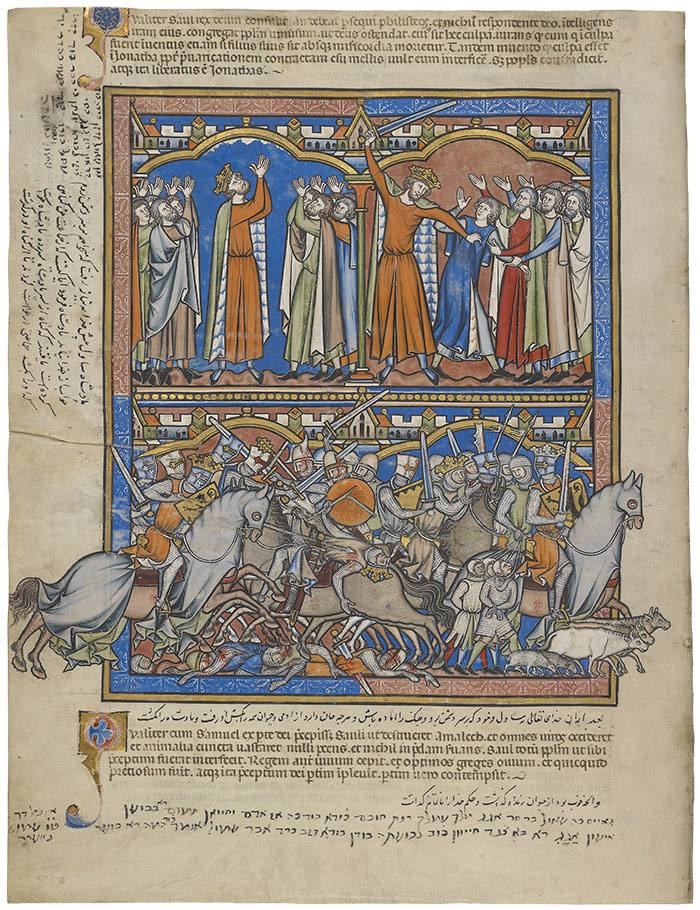
Unbalanced by Rage, A Royal Insubordinate
Old Testament Miniatures with Latin, Persian, and Judeo-Persian inscriptions
Purchased by J.P. Morgan (1867–1943) in 1916
Unbalanced by Rage
Frustrated by the prolonged battle with the Philistines, Saul seeks the counsel of the Lord, who does not reply. The king discovers that Jonathan has eaten during the battle and wrongly deduces that this act offended the Lord. Saul resolves to kill Jonathan, but the Israelites deliver the youth from his father's misguided vengeance. (1 Kings 14:37–45)
A Royal Insubordinate
Afterwards, the Lord orders Saul, through Samuel, to destroy the Amalekites, stating that neither man nor beast is to be spared. In battle, Saul violently unhorses the Amalekite king Agag, but, contrary to the will of the Lord, takes Agag and his soldiers captive and collects the best of the enemy's cattle. (1 Kings 15:2–9)
Folio 24v (Latin)
Upper half: How king Saul consulted God, asking if he ought to pursue the Philistines. But God did not answer him and thus, aware of his anger, he called together all the people, that God may show whose fault it was, swearing that whoever was to blame, even his very own son, would surely die. When, at length, the fault had been found to be Jonathan’s due to the transgression of eating the honey, he wants to kill him. Still, the people speak against it and Jonathan is released. (I Samuel 14: 37–45)
Lower half: How, when Samuel had ordered Saul, in the name of God, to destroy Amalek, to slay all the men, and to kill their animals, sparing none and keeping no booty, Saul killed all the people, as he had been ordered. Yet, he took the king alive, as well as some excellent flocks of sheep and whatever valuable there was, and thus he partly followed God’s command, but partly disrespected it. (I Samuel 15: 1–9)
Folio 24v (Persian)
Persian foliation: 20
Upper left margin: King Saul sought council before God [saying], "I want to attack the enemy." No response came from God. The king said, "Who amongst my people has sinned?" They discovered that the king’s son had sinned. The king intended to kill him. Some people pleaded with him till he forgave his sin.
Lower half: After that, God the Exalted commanded Saul, "Attack the enemy; and prepare for war, and slay all the living. Kill all, from human and animal." He went and slew the king and spared what was good amongst the animals and did not complete God’s command.
Folio 24v (Judeo-Persian)
Upper left margin, corner: When Saul had commanded that on this day of war no one should eat anything, Jonathan was unaware [of this]; he ate a [small] amount of honey, as it is written in [chapter] 14 of Samuel.
Lower half, beneath Latin: Here it is that Saul went up against Agag, king of the Amalekites. It was God’s command that they kill all the Amalekites and their animals, but they did not kill Agag and some goodly animals [and] God became angry. In the end Samuel himself killed them all. This is related in Samuel [chapter] 15.
Content consultant: Richard Leson
Persian translated by Sussan Babaie
Judeo-Persian translated by Vera Basch Moreen
Latin translation by Eran Lupu
After the commentary volume accompanying the Fine Art Facsimile edition by Faksimile Verlag Luzern
MS M.638, fol. 25r
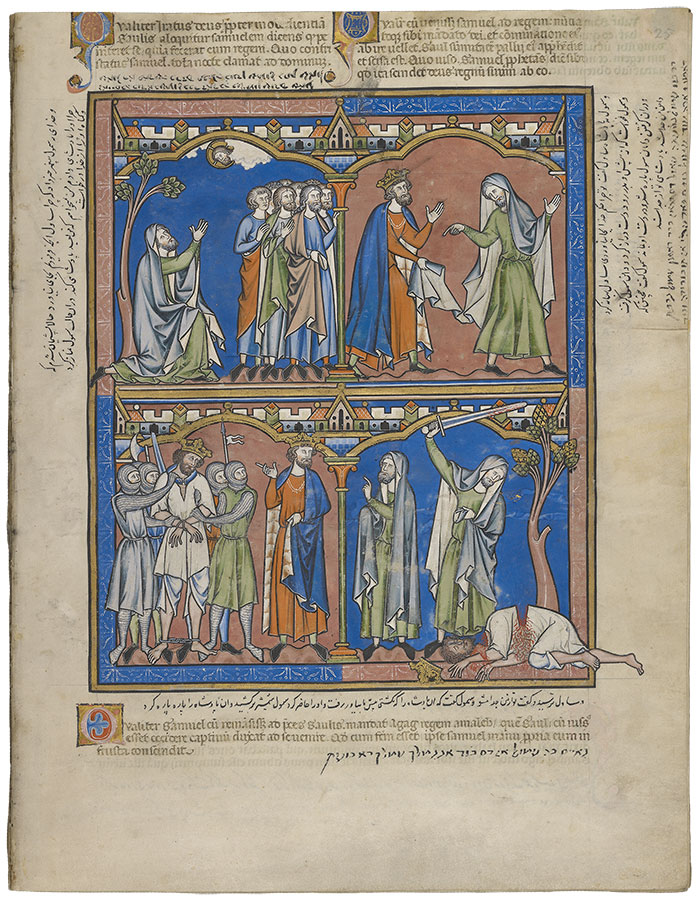
The Lord's Remorse, The Kingdom Torn from Saul, Samuel Enforces the Lord's Will
Old Testament Miniatures with Latin, Persian, and Judeo-Persian inscriptions
Purchased by J.P. Morgan (1867–1943) in 1916
The Lord's Remorse
Following Saul's disobedience, the Lord speaks to Samuel from the heavens, sharing His regret at having made Saul king. Samuel, kneeling beneath a tree and with his hands raised in grief, cries to the Lord throughout the night. (1 Kings 15:10–11)
The Kingdom Torn from Saul
Samuel has come to Saul with news of the Lord's displeasure. The prophet will hear none of the king's excuses and condemns Saul. As Samuel turns to leave, Saul takes hold of his mantle, tearing it. "The Lord has torn the kingdom of Israel from you today," Samuel says as he points at the tear, "and has given it to a neighbor of yours, who is better than you." (1 Kings 15:24–28)
Samuel Enforces the Lord's Will
Samuel orders Saul to bring forth the prisoner Agag. The fearful Amalekite king, still wearing his crown, pleads for mercy. Samuel, intent only on the Lord's command, decapitates the king and severs his body at the waist. Raising a bloodied sword, the enraged priest prepares to strike yet another blow. (1 Kings 15:31–33)
Folio 25r (Latin)
Upper left: How God, angry at Saul’s disobedience, speaks to Samuel, saying that he regretted making Saul a king, which grieved Samuel and he cried to the Lord all night. (I Samuel 15: 10, 11)
Upper right: How, when Samuel had come to the king, and having announced God’s order and threat, he wished to go, Saul caught the tip of his mantle and it was torn. Seeing this, Samuel says, prophesying, that God will thus tear his kingdom from him. (I Samuel 15: 13–28)
Lower half: How, when Samuel had stayed at Saul’s entreaties, he orders Agag, the king of Amalek whom Saul, had been ordered to kill but had taken captive, to come to him. When this was done, Samuel himself cuts him into pieces with his own hands. (I Samuel 15: 30–33)
Folio 25r (Persian)
Upper left margin: God inquired of the prophet Samuel, "Why did Saul not perform Our command? Now I regret to have given him the kingship; henceforth, I do not want him to rule." Then, Samuel prayed and asked God to forgive his sin.
Upper right margin: Samuel said to king Saul, "Why have you not obeyed God’s command?" Saul made an excuse and Samuel asked him to leave him. He reached forth and grabbed Samuel’s skirt and in that grip, Samuel’s skirt tore and [a piece of it] remained in his hand. Samuel said, "Just as my skirt tore, so shall your kingdom be torn from you."
Lower half: Saul was alarmed and said, "You part not with me!" And Samuel said, "Bring to us that king you did not kill." He went and brought him. Samuel drew his sword and slew him in pieces.
Folio 25r (Judeo-Persian)
Upper left, beneath Latin: Here it is that God informs Samuel that, "I regret having made Saul king." Samuel prays on behalf of Saul.
Upper right margin, furthest right: In Samuel [chapter] 15 it is written that Saul reached out aggressively and grabbed hold of Saul’s mantle; the mantle tore. Samuel said, "The kingship has been cut off from you."
Lower right, beneath Latin: Here it is that Samuel kills Agag, king of the Amalekites, with his own hand.
Italicized words are in Hebrew.
Content consultant: Richard Leson
Persian translated by Sussan Babaie
Judeo-Persian translated by Vera Basch Moreen
Latin translation by Eran Lupu
After the commentary volume accompanying the Fine Art Facsimile edition by Faksimile Verlag Luzern
MS M.638, fol. 25v
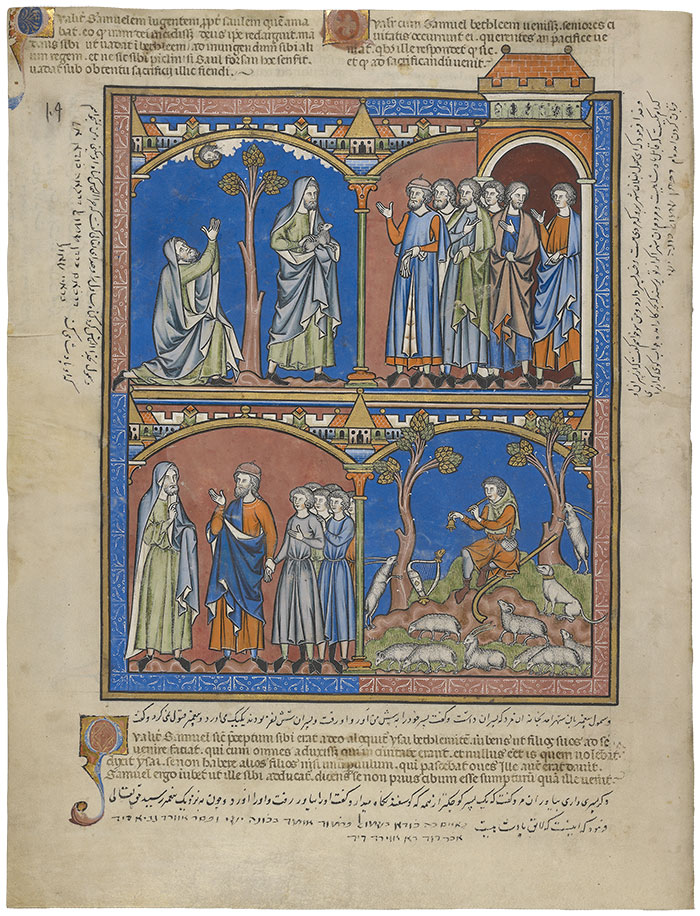
Samuel's Grief, Samuel Arrives in Bethlehem, David, a New Hope
Old Testament Miniatures with Latin, Persian, and Judeo-Persian inscriptions
Purchased by J.P. Morgan (1867–1943) in 1916
Samuel's Grief
Although angry with Saul for his disobedient behavior, Samuel mourns for the king. As the priest grieves, the Lord reproaches him for doubting His judgment. Following the Lord's order, Samuel arises, collects a lamb, and departs for Bethlehem. There, the Lord has chosen a new king from among the sons of Jesse. (1 Kings 15:35–16:2)
Samuel Arrives in Bethlehem
Elders of Bethlehem greet Samuel at the city gate. The priest assures them that his intentions are peaceful. (1 Kings 16:3–5)
David, a New Hope
After offering a sacrifice to the Lord, Samuel sanctifies Jesse and his sons. The priest asks the Lord to identify the chosen one, but he is not among the sons. "Are all the young men here?" Samuel asks. "There remains yet the youngest," replies Jesse, "and there he is, keeping the sheep." On a nearby hillock, David sits playing his pipe and ringing a bell. A dog, seven sheep, and three goats surround him. His favorite instrument, the harp, leans against a tree. (1 Kings 16:5–11)
Folio 25v (Latin)
Upper left: How God himself reproved Samuel, when he mourned for Saul, whom he loved, because the latter had fallen in with God’s anger, ordering him to go to Bethlehem to anoint another king for him, and in order that he might not be in danger if Saul sensed that, he told him to go as if for sacrificial purposes. (I Samuel 15:35 – 16:2)
Upper right: How, when Samuel had reached Bethlehem, the elders of the city rushed to meet him asking if he comes in peace, to whom he responds that he does, and that he comes to offer a sacrifice. (I Samuel 16: 4–5)
Lower half: How Samuel talks to Jesse the Bethlehemite, as God had ordered, telling him to bring his sons to him. When he had fetched all those who were in the city and none of them was the one he wanted, Jesse said that he had no more sons except a young one who was tending the sheep. This indeed was David. Therefore Samuel ordered that he be brought to him, saying that he will not eat before David’s arrival. (I Samuel 16: 6, 11)
Folio 25v (Persian)
Persian foliation 19
Upper left margin: Samuel pleaded with God on account of Saul’s sin and God the Exalted said, "Why do you plead on account of his sin? I do not want him to rule."
Upper right margin: God said, "O, Samuel, go to that city where there is a man who has several sons and I shall tell you which of his sons deserves kingship. If the people of that city ask you about the purpose of your coming, reply that you have come to offer sacrifices."
Lower half, above and below Latin inscription: The prophet Samuel came to the house of the man who had sons in that city and he said, "Bring your son to me." And he went and brought the sons one by one, numbering to six, and the prophet did not accept [them] and said, "Have you another son? Bring him." The man said, "I have one son younger than all who herds the sheep." And when he came near the prophet, God the Exalted said, "This is the one worthy of kingship."
Folio 25v (Judeo-Persian)
Upper left margin, furthest left: Samuel supplicates at God’s threshold for the sake of Saul.
Upper right margin, furthest right, follows Persian: Samuel goes to Jesse’s house.
Lower half, beneath Persian: It is here that God, having commanded Samuel, he came to the house of Jesse and at last saw David.
Content consultant: Richard Leson
Persian translated by Sussan Babaie
Judeo-Persian translated by Vera Basch Moreen
Latin translation by Eran Lupu
After the commentary volume accompanying the Fine Art Facsimile edition by Faksimile Verlag Luzern
MS M.638, fol. 26r
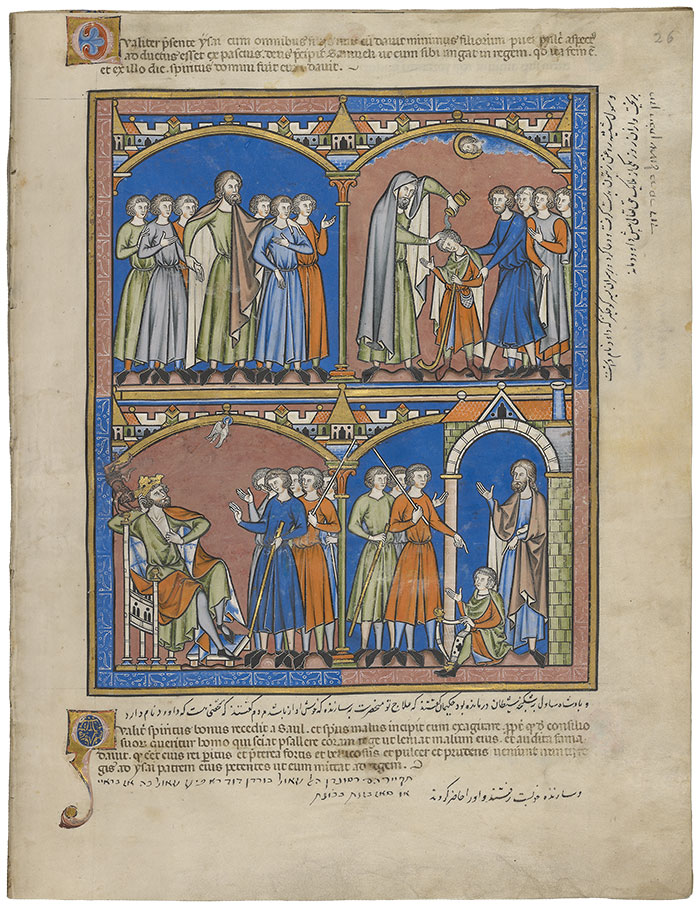
David Anointed, An Evil Spirit Troubles Saul
Old Testament Miniatures with Latin, Persian, and Judeo-Persian inscriptions
Purchased by J.P. Morgan (1867–1943) in 1916
David Anointed
As Jesse and six of his sons look on, David is anointed by Samuel. The Lord gazes down upon the proceedings from the heavens. Those who support David, standing at the right, might also represent David's father and brothers. (1 Kings 16:12–13)
An Evil Spirit Troubles Saul
The Spirit of the Lord, in the form of a dove with a halo, departs from Saul. Its place is taken by a horned and cloven-hoofed devil that flutters over the king's shoulder. Saul's servants suggest the soothing music of a harp as a remedy for his troubled thoughts. The king, restlessly pulling on the collar of his tunic, agrees. David is selected to play for the king, for he is famed for his skill with the harp. Jesse, standing in the doorway of his home, grants the royal servants permission to take the boy to Saul. (1 Kings 16:14–19)
Folio 26r (Latin)
Upper half: How, in the presence of Jesse and all his sons, when the youngest of the sons, David, a boy of a beautiful countenance, was fetched from the fields, God ordered Samuel to anoint him to be a king. This was done, and from that day the spirit of God was with David. (I Samuel 16: 12, 13)
Lower half: How the good spirit departed from Saul and an evil spirit began troubling him, and on this account, following the advice of his men, a man is sought who may play the harp before the king to alleviate the evil. Now, when David’s reputation had spread, that he was skillful in playing and was besides a man of strength, fit for war, comely and prudent, the king’s messengers came to Jesse, his father, asking him to send him to the king. (I Samuel 16: 14–19)
Folio 26r (Persian)
Upper right margin: And Samuel took up a jar of olive oil and prayed and poured it over the head of the younger son whose name was Davud [David]; from that day on one of the angels of God the Exalted remained with David.
Lower half, above and below Latin inscription: King Saul was troubled with the tortures of Satan. And the physicians said, "Your only remedy would be a musician who has a melodious voice." People said, "There is a person named David who is a fair musician." They went and brought him forth.
Folio 26r (Judeo-Persian)
Upper right margin, furthest right: Samuel anoints David on the head.
Lower half, beneath Latin: Saul’s state of mind having become disturbed, they brought David before Saul that he should play his instrument for him.
Upper left margin, corner: When David came before the king, David’s father gave him some gifts to bring to the king. When the king became very fond of David...
Lower half, below Latin: And whenever Satan overpowered Saul, David played [for Saul] and Satan departed.
Italicized words are in Hebrew.
Content consultant: Richard Leson
Persian translated by Sussan Babaie
Judeo-Persian translated by Vera Basch Moreen
Latin translation by Eran Lupu
After the commentary volume accompanying the Fine Art Facsimile edition by Faksimile Verlag Luzern
MS M.638, fol. 26v
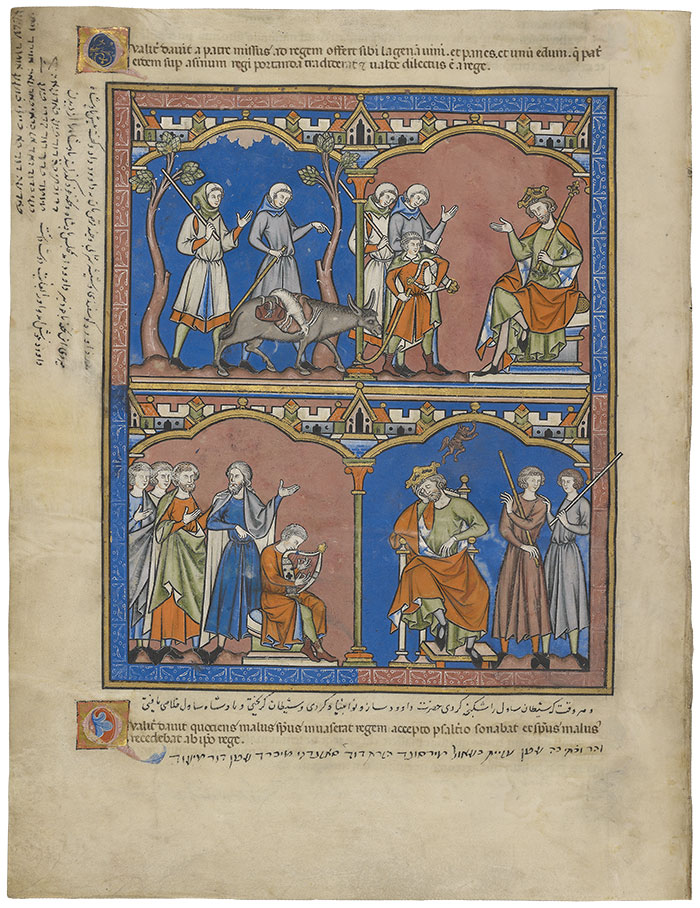
David Meets Saul, Soothing Music
Old Testament Miniatures with Latin, Persian, and Judeo-Persian inscriptions
Purchased by J.P. Morgan (1867–1943) in 1916
David Meets Saul
David arrives at court. He is accompanied by four of Saul's servants and a donkey carrying a young goat sent by Jesse as homage to the king. The king is exceedingly pleased with the young David. (1 Kings 16:20–21)
Soothing Music
David's playing soothes the king. The troublesome demon departs, and the exhausted Saul is able to rest. Servants and elders gather together and remark on the boy's beautiful playing. (1 Kings 16:22–23)
Folio 26v (Latin)
Upper half: How David, sent by his father to the king, offered him a bottle of wine and bread and one kid which his father had given him to be carried on an ass, and the king loved him dearly. (I Samuel 16: 20, 21)
Lower half: How, whenever the evil spirit came upon the king, David took his harp and played it and the evil spirit departed from the king. (I Samuel 16:23)
Folio 26v (Persian)
Persian foliation: 18
Upper left margin: David’s father gave him a sheep, a bottle of wine, and some loaves of bread and said, "As you are going to the king, take along this offering." David came to the king’s court and presented his gifts. The king was pleased seeing David and he loved him exceedingly.
Lower half: Whenever Satan tortured Saul, His Excellence David would play his instrument and would sing, Satan would depart and King Saul would be relieved.
Folio 26v (Judeo-Persian)
Content consultant: Richard Leson
Persian translated by Sussan Babaie
Judeo-Persian translated by Vera Basch Moreen
Latin translation by Eran Lupu
After the commentary volume accompanying the Fine Art Facsimile edition by Faksimile Verlag Luzern
MS M.638, fol. 27r
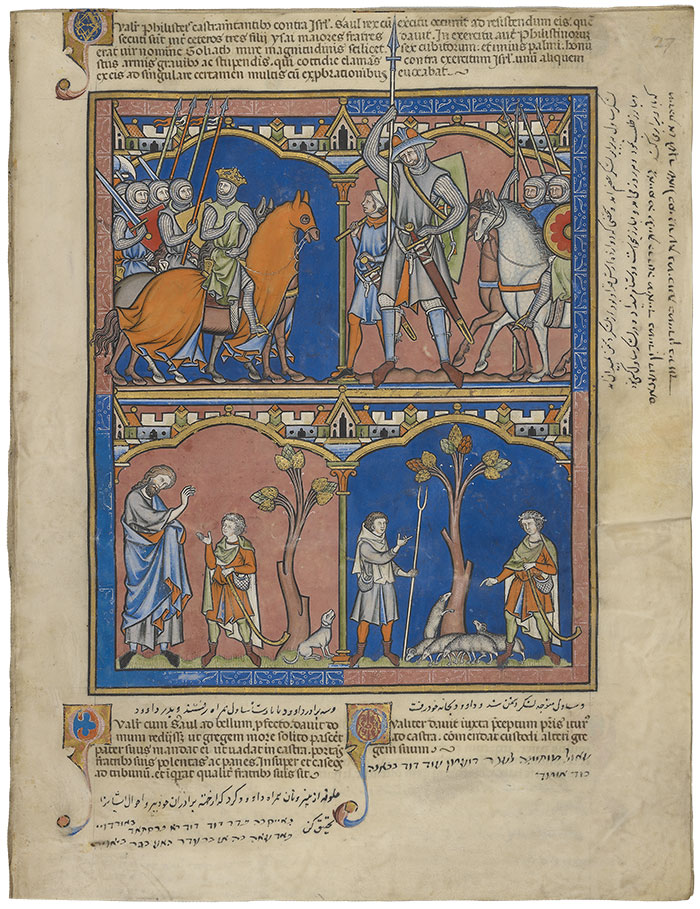
Goliath, A Father's Concern, David Entrusts Jesse's Flock to Another
Old Testament Miniatures with Latin, Persian, and Judeo-Persian inscriptions
Purchased by J.P. Morgan (1867–1943) in 1916
Goliath
Saul and his army ride forth to face the Philistine army once more. The king, astride a horse adorned with orange trappings, glances uneasily over his shoulder: on the opposite side of the battlefield, he has spied Goliath, the Philistine giant. Goliath carries a gigantic shield on his back and leans on a spear nearly twice the height of a man. A huge sword is girt round his waist. As his armor-bearer and fellow soldiers confidently look on, the giant taunts the Israelite army, demanding that an opponent face him in single combat. (1 Kings 17:3–8)
A Father's Concern
Three of David's brothers have followed Saul into battle against the Philistines. Jesse sends David to the Israelite camp with supplies for his brothers and charges him to return with news of the war. (1 Kings 17:14–19)
David Entrusts Jesse's Flock to Another
David, wearing a wreath of flowers, instructs a fellow shepherd to look after his father's flocks in his absence. (1 Kings 17:20)
Folio 27r (Latin)
Upper half: How, the Philistines having encamped against Israel, king Saul rushed with his army to resist them and Jesse’s three elder sons, David’s brothers, were following him among others. Now, in the army of the Philistines there was one, Goliath by name, a man of marvelous stature six cubits and a span tall, laden with heavy and astonishing arms, who was calling daily to the army of Israel, inviting, with many reproaches, one single man to fight with him hand-to-hand. (I Samuel 17: 1–13)
Lower left: How, Saul having gone to war, David returned home to tend the flock, as he was accustomed. Once there, his father ordered him to go to the camp, carrying parched grain and loaves of bread for his brothers as well as cheese for their captain, and to inquire how are his brothers doing. (I Samuel 17: 15–18)
Lower right: How, following his father’s orders, as David is about to go to the camp, he gives the charge of his flock to another keeper. (I Samuel 17:20)
Folio 27r (Persian)
Upper right margin: Saul’s army came before the army of the enemy and a man from the army of the enemy, whose height was twelve cubits, stepped onto the [battle] field and called for a warrior. Everyday he would come and demand a warrior and would utter invectives. And there was no one in Saul’s army to match him.
Lower left, above and below Latin inscription: David’s three brothers accompanied King Saul and David’s father sent with David a ration of cheese and bread to carry for his brothers and to inquire about their health.
Lower right: Saul turned his attention to the army of the enemy; David returned to his house.
Folio 27r (Judeo-Persian)
Upper right margin, furthest right: Here it is that Goliath came every day in the field of the enemy [perhaps] someone from Saul’s army would draw lots and come out into the field [to fight him].
Lower left, beneath Persian: Here it is that David’s father sends David to the king’s camp so that he may bring news of his brothers.
Lower right, beneath Latin: While Saul set out against the enemy, David came to his house.
Content consultant: Richard Leson
Persian translated by Sussan Babaie
Judeo-Persian translated by Vera Basch Moreen
Latin translation by Eran Lupu
After the commentary volume accompanying the Fine Art Facsimile edition by Faksimile Verlag Luzern
MS M.638, fol. 27v
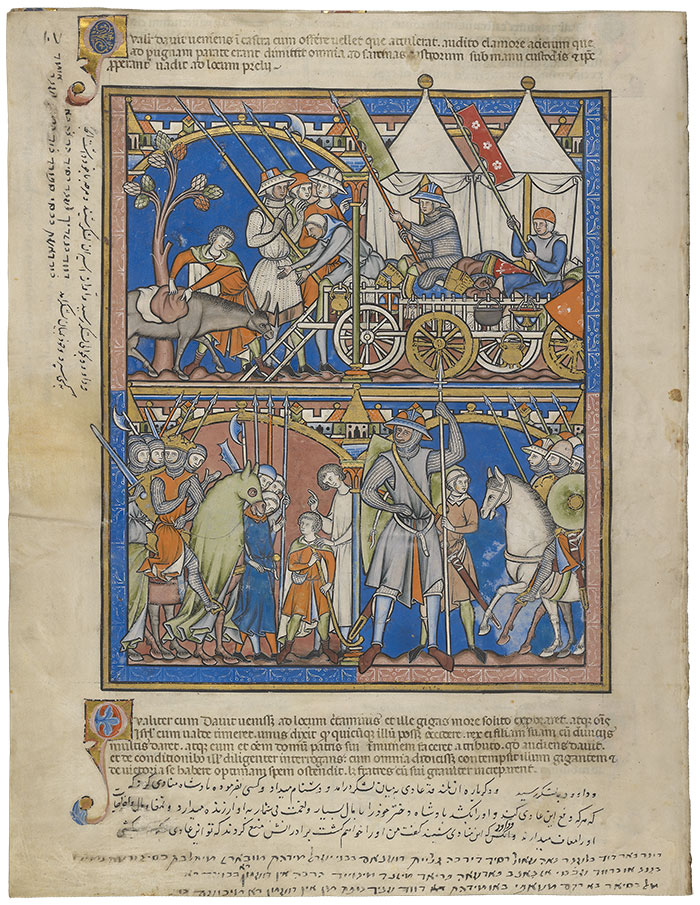
The War Effort, David Determined
Old Testament Miniatures with Latin, Persian, and Judeo-Persian inscriptions
Purchased by J.P. Morgan (1867–1943) in 1916
The War Effort
Young David arrives at the battle with provisions for his brethren and passes supplies to the baggage officers. The cart is filled with armor to be used in the battle against the Philistines. (1 Kings 17:20–22)
David Determined
The precocious David makes his way to the battlefield, where Saul confers with his men. While among the soldiers, David hears the taunts of Goliath and resolves to do battle with him, despite the chiding of his older brother. Meanwhile, the haughty Philistine giant continues to yell challenges and insults from across the battlefield. (1 Kings 17:23–30)
Folio 27v (Latin)
Upper half: How, as David came to the camp, he wished to offer what he had brought, but upon hearing the shout of the armies which were ready for battle, he leaves everything by the camp’s baggage under the care of the keeper, and rushes to the site of the battle. (I Samuel 17: 20–22)
Lower half: How, when David had come to the site of the battle and that giant was defying Israel, as was his habit, while they were fearing exceedingly, one man said that the king would give his daughter and many riches to anyone who could kill the giant, and would make him and all of his father’s house exempt from taxes. Upon hearing this, David asked diligently about the conditions. When he had learned all, he was scornful of that giant and made it clear that he had the highest hopes of victory, although his brothers were rebuking him severely. (I Samuel 17: 23–29)
Folio 27v (Persian)
Persian foliation: 17
Upper left margin: David arrived at the environs of the army [camp] and heard the voices of the army’s captives. And he entrusted all he had with him with someone there and he himself came amidst the army.
Lower half: And David reached the army. And once again, that tall fierce man came in the midst of the army [battlefield] uttering invectives. And on the orders of the king, someone proclaimed that, "Whoever drives away this giant and slays him, the king shall grant him his daughter and great riches and innumerable favors and he shall exempt him from tribute and property [sic.] and taxes." David, who heard this proclamation said, "I shall slay him." His brothers forbade him [saying], "How can you slay this giant?"
Folio 27v (Judeo-Persian)
Upper left margin, furthest left: David, having come near the army, entrusted everything he had to a person, and came to the army himself.
Lower half, beneath Persian: Again, David arriving in Saul’s encampment, saw that the enemy Goliath was preparing to fight the Children of Israel and that no one dared to go into battle with him. A person from the king’s retinue cried out, saying, "Whoever kills this enemy, we shall give him much wealth and a letter of tax exemption." Upon hearing this, David said, "I will kill this enemy..."
Italicized words are in Hebrew.
Content consultant: Richard Leson
Persian translated by Sussan Babaie
Judeo-Persian translated by Vera Basch Moreen
Latin translation by Eran Lupu
After the commentary volume accompanying the Fine Art Facsimile edition by Faksimile Verlag Luzern
MS M.638, fol. 28r
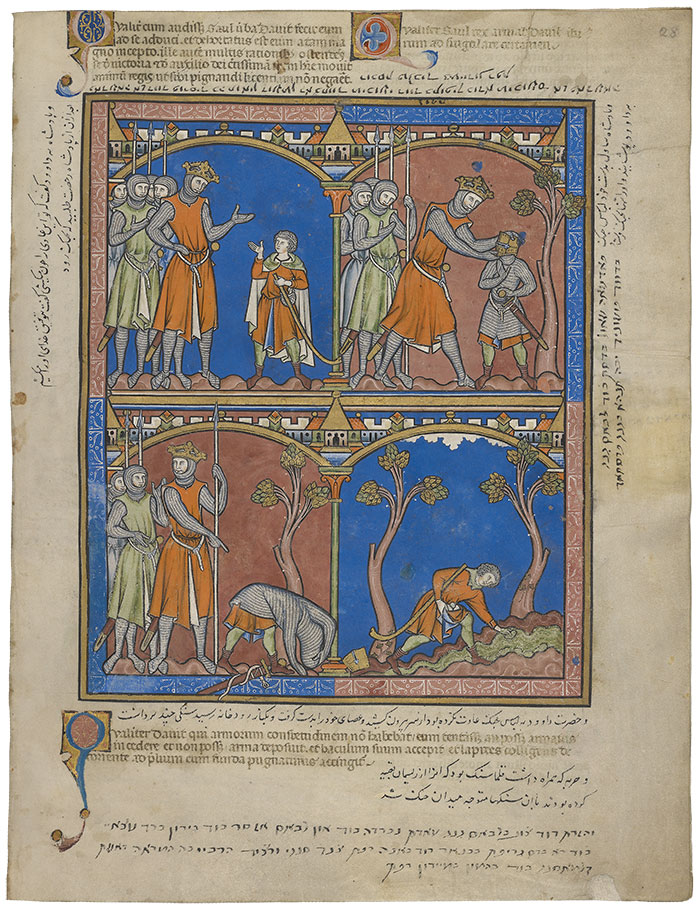
David Petitions Saul, David Armed for the Combat, David Removes the Armor
Old Testament Miniatures with Latin, Persian, and Judeo-Persian inscriptions
Purchased by J.P. Morgan (1867–1943) in 1916
David Petitions Saul
David, his shepherd's crook in hand, asks King Saul for the right to do battle with Goliath. The king attempts to dissuade his youthful servant from this dangerous task, but David is adamant. With the Lord's help, David explains, he has slain a lion and a bear. So will the Philistine giant fall, for he has dared to curse the army of the Living God. The king yields. Saul's warriors glance at each other, clearly uncertain of the wisdom of this decision. (1 Kings 17:31–37)
David Armed for the Combat
Saul, resigned to David's wishes, clothes David with a coat of mail and fits a great helm over his head. (1 Kings 17:38)
David Removes the Armor
Unaccustomed to the weight and bulk of the armor, David removes his helmet and sword and pulls the mail coat off over his head. Taking hold of his shepherd's staff, he makes his way to a brook and pulls five smooth stones from the water. (1 Kings 17:39–40)
Folio 28r (Latin)
Upper left: How, when Saul had heard David’s words, he had him brought to him and discouraged him from entering upon such a great undertaking. But he, showing in many ways that he had the highest hope regarding both himself and God’s help, influenced the king’s mind not to deny him his battle plan. (I Samuel 17:31–37)
Upper right: How Saul arms David who is about to go to the hand-to-hand fight. (I Samuel 17: 38)
Lower half: How David, who was not accustomed to arms, having attempted to walk in armor and could not, laid off his arms, took his staff, and, collecting stones from a stream, arms himself for battle, as he is about to fight with his sling. (I Samuel 17: 39–40)
Folio 28r (Persian)
Upper left margin: And the king asked David, "How will you kill this giant?" He said, "By the grace of God, I will kill him." Then he requested permission from the king to go to battle.
Upper right margin: King Saul, with his own hands, clothed him in armor and sent him alone into battle.
Lower half, above and below Latin inscriptions: His Excellence David was not accustomed to armor; he removed it off his head and took his staff and came to the river bank. He picked up a few stones and turned towards the battlefield with the weapon which he had along [and], which was a sling hung on a rope and those stones.
Folio 28r (Judeo-Persian)
Upper half, beneath Latin: The king asked David, "How will you kill this enemy?" David [replied], "I will kill him with the grace of God." Having sought the king’s permission, he went into the battlefield.
Right margin, middle: King Saul with his own hand[s] dressed David with garments of war and sent him into the battle all by himself.
Lower half, beneath Persian: His Excellence David, since he was unaccustomed to garments of war, removed those garments off his head, took hold of his own staff, went by the river bank, collected a few stones, the weapon which he had, and the sling and stones and with these he went onto the battlefield.
Content consultant: Richard Leson
Persian translated by Sussan Babaie
Judeo-Persian translated by Vera Basch Moreen
Latin translation by Eran Lupu
After the commentary volume accompanying the Fine Art Facsimile edition by Faksimile Verlag Luzern
MS M.638, fol. 28v
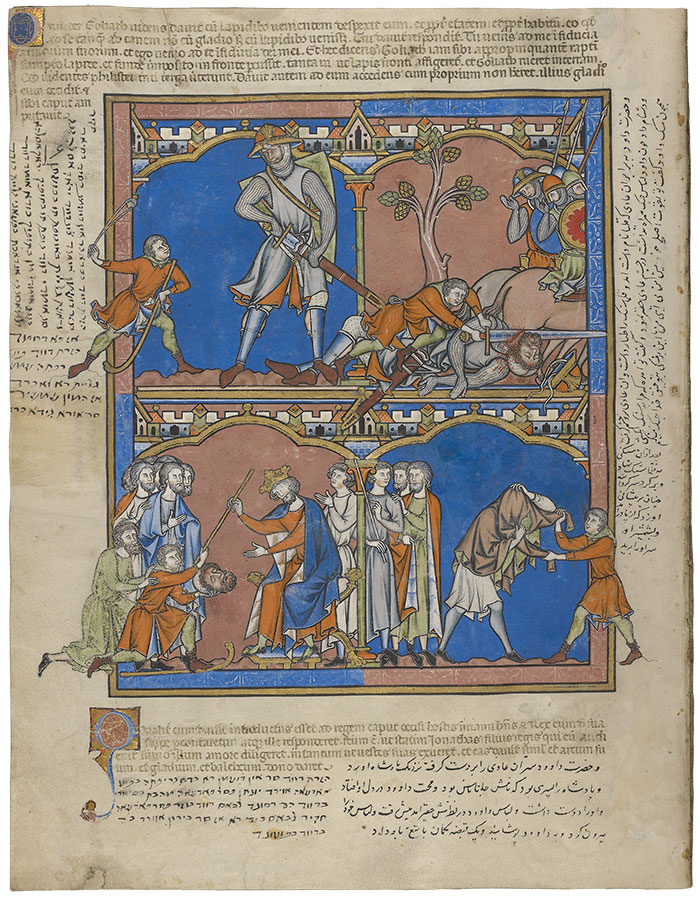
David Slays Goliath, David's Vow to Saul Fulfilled
Old Testament Miniatures with Latin, Persian, and Judeo-Persian inscriptions
Purchased by J.P. Morgan (1867–1943) in 1916
David Slays Goliath
Before Goliath can draw his sword, David strikes him in the forehead with a stone from his sling. As the dismayed Philistines look on, the victorious youth cuts off Goliath's head using the giant's own mighty sword. (1 Kings 17:45–51)
David's Vow to Saul Fulfilled
After David's victory over Goliath, Abner, commander of the army, presents the young hero to a grateful Saul. The king accepts the head of Goliath as proof of David's conquest and, as a token of friendship, David accepts the costly garments of the king's son, Jonathan. (1 Kings 17:57–1 Kings 18:4)
Folio 28v (Latin)
Upper half: How Goliath, upon seeing David coming with stones, reproached him for his age and appearance and because he had come to him as one would come to a dog, with stones instead of with a sword. Yet, David answers him saying: ’ you come to me trusting your arms, but I come to you trusting my God.’ As he was saying this, he hastily took a stone, placed it in his sling and smote Goliath, who was drawing near to meet him, in his forehead with so much force, that the stone was affixed to Goliath’s forehead and he sank to the ground. Seeing this, the terrified Philistines turned their backs and fled. David, on the other hand, approached Goliath and, as he did not have a sword of his own, killed him with his sword and cut off his head. (I Samuel 17: 41–51)
Lower half: How, when David had been brought before the king, with the head of Goliath in his hand, and the king asked him about his family and he answered, it came to pass that once he had heard David, Jonathan, the king’s son, at once fell in love with him, and loved him so deeply that he took off his clothes and gave them to him as a present together with his bow and his sword and his girdle. (I Samuel 18: 1–4)
Folio 28v (Persian)
Persian foliation: 16
Upper right margin: And His Excellence David came before that fierce one whose name was Qolia [Goliath] and [as] he was raising the sling the fierce man became furious and cursed him. Since David had no armor, he appeared small in the eye of the giant who said, "You have come to slay me like a dog!" David said, "You come to me with your innate power; I, with this nakedness, will fight with God’s help." After that, he placed a stone in the sling and swung it around his head and hurled it at his forehead so that he fell over and with his sword [David] severed his head.
Lower right: His Excellence David held the fierce man’s head in hand and brought it before the king. And the king had a son named Janatas [Jonathan] who had become fond of David and loved him. David’s garment appeared humble in his eyes; he went forth and removed his own clothes and put them on David and he [also] gave him a bow and a sword.
Folio 28v (Judeo-Persian)
Upper left margin: His Excellence David came up against this enemy; he appeared very contemptible in the eyes of the enemy since David had no accouterments of weapons. Goliath said to him, "Did you come to kill a dog?" David said, "You came into battle by the grace of accouterments of weapons, I [come] by the grace of God." David hurled a stone with the sling at Goliath’s forehead. He fell down, his Excellence David went forward, removed Goliath’s sword, and cut off his head with that same sword.
Lower right, beneath Latin: His Excellence David took the head of that enemy into his hand[s] and brought it before the king. And Jonathan, the king’s son, felt a great love for David, and [since] David’s clothes appeared [exceedingly] humble to the king’s son, he removed his own clothes so that he may put them on David.
Content consultant: Richard Leson
Persian translated by Sussan Babaie
Judeo-Persian translated by Vera Basch Moreen
Latin translation by Eran Lupu
After the commentary volume accompanying the Fine Art Facsimile edition by Faksimile Verlag Luzern
MS M.638, fol. 29r

Saul's Envy, Madness, A Dangerous Post
Old Testament Miniatures with Latin, Persian, and Judeo-Persian inscriptions
Purchased by J.P. Morgan (1867–1943) in 1916
Saul's Envy
Saul is enraged and envious when the victorious David, bearing the head of Goliath, receives greater praise than he. "Saul slew his thousands," the Israelite women sing, "and David his ten thousands." (1 Kings 18:6–9)
Madness
Later, as David plays for Saul, the evil spirit re-enters the king's ear. Saul aims a spear at David, who neatly steps aside and avoids the blow. Now, the king is sure that the Lord has given his favor to David. (1 Kings 18:10–11)
A Dangerous Post
His fear of David mounting, Saul schemes to rid himself of the young warrior by bestowing upon him the dangerous duty of captaining a thousand men. (1 Kings 18:12–14)
Folio 29r (Latin)
Upper half: How, as David was returning with the head of Goliath, the women of all the cities of Israel run to meet the king, dancing and singing to the sound of the drums, saying: ’Saul has smote a thousand and David ten thousand.’ Now this angered the king and he began to feel jealousy and bitter hatred toward David whom he had loved dearly till that day. (I Samuel 18: 6–9)
Lower left: How, when the evil spirit had come upon the king, and David was playing before him as he was accustomed, the king, holding his spear threw it suddenly at him, thinking to nail him to the wall. David perceived this, fled, and avoided the danger. (I Samuel 18: 10–11)
Lower right: How, when Saul had reflected upon the matters and began to fear David, for the Lord was with him and had departed from himself, he decided to send him away. And thus he summoned David and made him a captain over a thousand men. (I Samuel 18: 12, 13)
Folio 29r (Persian)
Upper right margin: And His Excellence David brought the severed head of the fierce man to the city. The people of the city came to receive him and female entertainers, with tambourine and instruments, were all talking and singing that King Saul has killed a thousand and David has killed ten thousands. When the king heard these words, he was displeased with David and took it to heart.
Lower left: And Satan lured King Saul into harming David. He seized a spear and summoned His Excellence David. David came to the assembly with his musical instrument. The king threw the spear at him; David stepped aside and fled the scene.
Lower right: The king’s heart was overcome with the fear of David and he summoned David and consoled him and made him the captain of a thousand men.
Folio 29r (Judeo-Persian)
Upper right margin, corner: His Excellence David, holding the head of the enemy in his hand[s] entered the city...the women singing with musical instruments...came out [to meet him], saying "If Saul killed a thousand persons, David killed ten thousand." When Saul heard these words, vengeance [grew] in his heart against David.
Lower left margin: The king was brought to such a state by Satan that he wished to aim at David. Taking the spear in his hand, he looked for David and when David came into the assembly with his instrument, he threw his spear at David. David drew back, left the assembly and fled.
Lower right margin: Fear of David entered the king’s heart. He summoned David, showed him affection and made him commander over a thousand persons.
Italicized words are in Hebrew.
Content consultant: Richard Leson
Persian translated by Sussan Babaie
Judeo-Persian translated by Vera Basch Moreen
Latin translation by Eran Lupu
After the commentary volume accompanying the Fine Art Facsimile edition by Faksimile Verlag Luzern
MS M.638, fol. 29v
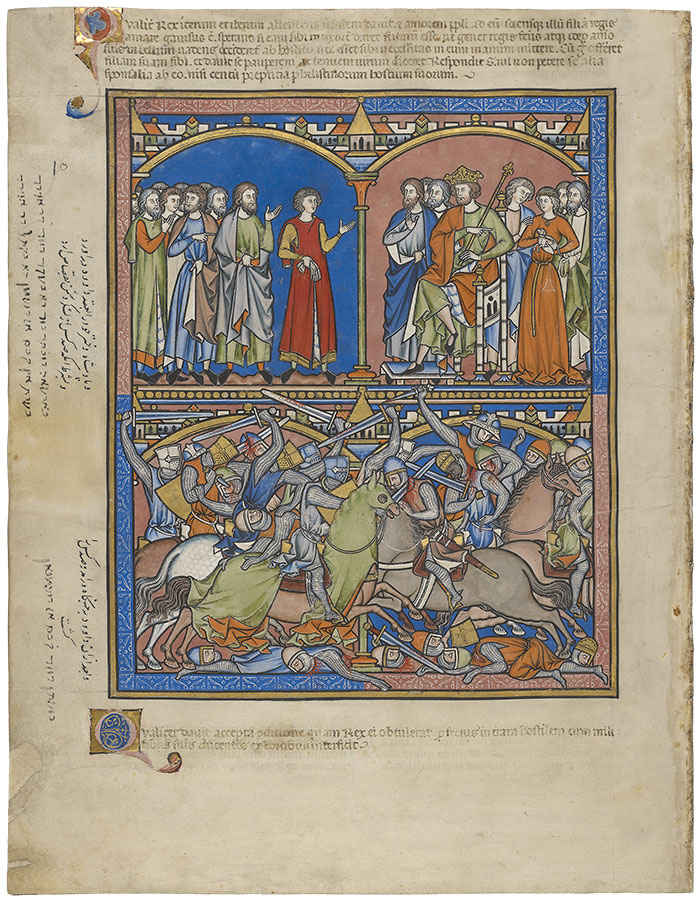
Michal's Dowry, A Bloody Struggle
Old Testament Miniatures with Latin, Persian, and Judeo-Persian inscriptions
Purchased by J.P. Morgan (1867–1943) in 1916
Michal's Dowry
Now a grown man, David is offered the hand of Michal, the king's daughter. Saul intends to use Michal's love as an opportunity to destroy David. Rather than demand a traditional bride price, the king requires David to bring him the foreskins of one hundred Philistines. The mature David is richly adorned; he carries gloves and wears a crimson coat over a gold tunic; his fiancée is likewise beautifully outfitted; she holds a lapdog and wears a golden chaplet, brooch, and girdle. Tied to her girdle is a delicately brocaded purse. (1 Kings 18:20–26)
A Bloody Struggle
Blood-stained swords flash angrily as David's company slaughters the Philistines. David, entering the fray from the left, hacks through an opponent's shoulder. All around, his warriors grapple and struggle with the enemy, landing vicious blows with swords and daggers. A remarkable black soldier stands out among the Philistines. (1 Kings 18:27)
Folio 29v (Latin)
Upper half: How the king, who was growing more and more attentive to David’s virtue and to the people’s love of him, was happy, knowing that his daughter loved him and hoped that if he gave his daughter to him to be his wife, he, full of spirit for having been made the king’s son-in-law, would go to battle and would be killed by the enemy, and thus it would not be necessary to lay hands on him. When he was offering his daughter to David who was saying that he was but a poor and weak man, Saul responded that as her dowry he was only asking one hundred Philistine foreskins, as they were his enemies. (I Samuel 18: 15–16, 20–25)
Lower half: How David, having accepted the king’s terms, sets out to the enemy’s land with his soldiers and kills two hundred men. (I Samuel 18: 27)
Folio 29v (Persian)
Persian foliation: 15
Upper left margin: The king gave his daughter in marriage to David on the condition that he slays in revenge a hundred men from the army of the enemy.
Lower left margin: Afterwards David came to the battlefield and slew a hundred persons.
Folio 29v (Judeo-Persian)
Upper left margin, furthest left: The king would give his daughter in marriage to David on the condition that he kill one hundred persons from among the enemy.
Lower left margin, furthest left: David kills one hundred persons of the enemy.
Content consultant: Richard Leson
Persian translated by Sussan Babaie
Judeo-Persian translated by Vera Basch Moreen
Latin translation by Eran Lupu
After the commentary volume accompanying the Fine Art Facsimile edition by Faksimile Verlag Luzern
MS M.638, fol. 30r
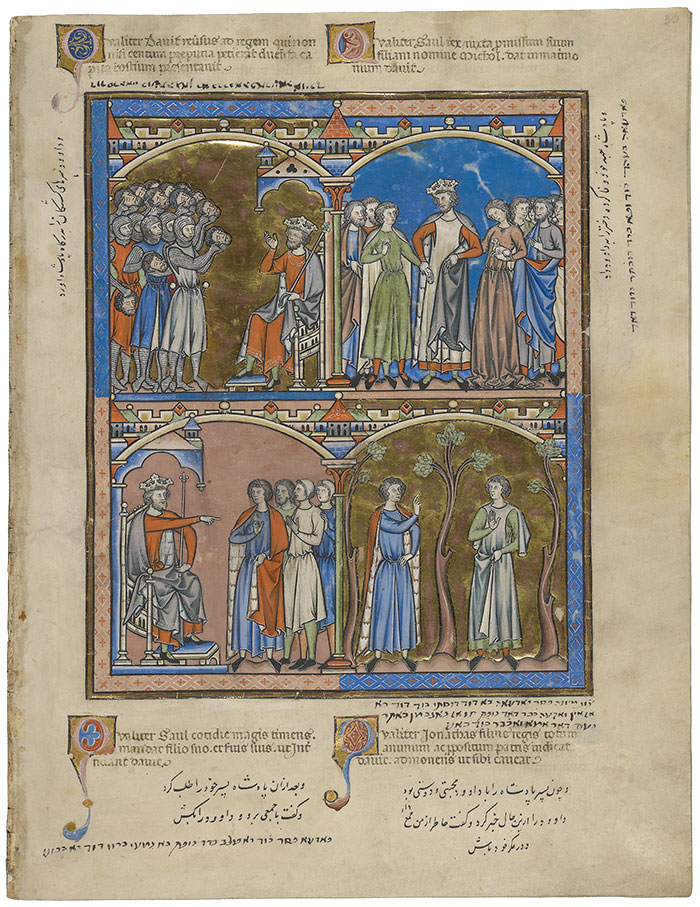
Well Ahead, David and Michal Wedded, Saul Orders David's Assassination, Jonathan warns David
Old Testament Miniatures with Latin, Persian, and Judeo-Persian inscriptions
Purchased by J.P. Morgan (1867–1943) in 1916
Well Ahead
David returns victorious to Saul, bearing twice the required dowry. The modest painter has replaced the foreskins in the biblical text with the victims' heads. Saul, disappointed that David survived the battle, feigns appreciation. (1 Kings 18:27)
David and Michal Wedded
David and Michal are joined by the king in the presence of witnesses. Michal, still holding her lapdog, gives David a coy glance. The stern gaze Saul levels at his new son-in-law, however, foreshadows the conflict that is about to erupt. (1 Kings 18:27)
Saul Orders David's Assassination
David has become famous for his unsurpassed military Skill and wisdom. Saul is certain that the Lord favors David and is overcome by fear of the young commander. The king summons his son Jonathan and his servants and orders that David be slain. (1 Kings 18:28–19:1)
Jonathan warns David
Jonathan will not betray his dearest friend and reveals the king's evil plot to David. (1 Kings 19:1–2)
Folio 30r (Latin)
Upper left: How David came back to the king and, although he had asked for only one hundred foreskins, offered him two hundred enemy heads. (I Samuel 18: 27)
Upper right: How king Saul, true to his promise, gives his daughter, Michal by name, to David to be his wife. (I Samuel 18:27)
Lower left: How Saul, growing daily more fearful, orders his son and servants to kill David. (I Samuel 19: 1)
Lower right: How Jonathan, the king’s son, makes his father’s state of mind and plan known to Daivd, warning him to watch out for himself. (I Samuel 19: 2)
Folio 30r (Persian)
Upper left margin: And David brought the heads of the slain to the king.
Upper right margin: The king fulfilled his promise and gave his daughter to David.
Lower left: And after that, the king summoned his son and told him, "Go with a company and slay David."
Lower right: Since the king’s son harbored fondness and friendship for David, he informed him of this event and said, "Rest assured on my account and take care of yourself."
Folio 30r (Judeo-Persian)
Upper left, beneath Latin: David brings the heads [!] of the slain to the king’s palace.
Upper right margin, furthest right: The king kept his promise and gave his daughter [in marriage] to David.
Lower left, beneath Persian: The king summoned his son and said, "Go with this group [of men] and kill David."
Lower right, above Latin: Since there was friendship between the king’s son and David, he [Jonathan] informed David of this news, saying, "Rest tranquil as far as I am concerned, but look out for yourself."
Content consultant: Richard Leson
Persian translated by Sussan Babaie
Judeo-Persian translated by Vera Basch Moreen
Latin translation by Eran Lupu
After the commentary volume accompanying the Fine Art Facsimile edition by Faksimile Verlag Luzern
MS M.638, fol. 30v
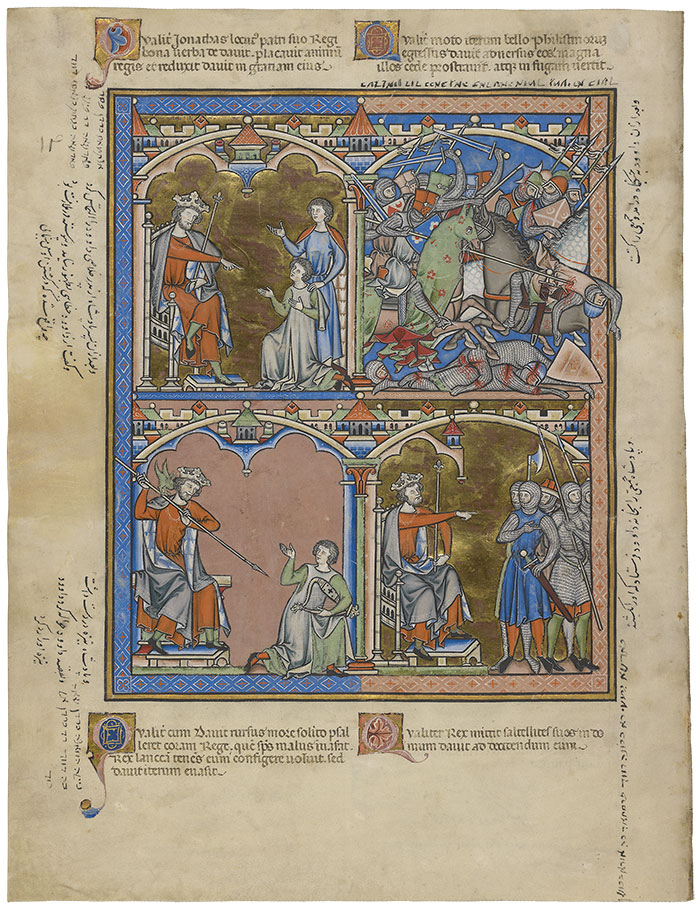
Jonathan Brokers Peace, The War Resumes, Saul's Rage, A Second Assassination Attempt
Old Testament Miniatures with Latin, Persian, and Judeo-Persian inscriptions
Purchased by J.P. Morgan (1867–1943) in 1916
Jonathan Brokers Peace
Jonathan, having warned David, protests his friend's innocence to the king. As proof of David's loyalty, the prince recounts the many feats of arms his friend has undertaken in Saul's name. Saul is dissuaded from killing David and once again receives him at court. (1 Kings 19:3–7)
The War Resumes
Again, the Israelites engage the Philistines. David and his company slaughter a great number of the enemy and chase them from the battlefield. (1 Kings 19:8)
Saul's Rage
Saul is again afflicted by an evil spirit sent by the Lord. The jealous king takes aim at his son-in-law with a spear, but David neatly steps aside and out of harm's way. (1 Kings 19: 9–10)
A Second Assassination Attempt
Saul directs his soldiers to surround David's home and to kill him in the morning. (1 Kings 19:11)
Folio 30v (Latin)
Upper left: How Jonathan, having spoke good of David to his father, the king, soothed his mind and makes David agreeable to him. (I Samuel 19: 4–7)
Upper right: How, when the war with the Philistines had begun again, David went out and fought against them and defeated them with a great slaughter and they fled. (I Samuel 19: 8)
Lower left: How, when the evil spirit has come again upon the king, as David was playing before him, as he was accustomed, the king, holding his spear, wished to pierce him but David went out again. (I Samuel. 19:9, 10)
Lower right: How Saul sends his guards to kill David in his house. (I Samuel 19:11)
Folio 30v (Persian)
Persian foliation: 14
Upper left margin: And after that, the king’s son blessed his father for David’s release and said, "No evil has come from David and he has always been at [your] service; what has happened that you attempt to kill him?"
Upper right margin: Afterwards David came to the battlefield and slew a group.
Lower left margin: The king had a spear in hand and he threw it at David; David repelled his spear.
Lower right margin: The king sent a company to David’s house to kill him.
Folio 30v (Judeo-Persian)
Upper left margin, corner: The king’s son supplicates his father for David’s deliverance.
Upper right, below Latin: Afterwards David came to the king’s sleeping quarters and killed a group [of the enemy].
Lower left margin, corner: The king threw the spear at David but he repelled it.
Lower right margin, corner: The king sends a group [of men] to David’s house in order to kill him.
Content consultant: Richard Leson
Persian translated by Sussan Babaie
Judeo-Persian translated by Vera Basch Moreen
Latin translation by Eran Lupu
After the commentary volume accompanying the Fine Art Facsimile edition by Faksimile Verlag Luzern
MS M.638, fol. 31r
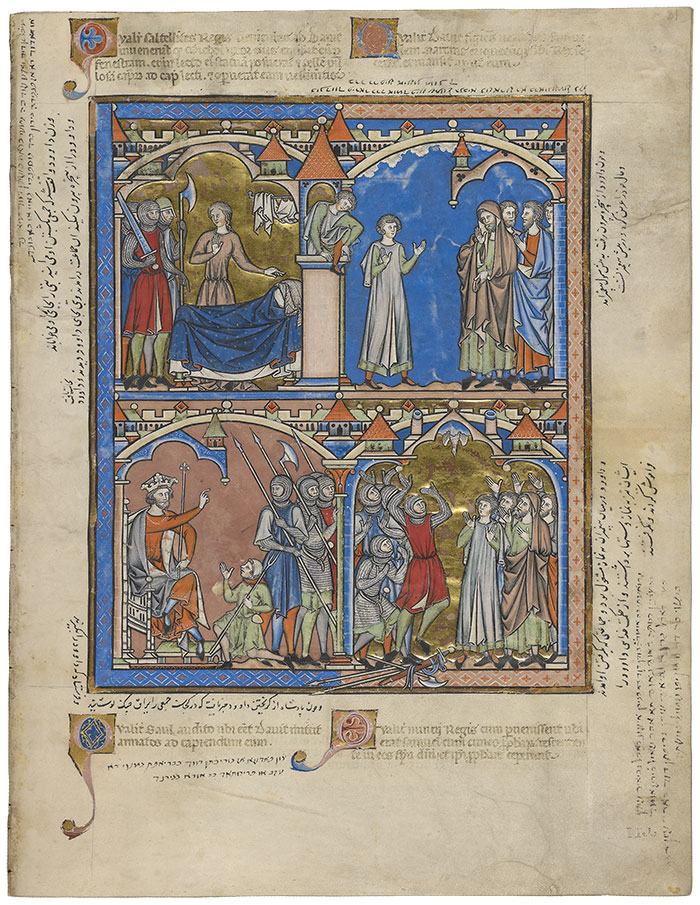
Michal Delays the Soldiers, A Trusted Friend, Saul Learns of David's Whereabouts, Saul's Officers Struck by the Spirit of the Lord
Old Testament Miniatures with Latin, Persian, and Judeo-Persian inscriptions
Purchased by J.P. Morgan (1867–1943) in 1916
Michal Delays the Soldiers
Michal has warned David of her father's new plot to kill him. While David scrambles through a window, his wife delays the king's assassins. My husband is ill, she explains, and must stay in bed. She has arranged a dummy in the bed and covered its head with a hairy goat skin. The suspicious soldiers are about to discover Michal's ruse. (1 Kings 19:11–17)
A Trusted Friend
David flees to Ramah and takes refuge with Samuel and other prophets. The priest listens intently as David explains his plight. (1 Kings 19:18)
Saul Learns of David's Whereabouts
A field hand arrives at court and informs the king that David hides in Ramah with Samuel. Saul immediately dispatches officers to arrest David. (1 Kings 19:19–20)
Saul's Officers Struck by the Spirit of the Lord
Saul's officers arrive in Ramah. As they approach Samuel and David, the spirit of the Lord descends upon them in the form of a dove. David watches in amazement as his would-be captors begin to prophesy and wildly dance about. (1 Kings 19:20)
Folio 31r (Latin)
Upper left: How, as they were coming to David’s house, the king’s guards discovered that Michal, his wife, had sent him out through the window and had laid an image in his bed and a goat skin with the hair at the head of the bed and she had covered it with clothes. (I Samuel 19: 11–13)
Upper right: How David ran away and came to Samuel. He told him all that the king had done to him and stayed with him. (I Samuel 19: 18)
Lower left: How, upon hearing where David was, Saul sends armed men to capture him. (I Samuel 19:19, 20)
Lower right: How when the king’s messengers had reached the place where Samuel was with a company of prophets, the spirit of God came upon them and they began prophesying. (I Samuel 19:20)
Folio 31r (Persian)
Upper left margin: David’s wife became aware that a group was coming to kill him; she laid a statue in his place and sent David out through the window. That group came in and found a statue instead of David and David was saved.
Upper right margin: When David had left through the window, he went before the prophet Samuel and told him of his situation and sat before the prophet.
Lower left & lower left margin: When the king heard of David’s escape and of where he was, he armed a company and dispatched them to capture David.
Lower right margin: David was praying amongst the prophets and the company that had come to capture him also raised their arms in prayer, by Divine Mystery, they forgot David and did not arrest him.
Folio 31r (Judeo-Persian)
Upper left margin, corner: It happened that Michal saw that a group [of men] had arrived to kill David. She let David out through a window and laid a sheep in his place [in bed].
Upper right, below Latin: When David fled he came before the prophet Samuel, related to him what had happened and remained with him.
Lower left, below Latin: When the king heard about David’s flight, he sent a group [of men] after him to capture him.
Lower right margin, furthest right: The group[of men] that came to capture David became capable of prophesying [...and the same happened] the second and third time. In the end, Saul himself came and prophesied [but was unable] to take David, as it is written in Samuel [chapter] 19.
Italicized words are in Hebrew.
Content consultant: Richard Leson
Persian translated by Sussan Babaie
Judeo-Persian translated by Vera Basch Moreen
Latin translation by Eran Lupu
After the commentary volume accompanying the Fine Art Facsimile edition by Faksimile Verlag Luzern
MS M.638, fol. 31v
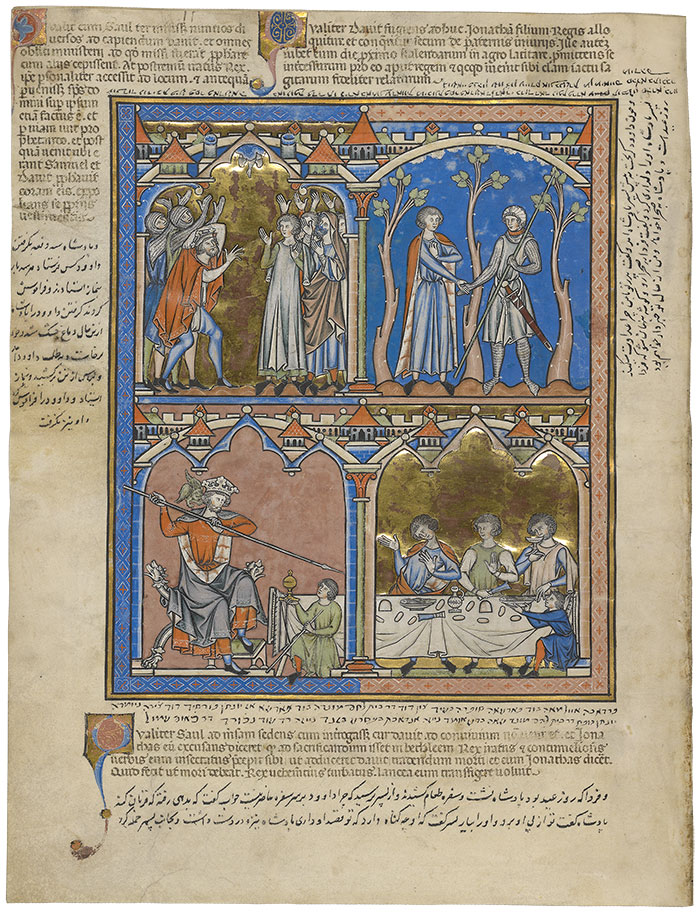
Once More among the Prophets, Jonathan Consoles David, Sharp Words
Old Testament Miniatures with Latin, Persian, and Judeo-Persian inscriptions
Purchased by J.P. Morgan (1867–1943) in 1916
Once More among the Prophets
Infuriated by the behavior of his officers, Saul decides to pursue David himself. But the king fares no differently than his envoys. When he finally catches up to David and Samuel, Saul is overcome by the spirit of the Lord. He begins to prophesy and pulls his mantle over his head; for a full day and night, the king will lay down naked and prophesy with the rest. (1 Kings 19:21–24)
Jonathan Consoles David
David, armed with spear and sword, secretly meets with Jonathan. The friends swear loyalty to each other and agree on a plan that will insure David's safety. Jonathan will approach his father on David's behalf in order to determine the king's mind. If the king is still intent on harming David, Jonathan will send warning. (1 Kings 20:1–17)
Sharp Words
It is the feast of the New Moon. Servants bustle about the high table with wine and platters of fish. As an evil spirit whispers in his ear, Saul becomes aware of David's absence. Jonathan apologizes on behalf of his friend, explaining that David has traveled to Bethlehem to sacrifice with his family. Suspecting treachery, Saul curses Jonathan and prepares to hurl an enormous javelin at him. Jonathan escapes harm and is now convinced of his father's evil intentions. (1 Kings 20:27–33)
Folio 31v (Latin)
Upper left: How, when Saul had sent various messengers to capture David, and all of them, having forgotten the task for which they had been sent, had begun prophesying, at length the king himself went, furious, to that place. Still, before he had come there, the spirit of God was upon him and he went on his way, prophesying, and came to the place where Samuel and David were and prophesied before them and stripped himself of his own clothes. (I Samuel 19: 21–24)
Upper right: How David, still on the run, talks to Jonathan, the king’s son, and complains about his father’s wrongdoings. Now, the latter orders him to hide in the field on the next day, the first day of the month, promising him to go to the king, intervene on his behalf, and, if he finds something, to faithfully, yet secretly, report it to him by shooting arrows. (I Samuel 20:11–23)
Lower half: How, when Saul, sitting at the table, had asked why David did not come to dine with him, and Jonathan pretended that he had gone to Bethlehem to sacrifice, the king, angered, reproached his son with harsh words, ordering him to bring David to him that he might be killed. When Jonathan asked: ’What has he done to earn his death?’, the king, greatly disturbed, wished to pierce him with his spear. (I Samuel 20: 24–34)
Folio 31v (Persian)
Persian foliation: 13
Upper left margin: Thrice the king dispatched people to capture David, and all three times they stood in prayer and forgot to capture David. The king became angry at this and he himself rose and went after David but he [also] removed his clothes and stood in prayer and forgot David and he also did not capture [him].
Upper right margin: When David escaped, he came before the king’s son and said, "Why does your father bear enmity towards me?" The king’s son consoled him and said to him, "Tomorrow go to the countryside and hide in a corner, for tomorrow is the feast day and the king will go to the countryside and I will find out about your situation.
Lower half, below Latin inscription: And tomorrow which was the feast day, the king sat and they brought out the spread of food and he asked his son, "Why is not David present at the meal?" He replied that he has gone to a village to offer a sacrifice. The king said, "Go after him and bring him." The son said, "What sin has he committed that you wage war against him?" The king had a spear in hand and he charged toward his son.
Folio 31v (Judeo-Persian)
Upper half, below Latin: When David fled to the king’s son, he said to him, "Why is your father my enemy?" The king’s son, who loved David, said, "Go tomorrow into the plain and hide in a corner; when the festival is over I will come to you to inform you."
Lower half, above Latin: The next day was the first of the month, the king laid a table [for a feast]. Since David remained in Bethlehem, the king asked Jonathan why he [David] had not come. Jonathan answered, "He remained in Bethlehem." The king grew angry and he threw a spear to strike his head. The spear missed its aim, as it is written in Samuel, [chapter] 20.
Content consultant: Richard Leson
Persian translated by Sussan Babaie
Judeo-Persian translated by Vera Basch Moreen
Latin translation by Eran Lupu
After the commentary volume accompanying the Fine Art Facsimile edition by Faksimile Verlag Luzern
MS M.638, fol. 32r
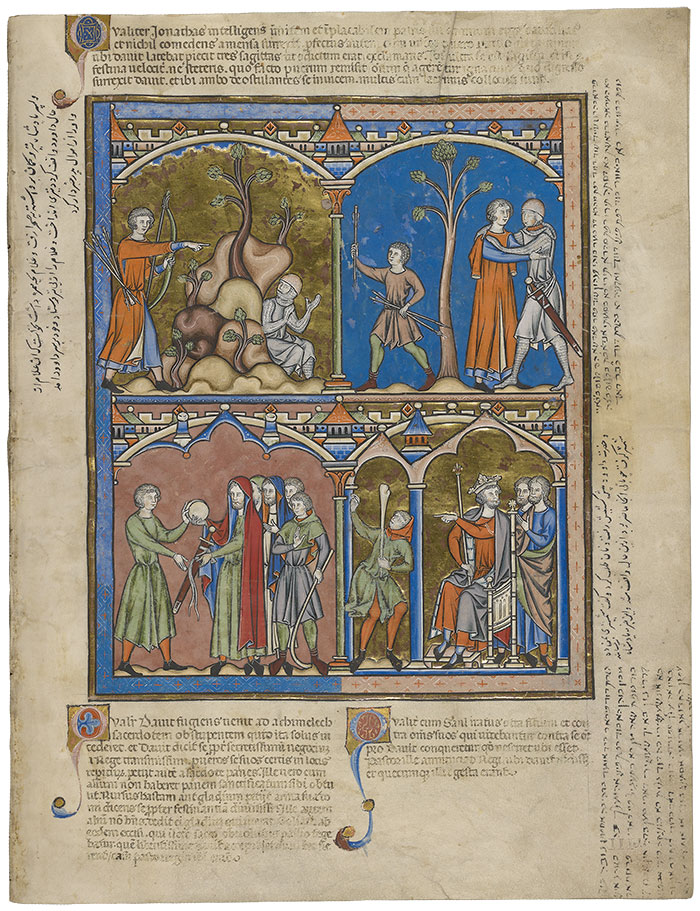
A Tearful Farewell, Ahimelech Provisions David, David Feigns Madness
Old Testament Miniatures with Latin, Persian, and Judeo-Persian inscriptions
Purchased by J.P. Morgan (1867–1943) in 1916
A Tearful Farewell
Accompanied by a page, Jonathan returns to the field where David lies hidden. He shoots three arrows as a signal to his friend and orders the page to retrieve them. After the boy is dismissed, David emerges from his rocky hiding place and embraces Jonathan. After swearing allegiance to Jonathan and his house, David takes his leave. (1 Kings 20: 35–43)
Ahimelech Provisions David
David makes his way to Nob and to the place of the priest Ahimelech. The priest is uneasy, observing that David travels alone and unarmed. David explains that he is on a secret mission for the king. Satisfied, the priest provisions David with the only food on hand—circular loaves of hallowed bread—and arms him with a familiar weapon, the mighty sword of Goliath. Doeg, Saul's chief herdsman, is witness to the event and will inform the king. (1 Kings 21:6–9)
David Feigns Madness
Seeking refuge, David travels to the court of Achish, king of Gath. Soon, the famous warrior is recognized by the servants of Achish and brought before the king. Fearing the consequences of discovery, David pretends madness. He deliberately stumbles about, swinging an enormous club. The annoyed king turns to his advisors and demands that the lunatic be dismissed. (1 Kings 21:10–14)
Folio 32r (Latin)
Upper half: How, Jonathan, aware of his father’s savage and implacable disposition toward David, was angered and arose from the table without eating. Thereupon, having gone with one little boy to the field where David was hiding, he shot three arrows, as he had said, crying, "There is the arrow further behind you," and again: "Make haste quickly, stand not!". This done, he dismissed the boy, unaware of all that had happened. When that one had departed, David arose and went there, and the two conversed, kissing each other with many a tear. (I Samuel 20: 34–42)
Lower left: How, fleeing, David came to Ahimelech, the priest, who wondered why he was coming alone. David told him that the king had sent him on a secret mission to find his servants in certain places. Then he asked bread from the priest, but he offered him holy bread, as he did not have any other. Then he asked him again for a spear or a sword, saying that he had left his arms at home since he was hurrying away. The priest, having no other, gave him the sword of Goliath, whom he himself had killed, which was concealed in a sacred place wrapped up in a mantle. Now, one of the king’s shepherds happened to be there, as these things were happening. (I Samuel 21: 1–9)
Lower right: How Saul was angry with his son and with all of his men who seemed to be against him and to support David, and, when he complained loudly that he did not know where he was, that shepherd told the king where he had seen David and what had happened there. (I Samuel 22: 6–10)
Folio 32r (Persian)
Upper left margin: The king’s son picked up a bow and arrow and went into the fields and he had a page with him. Not wanting the slave to know of David’s whereabouts, he threw an arrow and sent the slave after the arrow and he himself came upon David and informed him of his father’s state.
Lower right margin: His Excellence David went before the priest and requested bread and said, "Give me a sword." He got a sword. A shepherd was present there; he found out about this event and delivered the news to the king.
Folio 32r (Judeo-Persian)
Upper right margin: The next day, which was the day of the festival, David went in the field, hid in the midst of the hills. The king’s son also took along a young boy to bring back arrows shot into the field. He shot off an arrow and said to the boy, "Go get the arrow," while he himself went before David and informed him of the incident [with his father].
Lower right margin: His Excellence David fled and came to a village named Nob, the habitation of priests. He went before Ahimelech, who was their leader, and said, "The king dispatched me on a mission in haste. If you have a loaf of bread and a knife, give them to me." The sword with which David had killed Goliath had been entrusted to Ahimelech; he brought it out and gave it to David...Doeg, the Aramean....
Italicized words are in Hebrew.
Content consultant: Richard Leson
Persian translated by Sussan Babaie
Judeo-Persian translated by Vera Basch Moreen
Latin translation by Eran Lupu
After the commentary volume accompanying the Fine Art Facsimile edition by Faksimile Verlag Luzern
MS M.638, fol. 32v
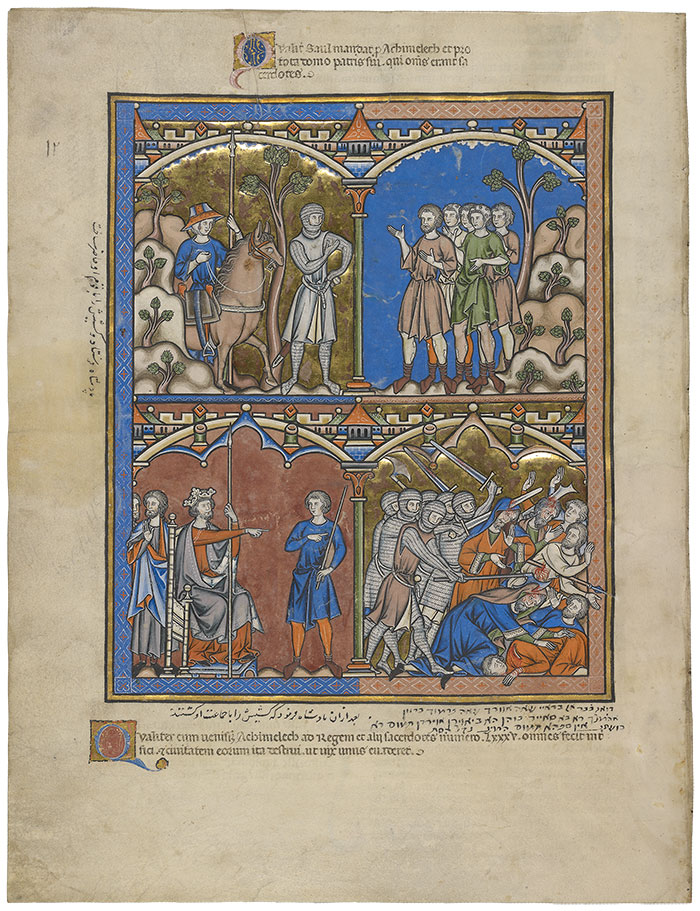
A Massing of Malcontents, Ahimelech Executed
Old Testament Miniatures with Latin, Persian, and Judeo-Persian inscriptions
Purchased by J.P. Morgan (1867–1943) in 1916
A Massing of Malcontents
David escapes to the wilderness. At the cave of Adullam, his distressed brothers and other poor people of the kingdom gather to the young leader and proclaim him their prince. All told, David's ragtag company will number four-hundred men. (1 Kings 22:1–2)
Ahimelech Executed
Saul has discovered how Ahimelech and his priestly house provided David with aid. Ahimelech reminds Saul that David is a faithful servant, but the paranoid king will not listen to reason: the priest and his entire family are violently killed. (1 Kings 22:11–18)
Folio 32v (Latin)
Upper half: How Saul sends for Ahimelech and for his family members who were all priests. (I Samuel 22:11)
Lower half: How, when Ahimelech and the other priests, all eighty-five of them, had come to the king, he had them all killed and their city so utterly destroyed, that hardly one man escaped. (I Samuel 22: 6–19)
Folio 32v (Persian)
Persian foliation: 12
Upper left margin: The king sent [someone] and had the priest and his brethren brought forth.
Lower left: Then the king ordered the priest and his people slain.
Folio 32v (Judeo-Persian)
Lower right, above Latin: Doeg, having informed the king, the king ordered, "Go, bring Ahimelech and the rest of the priests." They brought them and they [the priests] were all killed. This also belongs to the tale [of?]
Italicized words are in Hebrew.
Content consultant: Richard Leson
Persian translated by Sussan Babaie
Judeo-Persian translated by Vera Basch Moreen
Latin translation by Eran Lupu
After the commentary volume accompanying the Fine Art Facsimile edition by Faksimile Verlag Luzern
MS M.638, fol. 33r
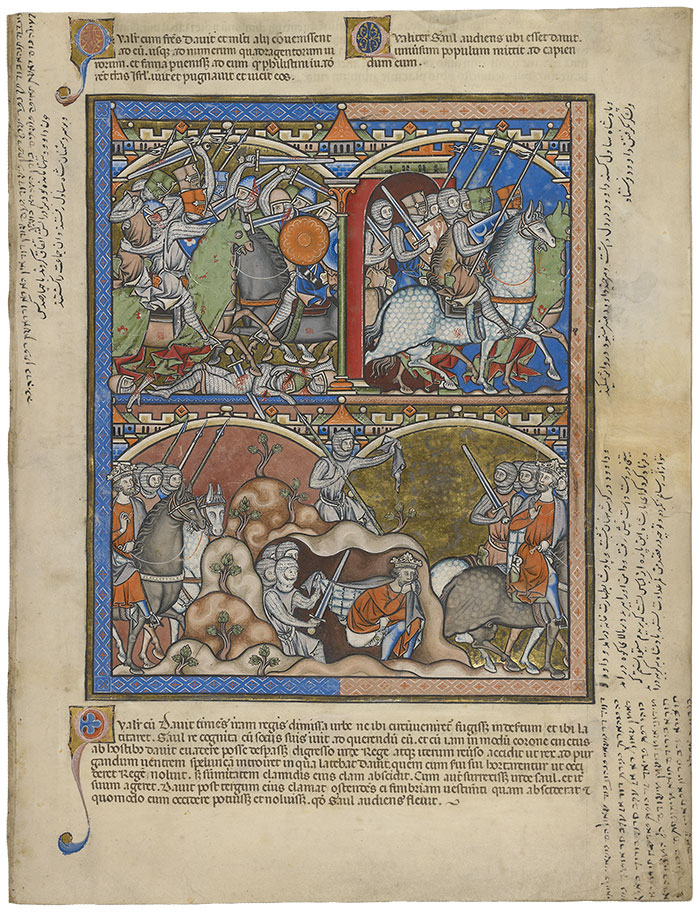
Keilah Liberated, Retreat, Royal Repose
Old Testament Miniatures with Latin, Persian, and Judeo-Persian inscriptions
Purchased by J.P. Morgan (1867–1943) in 1916
Keilah Liberated
David, in obedience to the Lord's command, engages the Philistines at Keilah in furious combat. The Israelites grapple with their opponents and strike terrible blows. (1 Kings 23:4–5)
Retreat
Saul will soon arrive in Keilah. The Lord warns David that the people of the town will betray him to the king, so he gathers his forces and departs. (1 Kings 23:10–13)
Royal Repose
Later, Saul and his army arrive at the cave of En Gedi, where David and his men lie hidden. As the king empties his bowels in the dark cave, David quietly shears a corner from his mantle. When Saul and his troops leave the cave, they are startled by David, who protests his allegiance to the king. He holds aloft his trophy as proof that, had he desired, he could have easily slain Saul. (1 Kings 24:3–12)
Folio 33r (Latin)
Upper left: When David’s brothers and many others, up to the number of four hundred, came together to him, and when he heard that the Philistines had invaded the land of Israel, he went, fought with them, and defeated them. (I Samuel 23 1–5)
Upper right: How Saul, upon hearing where David was, sent all the people to catch him. (I Samuel 23: 19–26)
Lower half: How, when David, fearing the king’s anger, had left the city that he might not be surrounded there, and had fled to the desert where he was hiding, Saul, who had discovered it, went out with his allies to seek him. When he was surrounded all around and had given up hope of escaping, the king having departed and returned again, it came to pass that the king entered the cave where David was to purge his stomach. David refused to kill him, although his servants encouraged him to do so, and secretly cut off the tip of his mantle. When Saul had stood up and was on his way, David cried behind his back, showing him the tip of his cloth, which he had cut off, saying that he could have killed him but had refused. Upon hearing this, Saul wept. (I Samuel 24: 1–16)
Folio 33r (Persian)
Upper left margin: Since David had remained alone, his brothers conspired with four hundred men and they descended upon the enemies of King Saul and slew them.
Upper right margin: King Saul held a grudge against David and however much ingenuity David showed it did not affect [the king]. He [again] sent out an army to capture David.
Lower right margin: David sat hiding in a corner and the king came to the privy. David had a knife in hand; he went forth and cut off his skirt. And he climbed to the top of the mountain and cried, "O, king, this piece is from your mantle that I have cut; I could have harmed you; I did not; why do you wage war towards me?" The king burst into weeping.
Folio 33r (Judeo-Persian)
Upper left margin, furthest left: When David was alone four hundred and twenty Israelites went before David. Having gathered together, David took them and went to a village called Keilah where there was a tribe of Philistines, and they killed all of them.
Lower right margin, corner: David was hidden in a corner while Saul was also in a private corner to purify himself. David approached from the back...and cut off a piece of Saul’s mantle from behind. [Then David] went on top of a hill and shouted, saying, "King, you know me, and you think that I’ve become [your] enemy, [now see this piece of your mantle] which I cut off. I could have killed you..., so why are you after me?"....
Content consultant: Richard Leson
Persian translated by Sussan Babaie
Judeo-Persian translated by Vera Basch Moreen
Latin translation by Eran Lupu
After the commentary volume accompanying the Fine Art Facsimile edition by Faksimile Verlag Luzern
MS M.638, fol. 33v
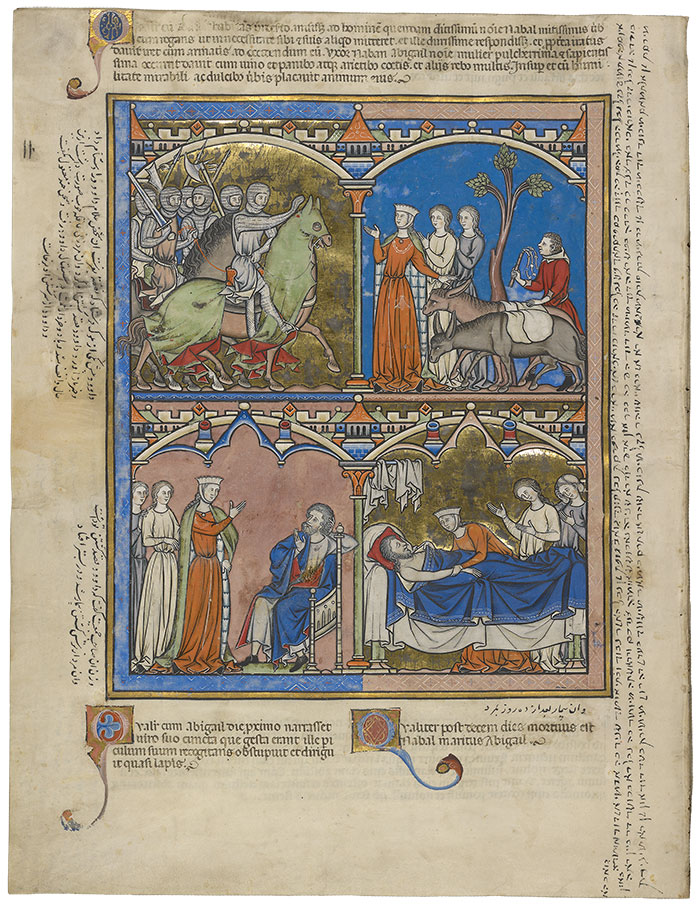
Abigail Cools David's Wrath, Nabal Terrified, Nabal's Death
Old Testament Miniatures with Latin, Persian, and Judeo-Persian inscriptions
Purchased by J.P. Morgan (1867–1943) in 1916
Abigail Cools David's Wrath
David has requested provisions from Nabal, a wealthy sheepherder, and promised in return to continue his protection of Nabal's flocks. But Nabal dismisses David's envoys with disparaging remarks. Abigail, Nabal's wife, regrets her husband's action. She meets David on the road with pack animals loaded with supplies for the army and thus allays David's wrath. (1 Kings 25:18–35)
Nabal Terrified
Nabal sits slumped in his chair after a night of heavy drinking, listening to Abigail reveal how narrowly he escaped the wrath of David. Nabal is struck with such fear that his heart dies within him, and he becomes like a stone. (1 Kings 25:36–37)
Nabal's Death
After ten days, Nabal dies. Abigail and her maidservants grieve at his bedside. When the news reaches David, he praises the Lord for returning Nabal's wickedness upon his own head. Abigail will shortly accept David's marriage proposal and join him in the wilderness. (1 Kings 25:38)
Folio 33v (Latin)
Upper half: How, when David was living in the desert, he sent messengers to some very rich man, Nabal by name, asking him, with very gentle words, to help him in his plight and send him something. Now, this person replied very harshly which angered David and, as he was going with armed men to kill him, Nabal’s wife, whose name was Abigail, a very beautiful and wise woman, rushed to him with wine and bread and cooked rams and many other things, and moreover, calmed his anger with incredible humanity and gentle words. (I Samuel 25: 2–35)
Lower left: How, when on the next day Abigail had told Nabal what had happened, he perceiving the danger, was astounded and almost turned into stone. (I Samuel 25: 36–37)
Lower right: How Nabal, Abigail’s husband, died after ten days. (I Samuel 25: 38)
Folio 33v (Persian)
Persian foliation: 11
Upper left margin: David sent to one of the kings [demanding] that he send provisions. That person cursed David’s slave and he informed David. David set out to slay him. And that man had a beautiful, wise wife who became aware of this affair and went before David with two ass loads of offerings and uttered some wise words. And David was dissuaded from killing him.
Lower left margin: The wife of those people’s master said, "David intended to slay you." And the man fell ill from the fear of slaying and took to bed."
Lower right: The stricken [man] died after ten days.
Folio 33v (Judeo-Persian)
Right margin: These pages are all about the tale of Nabal the Carmelite, namely, that David sent a person to Nabal, [saying], "Send us a little food." Nabal replied angrily [and negatively]. Nabal’s wife was not present. When she came and heard that a man came from David and was answered [negatively], Nabal’s wife took some assloads of food and came to meet David. When David heard the news from his man, he became displeased and took some men to go and kill Nabal. On the road he met that woman [Nabal’s wife] and the woman begged him [not to do so]. David forgave him [Nabal] and the woman returned [home] and related to her husband the incident. The husband fell ill out of fear [and] died after ten days. Afterwards David married that woman.
Content consultant: Richard Leson
Persian translated by Sussan Babaie
Judeo-Persian translated by Vera Basch Moreen
Latin translation by Eran Lupu
After the commentary volume accompanying the Fine Art Facsimile edition by Faksimile Verlag Luzern
MS M.638, fol. 34r
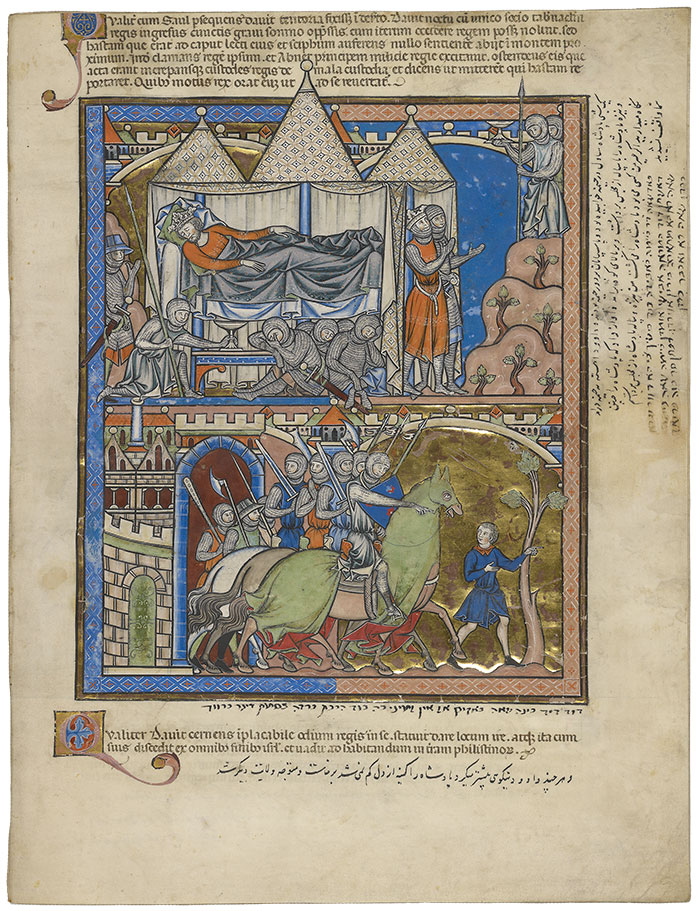
David Spares Saul a Second Time, Kidnapped
Old Testament Miniatures with Latin, Persian, and Judeo-Persian inscriptions
Purchased by J.P. Morgan (1867–1943) in 1916
David Spares Saul a Second Time
Saul's army has encamped outside of the wilderness of Ziph. David, followed by his commander Abishai, slips into the pavilion where the king is sleeping and steals the royal cup and spear. Later, from the safety of a mountain top, David calls to Saul and the commander of his army, Abner. He displays before them the stolen cup and spear and berates Abner for his carelessness in protecting the king. (1 Kings 26:7–25)
Kidnapped
David's wives and the families of his followers have been taken captive by the Amalekites, along with all of the inhabitants of Ziklag. With six-hundred men, David sets out to rescue them. On the way, he meets an Egyptian boy, abandoned by the Amalekites, who agrees to guide David to the enemy. (1 Kings 30:5–15)
Folio 34r (Latin)
Upper half: How, when Saul, pursuing David, had encamped in the desert, David entered his tent at night with one companion, as all were sleeping deeply. Although he could have killed him, he did not wish to do so, but took only a spear which lay at the head of his bed and a cup, and, without anyone’s knowledge, carried them and went to the nearest mountain. Crying from there, he aroused the king and Abner, the captain of his army, showing them what had happened. Then, rebuking the king’s guards for their lack of care, he told them to send someone to bring back the spear. Moved by this, the king asks David to come back to him. (I Samuel 26)
Lower half: How David, perceiving the king’s implacable hatred toward him, decides to yield to him and go, and thus goes out of the borders of Israel with his men, to live in the land of the Philistines. (I Samuel 27: 1–4)
Folio 34r (Persian)
Upper right margin: One night, King Saul was sleeping in the tent and the guards were surrounding the tent. David crept into the tent and removed the king’s spear with the cup from the scene. He went atop the mountain and cried, "Is this how you protect the king? If it were anyone but me, he would have slain the king; I removed the king’s cup and spear from the residence and you did not know."
Lower half, below Latin inscription: Regardless of David’s increasing good deeds, the king’s enmity did not diminish. [David] rose and set out for another province.
Folio 34r (Judeo-Persian)
Upper right margin, furthest right: The king was sleeping in the tent surrounded by his guards. David came into the king’s tent accompanied by Abishai and skillfully brought out his [the king’s] spear. [Then] they went to the top of a hill and, shouting, informed the king [of their deed].
Lower half, above Latin: [Since] David saw that the king’s vengefulness continued, he moved from the land he was in and traveled on another road.
Content consultant: Richard Leson
Persian translated by Sussan Babaie
Judeo-Persian translated by Vera Basch Moreen
Latin translation by Eran Lupu
After the commentary volume accompanying the Fine Art Facsimile edition by Faksimile Verlag Luzern
MS M.638, fol. 34v
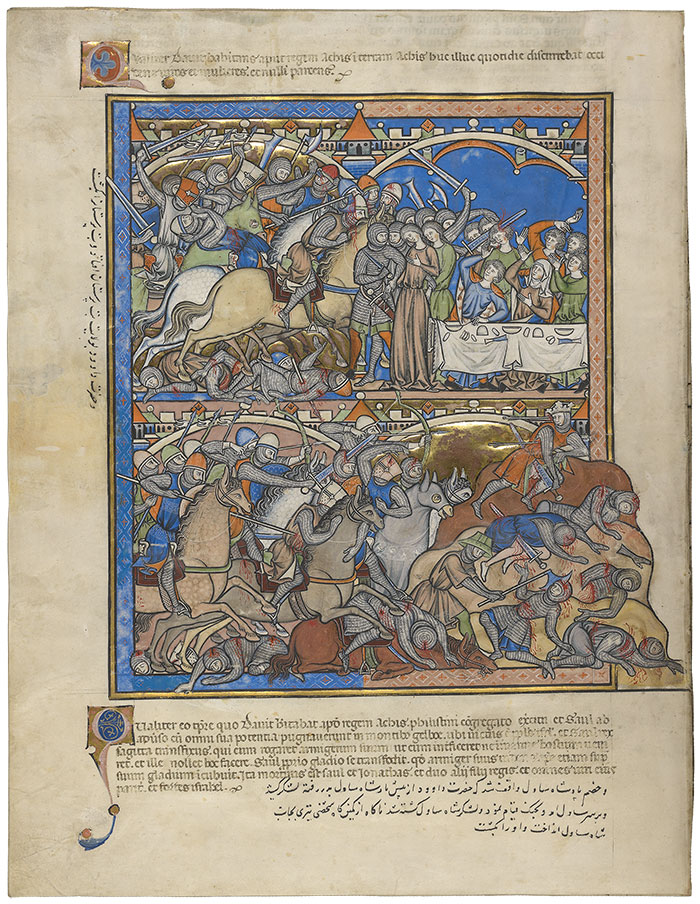
Slaughter of the Amalekites, Saul's Last Stand
Old Testament Miniatures with Latin, Persian, and Judeo-Persian inscriptions
Purchased by J.P. Morgan (1867–1943) in 1916
Slaughter of the Amalekites
David finds the Amalekites feasting in a field. The thieves are caught unawares and butchered. All of the captives are recovered; David himself cuts the fetters from the wrists of one of his wives. One of David's company cleaves the skull of an enemy with a sword bearing the inscription 'ODISMORT'(hatred, death), a declaration of the weapon's deadly efficacy. (1 Kings 30:16–19)
Saul's Last Stand
At Mount Gilboa, Saul makes his final stand against the Philistines. The enemy destroys the king's army and kills his three sons, among them, Jonathan. As the advancing Philistines hack through fleeing Israelite horsemen, crossbowmen take aim at the king and grievously wound him. Saul turns for one final look at his attackers and shamefully falls on his own sword. One of the Philistines wields a blade inscribed 'IOIOUSE'('Joyous'), the name of Charlemagne's sword in the Song of Roland. (1 Kings 31:1–6)
Folio 34v (Latin)
Upper half: How David, staying with the king of Acish in the land of Acish, was daily running here and there, killing men and women and sparing none. (I Samuel 27: 5–12)
Lower half: How, while David was staying with the king of Achish, the Philistines who had gathered an army, with Saul, opposing them, fought with all their might in the mountains of the Gilboa, where the people of Israel were defeated and the king was pierced through by an arrow. Now, when he had asked his armor bearer to kill him, that he might not fall into the hands of the enemy, and the latter refused to do it, Saul stabbed himself with his own sword. As his armor bearer saw this, he too fell on his sword. Thus died Saul and Jonathan and the king’s other two sons, together with all the men of Israel and the mighty men of Israel. (I Samuel 31: 1–6)
Folio 34v (Persian)
Upper left margin: His Excellence David went to the province of the idolaters and slew the idolaters.
Lower half: The enemy of King Saul became aware that His Excellence David has fled from King Saul. He gathered an army and fell upon Saul and started war; the army of King Saul was slain. Suddenly, from a hiding place, someone threw an arrow at King Saul and slew him.
Folio 34v (Judeo-Persian)
Content consultant: Richard Leson
Persian translated by Sussan Babaie
Judeo-Persian translated by Vera Basch Moreen
Latin translation by Eran Lupu
After the commentary volume accompanying the Fine Art Facsimile edition by Faksimile Verlag Luzern
MS M.638, fol. 35r
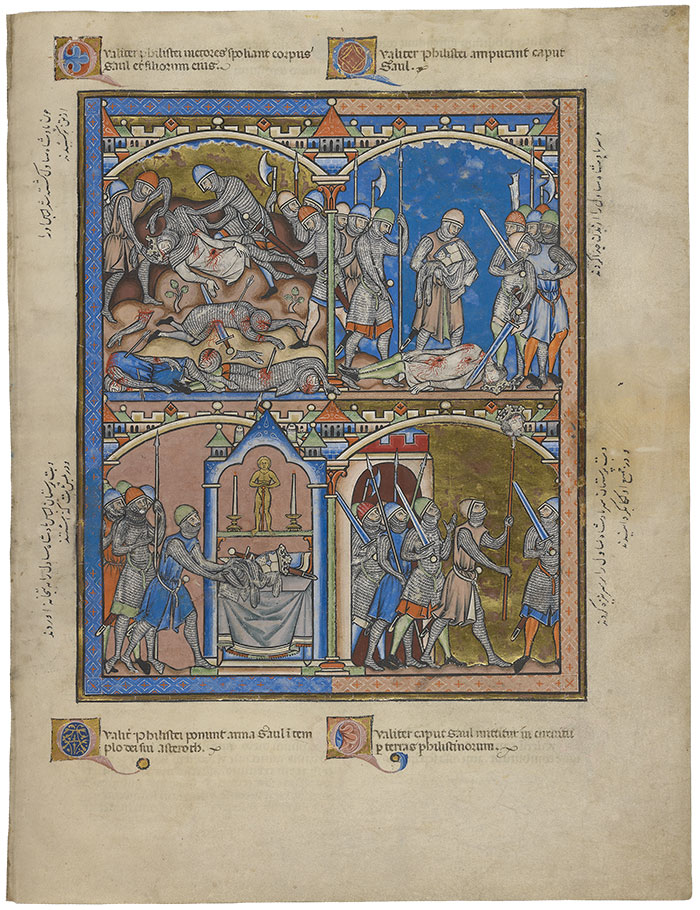
Spoils of War, Saul Decapitated, Trophies, A Grisly Parade
Old Testament Miniatures with Latin, Persian, and Judeo-Persian inscriptions
Purchased by J.P. Morgan (1867–1943) in 1916
Spoils of War
Following the battle, the Philistines find Saul's body on Mount Gilboa and strip it of the armor. (1 Kings 31:8)
Saul Decapitated
Having collected the king's armor, the Philistines decapitate his corpse. (1 Kings 31:9)
Trophies
The Philistines place Saul's armor—including his shield, sword, and crowned helmet—on the altar of their god, Ashtoreth. (1 Kings 31:10)
A Grisly Parade
The king's head, shown crowned, is shamefully affixed to a pike and paraded throughout the Philistine lands. (1 Kings 31:9–10)
Folio 35r (Latin)
Upper left: How the victorious Philistines strip the bodies of Saul and his sons. (I Samuel 31: 8)
Upper right: How the Philistines cut off Saul’s head. (I Samuel 31: 9)
Lower left: How the Philistines put Saul’s arms in the temple of Ashtaroth, their god. (I Samuel 31: 10)
Lower right: How Saul’s head is sent into the land of the Philistines round about. (I Samuel 31:9)
Folio 35r (Persian)
Upper left margin: When King Saul was slain, they stripped him.
Upper right margin: And they cut off King Saul’s head.
Lower left margin: The idolaters brought King Saul’s garment to the temple of idols and laid it before the idol.
Lower right margin: The idolaters placed King Saul’s head atop a spear and paraded it all over the kingdom.
Folio 35r (Judeo-Persian)
Content consultant: Richard Leson
Persian translated by Sussan Babaie
Judeo-Persian translated by Vera Basch Moreen
Latin translation by Eran Lupu
After the commentary volume accompanying the Fine Art Facsimile edition by Faksimile Verlag Luzern
MS M.638, fol. 35v
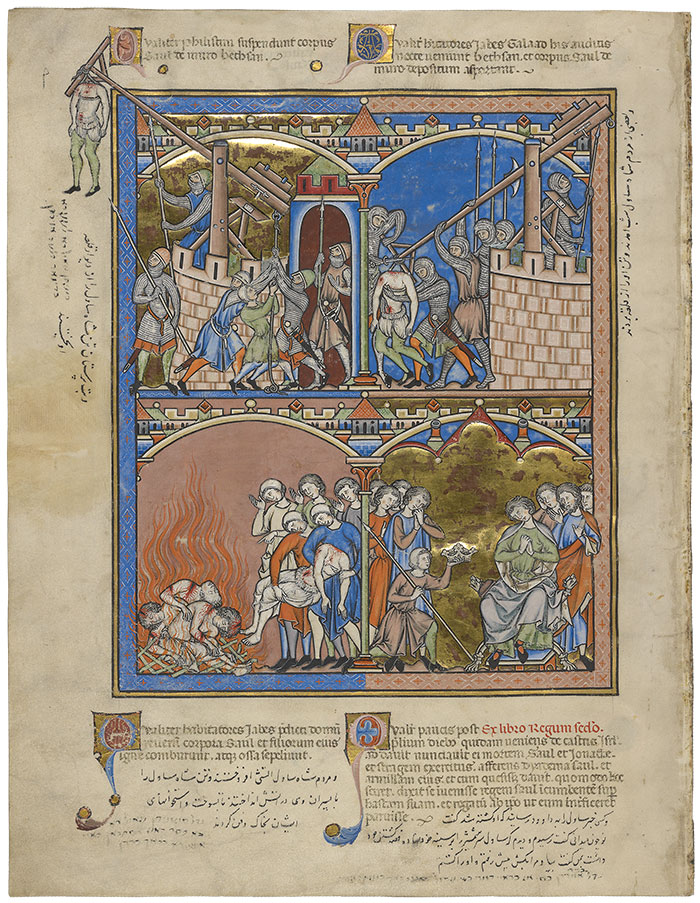
The Final Indignity, A Doleful Task, A Funeral Pyre, Sad Tidings
Old Testament Miniatures with Latin, Persian, and Judeo-Persian inscriptions
Purchased by J.P. Morgan (1867–1943) in 1916
The Final Indignity
The Philistines have strung Saul's decapitated body to a war engine and suspended the corpse above the city walls of Beth Shan. Three men pull down on the counterpoise, raising the gruesome trophy, while a fourth guides the swinging joist with his spear. (1 Kings 31:10)
A Doleful Task
Having learned how the Philistines disgraced the king's corpse, valiant men of Jabesh Gilead journey through the night in secret to retrieve the bodies of Saul and his sons. As one soldier pushes the war engine's counterpoise upwards with his spear, his fellows, wearing mournful expressions, hold down the joist and cut loose the king's body. (1 Kings 31:11–12)
A Funeral Pyre
Grieving men of Jabesh Gilead prepare to place Saul's corpse on the same enormous fire that consumes his dead sons. They will collect the bones and bury them in the woods of Jabesh Gilead, and afterwards fast for seven days. (1 Kings 31:12–13)
Sad Tidings
A survivor of the Gilboa massacre arrives in Ziklag and reports to David of the deaths of Saul and Jonathan. The survivor recounts how he discovered Saul transfixed upon his own spear, and at the king's request killed him before the Philistines had the opportunity. Now he has brought the king's crown to David, its rightful owner. (2 Kings 1: 2–10)
Folio 35v (Latin)
Upper left: How the Philistines hand Saul’s body from the wall of Beth–shan. (I Samuel 31: 10)
Upper right: How, when they had heard this, the inhabitants of Jabesh-gilead come at night to Beth-shan, take Saul’s body down from the wall, and carry it away. (I Samuel 31: 1, 12)
Lower left: How the above-mentioned inhabitants of Jabesh come back home, burn up the bodies of Saul and his sons in fire and bury their bones. (I Samuel 31:12)
Lower right: From the second book of Kings [2 Samuel]. How, a few days after the battle, someone from the Israeli camp came to David and told him about the death of Saul, Jonathan, and the captain of the army, carrying Saul’s diadem and his bracelet. Now, when David had asked how he knew it, he said that he had found king Saul lying on his spear, and, having been asked by the king to kill him, he had obeyed. (2 Samuel 1: 1–10)
Folio 35v (Persian)
Persian foliation: 9 (in reverse)
Upper left margin: And the idolaters hung King Saul’s body from the wall of the castle.
Upper right margin: Some of King Saul’s people came in the night and removed his body from the castle.
Lower left: The people of King Saul made a fire and threw King Saul’s body together with his sons’ [bodies] into the fire till they burned and they buried their bones.
Lower right: Someone brought the news of Saul to David that he has been slain. He said, "How do you know?" [The messenger] said, "I arrived and saw that Saul had placed the tip of a sword at his breast and intended to kill himself. [Saul] said, ’Come and kill me’. I went forth and killed him.
Folio 35v (Judeo-Persian)
Upper left margin, furthest left: [After] the killing of Saul his corpse was hung from the walls.
Lower left, below Persian: The tale of [the burning] of Saul and his sons and the burying of their bones.
Lower right, beneath Persian: Someone brings the news to David that Saul [and his sons were killed].
Content consultant: Richard Leson
Persian translated by Sussan Babaie
Judeo-Persian translated by Vera Basch Moreen
Latin translation by Eran Lupu
After the commentary volume accompanying the Fine Art Facsimile edition by Faksimile Verlag Luzern
MS M.638, fol. 36r
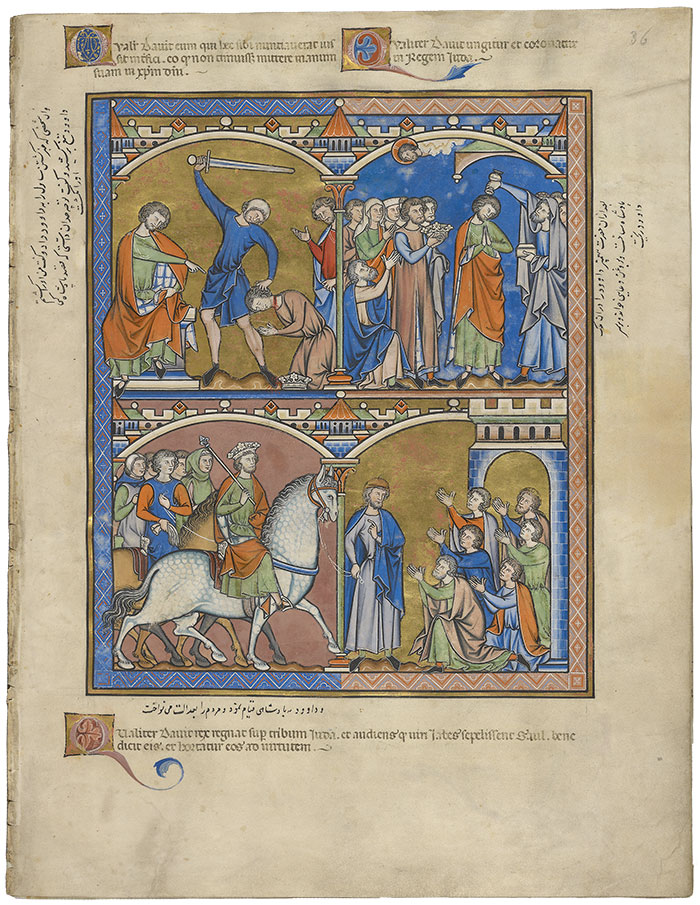
David's Response, David Anointed King of Judah, Ishbosheth Made King of Israel
Old Testament Miniatures with Latin, Persian, and Judeo-Persian inscriptions
Purchased by J.P. Morgan (1867–1943) in 1916
David's Response
David, having wept and mourned the entire day for Saul and Jonathan, gathers his composure and turns to deal with the messenger who killed Saul. He is furious that the man unashamedly and without fear slew the king, the Lord's anointed, and so orders his death. The messenger kneels in an attitude of prayer as his executioner aims a second blow at his neck. (2 Kings 1:13–16)
David Anointed King of Judah
The man praying in the foreground converses with the Lord. According to the biblical text, this should be David, but the figure depicted does not resemble him. David, his wives, and followers go to Hebron in accordance with the Lord's will. There, David is met by men of Judah and anointed king. A priest pours the sacred oil on the head of the new king, and he is presented with the crown. (2 Kings 2:1–4)
Ishbosheth Made King of Israel
Saul's son Ishbosheth still lives, and Abner, Saul's general, makes him king of Israel. Abner, guiding the king's horse, presents the new king to men of the tribes of Israel; only the house of Judah withholds support, for they follow David. The Latin and Persian scribes who later added inscriptions to the Picture Bible misunderstood this scene as the acclamation of David by the men of Judah. (2 Kings 2:8–10)
Folio 36r (Latin)
Upper left: How David ordered that the one who had told this be killed, for he had not feared to put out his hand to kill the Lord’s anointed. (2 Samuel 1: 13–16)
Upper right: How David is anointed and crowned to be king of Juda. (2 Samuel 2: 1–4)
Lower half: How king David rules over Juda and, upon hearing that the men of Jabesh had buried Saul, blesses them and encourages them to be virtuous. (2 Samuel 2: 5–7)
Folio 36r (Persian)
Upper left margin: David drew his sword against that person who brought the news of the slaying of Saul and had said, "I killed Saul." [David] said, "What gave you the right to aim at the king?" [David] slew him.
Upper right margin: And after that His Excellence the prophet made David the king of that realm and he blessed the oil and anointed David.
Lower left: Davis ascended the throne and called people to justice.
Folio 36r (Judeo-Persian)
Content consultant: Richard Leson
Persian translated by Sussan Babaie
Judeo-Persian translated by Vera Basch Moreen
Latin translation by Eran Lupu
After the commentary volume accompanying the Fine Art Facsimile edition by Faksimile Verlag Luzern
MS M.638, fol. 36v
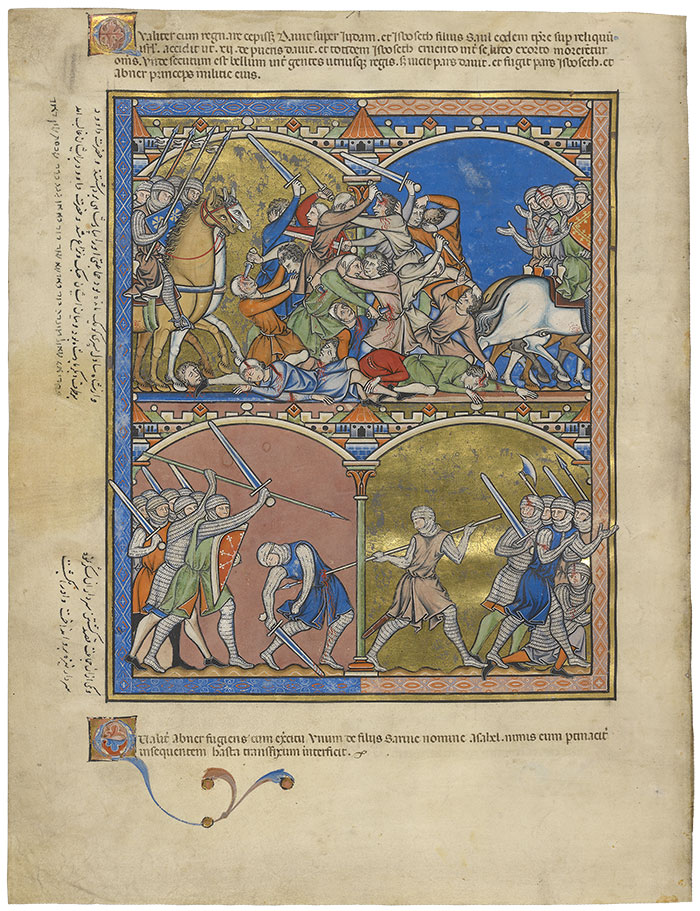
Israel and Judah at War, Joab's Brother Slain
Old Testament Miniatures with Latin, Persian, and Judeo-Persian inscriptions
Purchased by J.P. Morgan (1867–1943) in 1916
Israel and Judah at War
The forces of Abner, commander of Ishbosheth's army and Joab, commander of David's forces, encounter each other at the pool of Gibeon. After sizing each other up, the two commanders agree to a contest pitting twelve men from each army against one another. A bloody struggle ensues, each man catching his foe about the neck and stabbing him. The remainder of the armies join in combat, and Abner's force is bested. As Joab observes the conflict from the left, Abner and his dejected followers flee at right. (2 Kings 2:12–17)
Joab's Brother Slain
Joab and his forces pursue Abner and his fleeing army. Asahel, Joab's fleet-footed brother, catches up to Abner and attempts to kill him. Twice Abner warns Asahel to retreat, wishing to avoid a personal feud. Asahel will not listen. Abner, his hand forced, turns about and runs Asahel through with a spear. (2 Kings 2:18–23)
Folio 36v (Latin)
Upper half: How, when at the same time David had started ruling over Juda and Ish-bosheth, Saul’s son, over the rest of Israel, it happened that twelve of David’s servants and as many of Ish-bosheth’s begun some bloody game and all of them died. Thereupon a war broke between the people of each of the two kings which was won by David’s part. Ishbosheth’s part and Abner, the captain of his army, fled. (2 Samuel 2: 12–17)
Lower half: How, fleeing with his army, Abner kills one of the sons of Zeruiah, Asahel by name, who pursues him too obstinately, piercing him through with a spear. (2 Samuel 2: 18–21)
Folio 36v (Persian)
Persian foliation: 8
Upper left margin: A young son of King Saul had survived. A group [of men] took him to make him king. His Excellence David was the king of another party. War broke out between them and they fought and His Excellence David overcame them.
Lower left margin: One from among the group set out to slay the commander of the army. The commander threw a spear at him and slew him.
Folio 36v (Judeo-Persian)
Upper left margin, furthest left: One of Saul’s surviving sons became king. David went to war against him and defeated him.
Content consultant: Richard Leson
Persian translated by Sussan Babaie
Judeo-Persian translated by Vera Basch Moreen
Latin translation by Eran Lupu
After the commentary volume accompanying the Fine Art Facsimile edition by Faksimile Verlag Luzern
MS M.638, fol. 37r
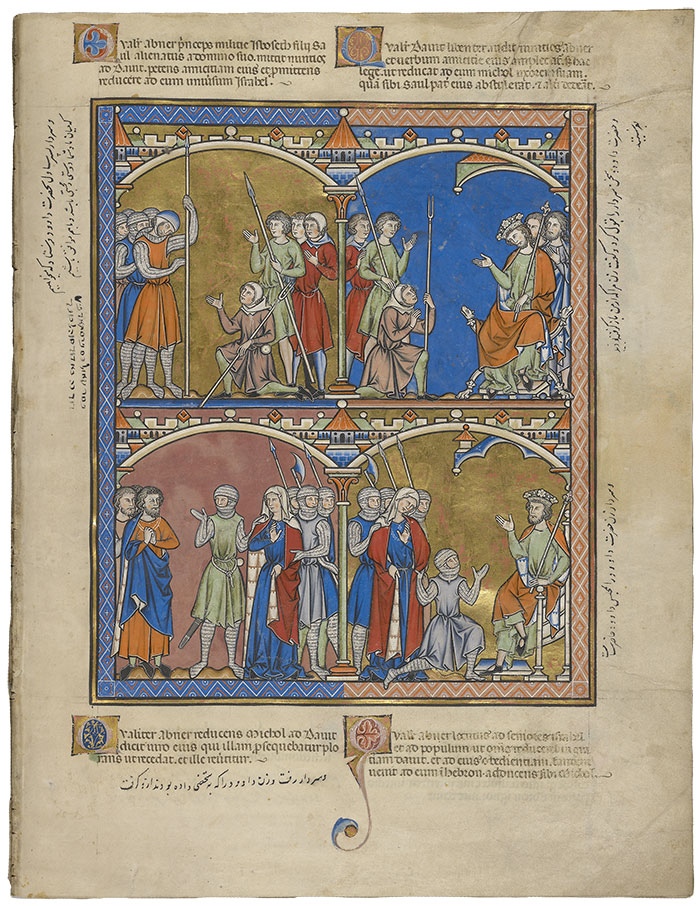
Abner Revolts, David's Demand, Abner Takes Michal from Her Husband, Michal Returned to David
Old Testament Miniatures with Latin, Persian, and Judeo-Persian inscriptions
Purchased by J.P. Morgan (1867–1943) in 1916
Abner Revolts
Conflict has arisen between Abner and Ishbosheth. Abner, angry with the Israelite king, sends messengers to Judah in the hope that he might form an alliance with David. (2 Kings 3:12)
David's Demand
Abner's messengers arrive in Judah with their master's proposal. David agrees to reconcile with Abner on one condition: he must return Michal, David's wife, whom Saul had given to another. (2 Kings 3:13)
Abner Takes Michal from Her Husband
Ishbosheth has agreed to return Michal to David. Michal's husband weeps piteously as Abner and his soldiers lead her away. (2 Kings 3:14–16)
Michal Returned to David
Abner has fulfilled his end of the bargain. The commander kneels before David and presents the king his lost wife. Michal appears to greet her former husband with some trepidation.
Folio 37r (Latin)
Upper left: How, alienated by his master, Abner, the captain of the army of Ish-bosheth, Saul’s son, sends messengers to David, asking for his friendship and promising to bring all of Israel back to him. (2 Samuel 3:12)
Upper right: How David listens willingly to Abner’s messengers and embraces his friendship proposal on the condition that he bring back his wife, Michal, whom Saul, her father, had taken away and had given to another. (2 Samuel 3: 13)
Lower left: How Abner, bringing Michal back to David, told her husband, who was following her, weeping, to go back, and he went back. (2 Samuel 3:16)
Lower right: How Abner, having talked to the elders of Israel and to the people in order that he might again make them all obliged and obedient to David, came to him at last in Hebron, bringing Michal back. (2 Samuel 3: 17–19)
Folio 37r (Persian)
Upper left margin: The commander sent Saul’s son to His Excellence David [saying], "We wish to have friendship and love between you and us and to be in league with one another."
Upper right margin: And His Excellence David accepted the words of the commander and said, "Send me my wife whom you have taken away from me."
Lower left: And the commander went and fetched David’s wife whom they had given to someone else.
Lower right margin: And the commander brought His Excellence David’s wife to David’s court.
Folio 37r (Judeo-Persian)
Upper left margin, bottom: Saul’s son sent a person to David to sue for peace with him.
Content consultant: Richard Leson
Persian translated by Sussan Babaie
Judeo-Persian translated by Vera Basch Moreen
Latin translation by Eran Lupu
After the commentary volume accompanying the Fine Art Facsimile edition by Faksimile Verlag Luzern
MS M.638, fol. 37v
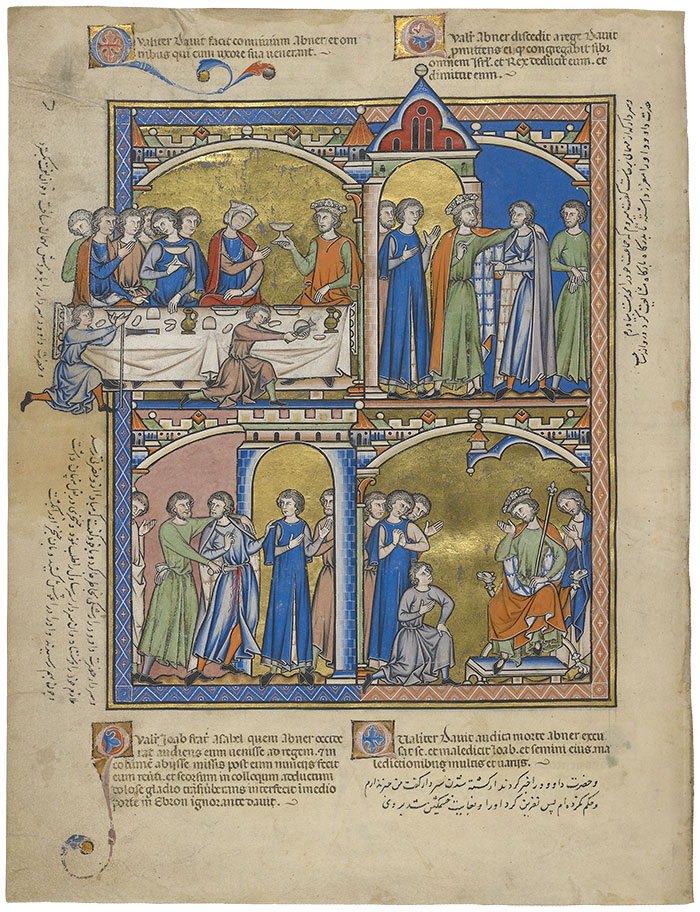
David Feasts with Michal and Abner, Abner's Pledge to David, Joab Slays Abner, David Informed of Joab's Crime
Old Testament Miniatures with Latin, Persian, and Judeo-Persian inscriptions
Purchased by J.P. Morgan (1867–1943) in 1916
David Feasts with Michal and Abner
At the king's table in Hebron, Michal accepts a cup from David. To her right, Abner and men of his company celebrate the new alliance with Judah. The suspicious, half-hidden bearded figure in the background wearing a green tunic is probably the vengeful Joab. (2 Kings 3:20–21)
Abner's Pledge to David
Upon his departure, Abner embraces David and swears that he will soon rally all of Israel to the king's side. Joab, in green tunic and holding a pair of gloves, awaits his opportunity to seek revenge on Abner at the right. (2 Kings 3:21–22)
Joab Slays Abner
Joab summons Abner to speak with him at the gate of Hebron. Abner, not suspecting any foul play, agrees to the meeting. There, Joab treacherously stabs his rival in the groin and gains revenge for the death of his brother, Asahel. (2 Kings 3:26–27)
David Informed of Joab's Crime
Abner's mournful companions return to David with news of their commander's assassination. Joab's crime and his disregard for authority angers David's; the king curses Joab's house and his progeny. (2 Kings 3:28–29)
Folio 37v (Latin)
Upper left: How David made a feast for Abner and for all those who had come with his wife. (2 Samuel 3:20)
Upper right: How Abner departs from David promising to gather all of Israel onto him and the king escorts him and sends him away. (2 Samuel 3:21)
Lower left: How Joab, the brother of Asahel whom Abner had killed, upon hearing that the latter had come to the king and had left unharmed, sent messengers after him and they brought him back. Then, having taken him aside for a talk, Joab killed him deceitfully, piercing him through with a sword in the middle of the gate in Hebron. (2 Samuel 3: 22–27)
Lower right: How David, having heard about Abner’s death, exculpates himself and curses Joab and his seed with many and various curses. (2 Samuel 3: 28, 29)
Folio 37v (Persian)
Persian foliation: 7
Upper left margin: And His Excellence David showed hospitality to the commander and spread out a banquet.
Upper right margin: When the commander rose from the banquet, he said, "I go to bring forth my people." His Excellence David honored him and accompanied him to the gate of the audience hall and sent him off.
Lower left margin: The commander became envious of His Excellence David [fearing] that harm might come from him. He dispatched his slave and the commander summoned the son of Saul and when they came together, having a dagger hidden in his side, he embraced [the son of Saul] and slew him with the dagger.
Lower right: They informed His Excellence David of the slaying. The commander said, "I do not know [about it] and I have not ordered [it]." Thus he [David] cursed him and became exceedingly angry with him.
Folio 37v (Judeo-Persian)
Content consultant: Richard Leson
Persian translated by Sussan Babaie
Judeo-Persian translated by Vera Basch Moreen
Latin translation by Eran Lupu
After the commentary volume accompanying the Fine Art Facsimile edition by Faksimile Verlag Luzern
MS M.638, fol. 38r
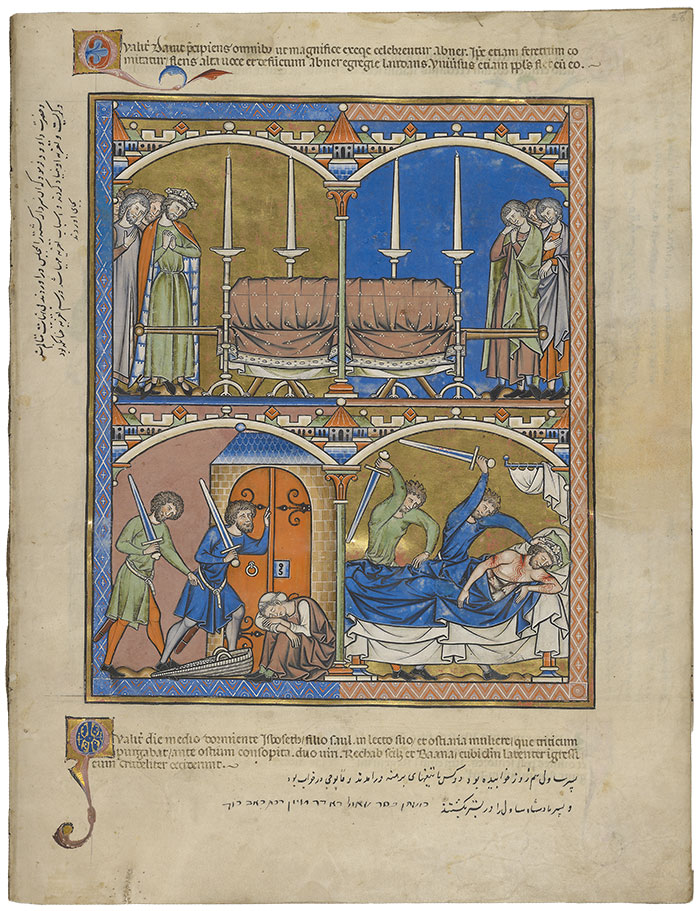
A Stately Funeral, Rechab and Baanah, Traitors
Old Testament Miniatures with Latin, Persian, and Judeo-Persian inscriptions
Purchased by J.P. Morgan (1867–1943) in 1916
A Stately Funeral
David and his fellows grieve for Abner and prepare his burial in Hebron. Abner's richly draped coffin is set on a bier with projecting handles and is surrounded by four enormous tapers set on tripods. (2 Kings 3:31–34)
Rechab and Baanah, Traitors
News of Abner's death has spread throughout Israel, and Ishbosheth fears for the safety of his kingdom. Two of Ishbosheth's captains, Rechab and Baanah, decide to defect. They are certain that if they slay Ishbosheth they will gain great favor in David's eyes. Here, the long-haired rogues, swords drawn, arrive at the king's house to find the doorkeeper asleep, exhausted from sifting grain. The traitors creep to the sleeping Ishbosheth in his chamber and kill him. (2 Kings 4:1–7)
Folio 38r (Latin)
Upper half: How David, ordering all to honor Abner with a magnificent funeral, follows the bier himself, weeping loudly and praising the dead Abner admirably. All the people weep with him. (2 Samuel 3: 31–39)
Lower half: How, as Ish-bosheth, Saul’s son was sleeping in his bed in the middle of the day and the portress who was winnowing the grain had fallen asleep, two men, that is Rechab and Baanah, came secretly into his bed chamber and killed him. (2 Samuel 4:1–2, 5–7)
Folio 38r (Persian)
Upper left margin: His Excellence David ordered the slain commander to be brought to the court and he [David] was exceedingly saddened and wept; they began mourning him and the necessities for the mourning were prepared and they performed the mourning ritual as was the custom.
Lower right: That same day, the son of Saul was sleeping and two persons came in with drawn swords, and the gatekeeper was asleep, and they slew Saul’s son in bed.
Folio 38r (Judeo-Persian)
Lower half, beneath Persian: The killing of Saul’s son in his bed.
Translated by Vera Basch Moree
Content consultant: Richard Leson
Persian translated by Sussan Babaie
Judeo-Persian translated by Vera Basch Moreen
Latin translation by Eran Lupu
After the commentary volume accompanying the Fine Art Facsimile edition by Faksimile Verlag Luzern
MS M.638, fol. 38v
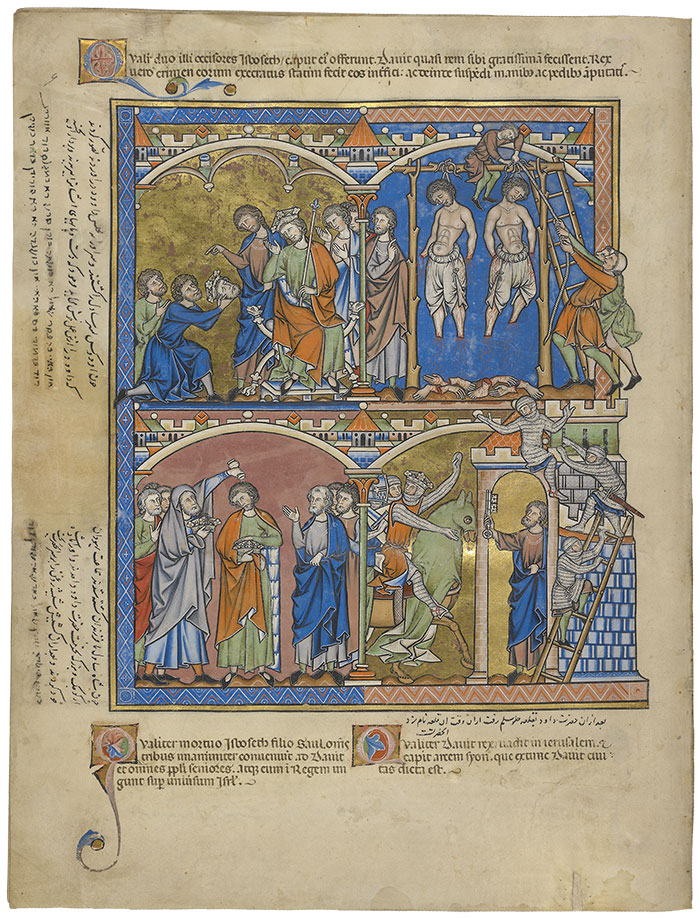
The King is Displeased, The Tribes under One King, The Conquest of Jerusalem
Old Testament Miniatures with Latin, Persian, and Judeo-Persian inscriptions
Purchased by J.P. Morgan (1867–1943) in 1916
The King is Displeased
Rechab and Baanah, bearing the head of Ishbosheth, arrive at David's house and seek his favor. The king is far from pleased; he reminds the traitors of the fate of the messenger who sought royal favor for having slain Saul. How much greater a crime to have killed a an innocent man asleep in his bed! The assassins will pay for the outrage with their own blood. After cutting off their hands and feet, three servants hang the traitors' bodies from a rickety gallows. (2 Kings 4:8–12)
The Tribes under One King
The remaining tribes of Israel, now without a ruler, arrive in Hebron and proclaim David king. David removes the crown of Judah and is anointed. With great acclamation from the assembled elders, David will receive the crown of a united Israel. (2 Kings 5:1–3)
The Conquest of Jerusalem
David leads the Israelite army to Jerusalem and there attacks Zion, the fortress of the Jebusites. Battle-ready Israelite soldiers scale the walls of the stronghold, but David halts their assault when an elder of Zion emerges and surrenders the keys to the city. The king establishes his house in the fortress of Zion; henceforth, Jerusalem will be called the city of David. (2 Kings 5:6–9)
Folio 38v (Latin)
Upper half: How those two murderers of Ish-bosheth offer his head to David, as if they had done him a great service. Nevertheless, the king, having cursed their crime, has them killed and later hanged with their hands and feet amputated. (2 Samuel 4: 8–12)
Lower left: How, after the death of Ish-bosheth, Saul’s son, all the tribes and all the elders of the people unanimously come together to David and anoint him to be a king over all of Israel. (2 Samuel 5: 1–3)
Lower right: How David goes to Jerusalem and takes the citadel of Zion which was thereafter known as the city of David. (2 Samuel 5: 6–9)
Folio 38v (Persian)
Persian foliation: 6
Upper left margin: When those two slew Saul’s son, they brought his head to the court of David thinking that David would be pleased with this deed. He ordered to have their hands and feet cut off and to hang them.
Lower left margin: Since King Saul with his children were slain, the Israelites, young and old, came to His Excellence David and made him their king. Afterwards the priest anointed His Excellence David.
Lower right: After that, His Excellence David went tot the citadel of Jelusalem [Jerusalem] and since then that citadel is named after his Excellence.
Folio 38v (Judeo-Persian)
Upper left margin, furthest left: Those who killed Saul’s son bring his head to David’s assembly. David orders the hands and feet of those murderers cut off and that they be hanged.
Lower left margin, furthest left: After Saul’s death David becomes king.
Content consultant: Richard Leson
Persian translated by Sussan Babaie
Judeo-Persian translated by Vera Basch Moreen
Latin translation by Eran Lupu
After the commentary volume accompanying the Fine Art Facsimile edition by Faksimile Verlag Luzern
MS M.638, fol. 39r

Israel Triumphant, The Chariot of Abinadab
Old Testament Miniatures with Latin, Persian, and Judeo-Persian inscriptions
Purchased by J.P. Morgan (1867–1943) in 1916
Israel Triumphant
The Philistines have learned that David is now king of all Israel and decide to take action against this new threat. David, sanctioned by the heavenly gaze of the Lord, rides forth with his army to deal with the enemy. At Baal Perazim (which literally means Baal is broken), the battle begins and the Philistines are utterly defeated. David, bearing a blue shield with a golden lion rampart, runs a Philistine horseman through with his javelin. The contrast between the well-organized ranks of Israelite cavalry at the left and the chaotic mass of fleeing Philistines at the right testifies to the military superiority of David's forces. (2 Kings 5:17–20)
The Chariot of Abinadab
The king seeks to bring the Ark of the Covenant out of the house of Abinadab and into Jerusalem. But as David plays his harp at the head of a joyous procession of musicians, he is stopped suddenly by an awful sight. Uzzah, the son of Abinadab, reaches out to steady the Ark on the bumpy road. For this rashness, the Lord strikes him down where he stands. As the tragedy is pointed out to Uzzah's brother, Ahio, the king casts a concerned glance at the Ark. He decides to enshrine it temporarily in the house of Obed-Edom, who greets David from his doorway at the right. From the heavens, the hand of the Lord blesses Obed-Edom's house. (2 Kings 6:2–11)
Folio 39r (Latin)
Upper half: How, when it was widely known that David was ruling over all of Israel, the Philistines gathered together and went out to seek him. But, the Lord having been consulted, David went ahead to meet them and prostrated them in a great massacre. (2 Samuel 5: 17–20)
Lower half: How David, together with all the people, led the ark of the Lord, laden on a new cart, from the house of Abinadab, whose two sons were leading the cart. David and the people were then playing before it. Yet, when the oxen had kicked and the ark had started to lean aside, Abinadab’s older son put forth his hand and lay hold of the ark. On account of this harshness he fell down there, before the ark, struck by divine indignation. Seeing this, David was saddened and terrified. Fearing to lead the ark to his own house, he carried it to the house of Obed-edom the Gittite. (2 Samuel 6: 1–11)
Folio 39r (Persian)
Upper right margin: The idolaters who were the enemies of His Excellence David heard that David had ascended the throne. They mobilized armies and attacked His Excellence and a great war broke out. Since God was His Excellence’s guide, He favored him and he [David] defeated them.
Lower half, above and below Latin inscription: His Excellence David ordered that they bring the Ark of God to his citadel and the people went to receive the Ark and one of the sons of the priest touched the Ark. He died instantly and His Excellence pondered over the Ark and said, "Take the Ark to the house of one of those people." They did accordingly.
Folio 39r (Judeo-Persian)
Content consultant: Richard Leson
Persian translated by Sussan Babaie
Judeo-Persian translated by Vera Basch Moreen
Latin translation by Eran Lupu
After the commentary volume accompanying the Fine Art Facsimile edition by Faksimile Verlag Luzern
MS M.638, fol. 39v
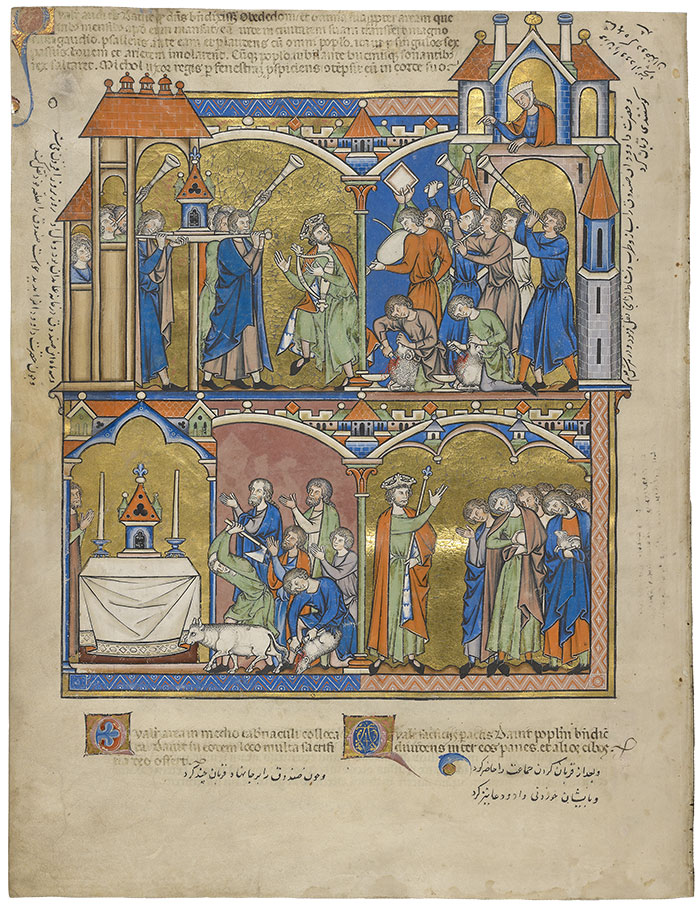
David's Greatest Triumph, The Ark Enshrined in Jerusalem, David Blesses Israel
Old Testament Miniatures with Latin, Persian, and Judeo-Persian inscriptions
Purchased by J.P. Morgan (1867–1943) in 1916
David's Greatest Triumph
David retrieves the Ark of the Covenant from Obed-Edom's house, and a jubilant celebration ensues as the triumphant king, playing upon his harp, leads it into Jerusalem. Once the Ark has come six paces into the city, a sacrifice is made of an ox and a ram. No one is more overjoyed than the king himself, who dances and leaps before the procession. David's wild behavior embarrasses Michal, who points accusingly at him from her window. But the king is unconcerned, wishing only to give thanks and humble himself before God. (2 Kings 6:12–16)
The Ark Enshrined in Jerusalem
The Ark of the Covenant is placed in the new tabernacle David has built for it. Sacrifices and peace offerings are made to the Lord. (2 Kings 6:17)
David Blesses Israel
Having given thanks, the king blesses the people and distributes food to all. (2 Kings 6:18–19)
Folio 39v (Latin)
Upper half: How, upon hearing that the Lord had blessed Obed-edom and all that he had because of the ark which had stayed with him for three months, David carried it to his city with great joy, playing the harp and cheering with all the people so much so that they sacrificed an ox and a bull every six paces. And as the people were rejoicing, the trumpets were sounding, and the king was dancing, Michal, the king’s wife looked out through the window and despised him in her heart. (2 Samuel 6: 12–16)
Lower left: How, the ark having been set in the midst of the tabernacle, David offers many sacrifices in that place. (2 Samuel 6: 17)
Lower right: How, having completed the sacrifices, David blesses the people, distributing bread and other foods among them. (2 Samuel 16: 18–19)
Folio 39v (Persian)
Persian foliation: 5
Upper left margin: For three months, the Ark remained in the house of the servants of God and his wealth increased daily. And when His Excellence David saw this, he asked that the Ark be transported to his own castle.
Upper right margin: His Excellence David transported the Ark from there with music, pageantry and joy and at every six paces he sacrificed a sheep.
David’s wife was observing from the window and was joyous.
Lower left: And when he had the Ark installed, he sacrificed much.
Lower right: After the sacrifices, [David] called on the assembly and gave them food and also prayed.
Folio 39v (Judeo-Persian)
[The Judeo-Persian text is entirely illegible.]
Content consultant: Richard Leson
Persian translated by Sussan Babaie
Judeo-Persian translated by Vera Basch Moreen
Latin translation by Eran Lupu
After the commentary volume accompanying the Fine Art Facsimile edition by Faksimile Verlag Luzern
MS M.638, fol. 40r
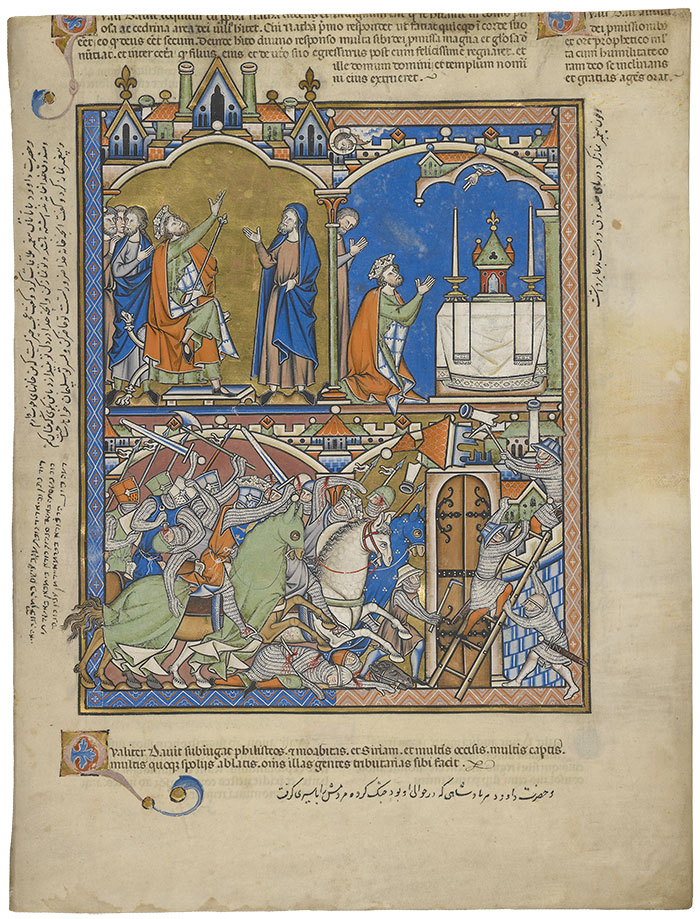
Building Plans, David is Satisfied, Syria Subdued
Old Testament Miniatures with Latin, Persian, and Judeo-Persian inscriptions
Purchased by J.P. Morgan (1867–1943) in 1916
Building Plans
Dissatisfied with the tabernacle he has built for the Ark of the Covenant, David consults with the prophet Nathan. The king points to the ornate roof of his home, questioning if it is right that the Ark should rest in a shelter poorer than his own house. The Lord speaks to David through Nathan, revealing that the building of the new Temple shall fall not to David but to his son, Solomon. (2 Kings 7:2–13)
David is Satisfied
David accepts this judgment and gives thanks in the tabernacle for the Lord's many blessings. (2 Kings 7:18–29)
Syria Subdued
The Israelite conquest continues; David destroys Hadadezer, king of Zobah, and subdues his Syrian allies. As David pursues Hadadezer, Israelite forces lay waste to Damascus. (2 Kings 8:3–6)
Folio 40r (Latin)
Upper left: How David talked to Nathan the prophet, saying that it was disgraceful that, while he dwelt in a house of cedar, the ark of God dwelt in an unworthy house. At first, Nathan told him to do what he had in his heart, for the Lord was with him. Then, a divine response having been obtained, he announced to him many and glorious promises of God, and among other things that a son would come out of his loins who would reign most happily after him and would build a house for God and a temple for his name. (2 Samuel 7: 1–17)
Upper right: How, having heard God’s promises from the prophetic mouth, David bends down before God with great obedience, giving thanks and praying. (2 Samuel 7: 18–29)
Lower half: How David subdues the Philistines and the Moabites, having killed many, having captured many, and having taken much booty, and makes them pay taxes to him. (2 Samuel 8: 1–8)
Folio 40r (Persian)
Upper left margin: His Excellence David met with Natan [Nathan] the prophet and said, "Is it not strange that I own fair houses and the Ark of God remains without a house? Pray, and whatever God inspires you, tell me to do accordingly." The prophet prayed and said, "Whatever is necessary [for] the house of God, prepare for it, and your son, Solomon, shall build it."
Upper right margin: Thus the prophet prostrated before the Ark and raised his hands in prayer.
Lower half: And His Excellence David fought every king in his environs and captured their people.
Folio 40r (Judeo-Persian)
Lower left margin: David said to Nathan the prophet, "It is a strange thing that I dwell in good houses while God’s Ark is homeless; pray you to God, whatever He commands thus shall I do."
Content consultant: Richard Leson
Persian translated by Sussan Babaie
Judeo-Persian translated by Vera Basch Moreen
Latin translation by Eran Lupu
After the commentary volume accompanying the Fine Art Facsimile edition by Faksimile Verlag Luzern
MS M.638, fol. 40v
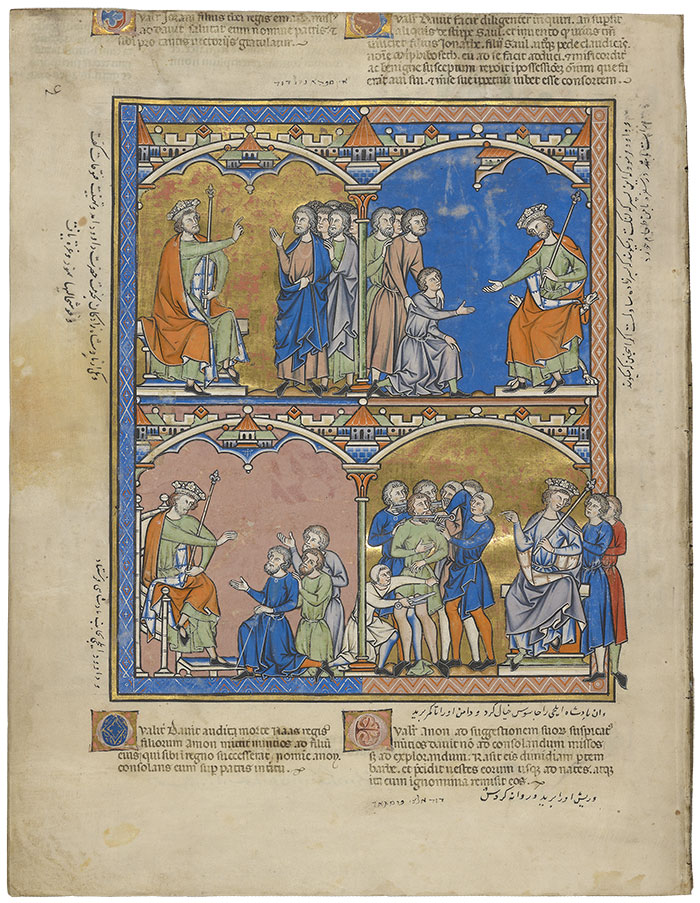
David's Command to Ziba, David's Great Charity, Diplomacy, Shameful Treatment
Old Testament Miniatures with Latin, Persian, and Judeo-Persian inscriptions
Purchased by J.P. Morgan (1867–1943) in 1916
David's Command to Ziba
David learns from Ziba, a former servant of Saul, that a member of Saul's house still lives. He is the crippled Mephibosheth, Jonathan's son. David orders Ziba to fetch him. (2 Kings 9:2–5)
David's Great Charity
Ziba presents Mephibosheth, Jonathan's son, to the king. David takes his hand and swears to Mephibosheth that he will always eat at the king's table. Moreover, the king once more sets Ziba and his house under Mephibosheth, to insure that Jonathan's progeny will thrive. (2 Kings 9:6–7)
Diplomacy
The king of Ammon has died, and his son has succeeded him. David, who was once allied with the king, sends messengers to show his good will toward the new ruler. (2 Kings 10:1–2)
Shameful Treatment
David's envoys arrive in Ammon to offer his friendship to Hanun, the new king. Hanun's servants, suspicious of David's intentions, persuade the king that David has sent his men to spy. Hanun thus shamefully orders that half of each man's beard be cut off and their clothes cut to reveal their nakedness. (2 Kings 10:3–4)
Folio 40v (Latin)
Upper left: How, sent to David, Joram, the son of Toi, the king of Hamath salutes him and congratulates him on his great victories. (2 Samuel 8: 9–10)
Upper right: How David devised that it be diligently inquired if anyone of the house of Saul had survived. Once it was found that one of the sons of Jonathan, Saul’s son, Mephibosheth by name was still alive, and that both his feet were lame, David has him brought to him, talks to him mercifully and kindly and reinstates him over all of his grandfather’s properties. He also orders him to eat at his table perpetually. (2 Samuel 9)
Lower left: How, upon hearing about the death of Nahash, the king of the children of Ammon, David sends messengers to his son, Hanun by name, who had succeeded him, consoling him for his father’s death. (2 Samuel 10:1–2)
Lower right: How Hanun, who, following his men’s suggestion, suspected that David’s messengers were sent not to console him but to spy, shaved off one half of their beards and cut away their clothes up to their buttocks and thus sent them back disgracefully. (2 Samuel 10: 3–4)
Folio 40v (Persian)
Persian foliation: 4
Upper left margin: One of the princes came to His Excellence David and congratulated him on the conquests and was joyous and received honor.
Upper right margin: David said that, "This boy is lame and is said to be the grandson of Saul. If what they say is true, he shall dine at my table."
Lower left margin: David sent an ambassador to a king.
Lower right, above and below Latin inscription: That king assumed that the ambassador was a spy and cut off his skirt to the waist, cut his beard, and sent him off.
Folio 40v (Judeo-Persian)
Upper half, middle: These pages [belong] to the Tale of David.
Lower right, beneath Latin, left: David sends an ambassador.
Italicized words are in Hebrew.
Content consultant: Richard Leson
Persian translated by Sussan Babaie
Judeo-Persian translated by Vera Basch Moreen
Latin translation by Eran Lupu
After the commentary volume accompanying the Fine Art Facsimile edition by Faksimile Verlag Luzern
MS M.638, fol. 41r
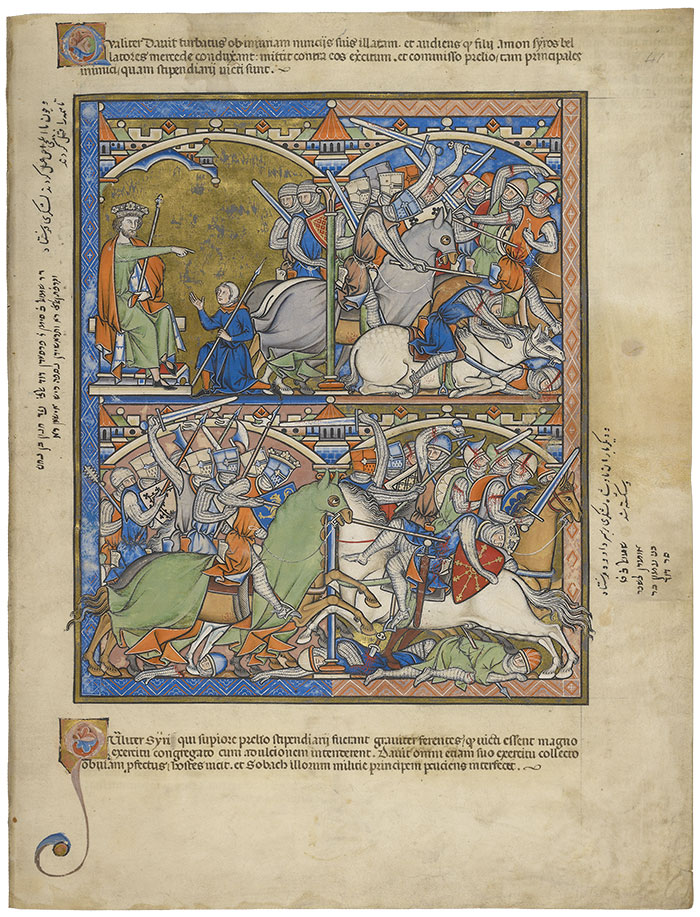
David's Wrath, The Syrians Rally and Are Defeated
Old Testament Miniatures with Latin, Persian, and Judeo-Persian inscriptions
Purchased by J.P. Morgan (1867–1943) in 1916
David's Wrath
A messenger returns with news of the shameful treatment that David's envoys have received at the court of the Ammonite king, Hanun. Hanun, confident that David will attempt to avenge the indignity, hires thousands of Syrian mercenaries to strengthen the Ammonite army. It is to no avail, however, as Joab shortly leads the Israelites into battle and defeats the enemy. In this scene, as the last of the Israelite army rides forth, Joab lands a crushing blow with a battle axe that fells an enemy rider and his horse. (2 Kings 10:6–14)
The Syrians Rally and Are Defeated
Ashamed of their loss to Israel, the Syrians assemble a great army; men have come from across the Euphrates to join Shobach, commander of the Syrian army. David orders the Israelite army across the Jordan and engages the enemy head on. In the heat of battle, David encounters Shobach and runs him through with a spear; in total, forty-thousand Syrian soldiers are slain. (2 Kings 10:15–18)
Folio 41r (Latin)
Upper half: How David, disturbed by the injury done to his messengers and hearing that the children of Ammon had hired Syrian warriors, sent his army against them. A battle broke out and the principle enemy was defeated together with its mercenaries. (2 Samuel 10: 5–14)
Lower half: How the Syrians who were mercenaries in the former battle were vexed at their defeat. When they had gathered an army and were intending to take vengeance, David went to meet them, defeated the enemies, and struck and killed Sobach, the captain of their army. (2 Samuel 10: 15–18)
Folio 41r (Persian)
Upper left margin: Since they treated the ambassador in this manner, he [David] dispatched an army which slew them all.
Lower right margin: Once again, that king unleashed an army against David and was defeated.
Folio 41r (Judeo-Persian)
Left margin, middle: In Samuel 2, chapter 10, it is described [how] David sent an ambassador to Hanun b. Nahash and the capture of the ambassador and the shaving off of half of his beard.
Lower right margin, furthest right: Samuel 2, chapter 9, the arrival of the Ammonite army against David.
Content consultant: Richard Leson
Persian translated by Sussan Babaie
Judeo-Persian translated by Vera Basch Moreen
Latin translation by Eran Lupu
After the commentary volume accompanying the Fine Art Facsimile edition by Faksimile Verlag Luzern
MS M.638, fol. 41v
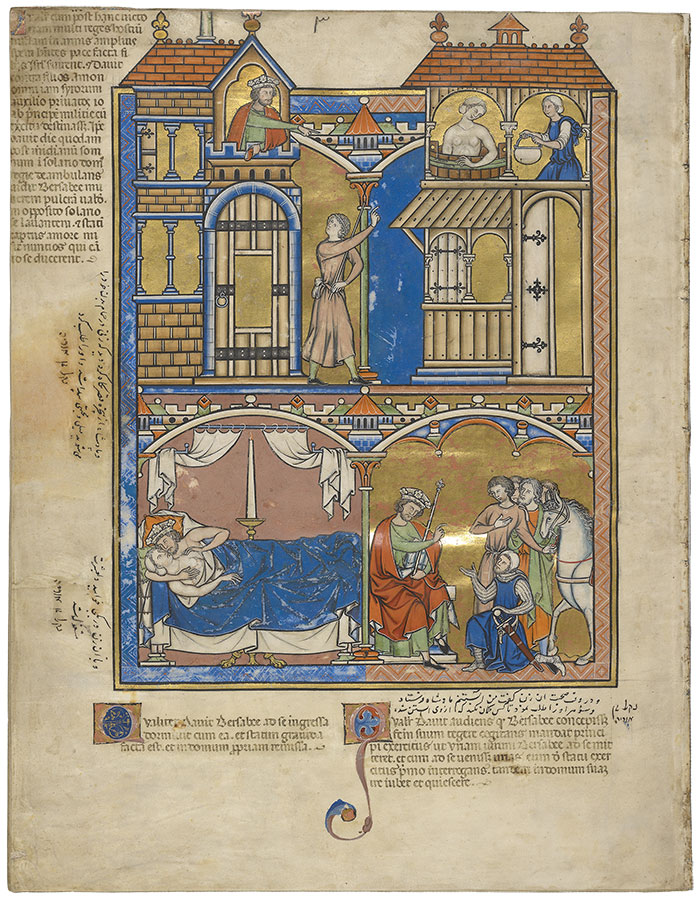
David's Lust, Adutlery, Damage Control
Old Testament Miniatures with Latin, Persian, and Judeo-Persian inscriptions
Purchased by J.P. Morgan (1867–1943) in 1916
David's Lust
The stage is set for David's greatest sin. One evening, from the roof of his palace, the king spies a lovely woman at her bath. Overcome with lust, he sends a messenger to discover her identity and learns that she is Bathsheba, wife of Uriah the Hittite. (2 Kings 11:2–4)
Adutlery
David takes Bathsheba to bed, and she conceives a son by him. (2 Kings 11:4–5)
Damage Control
Joab is summoned and ordered to fetch Uriah from the Israelite camp. David orders the soldier to return home to his wife, reasoning that if Uriah presently lays with Bathsheba, no one can accuse her of infidelity when her child is born. (2 Kings 11:6)
Folio 41v (Latin)
Upper half: How, when after this victory many enemy kings had no hope left in arms, made peace with the children of Israel, and were serving them, and when David had sent the army and Joab, its captain against the children of Ammon, by now deprived of their Syrian auxiliary forces, it happened one day that David was walking, after his midday sleep in a balcony in the palace, when he saw Bathsheba, a beautiful woman indeed, washing herself in a balcony over against him. Thereupon he fell in love with her and sent messengers to bring him. (2 Samuel 11:1–4)
Lower left: How when Bathsheba had come to him, David slept with her and immediately she was impregnated and sent back to her own house. (2 Samuel 11:4–5)
Lower right: How upon hearing that Bathsheba had conceived, David, intending to conceal his deed, ordered the captain of the army to send to him Uriah, Bathsheba’s husband. When Uriah had come to him, he first asked him about the state of the army, and then ordered him to go home and lie down. (2 Samuel 11: 5–8)
Folio 41v (Persian)
Persian foliation: 3
Upper left margin: The king looked out of the window of the castle. He saw that a woman was washing her body in the bathhouse. Desire and love surfaced [in him] and he summoned her.
Lower left margin: And he slept somewhere with that woman and engaged in intercourse.
Lower right: When conversing, the woman said, "I am pregnant."
The king sent for her husband to summon him so that no one would imagine that she had conceived from him.
Folio 41v (Judeo-Persian)
Upper left margin, furthest left: The Tale of Uriah’s wife.
Lower left margin, furthest left: The Tale of Uriah’s wife.
Lower right, furthest right—small blurb: The Tale of Uriah’s wife.
Content consultant: Richard Leson
Persian translated by Sussan Babaie
Judeo-Persian translated by Vera Basch Moreen
Latin translation by Eran Lupu
After the commentary volume accompanying the Fine Art Facsimile edition by Faksimile Verlag Luzern
MS M.638, fol. 42r
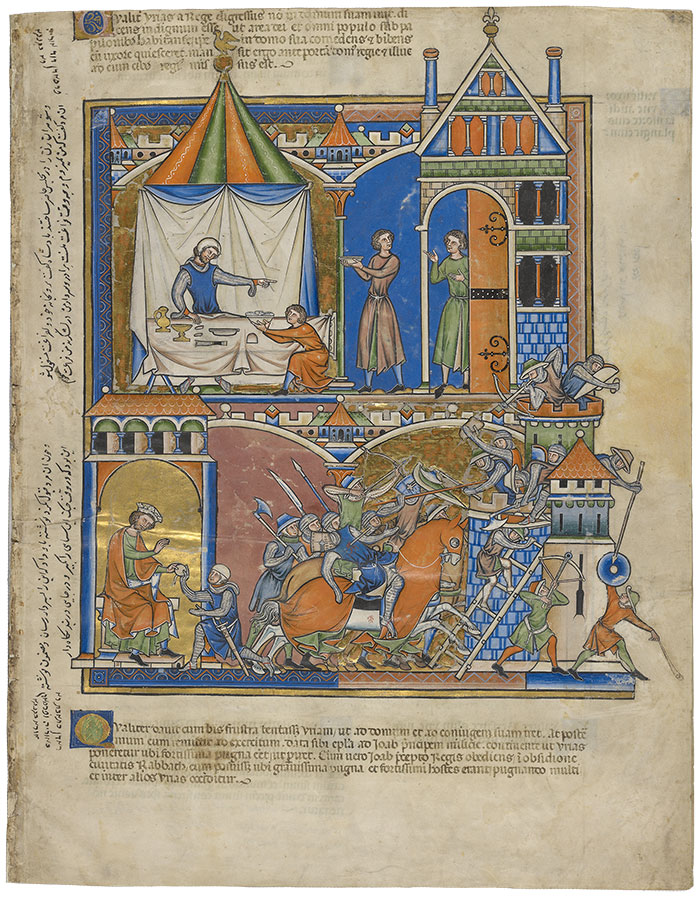
Uriah Refuses to Return Home, Uriah is Slain
Old Testament Miniatures with Latin, Persian, and Judeo-Persian inscriptions
Purchased by J.P. Morgan (1867–1943) in 1916
Uriah Refuses to Return Home
Uriah will not obey David's orders to return home, for to do so in a time of war would bring shame upon him. He sets up his eagle-topped pavilion before the king's house and enjoys a rich feast provided by the king. David's grand doorway is crowned by a finial topped by a royal fleur-de-lis. (2 Kings 11:7–9)
Uriah is Slain
David, unable to convince Uriah to return home, sends him back to the Israelite camp with a sealed letter for Joab. Joab is instructed to reassign Uriah to the fiercest part of the battle. Uriah is posted to the front lines of the Israelite siege at Rabbah, where valiant men defend the citadel. There he is struck by a bolt fired from an enemy crossbow and killed. (2 Kings 11:14–17)
Folio 42r (Latin)
Upper half: How, after he had departed from the king, Uriah did not go home, saying that it was disgraceful that while the ark of God and all the people were dwelling in tents he was eating and drinking at home and lying down with his wife. Therefore he stayed in front of the palace’s gate and food was sent to him from the king. (2 Samuel 11: 8–9)
Lower half: How, when David had twice attempted in vain to have Uriah go to his house and wife, he then sent him back to the army with a letter to Joab, the army’s captain, ordering to assign him to the place the battle was most fierce, that he might die. When Joab, in obedience to the king’s command, had indeed assigned him to the siege of Rabbath where the battle was most fierce and the enemy most strong, Uriah and others died fighting. (2 Samuel 11: 10–17)
Folio 42r (Persian)
Upper left margin: They brought the woman’s husband to the court. The king said, "Go to your house and be at leisure." The man said, "I shall not go and this is not my leisure time [when] my brother and commander are in the army; I want not leisure."
Lower left margin: And when the man refused, he [David] gave him a letter to deliver to the commander. And the letter’s content was this, "Take this soldier during the war and keep him bound somewhere."
Folio 42r (Judeo-Persian)
Upper left margin, corner: David’s sending of Uriah off to war.
Lower left margin, bottom: [David’s] giving of the letter to Uriah and sending him off to war.
Content consultant: Richard Leson
Persian translated by Sussan Babaie
Judeo-Persian translated by Vera Basch Moreen
Latin translation by Eran Lupu
After the commentary volume accompanying the Fine Art Facsimile edition by Faksimile Verlag Luzern
MS M.638, fol. 42v
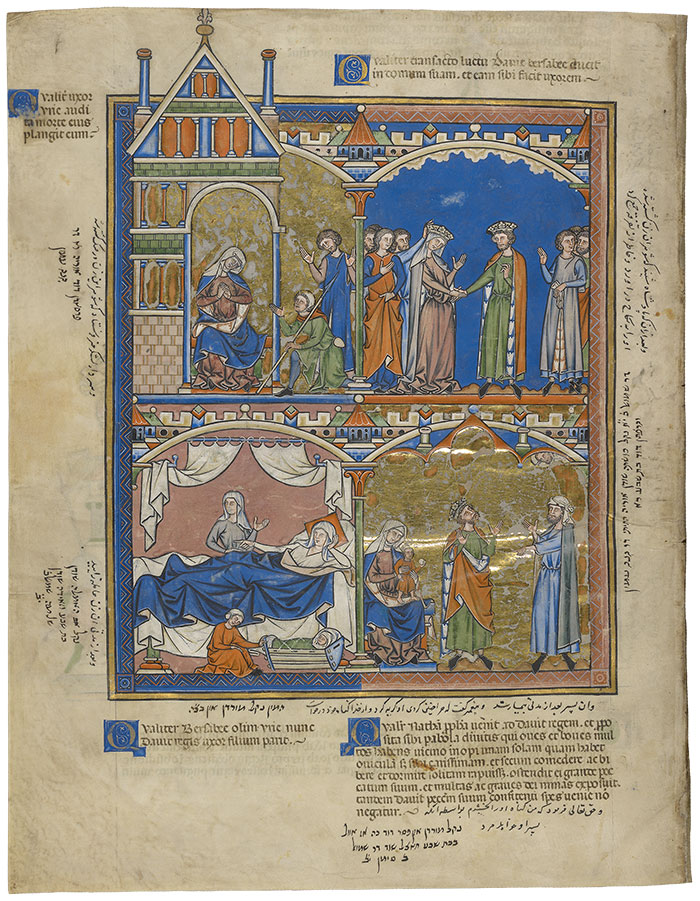
Bathsheba is Informed of Uriah's Death, David Weds Bathsheba, A Son is Born, The Lord is Displeased with David
Old Testament Miniatures with Latin, Persian, and Judeo-Persian inscriptions
Purchased by J.P. Morgan (1867–1943) in 1916
Bathsheba is Informed of Uriah's Death
A messenger arrives in Jerusalem with news of Uriah's death. Bathsheba and a member of her household express their great dismay. In this illustration, the outline of Bathsheba's house has been traced from that of David's palace on the preceding page. (2 Kings 11:26)
David Weds Bathsheba
The period of mourning having passed, David brings Bathsheba to his house and weds her. The thirteenth-century painter has depicted Bathsheba crowned like a contemporary queen. (2 Kings 11:27)
A Son is Born
Bathsheba gives birth to a son. As Bathsheba directs a maidservant from her bed, another woman rocks the infant in his cradle. (2 Kings 11:27)
The Lord is Displeased with David
David's misdeeds have enraged the Lord. Bathsheba, holding her newborn son in her lap, listens as the priest Nathan reproves David on the Lord's behalf. Because of his sins, strife will arise from within David's own household, and his infant son will die. The king begs the Lord to spare the child, but the Lord will not listen. (2 Kings 12:7–14)
Folio 42v (Latin)
Upper left: How, upon hearing about the death of her husband, his wife mourns for him. (2 Samuel 11: 26)
Upper right: How, when the mourning was over, David led Bathsheba to his house and made her his wife. (2 Samuel 11: 27)
Lower left: How Bathsheba, once Uriah’s wife, now king David’s, gives birth to a son. (2 Samuel 11:27)
Lower right: How Nathan the prophet came to David and told him a fable about a rich man who, although having many sheep and cattle, had deprived his poor neighbor of his sheep, little indeed, but dearly beloved and used to eat and drink and sleep with him. Having thus made the seriousness of his sin manifest to him, he revealed God’s many grave threats to him. At length, David confesses to his sin and hope of forgiveness is not denied to him. (2 Samuel 12: 1–14)
Folio 42v (Persian)
Persian foliation: 2
Upper left margin: The commander dispatched the news that the woman’s husband has been killed in battle.
Upper right margin: After the king heard that the woman’s husband was dead, he married her and his mind was free of discord.
Lower left margin: After sometime, that pregnant woman delivered.
Lower right, above and below Latin inscription: [Their] son fell ill after sometime and the prophet said, "Why have you acted thus?" He [David] wept and implored God [forgiveness] for his sin and God the Exalted said, "I have forgiven his sin because his son shall die."
Folio 42v (Judeo-Persian)
Upper left margin, furthest left: David’s sending Uriah off to war with the Ammonites.
Lower right margin: In Samuel 2, chapter 11, [is related] the tale of the death of Uriah the Hittite in the war against the Ammonites and David’s marrying of Bathsheba.
Lower left margin, furthest left: The tale of Bathsheba’s pregnancy and the birth of Solomon.
Lower left, above Latin: The tale of the death of that child.
Lower right, beneath Persian: The tale of the death of that son who was first born to David and Bathsheba [as it is written] in Samuel 2, chapter 12.
Content consultant: Richard Leson
Persian translated by Sussan Babaie
Judeo-Persian translated by Vera Basch Moreen
Latin translation by Eran Lupu
After the commentary volume accompanying the Fine Art Facsimile edition by Faksimile Verlag Luzern
MS M.638, fol. 43r
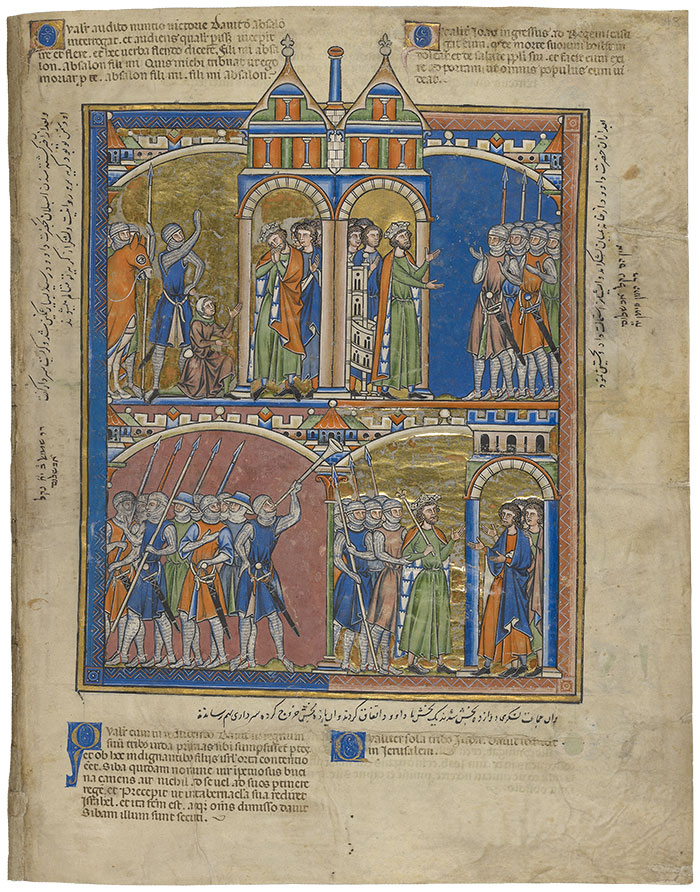
Joab Reproaches David, David Greets the People, Sheba's Rebellion, Judah Remains Loyal
Old Testament Miniatures with Latin, Persian, and Judeo-Persian inscriptions
Purchased by J.P. Morgan (1867–1943) in 1916
Joab Reproaches David
The Rebellion crushed, David and his people return to Jerusalem. A Cushite arrives at the gates with the news of Absalom's death, and the king is greatly distraught. Joab, wearing a blue tunic, is angered to find the king so aggrieved and condemns David. He is weary of the compassion his lord has shown to his enemies over the years. Rather than mourn the traitor Absalom, Joab suggests, give praise to the household and servants who have remained loyal. (2 Kings 18:32 – 2 Kings 19:6)
David Greets the People
David is shamed by Joab's words. Servants set up an ivory throne in the gateway of the palace, and the king greets the people, assuring them that all is well. (2 Kings 19:7–8)
Sheba's Rebellion
Sheba, the son of Bichri, a Benjamite, sounds his trumpet and rallies men of Israel to his side. He labels David a usurper and conspires to wrest the throne from him. (2 Kings 20:1–2)
Judah Remains Loyal
The men of Judah, David's oldest supporters, will not abandon their king for the greedy Sheba. The loyal supporters rally to David in Jerusalem. (2 Kings 20:2–3)
Folio 43r (Latin)
Upper left: How, when Tamar had come to Amnon, her brother, he ordered those who were standing by her to leave. When they had left, he ravished her violently, although she was asking him not to do it but rather, as his wish would not be denied, to ask father to have her for his wife. (2 Samuel 13: 8–14)
Upper right: How Amnon, the incest committed, hated his sister so much that his hatred was greater than his love. Wherefore he ordered at once that she be taken out of his bed chamber and that the door be locked. She went out, weeping and crying, and found her brother, Absalom, who consoled her, telling her not to lament nor to afflict herself on account of what her brother had wished to do. (2 Samuel 13: 15–20)
Lower half: How, in the house of her brother, Absalom, Tamar is consumed by tears and sorrow remembering her injury. Now, Absalom, having hidden his sorrow for two years, at last called his father and brothers to a feast. When his father had refused to go, but, pressed by Absalom, allowed Amnon, his firstborn to go there, in the middle of the feast Absalom ordered that his brother be killed. (2 Samuel 13: 20–29)
Folio 43r (Persian)
Upper left margin: Here, the son of David pretended to be ill and when the girl brought drink and food, he took hold of her and they lay together in pleasure.
Upper right margin: And after he separated from the girl, he became indignant of her and affection turned into enmity and he threw the girl out of the house.
Lower right margin: The girl had a brother and she told [him] her story. Enmity surfaced in his heart and he planned a feast. [The brother] cut some stalks of wheat and began feasting and he invited His Excellence David to the banquet. David declined. He said, "Send your son." He accepted. And the girl’s brother set up his own servant [saying], "When the son of David sits at the meal, strike a dagger in his belly and kill him." The servant did as he had been told.
Folio 43r (Judeo-Persian)
Content consultant: Richard Leson
Persian translated by Sussan Babaie
Judeo-Persian translated by Vera Basch Moreen
Latin translation by Eran Lupu
After the commentary volume accompanying the Fine Art Facsimile edition by Faksimile Verlag Luzern
MS M.638, fol. 43v
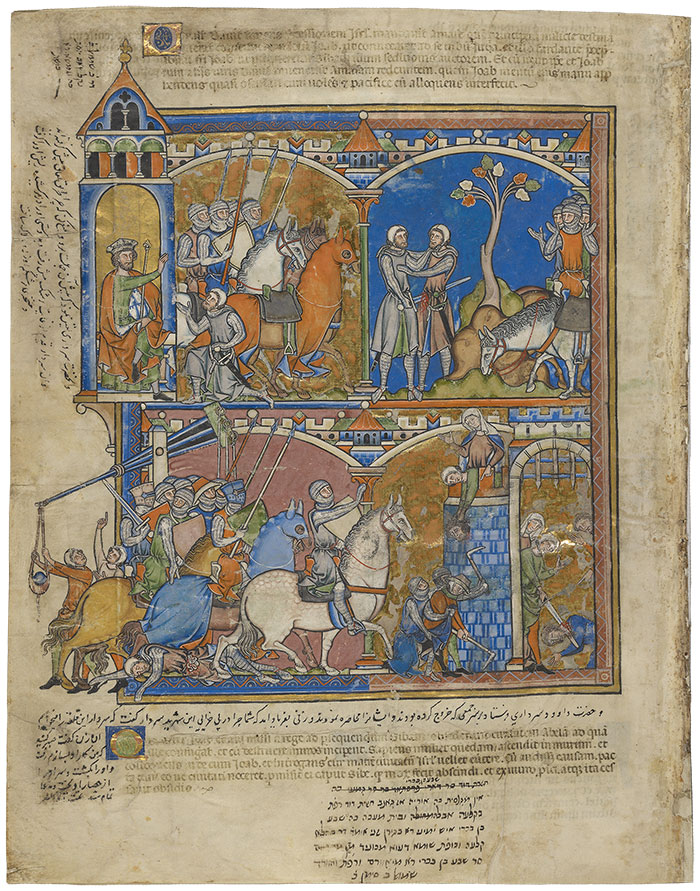
David Orders the Destruction of Sheba, Joab Slays Amasa, Joab Brokers Peace
Old Testament Miniatures with Latin, Persian, and Judeo-Persian inscriptions
Purchased by J.P. Morgan (1867–1943) in 1916
David Orders the Destruction of Sheba
David chooses Amasa to lead an assault against Sheba, but loses patience when his new commander is late. Abishai, Joab's brother, is summoned and instructed to pursue the enemy. (2 Kings 20:4–10)
Joab Slays Amasa
At Gibeon, Joab encounters Amasa, the new commander of David's army, and, thus, Joab's rival. Joab takes Amasa's chin in his hand as if to embrace and kiss him, but instead thrusts his sword through his rival's belly. (2 Kings 20:9–10)
Joab Brokers Peace
Joab pursues Sheba to the city of Abel, where the traitor and his forces have taken refuge. In the foreground lies the slain Amasa, his bowels spilling forth. As the army prepares to loose a trebuchet, Joab is hailed by an elderly woman of the city. She appeals to the commander's mercy and strikes a bargain. She will produce the head of the traitor Sheba if Joab will spare the city. Moments later, the traitor is decapitated and his head displayed to the soldiers. The siege and the rebellion are at an end. (2 Kings 20:15–22)
Folio 43v (Latin)
Upper left: How the firstborn killed, all the king’s sons flee. (2 Samuel 13: 29)
Upper right: How a rumor reached the king that Absalom had killed all of his sons. Upon hearing this, he and those who were with him tore their clothes and grieved inconsolably. (2 Samuel 13: 30, 31)
Lower half: How, having slain his brother, Absalom fled to Talmai, the king of Geshur and spent three years there. (2 Samuel 13: 37–38)
Folio 43v (Persian)
Upper left margin: Since such a deed had issued from the son of David, his brothers gathered together; they mounted horses and set out to flee.
Upper right margin: After that, news reached David that the brother had killed those sons. He was exceedingly saddened by this word.
Lower left margin: This son who killed the brother was called Absalan [Absalom]. After killing the brother, he took refuge with the king of the idolaters and remained there for three years.
Folio 43v (Judeo-Persian)
Content consultant: Richard Leson
Persian translated by Sussan Babaie
Judeo-Persian translated by Vera Basch Moreen
Latin translation by Eran Lupu
After the commentary volume accompanying the Fine Art Facsimile edition by Faksimile Verlag Luzern
Patronage
Although the Crusader Bible has long been associated with Louis IX and the decade of his Seventh Crusade (1244–1254), there is no documentary evidence that it was actually commissioned by him. The Crusader Bible was probably made in Paris and can be seen in the context of his other commissions and crusading activities. Circumstantial evidence may point to his patronage. Stylistic and iconographic parallels occur in the Sainte-Chapelle, which was built to house relics of Christ’s Passion, notably the Crown of Thorns, and was consecrated on April 26, 1248. .Louis was compared to Solomon, the Sainte-Chapelle to Solomon’s Temple, and the Grande Châsse containing the relics became the Ark of the New Covenant. Paris was regarded as the New Jerusalem, and the French as the chosen people. In 1239 Pope Gregory IX’s crusader propaganda already compared the people of Judah to Louis’s Christian Kingdom. Before that Capetian rulers saw themselves as Christian successors to the God-chosen kings of Judah, claiming divine sanction for their “sacred” kingship. In the manuscript, those biblical kings wear crusader armor and have fleur-de-lis crowns and scepters, reinforcing the associations and royal patronage. The size and luxury of the book also suggest high patronage, as do the considerable intellectual, artistic, and financial resources needed to plan and execute this unrivaled Gothic masterpiece. The manuscript did not originally have captions, but Louis knew the Old Testament stories very well because Blanche of Castile, his mother, had a profusely illustrated Moralized Bible made for his instruction.
About the Book
The Crusader Bible does not illustrate the entire Bible, but only portions of Genesis, Exodus, Joshua, Judges, Ruth, and Samuel. The picture book’s forty-six folios depict some 346 episodes, and about forty percent of the pages are devoted to David’s life. The stories focus on important heroes in the history of Israel—Abraham, Joseph, Moses, Joshua, Samson, Samuel, Saul, Jonathan, and David, offering models of kingship to be avoided or followed. The stories are not set in the Holy Land, but in the milieu of thirteenth-century France. The miniatures are unprecedented in their naturalism, monumentality, breadth of execution, and narrative detail. The story-telling skills of the artists surpass those in contemporary manuscripts, and the dynamic depictions of battles and meticulously portrayed armor betray first-hand experience. Originally there were no captions, so narrative clarity was achieved by cleverly designed architectural settings, costumes, and gestures. Originally there were forty-eight leaves: forty-three are in the Morgan (MS M.638), two (fols. 43, 44) are in the Bibliothèque nationale de France, Paris (MS. Nouv. Acq. Lat. 2294), one (fol. 45) is in the J. Paul Getty Museum, Los Angeles (83.MA.55), and two are missing.
Artists
In the thirteenth century, manuscript production passed from the monastery to secular shops, and large projects, such as the Moralized Bibles, required the collaboration of several shops and artists. By the middle of the century, Paris became the capital of manuscript illumination in France, and Dante later referred to “that art which in Paris they call illumination.” Even though seven artists participated in the manuscript, the librarian or cleric who devised the pictorial program imparted an overall stylistic unity. A master artist can be distinguished, and he was responsible for nearly forty percent of the miniatures (fols. 12–29). He was a master of naturalistic narrative detail, dynamic battle scenes, and elegant drawing, and he never used gold backgrounds. The project manager, as was customary, assigned gatherings (the units of work) to the artists involved. The master artist did gatherings III–V, the middle part of the book. Three others were given gatherings I and II. The first did folios 1, 2, and 5–8; the second, fols. 3 and 4; the third, fols. 9–11. The last three artists were each assigned a full gathering: VI (fols. 30–35), VII (fols. 36–41), and VIII (fols. 42–46). Just who the artists were remains a mystery for no works by them are known other than the Crusader Bible, their masterpiece. It has been suggested, due to North French stylistic ingredients, that they might have been trained there, but some of them were also familiar with Parisian Moralized Bibles.
Inscriptions
The Latin, Persian, and Judeo-Persian Inscriptions
The Crusader Bible was originally a picture book. Subsequent owners, however, felt a need to have the subjects identified. After the death of Louis IX (1270), the manuscript went to Italy, where the Latin inscriptions were added in the fourteenth century. Fourteen of the scenes were incorrectly identified. After Shah ‘Abbas received the book in Isfahan as a diplomatic gift in 1608, he had the Persian inscriptions added. After Afghans sacked Isfahan and its Royal Library in 1722, the book fell into the hands of a Persian-speaking Jew, who added the Judeo-Persian inscriptions. These inscriptions did not depend upon each other, and only the Judeo-Persian inscription correctly identified the episode in which Jephthah agreed to sacrifice the first person who met him on his victorious return to Maspha, who was his only daughter (fol. 13). The Latin inscription connected the episode with Gideon, and the Persian inscription mistakenly said it was Gideon’s daughter. English translations of all the inscriptions can be found in this online exhibition.
Provenance
Although there are many gaps in its history, few manuscripts can claim such a fascinating and diverse provenance. Assuming that Louis IX (1214–1270) owned the manuscript, it may have passed to his younger brother, Charles of Anjou (1226–1285), who conquered Naples in 1266 and founded the Angevin Dynasty. Sometime after his death, probably in the fourteenth century, Latin captions were added to the manuscript.
CRACOW: The first documented owner, however, was Cardinal Bernard Maciejowski (1548–1608), Bishop of Cracow, who may have acquired the manuscript in Italy while studying for the priesthood or when he went there on behalf of Emperor Sigismund III (r. 1587–1632). He was elevated to cardinal by Pope Clement VIII in early 1604. According to the inscription on fol. 1, “Bernard Maciejowski, Cardinal Priest of the Holy Roman Church, Bishop of Cracow, Duke of Siewierz, and Senator of the Kingdom of Poland with sincere wishes offers this gift to the supreme King of the Persians at Cracow the mother city of the kingdom of Poland on the seventh of September 1604.” (translation by Daniel Weiss). The unnamed monarch would have been Shah ‘Abbas the Great (1571–1629), who became Shah at age sixteen in 1587. In 1598 he moved his capital from Qazvin to Isfahan and created one of the most beautiful cities in the world. The gift was occasioned by Pope Clement VIII’s papal mission to Shah ‘Abbas to secure tolerance toward Christians and to seek help against the Turks, their common enemy. Because it was too dangerous to go by sea, they went by land, stopping in Cracow. When asked for a suitable diplomatic gift, the cardinal offered the Crusader Bible.
ISFAHAN: After a delay due to Pope Clement VIII’s death (March 3, 1605) and that of his successor Leo XI (April 27, 1605), the papal mission returned to Cracow for new presentation letters from Paul V, and finally, after three and one-half years, reached Isfahan on December 2, 1607. The manuscript was formally presented to Shah ‘Abbas on January 3, 1608. Cardinal Maciejowski did not live long enough to receive a thank-you letter, as he died sixteen days later. According to a printed account of the trip, the Shah did convey thanks to the mission and “turned the sacred pages with care and admiration.” Thereafter, he requested one of the missionaries to explain the meaning of the pictures and had the Persian inscriptions added. He also added his seal of ownership on folio 42v, inscribed with the words “Shah in Shah ‘Abbas” (‘Abbas, King of Kings). The versos of the leaves were then foliated in Arabic numerals starting from the back as if it was a Persian manuscript. All forty-eight leaves were then present. Shortly thereafter some leaves depicting the story of Absalom’s rebellion were removed and a new foliation added as well as a note stating there were forty-three leaves.
It has been suggested that the leaves were removed because they might provide an inappropriate model for the Shah’s son, even though the death of Absalom is depicted. On the other hand, Shah ‘Abbas might have removed them in 1615, having expressed great regret and remorse following the execution of his son and crown prince, Mohammud Baqir Mirza, for treason. The Absalom story could have reminded him of his own deed, the result of unwarranted suspicion. After the death of Shah ‘Abbas in 1629, the throne and probably the manuscript passed to his grandson Shah Safi and then to his son Shah ‘Abbas II.
At a later date, perhaps when the Afghans conquered Isfahan in 1722, the royal library and treasury were looted. At some point, the manuscript fell into the hands of a Persian Jew, who had the Judeo-Persian inscriptions added. He apparently knew some of the Old Testament stories better than the Christian cleric who had added the Latin inscriptions, since he corrected them.
CAIRO: The book eventually made its way to Cairo, where it was purchased by John d’Athanasi, a Greek who secured Egyptian antiquities for English collectors, including Lord Amherst of Hackney, whose papyri collections were purchased by John Pierpont Morgan in 1912. Athanasi had the remarkably good fortune of buying the manuscript for three schillings.
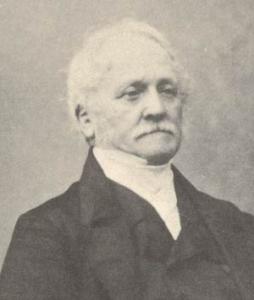
Sir Thomas Phillips, ca. 1860
LONDON: In 1833 Athanasi sold the manuscript at Sotheby’s (March 15, lot 201) in an auction consisting primarily of Egyptian antiquities, such as papyri and splendid mummies. The manuscript brought 255 guineas and was purchased by the London dealers Payne and Foss, who in turn sold it to Sir Thomas Phillipps (1792–1872), the self-proclaimed “perfect vello-maniac.” He bought anything on vellum and assembled some 60,000 manuscripts before his death. He made no plans specifically for the disposition of the collection. Thirlstaine House (Cheltenham) and its contents, including the manuscripts, were left in trust to Katherine (1823–1913), his youngest daughter and wife of Reverend John E. A. Fenwick (1824–1903). His will also gave, after Katherine, a life interest to her third son, Thomas Fitzroy Fenwick (1856–1938), who proved to be a good manager of the collection. Although the will prevented any books from being sold, judicial approval was given, because of financial need, to gradually sell items after 1885.
Once the doors were open, scholars and collectors were admitted. In 1899 Pual Durrieu regarded the Picture Bible as the pearl of the collection. Sotheby’s, on behalf of the Phillipps Trustees, offered the manuscript to Pierpont Morgan on December 14, 1910, for £10,000, saying that £6,000 had been offered by more than one party. It is not known if Morgan or Belle da Costa Greene ever saw the book itself or, understandably, thought the price excessive. It might have made a difference if the book had been associated with Louis IX as Morgan was fascinated by royal provenance and had purchased Louis’s Moralized Bible fragment in 1906. In any case, Morgan died on March 29, 1913, bringing all acquisitions to a halt.
Belle Greene was devastated by the death of her “Big Chief” and the uncertainty it brought for the future. The library and the collections were inherited by his son, John Pierpont Morgan, Jr., (1867–1943), who was not inclined at first, because of World War I, to make additions. But in the end, he decided that the library would continue and that Belle Greene would be retained as librarian. On July 22, 1915, she wrote to Quaritch, the London book firm, that Morgan would allow her to go on collecting after the war.
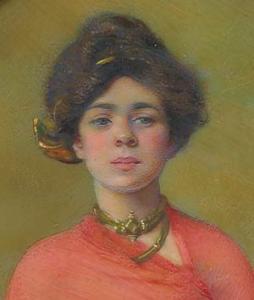
Belle da Costa Greene in Egyptian Costume. ca. 1910
NEW YORK: On November 21, 1916, although the war was not over, Belle Greene visited Fenwick and daringly bought the manuscript without Morgan’s approval for the same price at which it was offered to Pierpont six years earlier. Fenwick was taken aback when she accepted the asking price without hesitation. According to her friend, Anne Haight, who never finished her biography of Belle Greene, “She examined the manuscript, stuffed it at once into her enormous handbag, saying, ‘I’ll take it, you will receive a check.’” However, either Haight or Greene in relating the incident to her may have captured the spirit rather than the fact of the transaction, for Fenwick wrote to her on December 1, 1916, that the Court of Chancery sanctioned the sale of the manuscript, and that he was now free to turn it over to her representative when payment had been received. Belle Greene herself then wrote to Fenwick on January 3, 1917, that she was pleased that the manuscript had been “released.” She did, however, purchase it on her own initiative, not wanting to lose it a second time. But then she had to inform her boss of what she had done. The letter, dated November 24, three days after her visit to Fenwick, is a model of persuasiveness, making the manuscript seem like an irresistible bargain.
My dear Mr. Morgan,
On my visit to Cheltenham this week I purchased from the present owner, Mr. Fitzroy Fenwick, his famous 13 century French manuscript of the Bible Historiée, the finest example of French art of the period in private hands. It consists alas of only 43 leaves – there are two others in the Bibliothèque Nationale at Paris (now in course of publication by the Comte de la Borde) and one at Cambridge – for this latter single sheet they paid, several years ago, £300. I agreed to pay Fenwick £10,000 for his 43 leaves. [If one does the math, £300 times forty-three equals £12,900.]
The transaction makes me feel better about my ‘torpedoed ‘ letter of credit as Quaritch offered to try to obtain it for us for £15,000 plus his commission of 5% and Yates Thompson thought I would have to pay much more for it. Mr. Fenwick is coming to London to see me today, when we will arrange terms of payment and talk over 5 other manuscripts. I should like to have, or to have the promise of. If I had been able to stay here several weeks longer I know I could have bought every important manuscript in private hands in England. [Morgan must have been relieved that she was on the next boat home.] There was not time to get to the Duke of Northumberland’s collection (Duveen has just bought his Bellini.) but I may be able to do something by correspondence.
Sincerely, Belle Greene
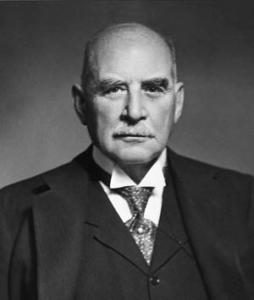
Jack Morgan
On the same day, Belle Greene received a letter from Sydney Cockerell stating that “the manuscript you were clever enough to secure in Cheltenham is an incomparable treasure and would be cheap at any price. I have long regarded it as the most covetable manuscript of the thirteenth century in private hands.” After she returned to New York she wrote (December 12, 1916) one of her longest letters to Cockerell, regretting she “did not carry you off with me as I did the Fenwick leaves.” Morgan, she said, was “very keen to see the manuscript but quite thoroughly approves of my purchasing it, which is a good omen (for me) for the future.” Morgan also expressed his approval in another way. In 1927 he produced a lavish facsimile of the Picture Bible as his Roxburghe Club obligation and hired Cockerell to do much of the commentary.
The acquisition of the Crusader Bible proved to be an important turning point in the history of the library. It was Morgan’s first great manuscript purchase, one that was followed by many others. In 1919 Belle Greene wrote to Edmund Dring of Quaritch that the present Mr. Morgan “is a continual joy to me as a collector. In his sense of appreciation, discrimination, of rapidly increasing knowledge and sure recognition of the best he will (I fear) soon surpass even his great father. He has a very fine eye and an astonishing memory, and, being a voracious reader, is appallingly knowledgeable. I doubt if there is today another collector his equal, in an all-round way.”
Belle Greene, of course, was hoping that the collections would be preserved through institutionalization, and her hopes were fulfilled when Morgan founded the library in 1924. One suspects that his early purchase of the Crusader Bible played a fundamental role in his vision of the library, to which he continued to make important contributions up to the time of his death. While he only added about 200 manuscripts to the collection, in terms of importance and quality, they certainly matched those of his father, who acquired about 600.
H.P. Kraus (Firm). Bibliotheca Phillippica : manuscripts on vellum and paper from the 9th to the 18th centuries from the celebrated collection formed by Sir Thomas Phillipps : the final selection., Frontispiece - Sir Thomas Phillips, ca. 1860. New York : H.P. Kraus, c1979.
Hills, Laura Coombs, 1859-1952. Miniature Portrait of Belle da Costa Greene in Egyptian Costume. ca. 1910. AZ164. Bequest of Belle da Costa Greene, 1950.
Photographic portrait of Jack Morgan. Credit line: The Pierpont Morgan Library, New York.
Photograph of John Pierpont Morgan, Jr., (1867-1943 by Fayer of Vienna and London, ca. 1930.
Technical Analysis of The Crusader Bible
This post was created by Elyse Driscoll, graduate intern from the Art Conservation Department at SUNY Buffalo State in consultation with Frank Trujillo, Associate Book Conservator.
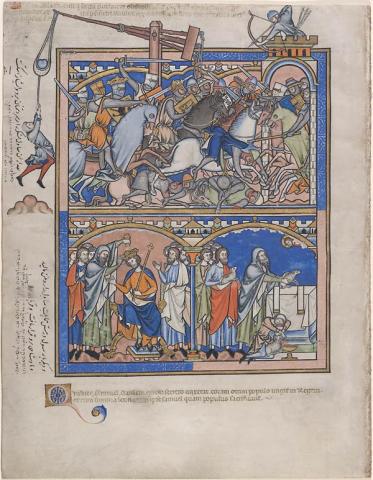 Saul Destroying Nahash and the Ammonites; Samuel Anoints Saul and Sacrifices to the Lord, from the Crusader Bible, ca. 1240s. Pigment, gold and ink on parchment. 390 x 300 mm. Purchased by J. P. Morgan, Jr. in 1916, MS M.638 (fol. 23v)
Saul Destroying Nahash and the Ammonites; Samuel Anoints Saul and Sacrifices to the Lord, from the Crusader Bible, ca. 1240s. Pigment, gold and ink on parchment. 390 x 300 mm. Purchased by J. P. Morgan, Jr. in 1916, MS M.638 (fol. 23v)Saul Destroying Nahash and the Ammonites; Samuel Anoints Saul and Sacrifices to the Lord, from the Crusader Bible, ca. 1240s. Pigment, gold and ink on parchment. 390 x 300 mm. Purchased by J. P. Morgan, Jr. in 1916, MS M.638 (fol. 23v)
Introduction
Despite a lack of documentary evidence, the Crusader Bible has long been associated with King Louis IX of France (1214–1270) and was most likely produced in Paris during the middle of the thirteenth century. At that time, manuscript production was carried out in a decentralized workshop. Specific tasks, such as parchment preparation, illumination, and bookbinding, were distributed among numerous artisans. Differences between the initial preparatory designs, which remain partially visible under the paint layer, and the final illuminations indicate that there was considerable freedom of execution afforded to both groups of draftsmen. Several distinct painting styles can be detected in the final illuminations, which suggest that they were created by up to seven different hands.
The Crusader Bible was originally conceived as a picture book depicting Old Testament stories in vivid detail, although the manuscript’s margins are now filled with ink inscriptions. The Latin, Persian and Judeo-Persian captions are all later additions that were made by subsequent owners and give insight into the manuscript’s history following the death of Louis IX.
To enhance our understanding of the Crusader Bible, the Thaw Conservation Center performed non-destructive analysis including X-ray fluorescence spectrometry and digital imaging techniques to characterize the pigments in folios believed to be executed by different illuminators. This post will introduce the analytical methods used and the fascinating information that the data revealed about the Crusader Bible.
X-Ray Fluorescence Spectrometry
X-ray fluorescence spectrometry (XRF) is a technique that can be used to identify the elemental composition of pigments. The instrument produces a beam of x-rays that interact with the pigment causing the elements present to emit secondary x-rays. These characteristic x-rays are collected by the spectrometer and displayed in a spectrum that indicates which elements are present. Based on the presence of certain elements, we can infer what pigment was used.
XRF does not always provide definitive information because many pigments share key elements. Furthermore, elements having a low atomic number, such as those found in organic pigments and natural dyes, will go undetected. Because of the limitations of XRF, this technique is often used in conjunction with additional analytical methods.
Digital Imaging
Each pigment consists of a different chemical compound, which will selectively absorb, fluoresce, transmit, or reflect radiant energy when exposed to a specific region of the electromagnetic spectrum. Only a narrow portion of the spectrum (400–700 nm) is visible to humans as light. Although ultraviolet radiation (100 - 400 nm) and infrared radiation (>700 nm) cannot be perceived with the human eye, a modified digital camera and a selection of filters can be used to record them visibly. To further characterize the pigments used in the Crusader Bible, the manuscript was imaged under ultraviolet, visible, and infrared radiation. The spectral responses from the pigments in the illuminations were compared to the spectral responses from known paint samples.
Longwave Ultraviolet Radiation
For this study, longwave ultraviolet radiation (UVA) was used to induce visible fluorescence. Many of the pigments used in the Crusader Bible absorb ultraviolet radiation. However, there are discreet areas in the folds of the clothing that fluoresce slightly. In these areas, the paint was applied as a glaze or a thin translucent layer. The pigment was probably bound in glair, a medium consisting of egg white, which fluoresces when exposed to ultraviolet radiation. The parchment support also fluoresces slightly.
Infrared Radiation
Infrared analysis can be used to detect drawings and inscriptions that have faded or have been erased or abraded, to reveal preparatory drawings under layers of opaque paint, to distinguish different formulations of writing inks, and to identify pigments. In the Crusader Bible, the Persian and Judeo-Persian inscriptions in the left margin of folio 23v were written in carbon black ink. This ink is very absorbent of infrared radiation and appears dark in the infrared image. The Latin inscriptions in the upper and lower margins were written with iron-gall ink, which transmits infrared radiation and is nearly invisible in the infrared image.
False Color Infrared
A false color infrared image can further assist with material identification. The image is prepared by importing the reflected infrared image into the visible image using Adobe Photoshop and following a specific channel-substitution scheme. The combination of infrared and visible absorbency properties results in distinctive “false” colors that facilitate pigment identification. Different pigments can have similar responses to ultraviolet, visible, and infrared radiation. Therefore, it is necessary to employ additional analytical techniques to identify materials.
Results
The digital imaging techniques and XRF analysis conducted in this study provided sufficient information to begin to characterize the pigments and ink inscriptions. The results indicate that the materials are as follows:
Blue = Ultramarine
Red = Vermilion
Orange = Red Lead (minium)
Green = Copper-based (verdigris or malachite)
Brown = Iron oxide
Black = Carbon-based
Pink = Organic red lake
White = Lead white, also used in combination with all other pigments to create variations in hue
The Latin inscription is written in iron-gall ink; the Persian and Judeo-Persian inscriptions are in a carbon-based ink.
Although it is likely that different artisans were responsible for the creation of the illuminations in the Crusader Bible, the pigments used throughout the manuscript are relatively consistent. In addition to the colorants listed above, some folios also contain a yellow iron oxide, an organic yellow and gold leaf.
Ultramarine
In Europe the term ultramarine, meaning “across the sea," served to distinguish the blue pigment derived from lapis lazuli, a rare mineral, from other blue pigments. The primary deposits of lapis lazurite during the Middle Ages were found in Badakhshan, now a province of northeast Afghanistan.
According to historical accounts, the process of extracting the pigment from the mineral was much more involved than the simple grinding and washing required to prepare other mineral pigments. Lapis lazuli contains an appreciable quantity of colorless crystalline materials including silica, calcite, and iron pyrites. Without proper preparation, the presence of these natural impurities will produce a pigment that is a pale grayish-blue. To attain the finest, purest color, ground lapis lazuli is kneaded into a paste of wax, resins, and oils under a dilute solution of lye. Preferential wetting causes the impurities to remain in the paste while the desired blue particles are washed out. It was common to carry out additional separate extractions, which would produce several grades of ultramarine of diminishing quality.
The use of ultramarine throughout the Crusader Bible is significant. The prohibitive cost of importing the mineral and extracting the pigment from the stone compelled many artists to use the color sparingly or to employ less expensive blue pigments such as azurite. Ultramarine was a symbol of luxury, and its abundant use throughout the Crusader Bible points to the elevated status both of the patron and of the artisans who created the illuminations.
Resources
Cennini, Cennino. The Craftsman’s Handbook. New York: Dover Publications Inc., 1960.
Eastaugh, Nicholas. The Pigment Compendium: A Dictionary of Historical Pigments. Amsterdam; Boston: Elsevier Butterworth-Heinemann, 2004.
Frey, Franziska. The AIC Guide to Digital Photography and Conservation Documentation. Washington D.C: American Institute for Conservation of Historic and Artistic Works, 2011.
Gettens, Rutherford J., and George L. Stout. Painting Materials: A Short Encyclopedia. New York: Dover Publications Inc., 1966.
Merrifield, Mary P. Medieval and Renaissance Treatises on the Arts of Painting. New York: Dover Publications Inc., 1999.
Noel, William, and Daniel Weiss, eds. The Book of Kings: Art, War and the Morgan Library’s Medieval Picture Bible. Baltimore: Walters Art Museum, 2002.
Plesters, Joyce. “Ultramarine Blue, Natural and Artificial,” Studies in Conservation. Vol. 11, No. 2. (May 1966).
Shugar, Aaron. “Peaking Your Interest: An Introductory Explanation of How to Interpret XRF Data,” Western Association for Art Conservation Newsletter. Vol. 31 No. 3 (2009).
Shugar, Aaron, and Jennifer Mass, eds. Handheld XRF for Art and Archeology. Belgium: Leuven University Press, 2012.
Thompson, Daniel V. The Materials and Techniques of Medieval Painting. New York: Dover Publications Inc., 1970.
This post was created in conjunction with the exhibition The Crusader Bible: A Gothic Masterpiece, on view October 17, 2014, through January 4, 2015, organized by William Voelkle, Curator and Head of the Department of Medieval and Renaissance Manuscripts. The technical examination was led by Elyse Driscoll, graduate intern from the Art Conservation Department at SUNY Buffalo State in consultation with Frank Trujillo, Associate Book Conservator and William Voelkle. We gratefully acknowledge the Conservation Center, Institute of Fine Arts, New York University for the use of their handheld X-ray fluorescence spectrometer.



